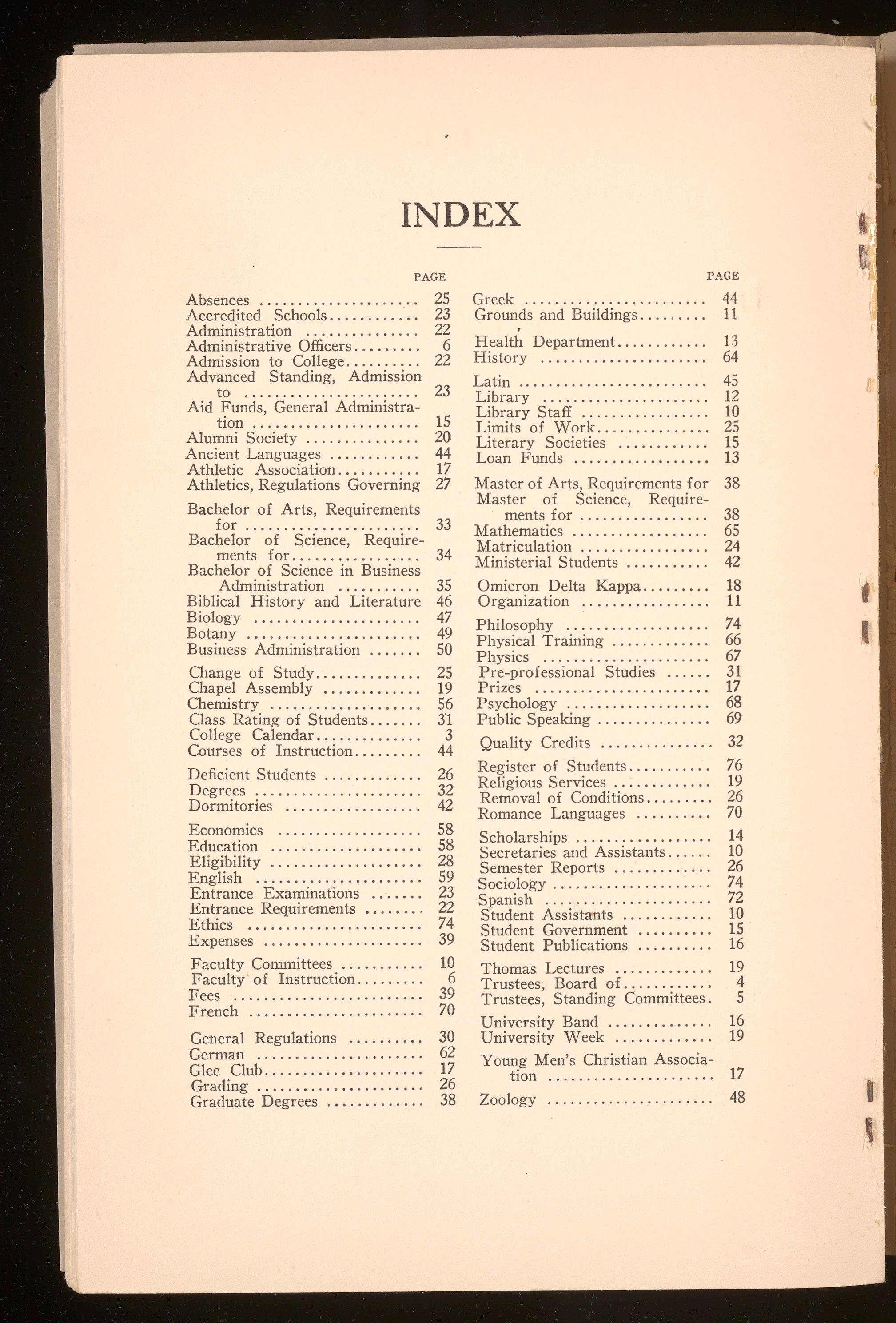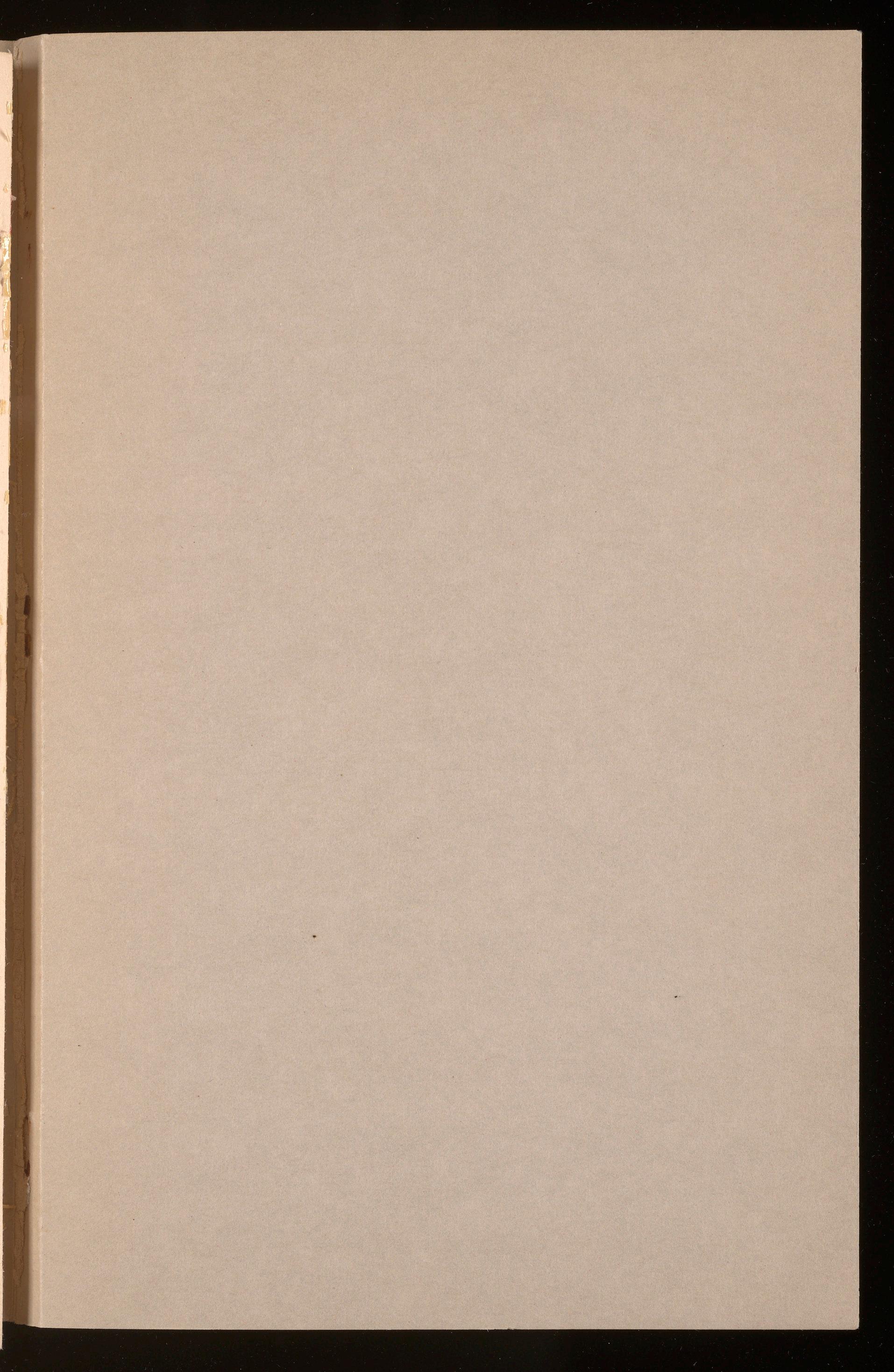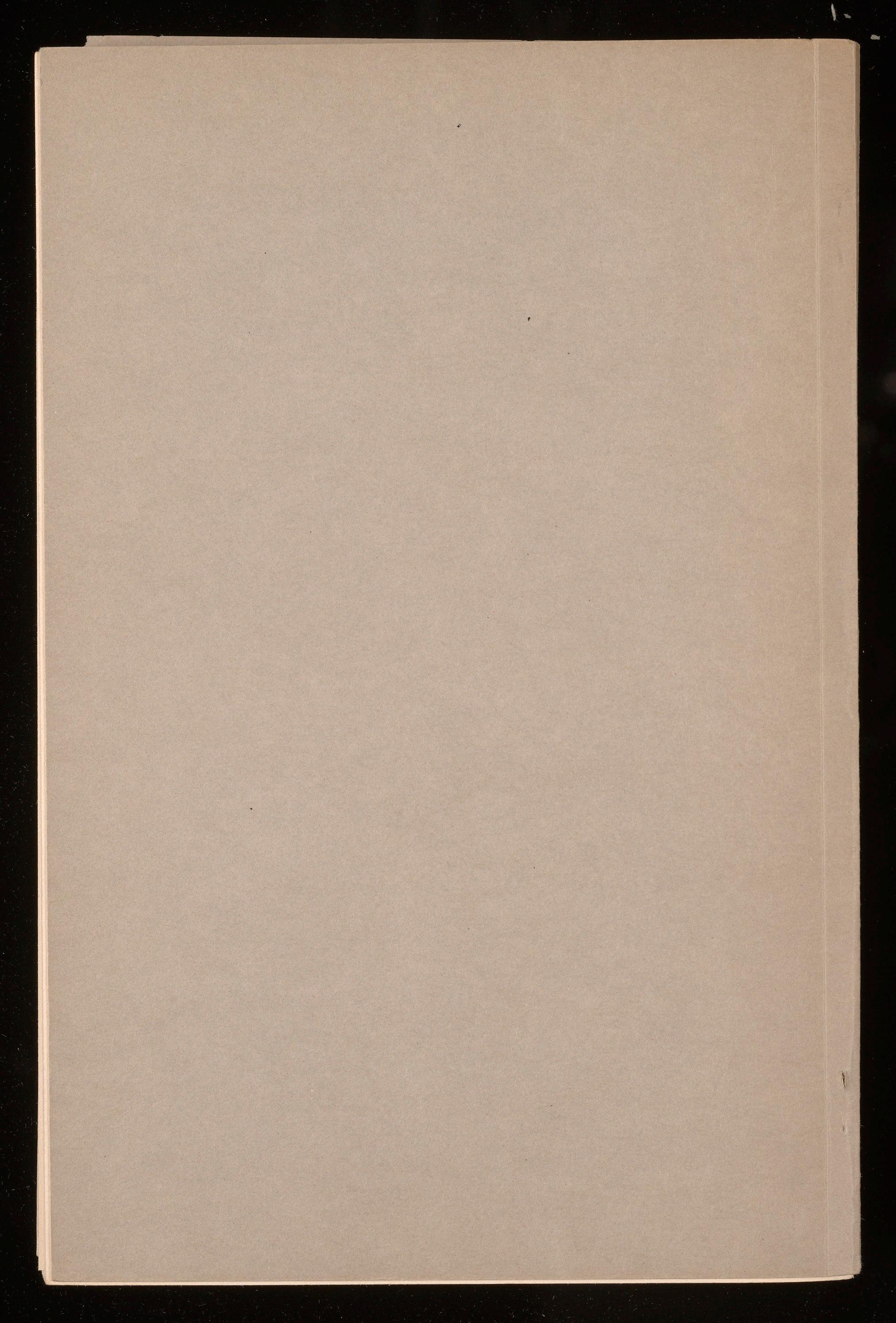University of Richmond Bulletin
Vol. XXXI MARCH, 1929
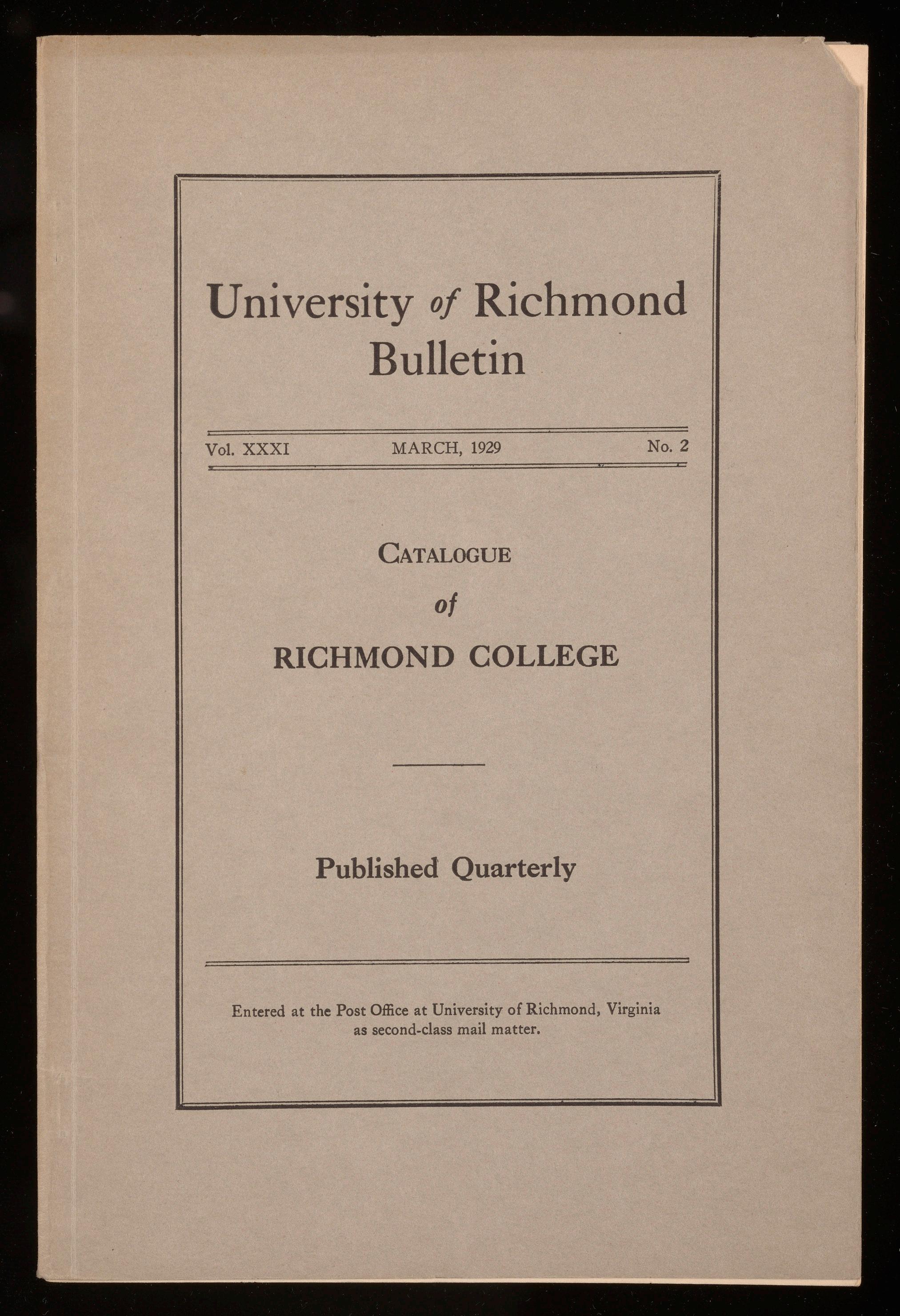
Entered at the Post Office at University of Richmond, Virginia as second-class mail matter.


Vol. XXXI MARCH, 1929

Entered at the Post Office at University of Richmond, Virginia as second-class mail matter.

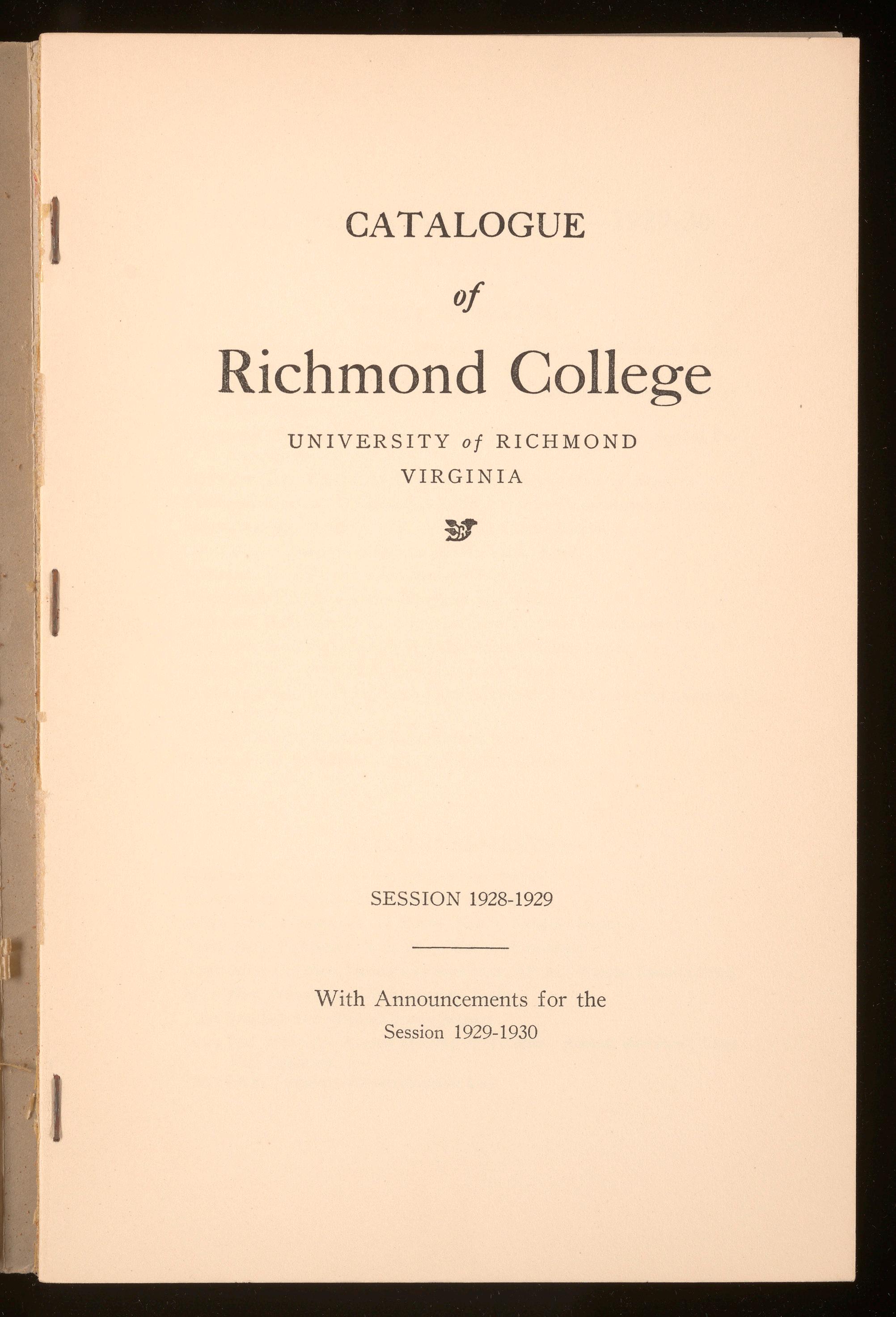
SESSION 1928-1929
With Announcements for the Session 1929-1930
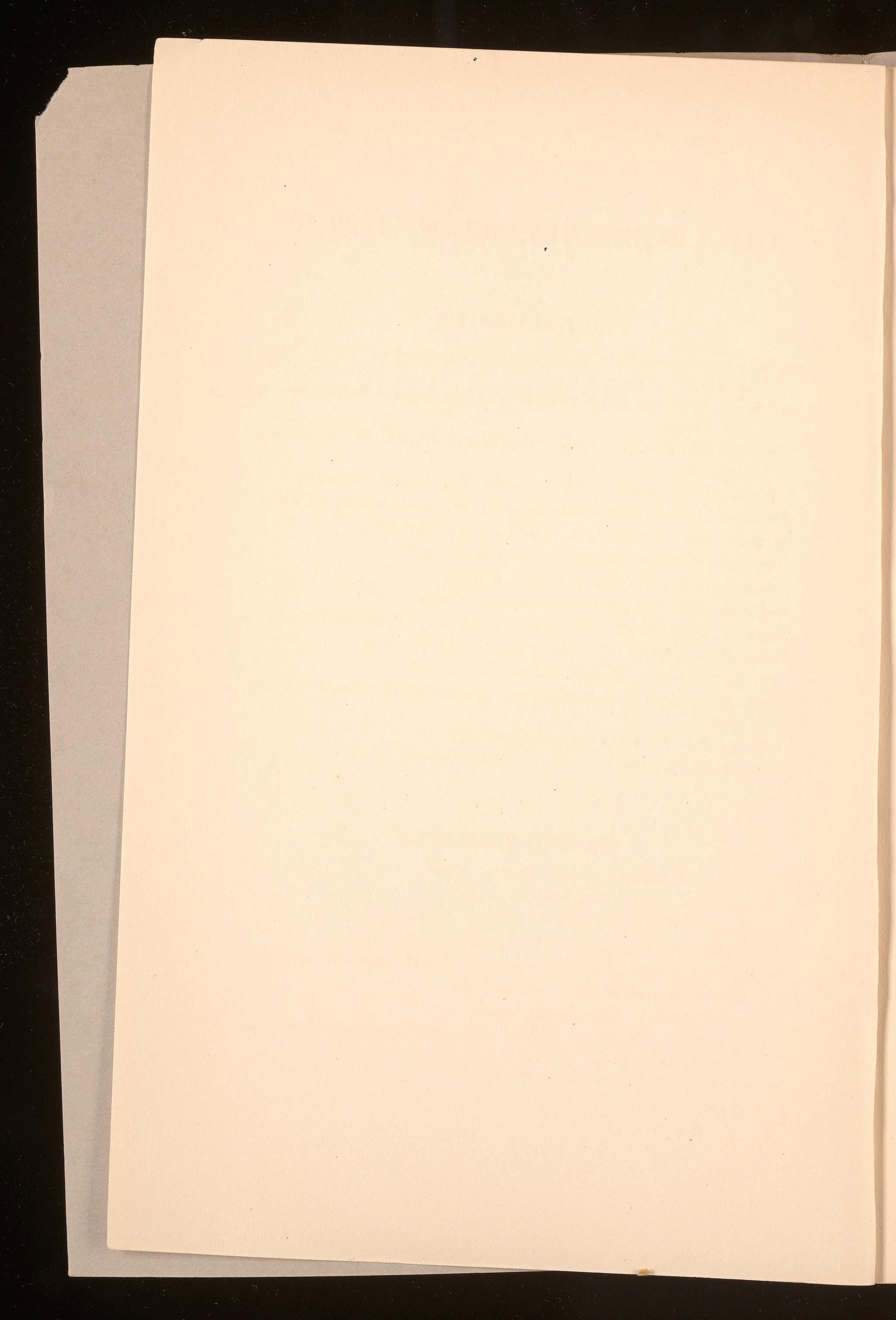
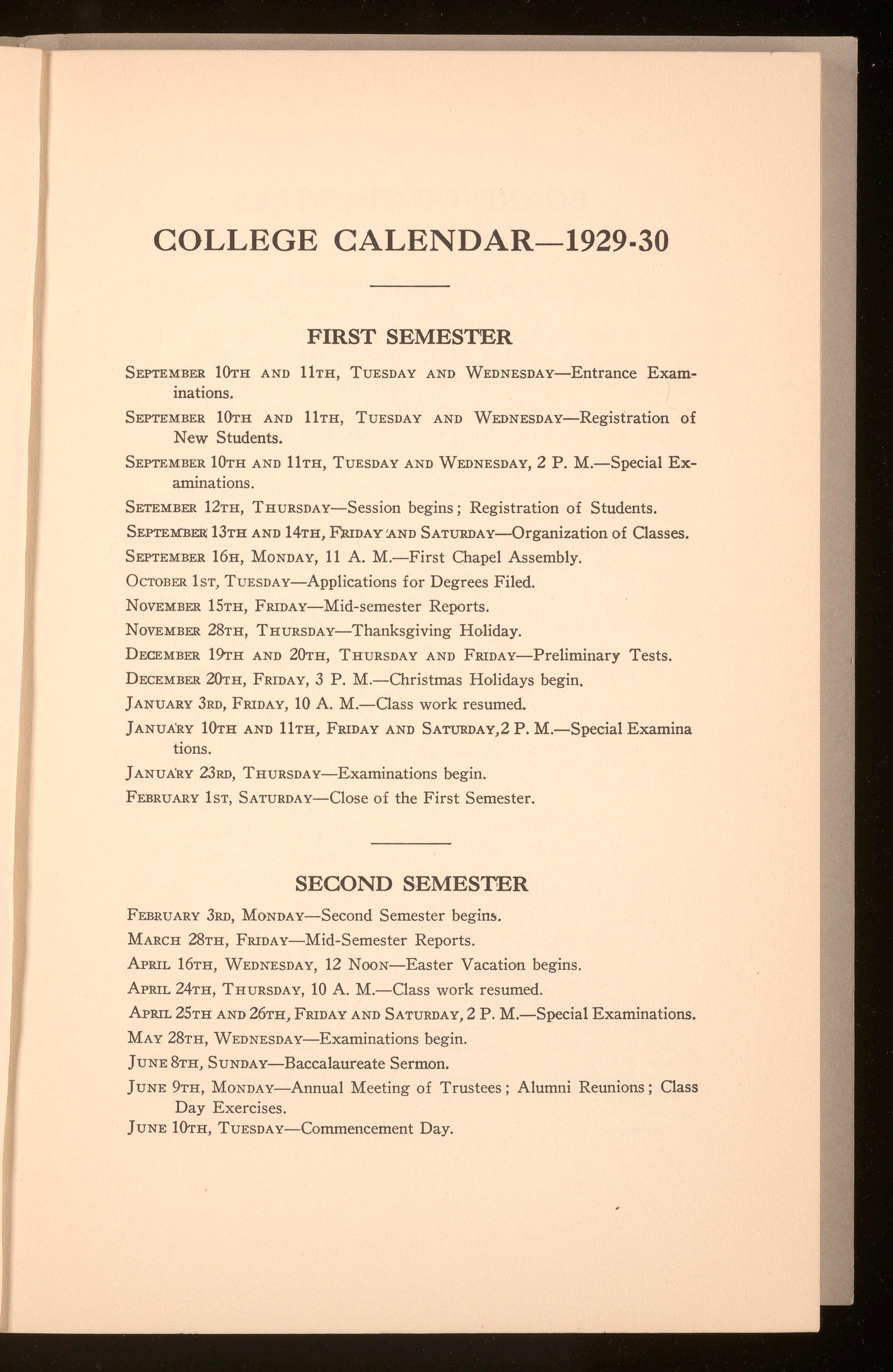
SEPTEMBERHlTH AND 11TH, TUESDAY AND WEDNESDAY-Entrance Examinations.
SEPTEMBER10TH AND 11TH, TUESDAY AND WEDNESDAY-Registration of New Students.
SEPTEMBER10TH AND 11TH, TUESDAYANDWEDNESDAY,2 P. M.-Special Examinations .
SETEMBER12TH, THURSDAY-Session begins; Registration of Students.
SEPTEM'II~ 13TH AND14TH, FiuDAY'.ANDSATURDAY-Organization of Oasses.
SEPTEMBER16H, MONDAY,11 A. M .-First Chapel Assembly.
OcroBER lsT, TUESDAY-Applications for Degrees Filed.
NOVEMBER15TH, FRIDAY-Mid-semester Reports . NOVEMBER28TH, THURSDAY-Thanksgiving Holiday.
DECEMBER19TH AND 20TH, THURSDAYAND FRIDAY-Preliminary Tests.
DECEMBER20TH, FRIDAY,3 P. M.-Christmas Holidays begin.
JANUARY3RD,FRIDAY,10 A. M.-Oass work resumed.
JANUARY 10TH AND 11TH, FRIDAYAND SATURDAY,2P. M.-Special Examina tions.
JANUARY23RD, THURSDAY-Examinations begin.
FEBRUARYlsT, SATURDAY-Close of the First Semester.
FEBRUARY3RD, MONDAY-Second Semester begin~.
MARCH 28TH, FRIDAY-Mid-Semester Reports.
APRIL 16TH, WEDNESDAY,12 NOON-Easter Vacation begins.
APRIL 24TH, THURSDAY,10 A. M.-Class work resumed
APRIL 25TH AND26TH, FRIDAYANDSATURDAY, 2 P. M.-Special Examinations.
MAY 28TH, WEDNESDAY-Examinations begin.
JuNE 8TH, SUNDAY-Baccalaureate Sermon.
JuNE 9TH, MoNDAY-Annual Meeting of Trustees; Alumni Reunions; Oass Day Exercises.
JuNE 10TH, TUESDAY-Commencement Day.
A. W. PATTERSON
P:a.ESIDENT
*T. C. WILLIAMS, JR. VICE-PRESIDENT
B. WEST TABB SECRETARY
CLASS ONE
Term expires June, 1929
DOUGLASs. FREEMAN,LL.D., Richmond
E. M. LONG.............. Richmond
E. B. JACKSON, D.D ... Harrisonburg
B. P. WILLIS ........ Fredericksburg
T. RYLANDSANFORD,D.D., Fredericksburg
CLASS TWO
Term expires June, 19230
R. S. OWENS, D.D Roanoke
W. H. BAYLOR,D.D ..... Portsmouth
Miss ALTA FosTER ...... Petersburg
J. C. METCALF,LL.D University
CLASS THREE
Term expires June, 1931
J. HUNT HARGRAVE Chatham
R. H. PITT, D.D., LL.D ... Richmond
H. W. STRALEY... Princeton, W. Va.
W. E. BARRETT...... Newport News
CARTERN. WILLIAMS, JR .. Richmond
CLASS FOUR
Term expires June, 1932
J. J. MONTAGUE.......... Richmond
L. HowARD JENKINS ...... Richmond
GEORGESWANN .......... Trenholm
H. LEE BOATWRIGHT....... Danville
J.E. HrcKs Baltimore
*Deceased.
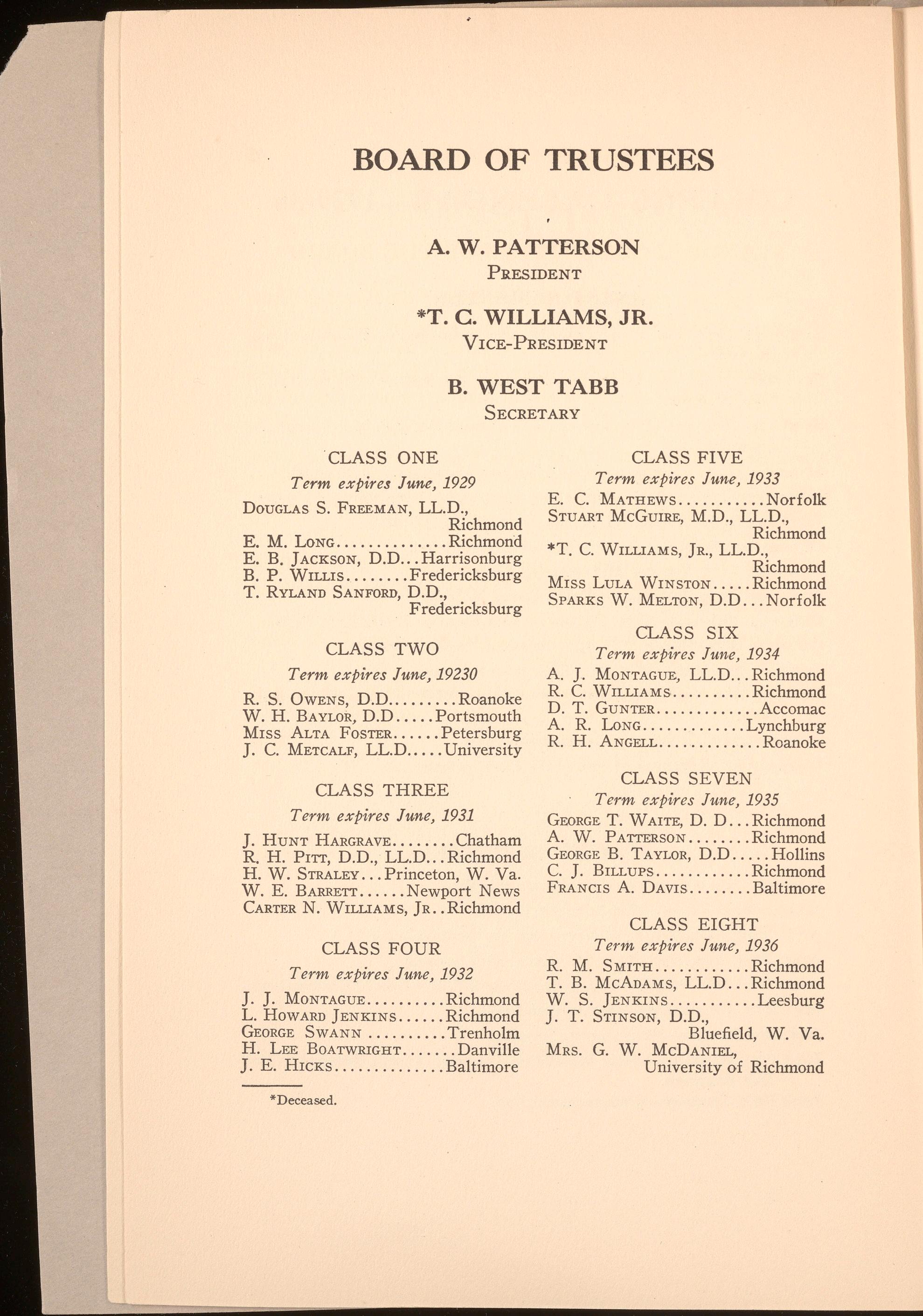
CLASS FIVE
Term expires June, 1933
E. C. MATHEWS........... Norfolk
STUARTMcGurRE, M.D., LL.D., Richmond
*T. C. WILLIAMS, JR., LL.D., Richmond
Miss LULA WINSTON..... Richmond
SPARKSW. MELTON,D.D ... Norfolk
CLASS SIX
Term expires June, 1934
A. J. MONTAGUE,LL.D ... Richmond
R. C. WILLIAMS.......... Richmond
D. T. GUNTER............. Accomac
A. R. LoNG Lynchburg
R. H. ANGELL............. Roanoke
CLASS SEVEN
Term expires June, 1935
GEORGET. WAITE, D. D Richmond
A. W. PATTERSON........ Richmond
GEORGEB. TAYLOR,D.D Hollins
C. J. BILLUPS Richmond
FRANCIS A. DAVIS........ Baltimore
CLASS EIGHT
Term expires June, 1936
R. M. SMITH Richmond
T. B. McADAMS, LL.D Richmond
W. S. JENKINS Leesburg
J. T. STINSON, D.D., Bluefield, W. Va.
MRs. G. W. McDANIEL, University of Richmond
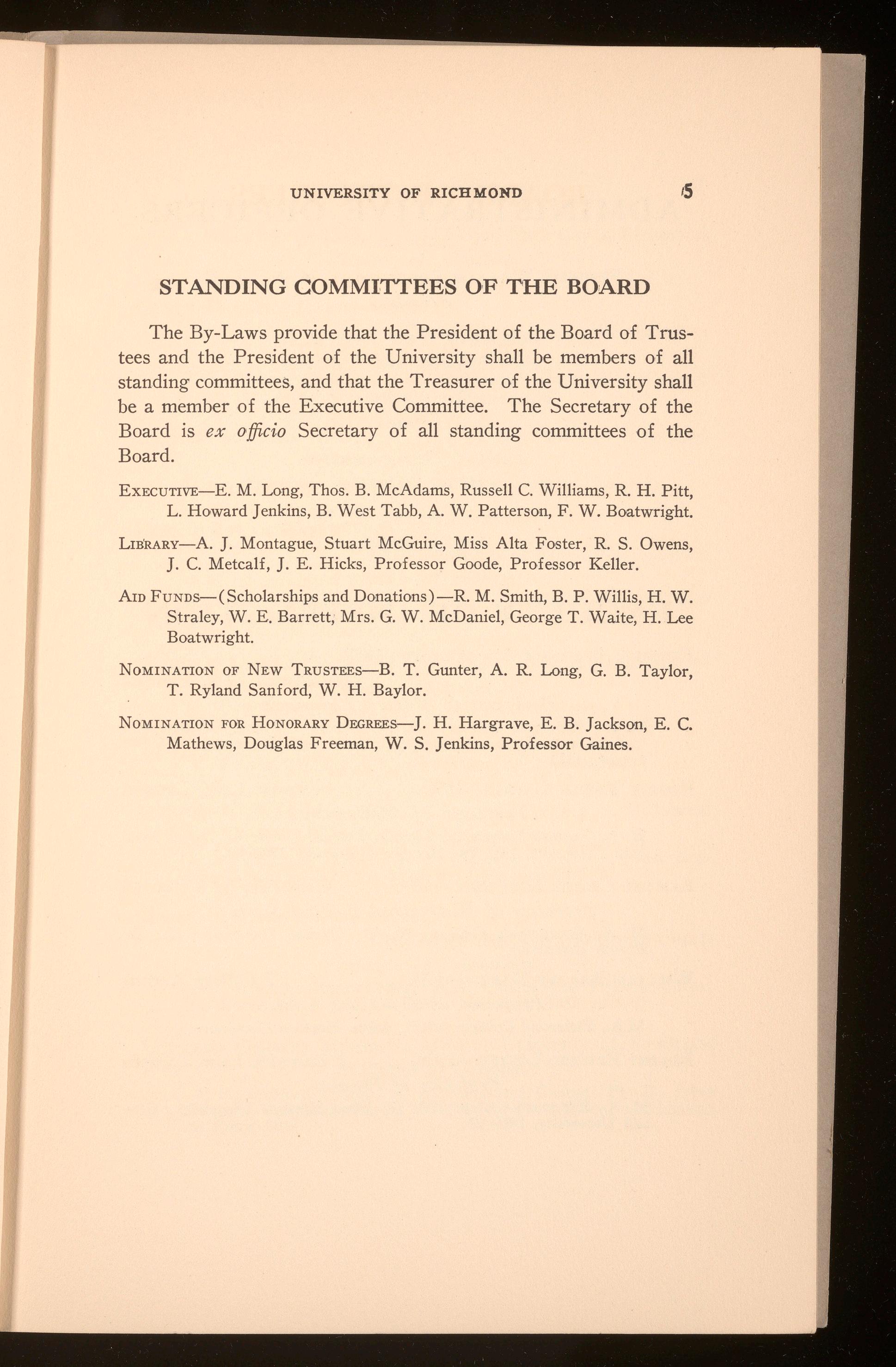
The By-Laws provide that the President of the Board of Trustees and the President of the University shall be members of all standing committees, and that the Treasurer of the University shall be a member of the Executive Committee. The Secretary of the Board is ex officio Secretary of all standing committees of the Board.
ExECUTIVE-E. M. Long, Thos. B. McAdams, Russell C. Williams, R. H. Pitt, L. Howard Jenkins, B. West Tabb, A. W. Patterson, F. W. Boatwright.
LIBRARY-A. J. Montague, Stuart McGuire, Miss Alta Foster, R. S. Owens, J. C. Metcalf, J. E. Hicks, Professor Goode, Professor Keller.
Am FuNDs-(Scholarships and Donations)-R. M. Smith, B. P. Willis, H. W. Straley, W. E. Barrett, Mrs. G. W. McDaniel, George T. Waite, H. Lee Boatwright.
NOMINATIONOF NEW TRUSTEEs-B. T. Gunter, A. R. Long, G. B. Taylor, T. Ryland Sanford, W. H. Baylor.
NOMINATIONFORHONORARYDEGREES-]. H. Hargrave, E. B. Jackson, E. C. Mathews, Douglas Freeman, W. S. Jenkins, Professor Gaines.
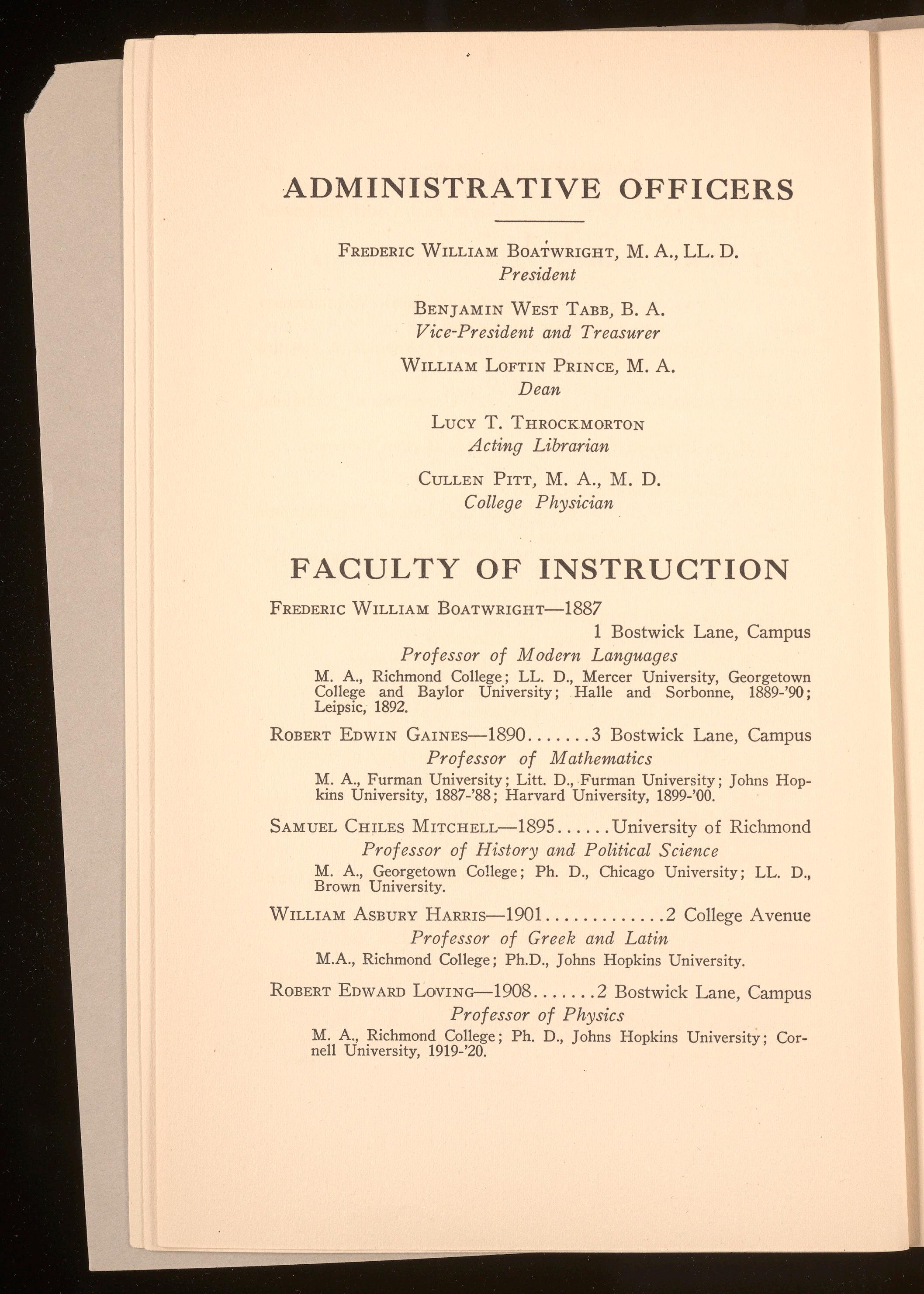
FREDERICWILLIAM BOATWRIGHT,M.A., LL. D. President
BENJAMIN WEST TABB, B. A. Vice-President and Treasurer
WILLIAM LOFTIN PRINCE, M. A. Dean
Lucy T. THROCKMORTON Acting Librarian
CULLEN PITT, M. A., M. D. College Physician
FREDERICWILLIAM BoATWRIGHT-1887
1 Bostwick Lane, Campus
Professor of Modern Languages
M. A., Richmond College; LL. D., Mercer University, Georgetown College and Baylor University; Halle and Sorbonne, 1889-'90; Leipsic, 1892
ROBERT EDWIN GArnEs-1890
3 Bostwick Lane, Campus Professor of Mathematics
M. A., Furman University; Litt. D., Furman University; Johns Hopkins University, 1887-'88; Harvard University, 1899-'00.
SAMUEL CHILES MITCHELL-1895 ...... University of Richmond Professor of History and Political Science
M. A., Georgetown College; Ph. D., Chicago University; LL. D., Brown University.
WILLIAM ASBURY HARRis-1901 ............. 2 College Avenue Professor of Greek and Latin M.A., Richmond College; Ph.D., Johns Hopkins University.
ROBERTEDWARDLovrnG-1908 ....... 2 Bostwick Lane, Campus Professor of Physics
M. A ., Richmond College; Ph. D., Johns Hopkins University; Cornell University, 1919-'20.
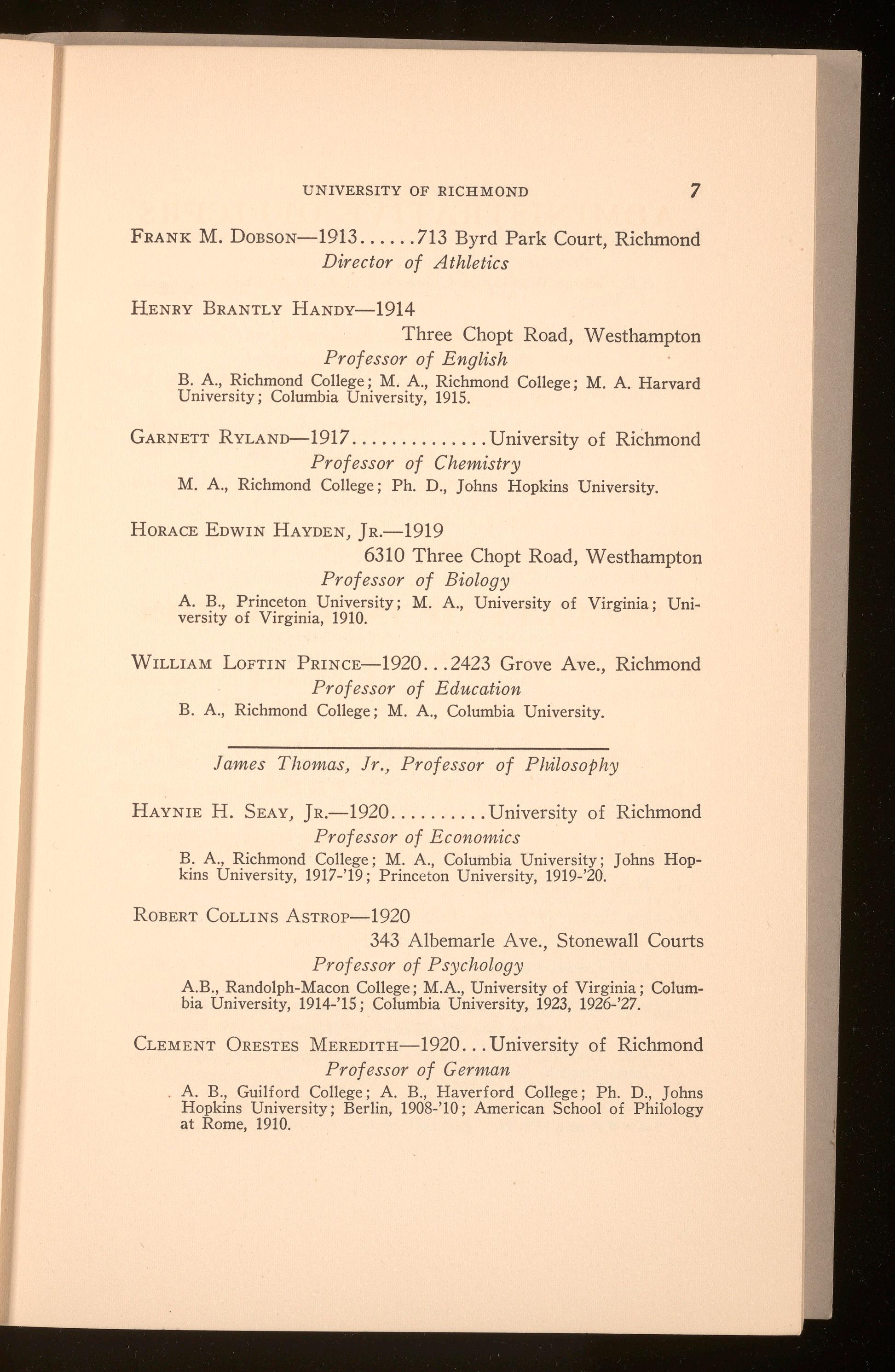
FRANK M. DoBSON-1913 ...... 713 Byrd Park Court, Richmond Director of Athletics
HENRY BRANTLYHANDY-1914
Three Chopt Road, Westhampton Professor of English
B. A., Richmond College; M. A., Richmond College; M. A. Harvard University; Columbia University, 1915.
GARNETT RYLANn-1917 .............. University of Richmond Professor of Chemistry
M. A., Richmond College; Ph. D., Johns Hopkins University.
HORACEEDWIN HAYDEN, JR.-1919
6310 Three Chopt Road, Westhampton Professor of Biology
A. B., Princeton University; M. A., University of Virginia; Uni- versity of Virginia, 1910.
WILLIAM LOFTIN PRINCE-1920 ... 2423 Grove Ave., Richmond Professor of Education
B. A., Richmond College; M. A., Columbia University.
James Thomas, Jr., Professor of Philosophy
HAYNIE H. SEAY, JR.-1920 .......... University of Richmond Professor of Economics
B. A., Richmond College; M.A ., Columbia University; Johns Hopkins University, 1917-'19; Princeton University, 1919-'20.
ROBERTCoLLINS AsTROP-1920
343 Albemarle Ave., Stonewall Courts Professor of Psychology
A.B., Randolph-Macon College; M.A., University of Virginia; Columbia University, 1914-'15; Columbia University, 1923, 1926-'27.
CLEMENT ORESTES MEREDITH-1920 ... University of Richmond Professor of German
A. B., Guilford College; A. B., Haverford College; Ph. D., Johns Hopkins University; Berlin, 1908-'10; American School of Philology at Rome, 1910.
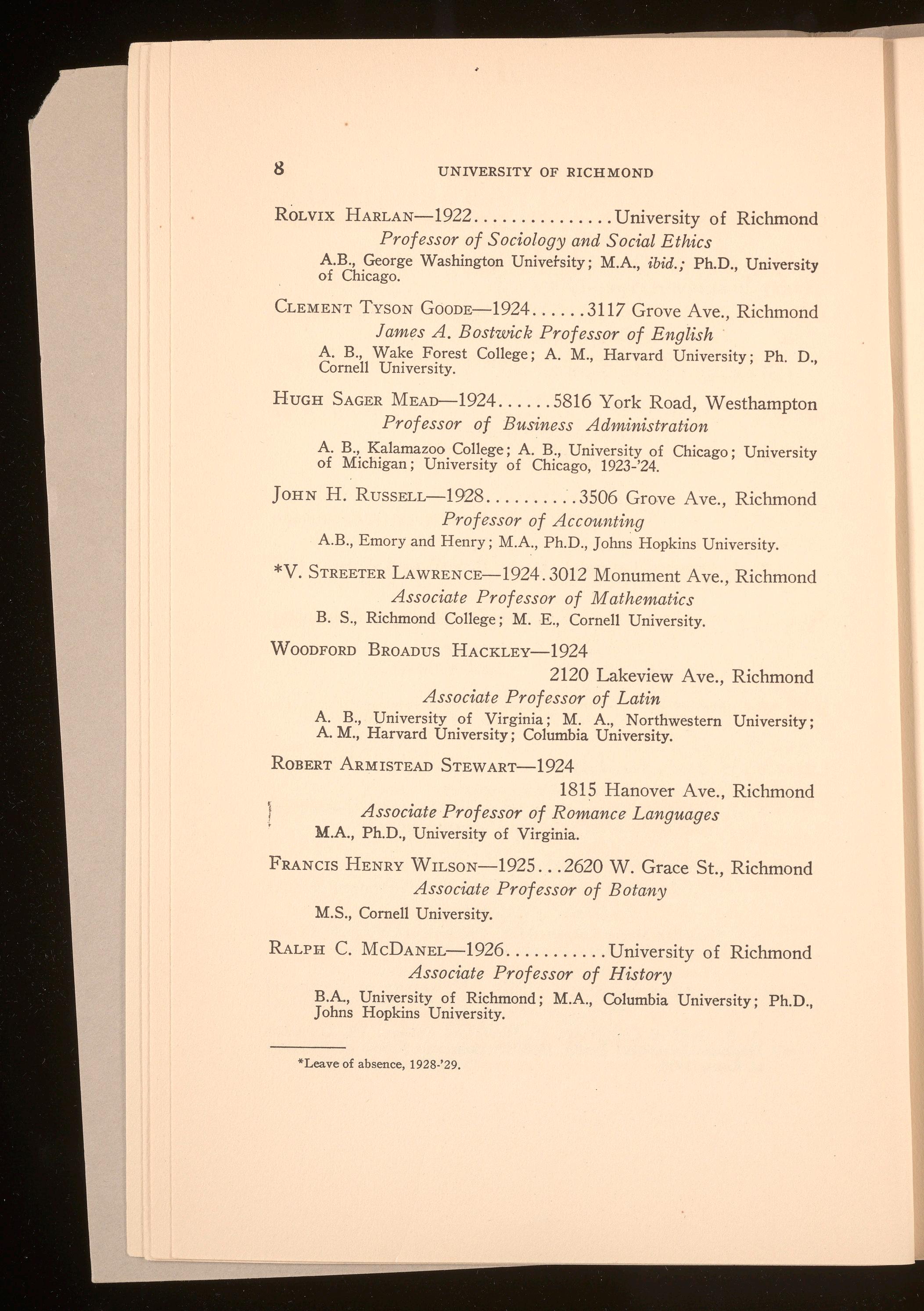
RoLVIX HARLAN-1922 ............... University of Richmond Professor of Sociology and Social Ethics
A.B., George Washington Univetsity; M.A., ibid.; Ph.D., University of Chicago.
CLEMENTTvsoN GooDE-1924 ...... 3117 Grove Ave., Richmond
James A. Bostwick Professor of Engl-ish
A. B., Wake Forest College; A. M., Harvard University; Ph. D., Cornell University.
HUGH SAGERMEAD-1924 ...... 5816 York Road, Westhampton Professor of Business Administration
A. B., Kalamazoo College; A. B., University of Chicago; University of Michigan; University of Chicago, 1923-'24.
JoHN H. RussELL-1928 .......... 3506 Grove Ave., Richmond Professor of Accounting
A.B., Emory and Henry; M.A., Ph.D., Johns Hopkins University.
*V. STREETERLAWRENCE-1924. 3012 Monument Ave., Richmond Associate Professor of Mathematics
B. S., Richmond College; M. E., Cornell University.
WOODFORDBROADUSHACKLEY-1924
2120 Lakeview Ave., Richmond Associate Professor of Latin
A. B., University of Virginia; M. A., Northwestern University; A. M., Harvard University; Columbia University.
ROBERTARMISTEADSTEWART-1924
1815 Hanover Ave., Richmond Associate Professor of Romance Languages
M.A., Ph.D., University of Virginia.
FRANCISHENRY WILSON-1925 ... 2620 W. Grace St., Richmond Associate Professor of Botany
M.S., Cornell University.
RALPH C. McDANEL-1926 ........... University of Richmond Associate Professor of History
B.A., University of Richmond; M.A., Columbia University; Ph.D., Johns Hopkins University.
*Leave of absence, 1928-'29.

CALVIN NORWOODWARFIELD-1926 ..... University of Richmond Associate Professor of Physics
B.E., M.A., Ph.D., Johns Hopkins University.
AUGUSTUSBARTOWRunD-1926 .. 1304 Avondale Ave., Richmond Associate Professor of Bible
M.A., D.D., Richmond College; Graduate Southern Baptist Theological Seminary.
WILLIAM ROBERTCoRNTHWAITE-1927 .. University of Richmond Associate Professor of Chemistry
A.B., DePauw University; Ph.D., Ohio State University.
HERMAN P. THOMAs-1927 .... 2810 Kensington Ave., Richmond Associate Professor of Economics and Business Administration
B.A., Richmond College; M.A., University of Virginia.
W. F. CAYLOR-1928 .............. 3117 Grove Ave., Richmond Associate Professor of Spanish
M.A., Mercer University.
B. C. McCARY-1928 ...... 343 Albemarle Ave., Stonewall Court Associate Professor of French
B.A., University of Richmond; Docteur de l'Universite de Toulouse.
CHARLESH. WHEELER-1928 ..... 2129 Hanover Ave., Richmond Acting Associate Professor of Mathematics
B.S., Washington and Jefferson College; Johns Hopkins University, 1926-'28.
DAVIDJ. MAYs-1926 ................ Law Building, Richmond Instructor in Business Administration
Randolph-Macon College 1914-'16, 1919-'20; LL.B., T. C. Williams School of Law, University of Richmond.
E. B. DoERING-1928 ................. University of Richmond Instructor in English
B. A., University of Iowa; M.A., Harvard.
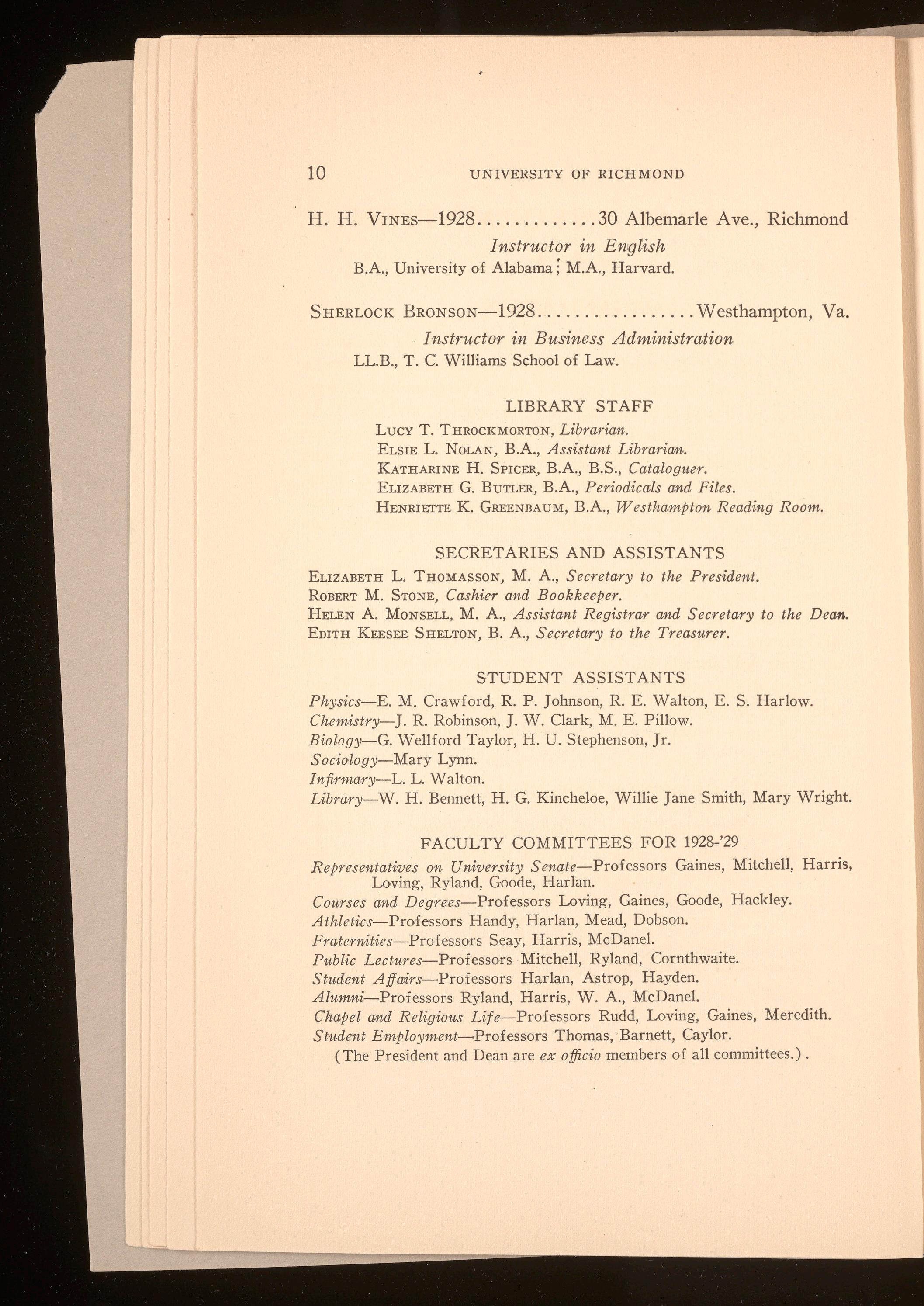
H. H. VrnEs-1928 30 Albemarle Ave., Richmond
Instructor in English
B.A., University of Alabama; M.A., Harvard.
SHERLOCK BRONSON-1928 ................. Westhampton, Va. Instructor in Business Administration
LL.B., T. C. Williams School of Law.
LIBRARY STAFF
Lucy T. THROCKMORTON,Librarian.
ELSIE L. NoLAN, B.A., Assistant Librarian.
KATHARINEH. SPICER,B.A., B.S., Catalogiier.
ELIZABETHG. BUTLER,B.A., Periodicals and Files.
HENRIETTEK. GREENBAUM,B.A., Westhampton Reading Room.
SECRETARIES AND ASSISTANTS
ELIZABETHL. THOMASSON,M. A., Secretary to the President. ROBERTM. STONE, Cashier and Bookkeeper.
HELEN A. MoNSELL, M. A., Assistant Registrar and Secretary to the Dean. EDITH KEESEE SHELTON,B. A., Secretary to the Treasurer.
STUDENT ASSIST ANTS
Physics-E. M. Crawford, R. P. Johnson, R. E. Walton, E. S. Harlow. Chemistry-]. R. Robinson, J. W. Clark, M. E. Pillow. Biology-G. Wellford Taylor, H. U. Stephenson, Jr. Sociology-Mary Lynn. lnfirmary-L. L. Walton. Library-W. H. Bennett, H. G. Kincheloe, Willie Jane Smith, Mary Wright.
FACULTY COMMITTEES FOR 1928-'29
Representatives on University Senate-Professors Gaines, Mitchell, Harris, Loving, Ryland, Goode, Harlan. Courses and Degrees-Professors Loving, Gaines, Goode, Hackley. Athletics-Professors Handy, Harlan, Mead, Dobson. Fraternities-Professors Seay, Harris, McDanel. Public Lectures-Professors Mitchell, Ryland, Cornthwaite. Stiident Affairs-Professors Harlan, Astrop, Hayden. Alumni-Professors Ryland, Harris, W. A., McDanel. Chapel and Religious Life-Professors Rudd, Loving, Gaines, Meredith.
Student Employment-Professors Thomas, -Barnett, Caylor. (The President and Dean are ex officio members of all committees.) .
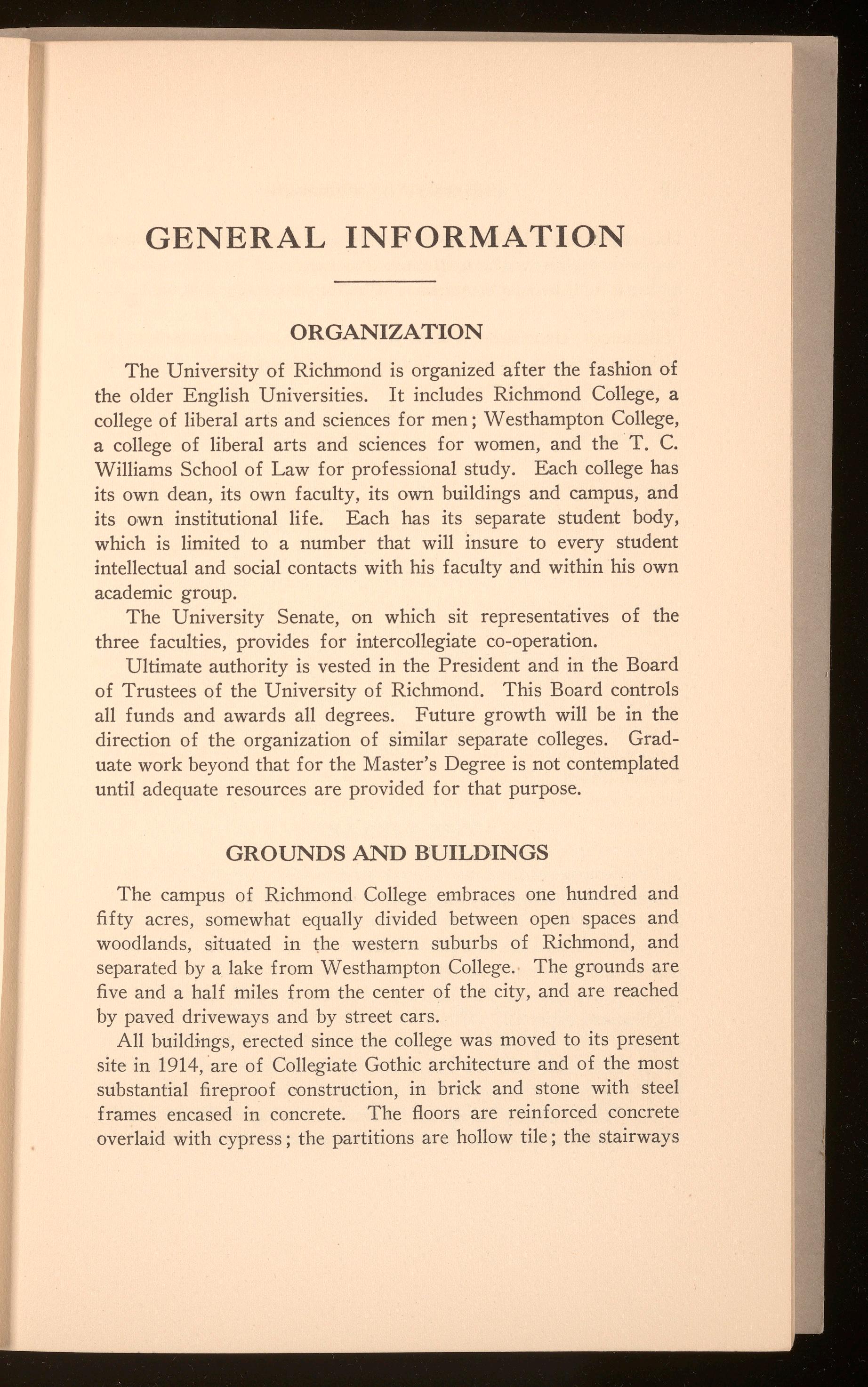
The University of Richmond is organized after the fashion of the older English Universities. It includes Richmond College, a college of liberal arts and sciences for men; Westhampton College, a college of liberal arts and sciences for women, and the ·T. C. Williams School of Law for professional study. Each college has its own dean, its own faculty, its own buildings and campus, and its own institutional life. Each has its separate student body, which is limited to a number that will insure to every student intellectual and social contacts with his faculty and within his own academic group.
The University Senate, on which sit representatives of the three faculties, provides for intercollegiate co-operation. Ultimate authority is vested in the President and in the Board of Trustees of the University of Richmond. This Board controls all funds and awards all degrees. Future growth will be in the direction of the organization of similar separate colleges. Graduate work beyond that for the Master's Degree is not contemplated until adequate resources are provided for that purpose.
The campus of Richmond College embraces one hundred and fifty acres, somewhat equally divided between open spaces and woodlands, situated in the western suburbs of Richmond, and separated by a lake from Westhampton College. The grounds are five and a half miles from the center of the city, and are reached by paved driveways and by street cars.
All buildings, erected since the college was moved to its present site in 1914, are of Collegiate Gothic architecture and of the most substantial fireproof construction, in brick and stone with steel frames encased in concrete. The floors are reinforced concrete overlaid with cypress ; the partitions are hollow tile; the stairways
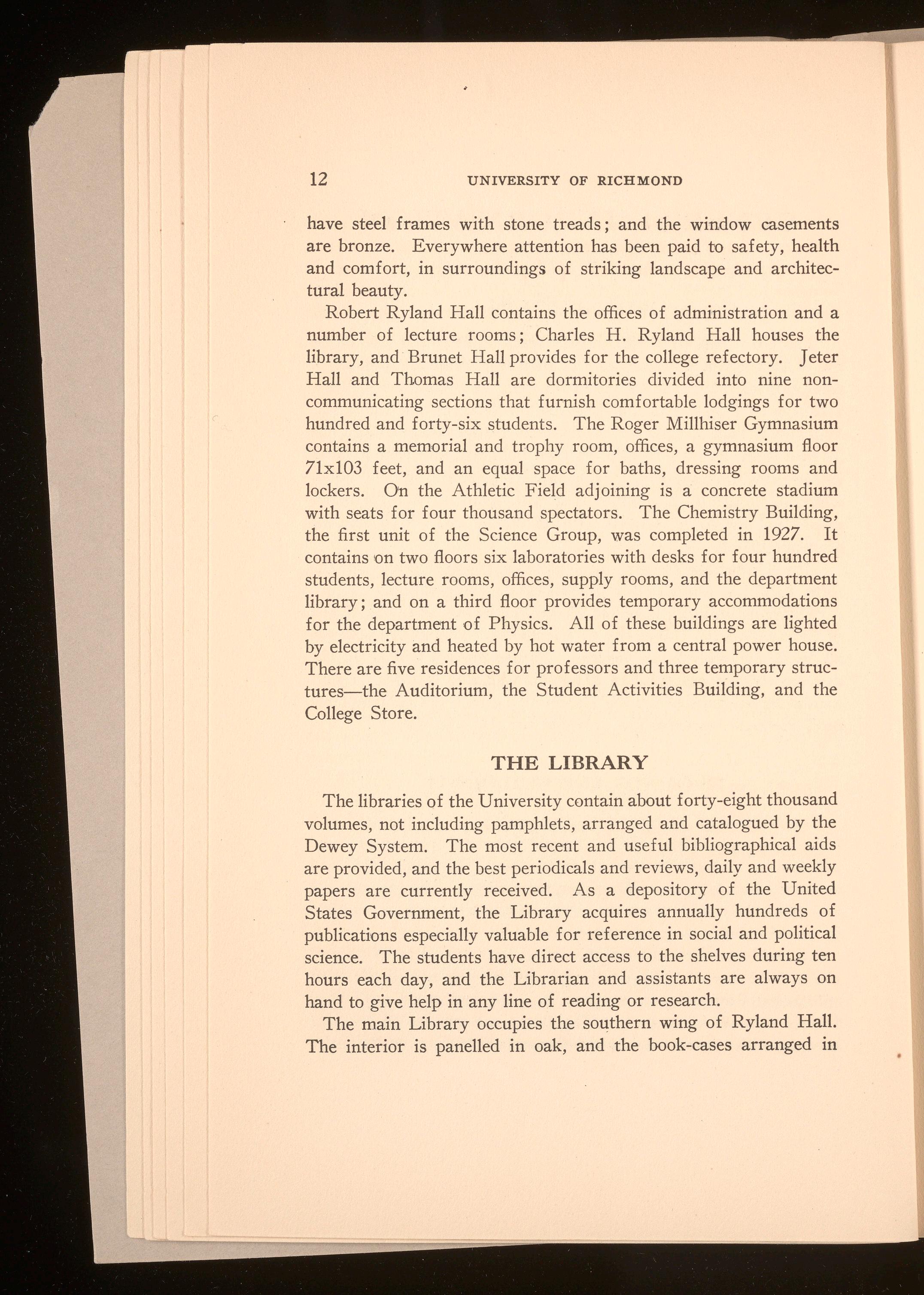
have steel frames with stone treads ; and the window casements are bronze. Everywhere attention has been paid to safety, health and comfort, in surroundings of striking landscape and architectural beauty
Robert Ryland Hall contains the offices of administration and a number of lecture rooms; Charles H. Ryland Hall houses the library, and Brunet Hall provides for the college refectory. Jeter Hall and Thomas Hall are dormitories divided into nine noncommunicating sections that furnish comfortable lodgings for two hundred and forty-six students. The Roger Millhiser Gymnasium contains a memorial and trophy room, offices, a gymnasium floor 71x103 feet, and an equal space for baths, dressing rooms and lockers. On the Athletic Field adjoining is a concrete stadium with seats for four thousand spectators. The Chemistry Building, the first unit of the Science Group, was completed in 1927. It contains on two floors six laboratories with desks for four hundred students, lecture rooms, offices, supply rooms, and the department library; and on a third floor provides temporary accommodations for the department of Physics. All of these buildings are lighted by electricity and heated by hot water from a central power house. There are five residences for professors and three temporary structures-the Auditorium, the Student Activities Building, and the College Store.
The libraries of the University contain about forty-eight thousand volumes, not including pamphlets, arranged and catalogued by the Dewey System. The most recent and useful bibliographical aids are provided, and the best periodicals and reviews, daily and weekly papers are currently received. As a depository of the United States Government, the Library acquires annually hundreds of publications especially valuable for reference in social and political science. The students have direct access to the shelves during ten hours each day, and the Librarian and assistants are always on hand to give help in any line of reading or research.
The main Library occupies the southern wing of Ryland Hall. The interior is panelled in oak, and the book-cases arranged in
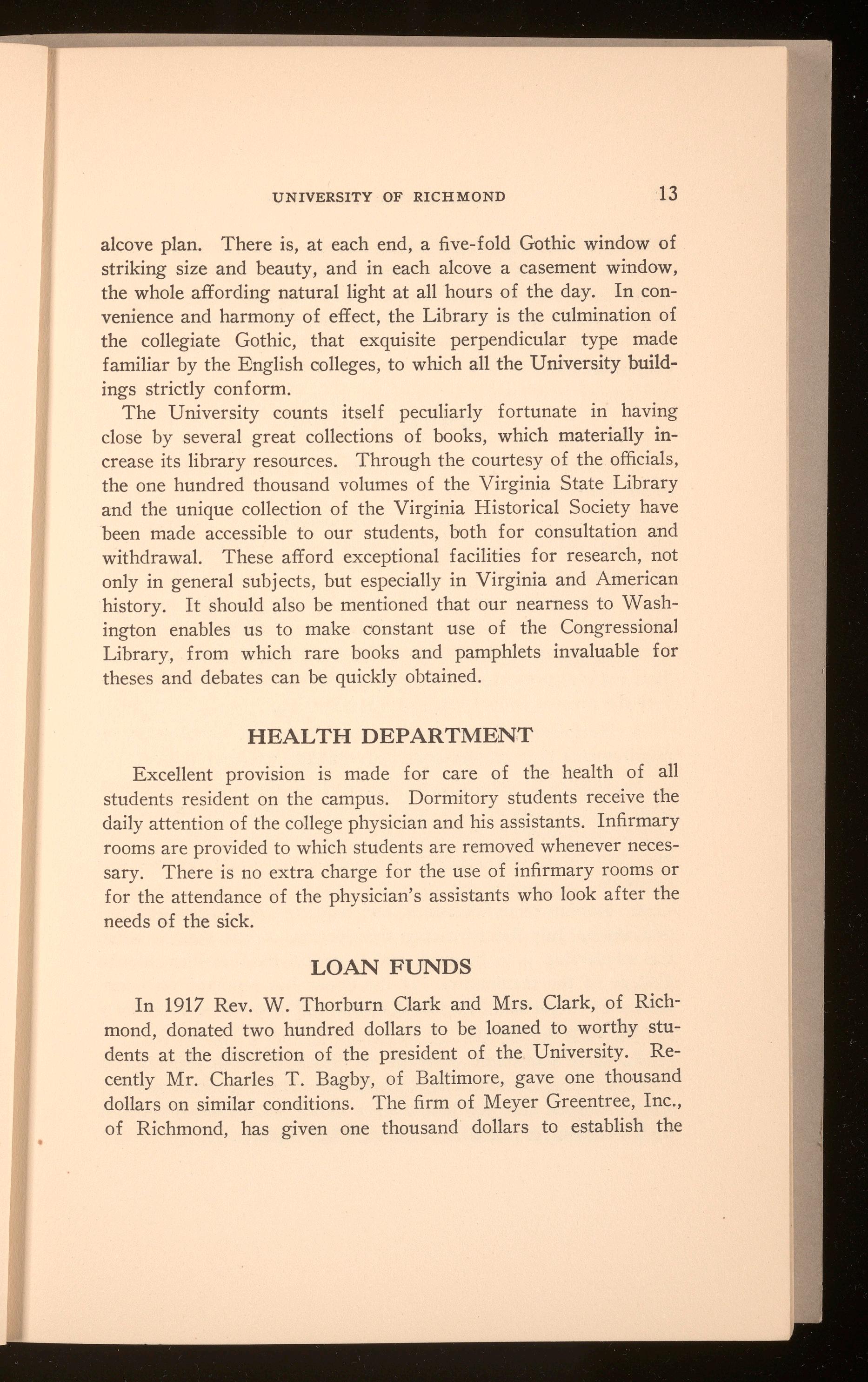
alcove plan. There is, at each end, a five-fold Gothic window of striking size and beauty, and in each alcove a casement window, the whole affording natural light at all hours of the day. In convenience and harmony of effect, the Library is the culmination of the collegiate Gothic, that exquisite perpendicular type made familiar by the English colleges, to which all the University buildings strictly conform.
The University counts itself peculiarly fortunate in having close by several great collections of books, which materially increase its library resources. Through the courtesy of the officials, the one hundred thousand volumes of the Virginia State Library and the unique collection of the Virginia Historical Society have been made accessible to our students, both for consultation and withdrawal. These afford exceptional facilities for research, not only in general subjects, but especially in Virginia and American history. It should also be mentioned that our nearness to Washington enables us to make constant use of the Congressional Library, from which rare books and pamphlets invaluable for theses and debates can be quickly obtained.
Excellent provision is made for care of the health of all students resident on the campus. Dormitory students receive the daily attention of the college physician and his assistants. Infirmary rooms are provided to which students are removed whenever necessary. There is no extra charge for the use of infirmary rooms or for the attendance of the physician's assistants who look after the needs of the sick.
In 1917 Rev. W. Thorburn Clark and Mrs. Clark, of Richmond, donated two hundred dollars to be loaned to worthy students at the discretion of the president of the University. Recently Mr. Charles T. Bagby, of Baltimore, gave one thousand dollars on similar conditions. The firm of Meyer Greentree, Inc., of Richmond, has given one thousand dollars to establish the

"Meyer Greentree Loan Fun:d." These gifts fill a real need. They have already enabled several of the finest students in Richmond College to continue their work for degrees. The money is usually loaned in sums of fifty to one hundred dollars to students who have made good records in college and who need some emergency assistance.
Scholarships established in Richmond College shall be used under the following regulations :
1. A major scholarship becomes available for use when not less than two thousand five hundred dollars has been paid into the College treasury.
2. Scholarships established since January 1, 1908, are open to use in either Richmond or Westhampton Colleges.
3. A major scholarship pays the annual tuition of the holder. This fee is at present one hundred and fifty dollars, which is therefore the present annual value of a scholarship.
4. Recipients of scholarships must meet the usual entrance requirements that are demanded of students who pay tuition.
S. Donors of scholarships who wish to nominate students to receive the benefit of their scholarships are informed that it is a rule of the College to make its appointment for one year at a time, and then repeat the appointment as often as may be needful and desirable.
6. Donors of scholarships are requested to nominate beneficiaries by July 1st preceding the opening of the session when the scholarship is to be used, and to notify the President of the College of the nomination. If the donor has reported no nomination by September 1st, the College will appoint a beneficiary for the current session.
7. It is sometimes desirable to divide a scholarship and to appoint two persons each to enjoy the benefits of a minor scholarship. In such case the holder of a minor scholarship pays half of the tuition fee; or $37.50 for each half session.

8. Reports of students' class and examination standing are mailed at regular intervals to parents or guardians, and a transcript of a beneficiary's report will be mailed to the donor of a scholarship, provided request is made at the Dean's office.
The committee in charge has general instruction, in making award of all Aid Funds, to give the preference:
I. To applicants already at College, who have maintained a good standing, both in character and study.
II. To other fully prepared applicants who shall present satisfactory testimonials from the school last attended, or from other persons who have had opportunity to judge, certifying to health, attainments, habits of study and moral character.
III. To those of either class who give reasonable assurance that they will complete a course of study leading to one of the degrees of the College.
The recipients of aid are expected to prove, as students, not only above censure in all respects, but actively helpful to the College by example and by earnest work.
The student self-government organization, known as the Student Council of Richmond College, was voluntarily established by the students themselves to further the best interests of the student body and of the College in general. It is vitally concerned with maintaining the honor system in the institution. There is cordial co-operation between the Student Council and the constituted College authorities. Every matriculate of the College is a member of this organization.
Two literary societies, known as the Mu Sigma Rho and the Philologian, are maintained by the students. They hold weekly meetings for declamation, debate, and other literary exercises. Besides the joint oratorical contest and the joint debate held in the spring, each society holds at least one public debate during the
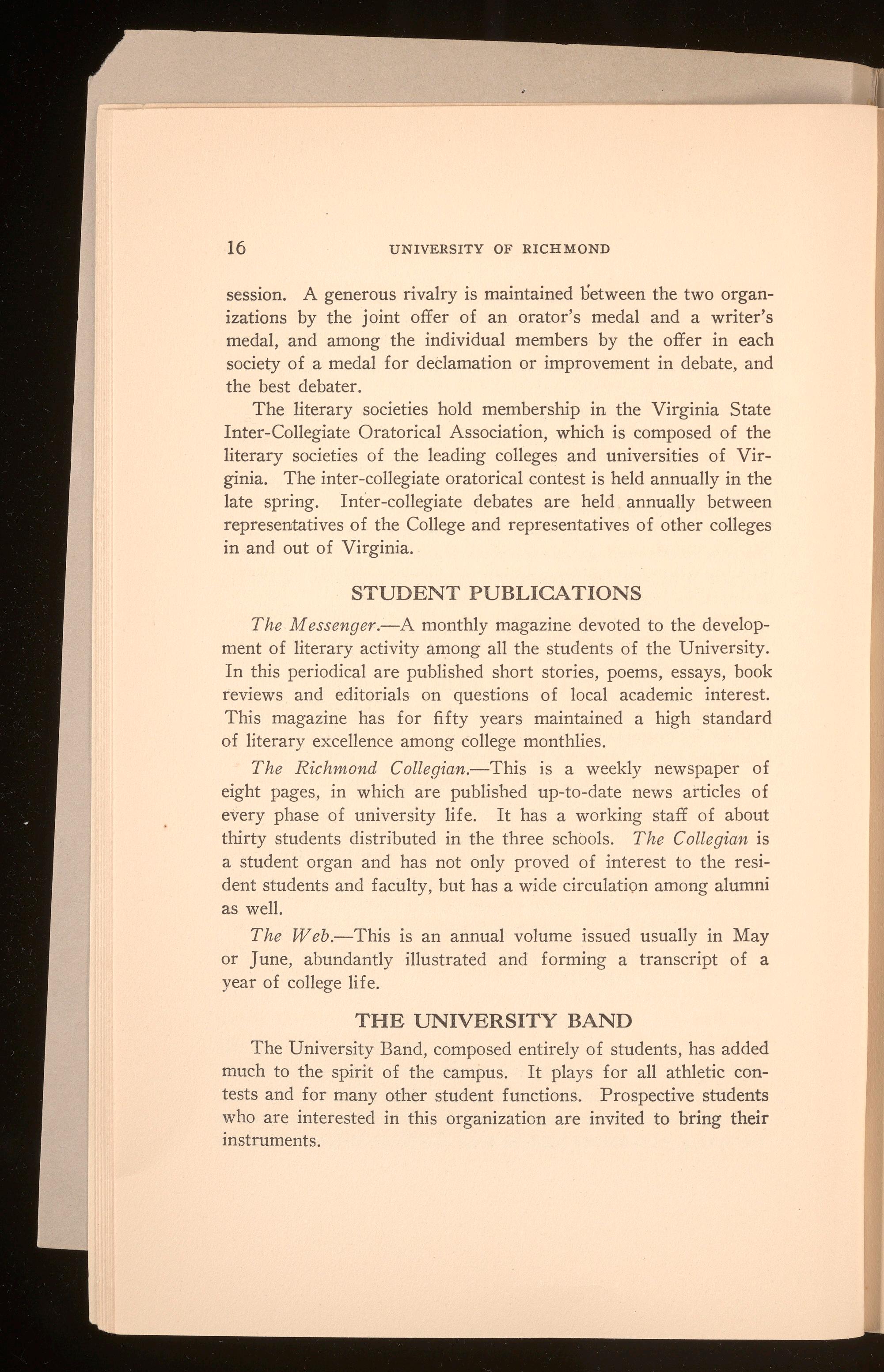
sess10n. A generous rivalry is maintained oetween the two organizations by the joint offer of an orator's medal and a writer's medal, and among the individual members by the offer in each society of a medal for declamation or improvement in debate, and the best debater.
The literary societies hold membership in the Virginia State Inter-Collegiate Oratorical Association, which is composed of the literary societies of the leading colleges and universities of Virginia. The inter-collegiate oratorical contest is held annually in the late spring. Inter-collegiate debates are held annually between representatives of the College and representatives of other colleges in and out of Virginia.
The M essenger.-A monthly magazine devoted to the development of literary activity among all the students of the University. In this periodical are published short stories, poems, essays, book reviews and editorials on questions of local academic interest. This magazine has for fifty years maintained a high standard of literary excellence among college monthlies.
The Richmond Collegian.-This is a weekly newspaper of eight pages, in which are published up-to-date news articles of every phase of university life. It has a working staff of about thirty students distributed in the three schools. The Collegian is a student organ and has not only proved of interest to the resident students and faculty, but has a wide circulation among alumni as well.
The W eb.-This is an annual volume issued usually in May or June, abundantly illustrated and forming a transcript of a year of college life.
The University Band, composed entirely of students, has added much to the spirit of the campus. It plays for all athletic contests and for many other student functions. Prospective students who are interested in this organization are invited to bring their instruments.

An active Young Men's Christian Association is maintained in the College. Its object is to promote the spiritual and moral welfare of the students. Meetings, addressed by representative students, faculty members, and prominent men from Richmond, are held weekly. The Association has as its headquarters a building which was used during the war as a Red Cross building. All students of the College are invited to make the Y. M. C. A. a recreation center.
The Athletic Association of the College is an organization of Faculty and students. This Association has monthly meetings for the transaction of business. Details of management are entrusted to the Athletic Association, composed of students and professors, but general control is exercised by the Athletic Council, composed of representatives from the Trustees, Faculty, Alumni and Students.
Richmond College was among the first colleges in Virginia to have an organized Glee Club. For a number of years the Club was conducted by the students themselves, and later certain members of the Faculty who were interested in vocal singing undertook to direct the work.
For the past three years the Club has had as its Director, Mr. Edward D. Naff, a teacher of singnig and musical theory from the City of Richmond. Mr. Naff has done special work at the Peabody Conservatory of Music in Baltimore, Md., and at Northwestern University and has had wide experience in directing college glee clubs. At the present time, in addition to his teaching work, he is also connected with radio station WRVA, in the capacity of Musical Director.
Since Mr. Naff has been with the Club the members have confined their efforts primarily to the production of music of the better sort, such composers as Bach, Sullivan and Dvorak being regularly represented in their programs.
The Glee Club offers opportunity to its members of learning to read at sight, and the experience gained enables many of the members to lead other groups in singing.
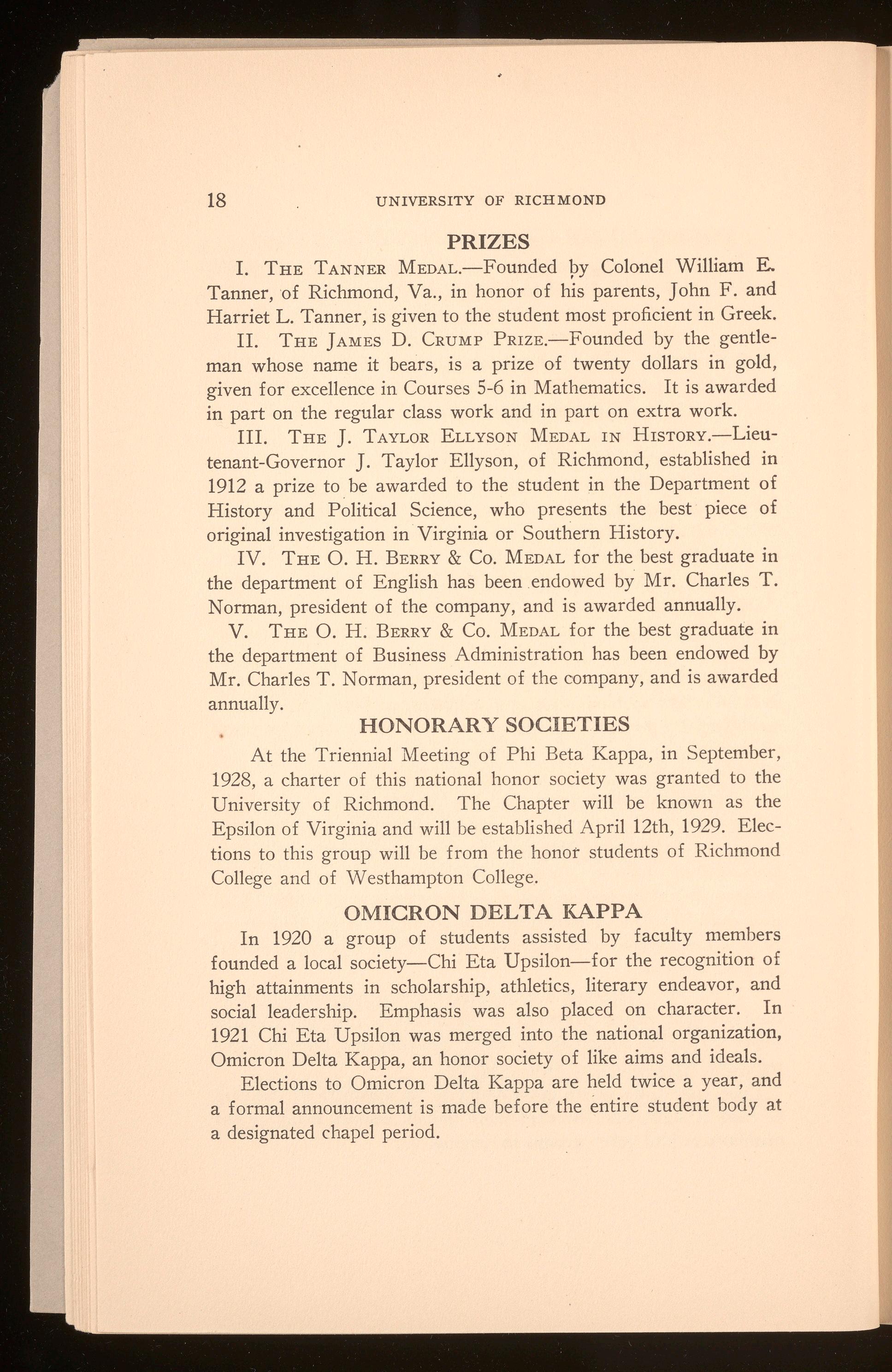
I. THE TANNER MEDAL.-Founded j:>y Colonel William E. Tanner, of Richmond, Va., in honor of his parents, John F. and Harriet L. Tanner, is given to the student most proficient in Greek.
II. THE JAMES D. CRUMP PRIZE.-Founded by the gentleman whose name it bears, is a prize of twenty dollars in gold, given for excellence in Courses 5-6 in Mathematics. It is awarded in part on the regular class work and in part on extra work.
III. THE J. TAYLORELLYSON MEDAL IN HISTORY.-Lieutenant-Governor J. Taylor Ellyson, of Richmond, established in 1912 a prize to be awarded to the student in the Department of History and Political Science, who presents the best piece of original investigation in Virginia or Southern History.
IV. THE 0. H. BERRY& Co. MEDALfor the best graduate in the department of English has been endowed by Mr. Charles T. Norman, president of the company, and is awarded annually.
V. THE 0. H . BERRY& Co. MEDALfor the best graduate in the department of Business Administration has been endowed by Mr. Charles T. Norman, president of the company, and is awarded annually.
At the Triennial Meeting of Phi B eta Kappa, in September, 1928, a charter of this national honor society was granted to the University of Richmond. Th e Chapter will be known as the Epsilon of Virginia and will be esta blished A pril 12th, 1929. Elections to this group will be from the honot students of Richmond College and of We sthampton College.
In 1920 a group of students assisted by faculty members founded a local society-Chi Eta Upsilon-for the recognition of high attainments in scholarship, athletics, literary endeavor, and social leadership. Emphasis was also placed on character. In 1921 Chi Eta Upsilon was merged into the national organization, Omicron Delta Kappa, an honor society of like aims and ideals. Elections to Omicron Delta Kappa are held twice a year, and a formal announcement is made before the entire student body at a designated chapel period.
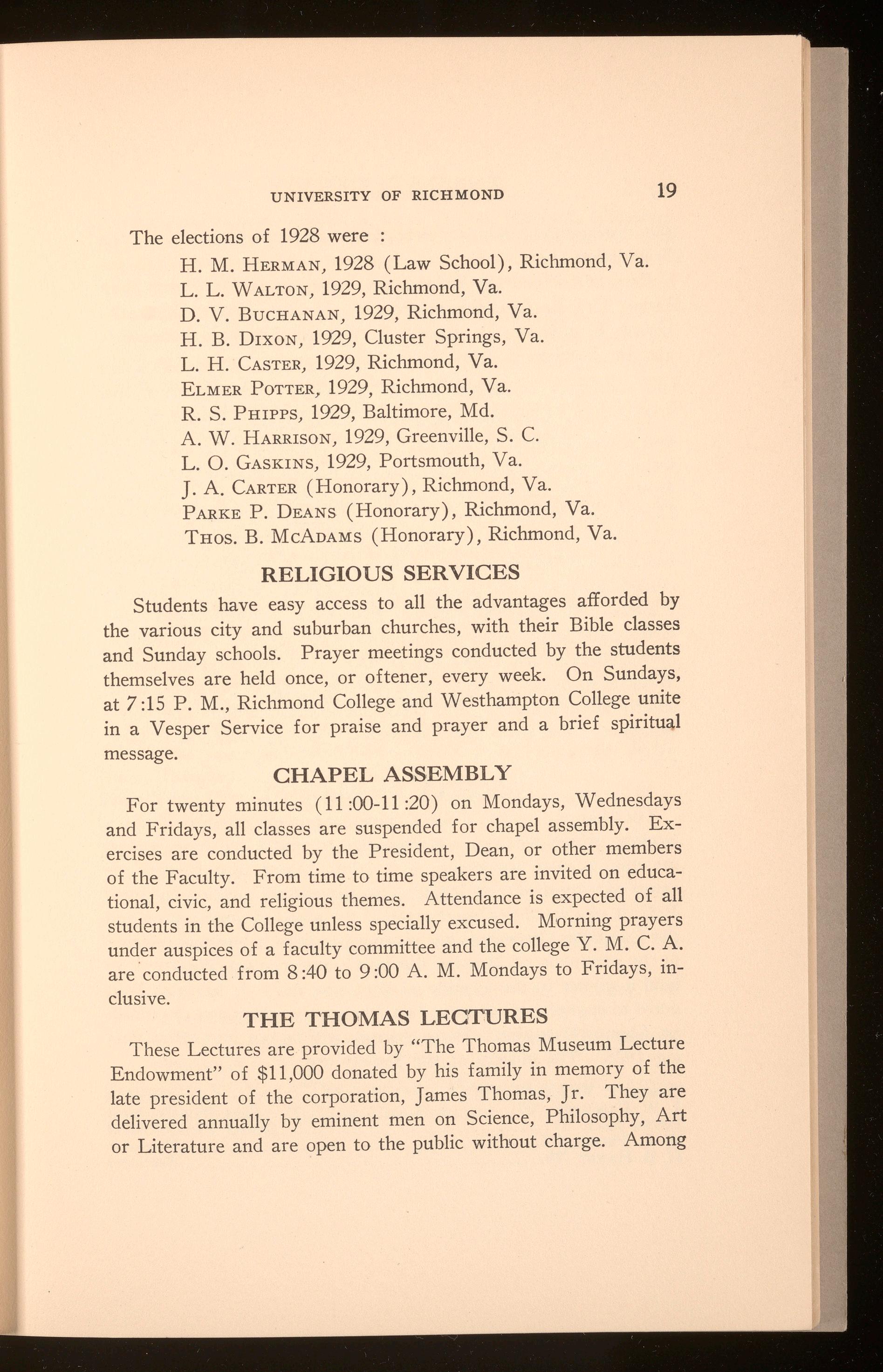
The elections of 1928 were :
H. M. HERMAN, 1928 (Law School), Richmond, Va.
L. L. WALTON,1929, Richmond, Va.
D. V. BUCHANAN,1929, Richmond, Va.
H. B. DIXON, 1929, Cluster Springs, Va.
L. H. CASTER,1929, Richmond, Va.
ELMER POTTER , 1929, Richmond, Va.
R. S. PHIPPS, 1929, Baltimore, Md.
A. W . HARRISON,1929, Greenville, S. C.
L. 0. GASKINS,1929, Portsmouth, Va.
J. A. CARTER(Honorary), Richmond, Va.
PARKE P. DEANS (Honorary), Richmond, Va.
THos. B. McADAMS (Honorary), Richmond, Va.
Students have easy access to all the advantages afforded by the various city and suburban churches, with their Bible classes and Sunday schools. Prayer meetings conducted by the students themselves are held once, or oftener, every week. On Sundays, at 7 :15 P. M., Richmond College and Westhampton College unite in a Vesper Service for praise and prayer and a brief spiritual message.
For twenty minutes (11 :00-11 :20) on Mondays, Wednesdays and Fridays, all classes are suspended for chapel assembly. Exercises are conducted by the President, Dean, or other members of the Faculty. From time to time speakers are invited on educational, civic, and religious themes. Attendance is expected of all students in the College unless specially excused. Morning prayers under auspices of a faculty committee and the college Y. M. C. A. are conducted from 8 :40 to 9 :00 A. M Mondays to Fridays, inclusive.
These Lectures are provided by "The Thomas Museum Lecture Endowment" of $11 ,000 donated by his family in memory of the late president of the corporation, James Thomas, Jr. They are delivered annually by eminent men on Science, Philosophy, Art or Literature and are open to the public without charge. Among
20
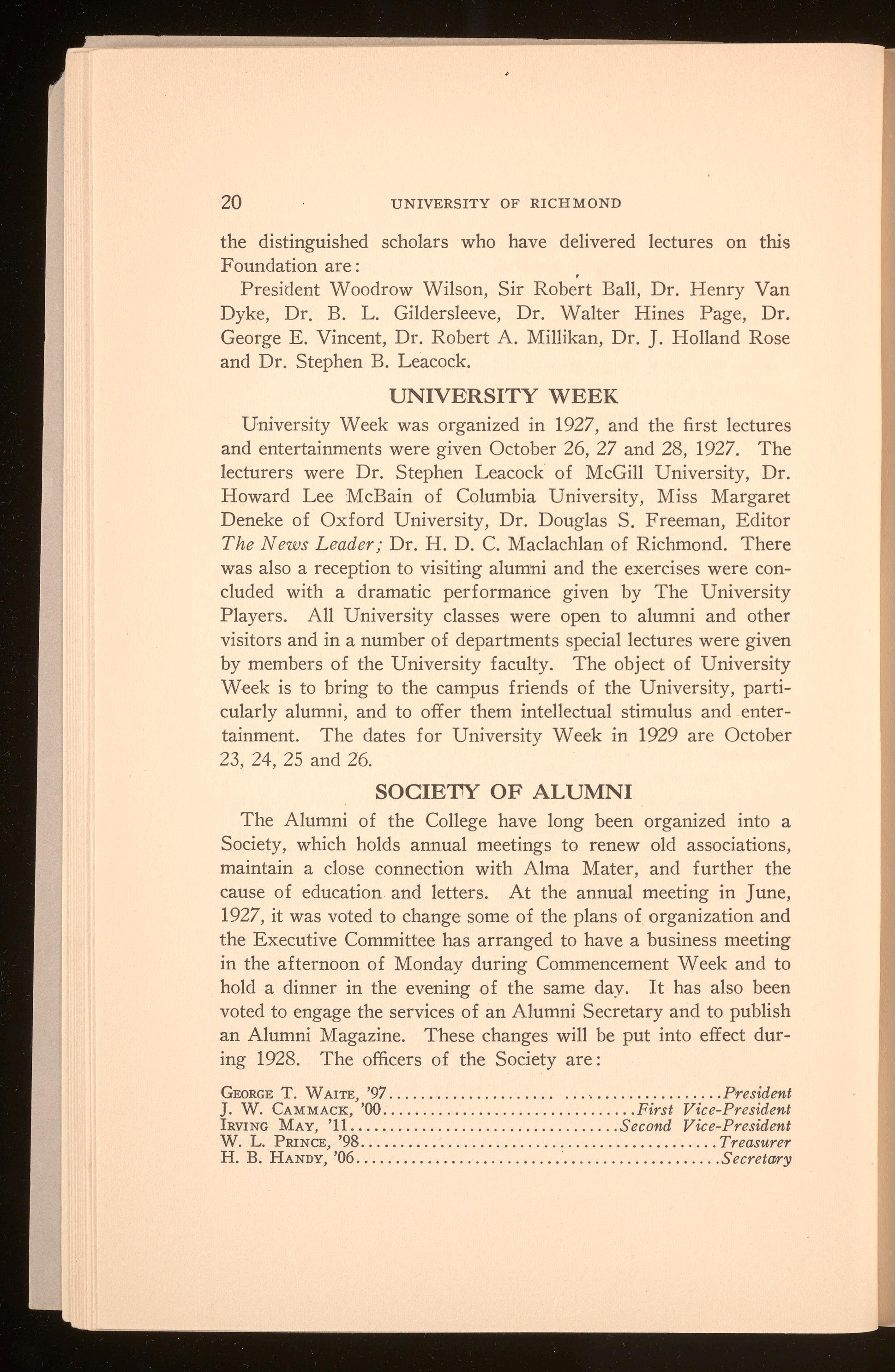
the distinguished scholars who have delivered lectures on this Foundation are:
President Woodrow Wilson, Sir Robert Ball, Dr. Henry Van Dyke, Dr. B. L. Gildersleeve, Dr. Walter Hines Page, Dr. George E. Vincent, Dr. Robert A. Millikan, Dr. J. Holland Rose and Dr. Stephen B. Leacock.
University Week was organized in 1927, and the first lectures and entertainments were given October 26, 27 and 28, 1927. The lecturers were Dr. Stephen Leacock of McGill University, Dr. Howard Lee McBain of Columbia University, Miss Margaret Deneke of Oxford University, Dr. Douglas S. Freeman, Editor The News Leader; Dr. H. D. C. Maclachlan of Richmond. There was also a reception to visiting alumni and the exercises were concluded with a dramatic performance given by The University Players. All University classes were open to alumni and other visitors and in a number of departments special lectures were given by members of the University faculty. The object of University Week is to bring to the campus friends of the University, particularly alumni, and to offer them intellectual stimulus and entertainment. The dates for University Week in 1929 are October 23, 24, 25 and 26.
The Alumni of the College have long been organized into a Society, which holds annual meetings to renew old associations, maintain a close connection with Alma Mater, and further the cause of education and letters. At the annual meeting in June, 1927, it was voted to change some of the plans of organization and the Executive Committee has arranged to have a business meeting in the afternoon of Monday during Commencement Week and to hold a dinner in the evening of the same day. It has also been voted to engage the services of an Alumni Secretary and to publish an Alumni Magazine. These changes will be put into effect during 1928. The officers of the Society are:
GEORGE T. WAITE, '97. . . . - President
J. W. CAMMACK, '00 ............................... First Vice-President
IRVING MAY, '11 ........ . ...................... . . Second Vice-President
W. L. PRINCE, '98 .............. . ..... . . . .... . ................. Treasurer
H. B. HANDY, '06 .......................... · Secreta,ry
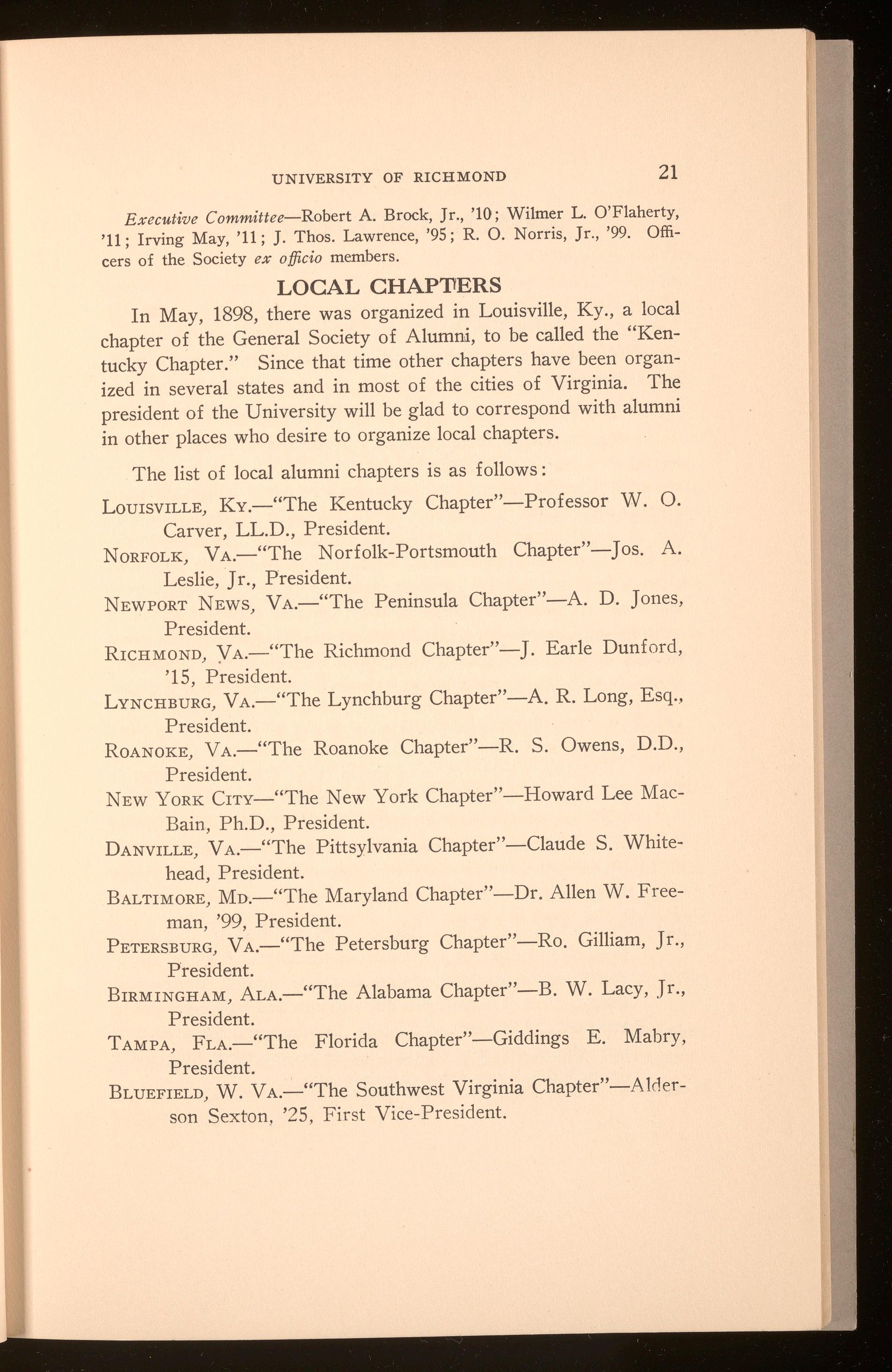
Executive Committee-Robert A. Brock, Jr., '10; Wilmer L. O'Flaherty, '11; Irving May, '11; J. Thos. Lawrence, '9S ; R. 0. Norris, Jr , '99. Officers of the Society ex officio members.
In May, 1898, there was organized in Louisville, Ky., a local chapter of the General Society of Alumni, to be called the "Kentucky Chapter." Since that time other chapters have been organized in several states and in most of the cities of Virginia. The president of the University will be glad to correspond with alumni in other places who desire to organize local chapters.
The list of local alumni chapters is as follows:
LouISVILLE, KY.-"The Kentucky Chapter"-Professor W. 0. Carver, LL.D., President.
NORFOLK, V A.-"The Norfolk-Portsmouth Chapter" - Jos. A. Leslie, Jr., President.
NEWPORTNEWS, VA.-"The Peninsula Chapter"-A. D. Jones, President.
RICHMOND , YA.-"The Richmond Chapter"-]. Earle Dunford, ' 15, President.
LYNCHBURG , VA.-"The Lynchburg Chapter"-A. R. Long, Esq., President.
ROANOKE , VA.-"The Roanoke Chapter"-R. S. Owens, D.D., President.
NEw YoRK CITY-"The New York Chapter"-Howard Lee MacBain, Ph.D., President.
DANVILLE,VA.-"The Pittsylvania Chapter"-Claude S. Whitehead, President.
BALTIMORE , MD.-"The Maryland Chapter"-Dr Allen W. Freeman, '99, President.
PETERSBURG,VA.-"The Petersburg Chapter"-Ro. Gilliam, Jr., President.
BIRMINGHAM,ALA.-"The Alabama Chapter"-B. W. Lacy, Jr., President.
TAMPA, FLA.-"The Florida Chapter"-Giddings E. Mabry, President.
BLUEFIELD,W. VA.-"The Southwest Virginia Chapter"-Alclerson Sexton, '25, First Vice-President.

For admission to Richmond College the general requirements are as follows :
1. The applicant must be at least sixteen years of age.
2. The applicant must present a certificate of honorable dismissal from the last school attended.
3. The applicant may be admitted ( 1) on a certificate from an accredited secondary school; (2) on a written examination; ( 3) on a transcript from another college.
The entrance requirements are stated in units. A unit represents a standard session's study in any subject, and constitutes approximately a quarter of a year's work. The requirements are:
(a) FoR ADMISSION : Graduation from an accredited secondary school, with not less than fifteen acceptable units distributed as follows; English, 3; Algebra, 1¼ ; Plane Geometry , 1 ; History, 1; Science, 1; the remaining units elective from high school graduation requirements, except that not more than four units of vocational work will be accepted , and no credit will be allowed for less than two units in any foreign language.
(b) FoR CANDIDATESFOR DEGREES: In addition to the above prescribed units for entrance, all candidates for the Bachelor's degrees must offer four entrance units in foreign language. Not less than two units in any one language will be accepted. A student who meets the admission requirements, but who is deficient in this degree requirement may make up such deficiency after entering college.
[ 22 ]
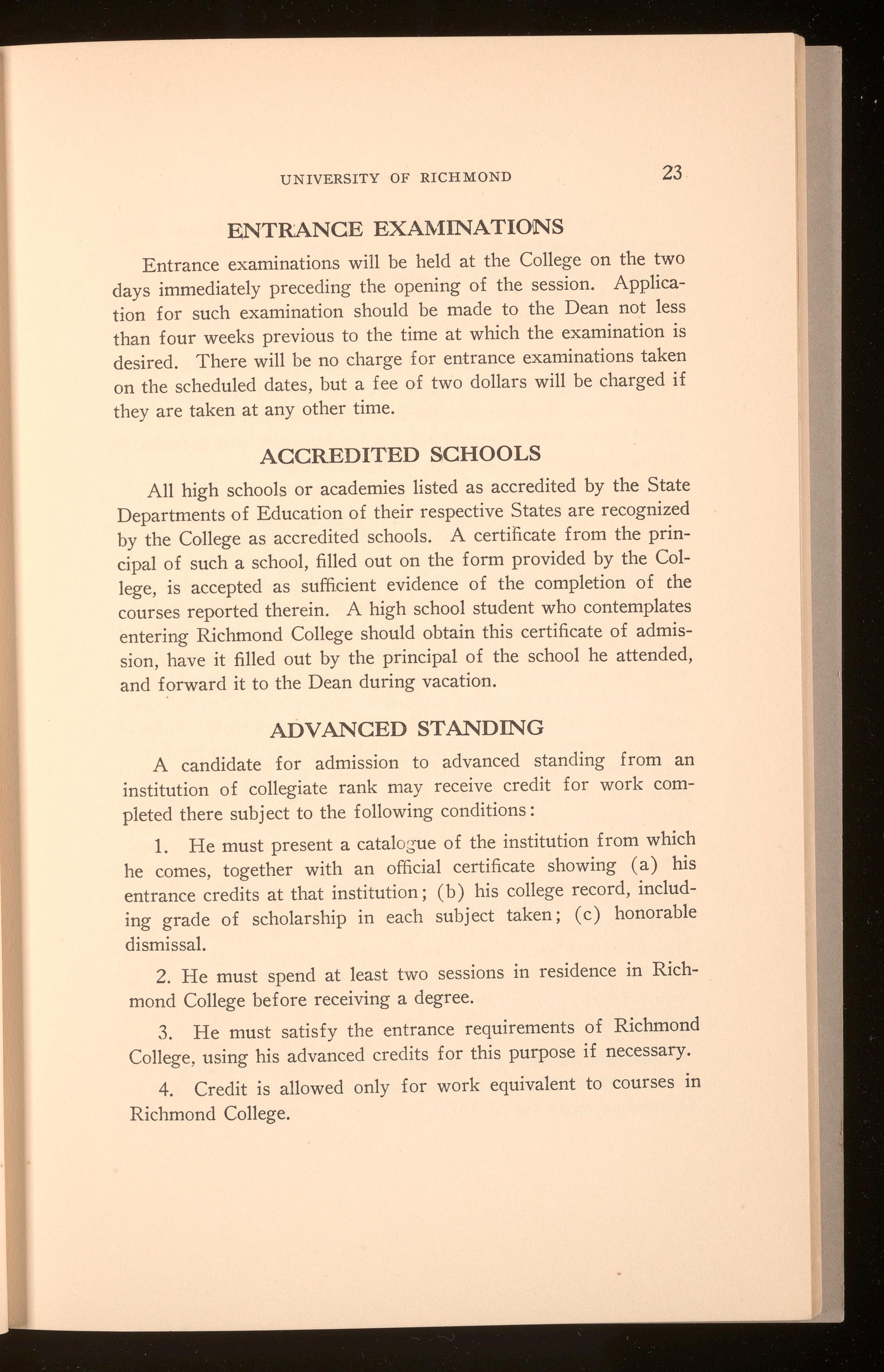
Entrance examinations will be held at the College on the two days immediately preceding the opening of the session. Application for such examination should be made to the Dean not less than four weeks previous to the time at which the examination is desired. There will be no charge for entrance examinations taken on the scheduled dates , but a fee of two dollars will be charged if the y are taken at any other time.
All high schools or academies listed as accredited by the State Departments of Education of their respective States are recognized by the College as accredited schools. A certificate from the principal of such a school, filled out on the form provided by the College , is accepted as sufficient evidence of the completion of the courses reported therein. A high school student who contemplates entering Richmond College should obtain this certificate of admission, have it filled out by the principal of the school he attended, and forward it to the Dean during vacation.
A candidate for admission to advanced standing from an in stitution of collegiate rank may receive credit for work completed there subject to the following conditions:
1. He must present a catal og-ue of the institution from which he comes, together with an official certificate showing (a) his entrance credits at that instituti on; (b) his college record, including grade of scholarship in each subject taken; ( c) honorable dismissal.
2. He must spend at least two sessions in residence in Richmond College before receiving a degree.
3. He must satisfy the entrance requirements of Richmond College , using his advanced credits for this purpose if necessary.
4. Credit is allowed only for work equivalent to courses in Richmond College.
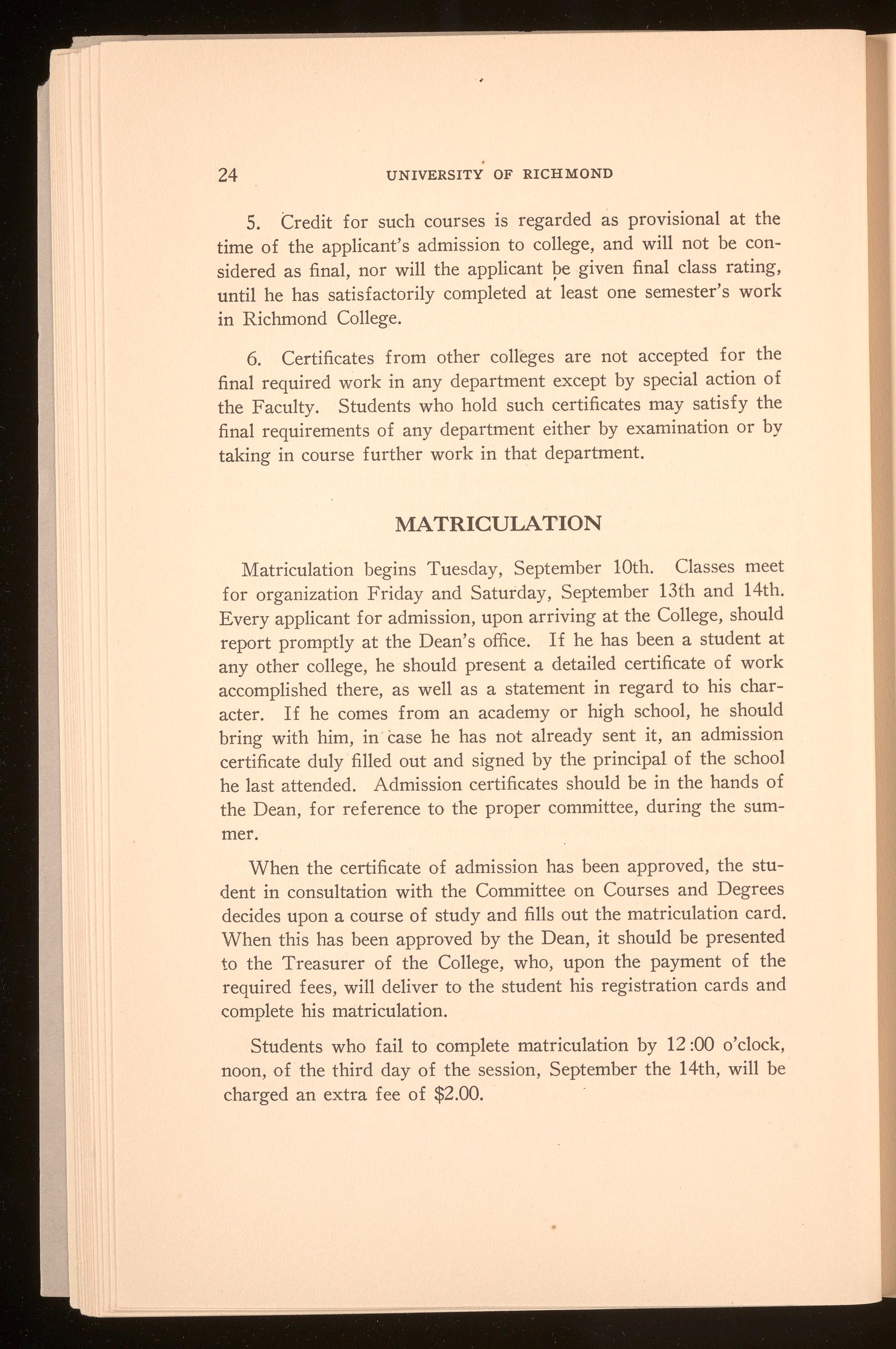
5. Credit for such courses is regarded as provisional at the time of the applicant's admission to college, and will not be considered as final, nor will the applicant pe given final class rating, until he has satisfactorily completed at least one semester's work in Richmond College.
6. Certificates from other colleges are not accepted for the final required work in any department except by special action of the Faculty. Students who hold such certificates may satisfy the final requirements of any department either by examination or by taking in course further work in that department.
Matriculation begins Tuesday, September 10th. Classes meet for organization Friday and Saturday, September 13th and 14th. Every applicant for admission, upon arriving at the College, should report promptly at the Dean's office. If he has been a student at any other college , he should present a detailed certificate of work accomplished there, as well as a statement in regard to his character. If he comes from an academy or high school, he should bring with him, in case he has not already sent it, an admission certificate duly filled out and signed by the principal of the school he last attended. Admission certificates should be in the hands of the Dean, for reference to the proper committee, during the summer.
When the certificate of admission has been approved, the student in consultation with the Committee on Courses and Degrees decides upon a course of study and fills out the matriculation card. When this has been approved by the Dean, it should be presented to the Treasurer of the College, who, upon the payment of the required fees, will deliver to the student his registration cards and complete his matriculation.
Students who fail to complete matriculation by 12 :00 o'clock, noon, of the third day of the session, September the 14th, will be charged an extra fee of $2.00.
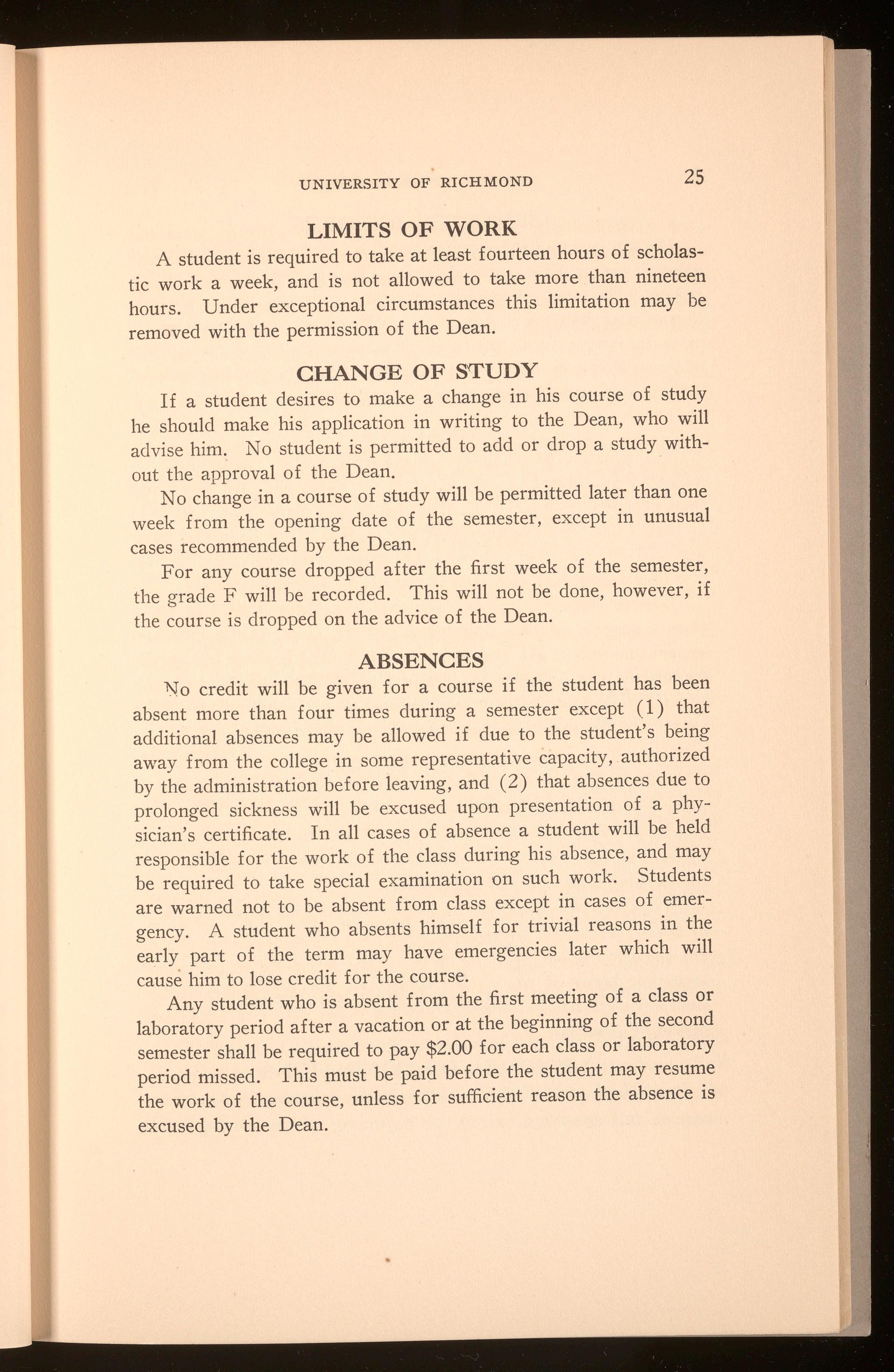
A student is required to take at least fourteen hours of scholastic work a week, and is not allowed to take more than nineteen hours. Under exceptional circumstances this limitation may be removed with the permission of the Dean.
If a student desires to make a change in his course of study he should make his application in writing to the Dean, who will advise him. No student is permitted to add or drop a study without the approval of the Dean.
No change in a course of study will be permitted later than one week from the opening date of the semester, except in unusual cases recommended by the Dean.
For any course dropped after the first week of the semester, the grade F will be recorded. This will not be done, however, if the course is dropped on the advice of the Dean.
1'Jo credit will be given for a course if the student has been absent more than four times during a semester except ( 1) that additional absences may be allowed if due to the student's being away from the college in some representative capacity, authorized by the administration before leaving, and (2) that absences due to prolonged sickness will be excused upon presentation of a physician's certificate. In all cases of absence a student will be held responsible for the work of the class during his absence, and may be required to take special examination on such work. Students are warned not to be absent from class except in cases of emergency. A student who absents himself for trivial reasons in the early part of the term may have emergencies later which will cause him to lose credit for the course.
Any student who is absent from the first meeting of a class or laboratory period after a vacation or at the beginning of the second semester shall be required to pay $2.00 for each class or laboratory period missed. This must be paid before the student may resume the work of the course, unless for sufficient reason the absence is excused by the Dean.
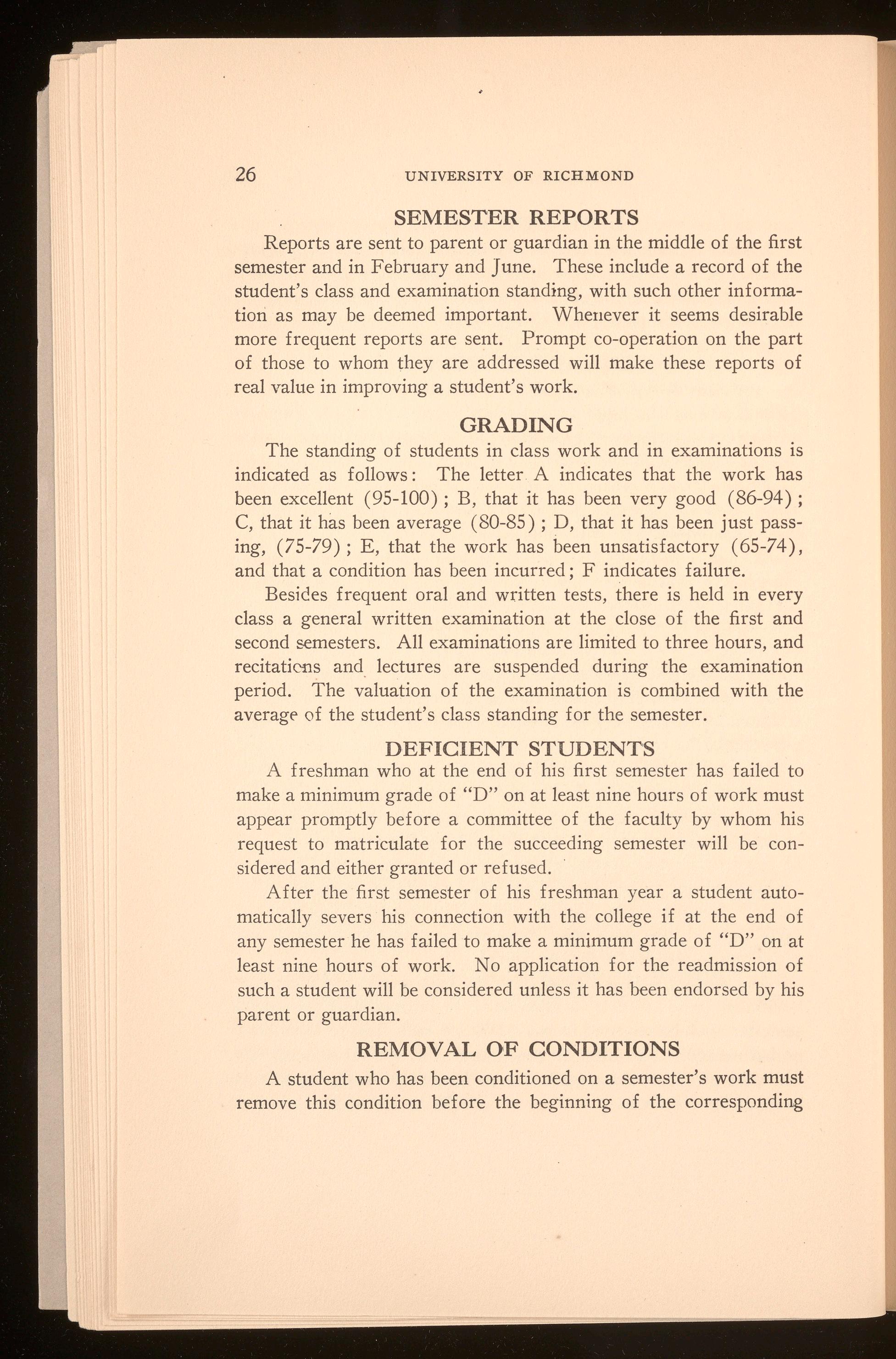
Reports are sent to parent or guardian in the middle of the first semester and in February and June. These include a record of the student's class and examination standing, with such other information as may be deemed important. Whenever it seems desirable more frequent reports are sent. Prompt co-operation on the part of those to whom they are addressed will make these reports of real value in improving a student's work.
The standing of students in class work and in examinations is indicated as follows: The letter A indicates that the work has been excellent (95-100); B, that it has been very good (86-94); C, that it has been average (80-85); D, that it has been just passing, (75-79) ; E, that the work has been unsatisfactory ( 65-74), and that a condition has been incurred; F indicates failure.
Besices frequent oral and written tests, there is held in every class a general written examination at the close of the first and second semesters. All examinations are limited to three hours, and recitaticns and _ lectures are suspended during the examination period. The valuation of the examination is combined with the averag«" of the student's class standing for the semester.
A freshman who at the end of his first semester has failed to make a minimum grade of "D" on at least nine hours of work must appear promptly before a committee of the faculty by whom his request to matriculate for the succeeding semester will be considered and either granted or refused.
After the first semester of his freshman year a student automatically severs his connection with the college if at the end of any semester he has failed to make a minimum grade of "D" on at least nine hours of work. No application for the readmission of such a student will be considered unless it has been endorsed by his parent or guardian.
A student who has been conditioned on a semester's work must remove this condition before the beginning of the corresponding

semester in the following college year, or the condition automatically becomes a failure. Special examinations for the removal of conditions may be given only on the dates specified in the college calendar, and upon authorization from the Dean's office, preceded by the payment of a fee of two dollars. All arrangements for special examinations must be made at least two weeks before the date of the examination. A student is permitted only one special examination on any condition. Failure to pass this converts the condition into a failure.
All Seniors must make up by February 10th all conditions of previous sessions. A Senior may not make up by special examination a deficiency on more than one subject taken in the Senior year, and this examination may not be given until the end of the second semester. If at the end of the first semester a Senior has been conditioned on as many as two subjects, he cannot remain a member of the Senior Class without special action of the Faculty.
1. The President of the University has general oversight and control of athletics, and is authorized to forbid any features in these exercises which endanger the health or morals of the participants.
2. Each team is allowed four trips from College, provided that these four trips do not involve being away from College more than seven days, and that no one trip shall require more than three days' absence from College duties. At least one day before the departure of any team the coach, through the manager, must furnish the Dean of the College a list of the men who will compose the team. All proposed games must have the approval of the President before engagements are made.
3. Athletic teams are permitted to engage in contests away from Richmond only with teams from other institutions of learning.
Richmond College holds membership in the Virginia-North Carolina Inter-Collegiate Athletic Conference, and members of all teams are expected to conform to the following by-laws of the Conference:
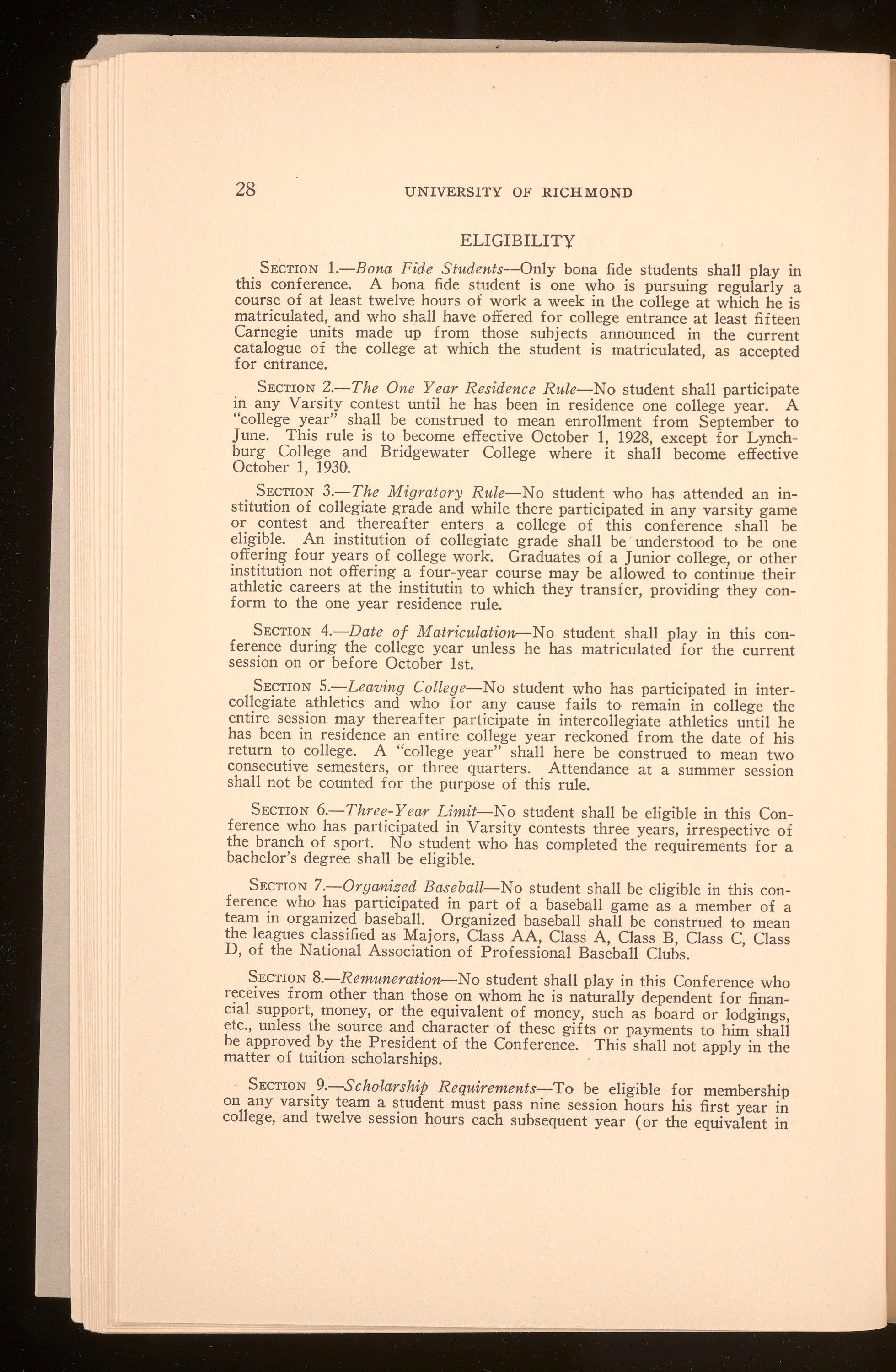
SECTION1.-Bona Fide Students-Only bona fide students shall play in this conference. A bona fide student is one who is pursuing regularly a course of at least twelve hours of work a week in the college at which he is matriculated, and who shall have offered for college entrance at least fifteen Carnegie units made up from those subjects announced in the current catalogue of the college at which the student is matriculated, as accepted for entrance.
SECTION2.-The One Year Residence Rule-No student shall participate in any Varsity contest until he has been in residence one college year. A "college year" shall be construed to mean enrollment from September to June. This rule is to become effective October 1, 1928, except for Lynch- burg College and Bridgewater College where it shall become effective October 1, 1930.
SECTION3.-The Migratory Ri,le-No student who has attended an institution of collegiate grade and while there participated in any varsity game or contest and thereafter enters a college of this conference shall be eligible. An institution of collegiate grade shall be understood to be one offering four years of college work. Graduates of a Junior college, or other institution not offering a four-year course may be allowed to continue their athletic careers at the institutin to which they transfer, providing they con- form to the one year residence rule.
SECTION4.-Date of Matriculation-No student shall play in this con- ference during the college year unless he has matriculated for the current session on or before October 1st.
SECTION5.-Leaving College-No student who has participated in inter- collegiate athletics and who for any cause fails to remain in college the entire session may thereafter participate in intercollegiate athletics until he has been in residence an entire college year reckoned from the date of his return to college. A "college year" shall here be construed to mean two consecutive semesters, or three quarters. Attendance at a summer session shall not be counted for the purpose of this rule.
SECTION6.-Three-Y ear Limit-No student shall be eligible in this Con- ference who has participated in Varsity contests three years, irrespective of the branch of sport. No student who has completed the requirements for a bachelor's degree shall be eligible.
SECTION7.-0rganized Baseball-No student shall be eligible in this con- ference who has participated in part of a baseball game as a member of a team in organized baseball. Organized baseball shall be construed to mean the leagues classified as Majors, Class AA, Class A, Class B, Class C, Class D, of the National Association of Professional Baseball Clubs.
SECTION8.-Remuneration--No student shall play in this Conference who receives from other than those on whom he is naturally dependent for finan- cial support, money, or the equivalent of money, such as board or lodgings, etc., unless the source and character of these gifts or payments to him shall be approved by the President of the Conference. This shall not apply in the matter of tuition scholarships.
SECTION.9.-Scholarship Requirements-To be eligible for membership on any varsity team a student must pass nine session hours his first year in college, and twelve session hours each subsequent year ( or the equivalent in
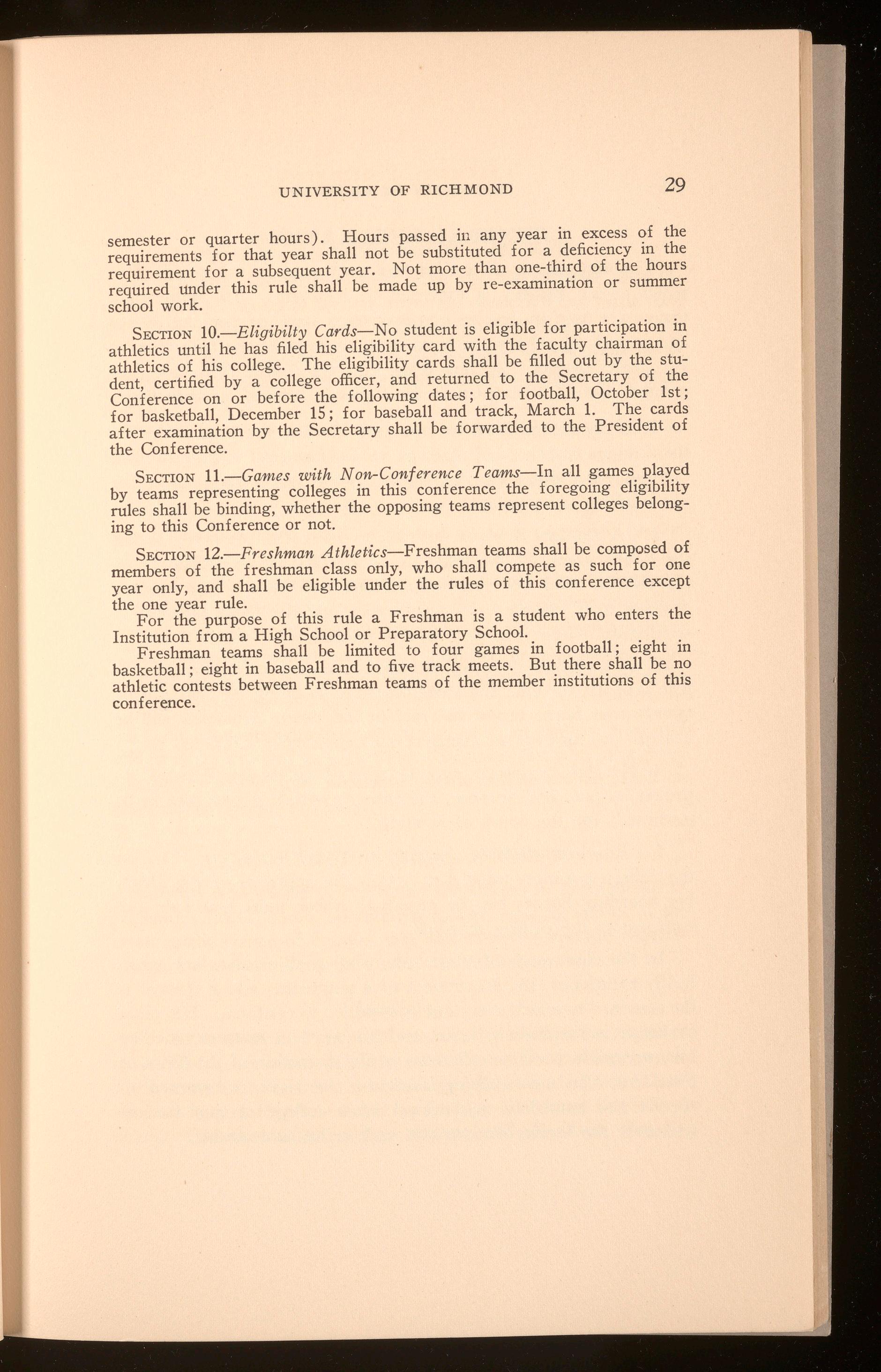
semester or quarter hours). Hours passed in any year in excess of the requirements for that year shall not be substituted for a deficiency in the requirement for a subsequent year. Not more than one-third of the hours required under this rule shall be made up by re-examination or summer school work.
SECTION10.-Eligibilty Cards-No student is eligible for participation in athletics until he has filed his eligibility card with the faculty chairman of athletics of his college. The eligibility cards shall be filled out by the student, certified by a college officer, and returned to the Secretary of the Conference on or before the following dates; for football, October 1st; for basketball, December 15; for baseball and track, March 1. The cards after examination by the Secretary shall be forwarded to the President of the Conference.
SECTION11.-Games with Non-Conference Teams-In all games played by teams representing colleges in this conference the foregoing eligibility rules shall be binding, whether the opposing teams represent colleges belonging to this Conference or not.
SECTION12.-Freshman Athletics-Freshman teams shall be composed of members of the freshman class only, who shall compete as such for one year only, and shall be eligible under the rules of this conference except the one year rule.
For the purpose of this rule a Freshman is a student who enters the Institution from a High School or Preparatory School.
Freshman teams shall be limited to four games in football; eight in basketball; eight in baseball and to five track meets. But there shall be no athletic contests between Freshman teams of the member institutions of this conference.
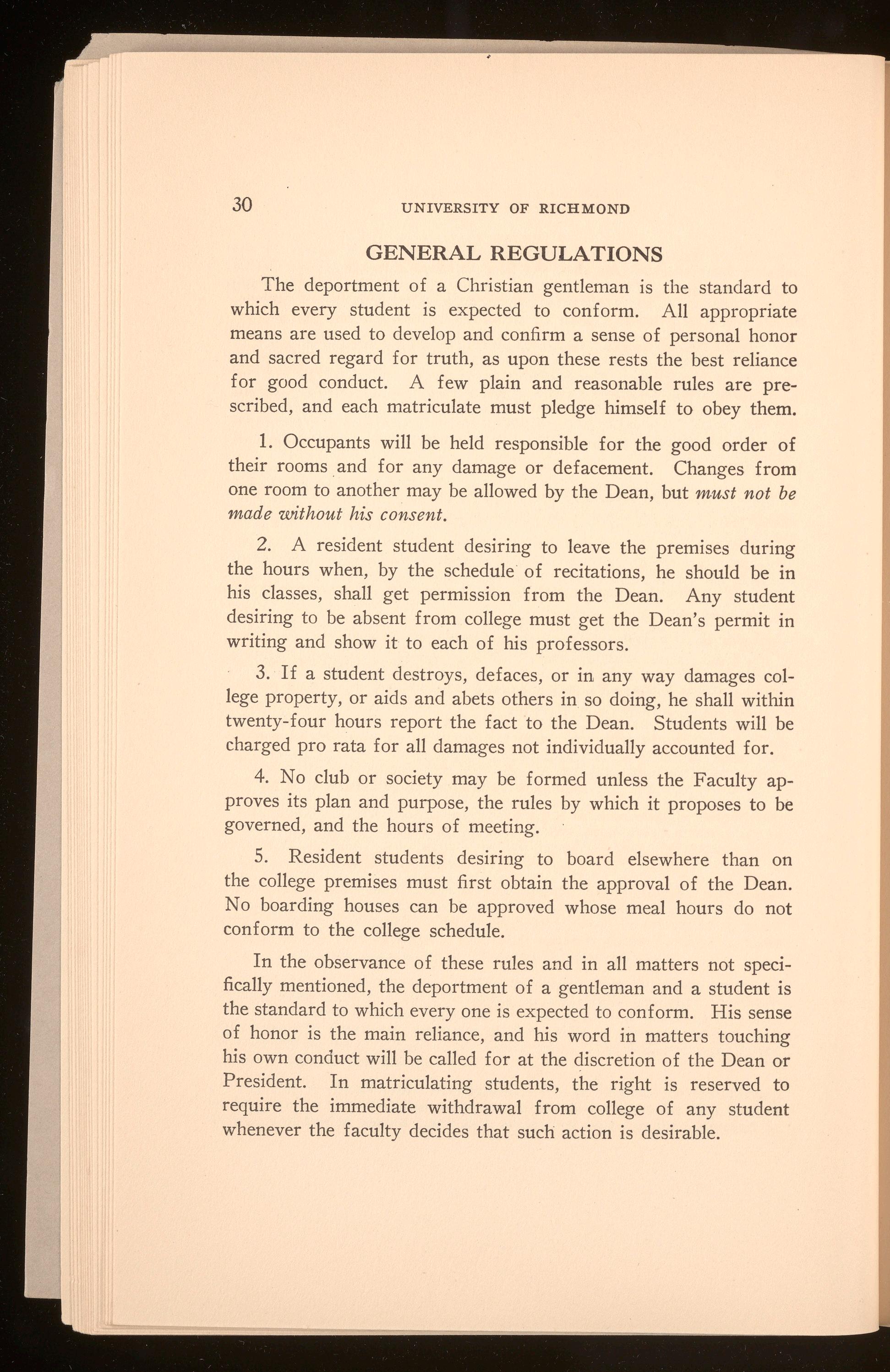
The deportment of a Christian gentleman is the standard to which every student is expected to conform. All appropriate means are used to develop and confirm a sense of personal honor and sacred regard for truth, as upon these rests the best reliance for good conduct. A few plain and reasonable rules are prescribed, and each matriculate must pledge himself to obey them.
1. Occupants will be held responsible for the good order of their rooms and for any damage or defacement. Changes from one room to another may be allowed by the Dean, but must not be made without his consent.
2. A resident student desiring to leave the premises during the hours when, by the schedule of recitations, he should be in his classes, shall get permission from the Dean. Any student desiring to be absent from college must get the Dean's permit in writing and show it to each of his professors.
3. If a student destroys, defaces, or in any way damages college property, or aids and abets others in so doing, he shall within twenty-four hours report the fact to the Dean. Students will be charged pro rata for all damages not individually accounted for.
4. No club or society may be formed unless the Faculty approves its plan and purpose, the rules by which it proposes to be governed, and the hours of meeting.
5. Resident students desiring to board elsewhere than on the college premises must first obtain the approval of the Dean. No boarding houses can be approved whose meal hours do not conform to the college schedule.
In the observance of these rules and in all matters not specifically mentioned, the deportment of a gentleman and a student is the standard to which every one is expected to conform. His sense of honor is the main reliance, and his word in matters touching his own conduct will be called for at the discretion of the Dean or President. In matriculating students, the right is reserved to require the immediate withdrawal from college of any student whenever the faculty decides that such action is desirable.
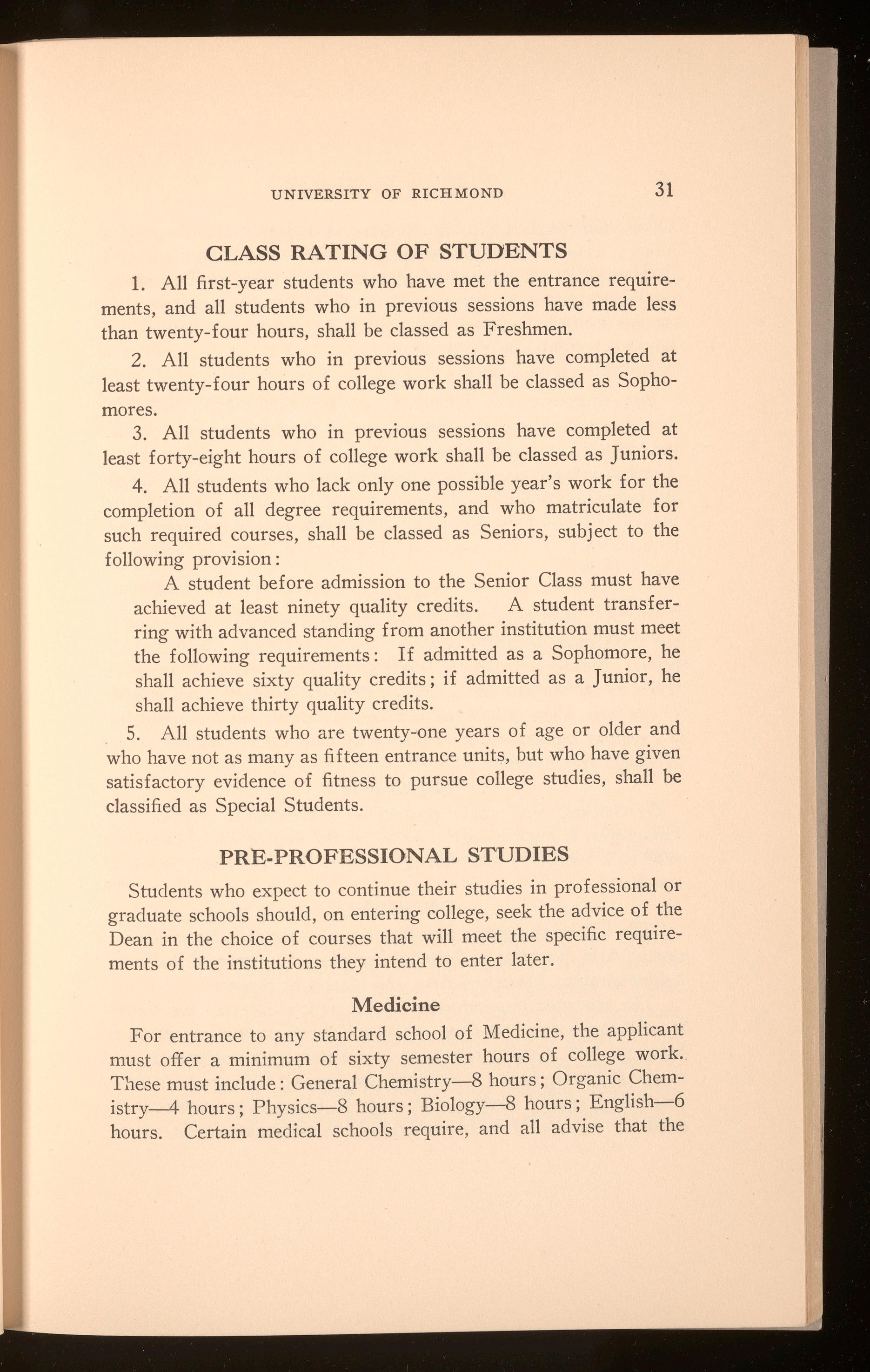
1. All first-year students who have met the entrance requirements, and all students who in previous sessions have made less than twenty-four hours, shall be classed as Freshmen.
2. All students who in previous sessions have completed at least twenty-four hours of college work shall be classed as Sophomores.
3. All students who in previous sessions have completed at least forty-eight hours of college work shall be classed as Juniors.
4. All students who lack only one possible year's work for the completion of all degree requirements, and who matriculate for such required courses, shall be classed as Seniors, subject to the following provision :
A student before admission to the Senior Class must have achieved at least ninety quality credits. A student transferring with advanced standing from another institution must meet the following requirements : If admitted as a Sophomore, he shall achieve sixty quality credits; if admitted as a Junior, he shall achieve thirty quality credits.
5. All students who are twenty~one years of age or older and who have not as many as fifteen entrance units, but who have given satisfactory evidence of fitness to pursue college studies, shall be classified as Special Students.
Students who expect to continue their studies in professional or graduate schools should, on entering college, seek the advice of the Dean in the choice of courses that will meet the specific requirements of the institutions they intend to enter later.
For entrance to any standard school of Medicine, the applicant must offer a minimum of sixty semester hours of college work. . These must include : General Chemistry-8 hours ; Organic Chemistry--4 hours; Physics-8 hours; Biology-8 hours ; English-6 hours. Certain medical schools require, and all advise that the

pre-medical student take three years in college ( ninety semester hours), to better meet the exacting demands of the modern science of Medicine. Attention is called to the opportunity of substituting one year's work at an approved medical school for twenty-four of the required hours of the degree of Bachelor of Science, as stated in detail on pages 34-35.
For entrance to any School of Law approved by the American Bar Association and the Association of American Law Schools, the applicant must offer a minimum of sixty hours of college work. These may be so chosen that, together with forty additional hours in Richmond College and the first year in the T. C. Williams School of Law of the University of Richmond, they will meet the requirements for the degree of Bachelor of Arts, as stated on pages 33-34.
The entrance requirements for standard schools of Dentistry are a minimum of thirty semester hours, including: Chemistry-6 hours ; Biology-6 hours ; English-6 hours, and Physics-6 hours, if the student has not had a unit of Physics in high school. If the three sciences have to be taken, the minimum time required is a regular session and a summer school session. Two full years in college are advised.
By choosing the proper courses in Mathematics, Science and Languages, a student may transfer at the end of the sophomore year to a school of Engineering without loss of credits or class standing.
The following degrees are offered in Richmond College : Bachelor of Arts, Bachelor of Science, Bachelor of Science in Business Administration, Master of Arts, and Master of Science.
The academic requirements for the several degrees are stated in semester hours, one class period per week through a semester being the unit. Quality credits are calculated from academic hours on the following basis : A semester hour passed with grade A shall count three quality credits; with grade B, two quality credits; with grade C, one quality credit; with grade D, no quality credit. It is
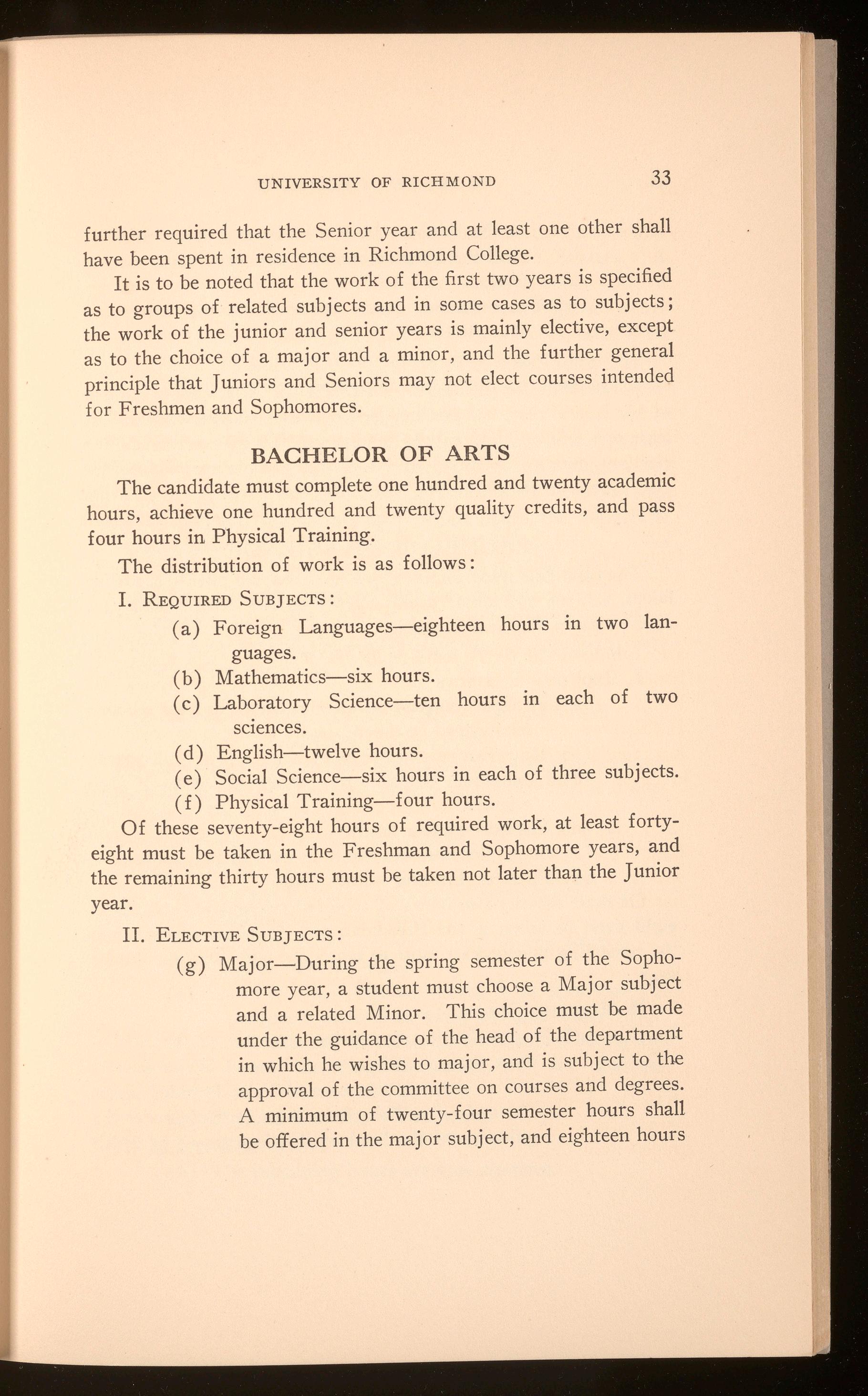
further required that the Senior year and at least one other shall have been spent in residence in Richmond College.
It is to be noted that the work of the first two years is specified as to groups of related subjects and in some cases as to subjects; the work of the junior and senior years is mainly elective, except as to the choice of a major and a minor, and the further general principle that Juniors and Seniors may not elect courses intended for Freshmen and Sophomores.
The candidate must complete one hundred and twenty academic hours, achieve one hundred and twenty quality credits, and pass four hours in Physical Training.
The distribution of work is as follows :
I. REQUIRED SUBJECTS:
(a) Foreign Languages-eighteen hours m two languages.
(b) Mathematics-six hours.
(
c) Laboratory Science-ten hours m each of two sciences.
( d) English-twelve hours.
(
e) Social Science-six hours in each of three subjects.
(f) Physical Training-four hours.
Of these seventy-eight hours of required work, at least fortyeight must be taken in the Freshman and Sophomore years, and the remaining thirty hours must be taken not later than the Junior year.
II. ELECTIVE SUBJECTS:
(g) Major-During the spring semester of the Sophomore year, a student must choose a Major subject and a related Minor. This choice must be made under the guidance of the head of the department in which he wishes to major, and is subject to the approval of the committee on courses and degrees.
A minimum of twenty-four semester hours shall be offered in the major subject, and eighteen hours
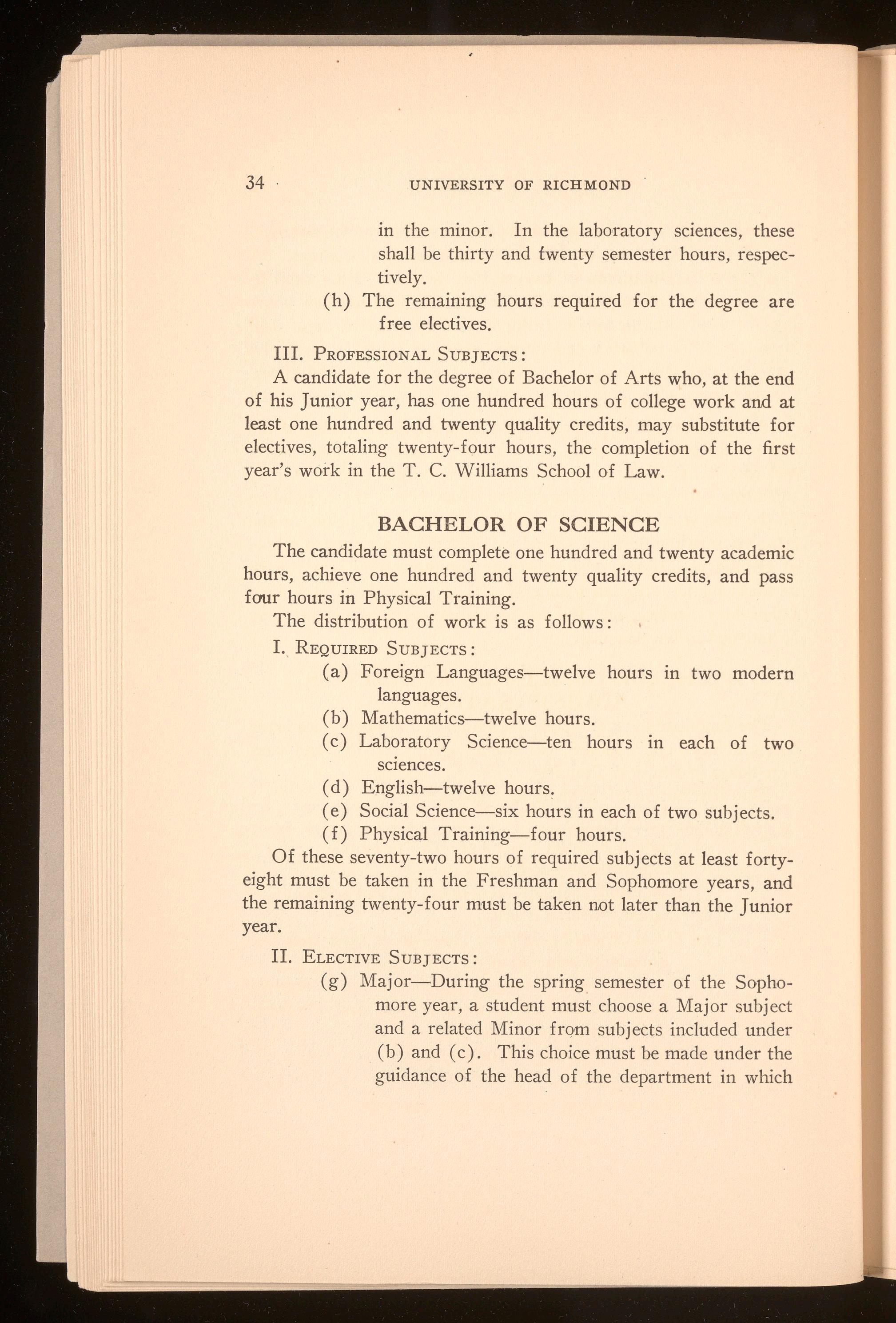
in the minor. In the laboratory sciences, these shall be thirty and twenty semester hours, respectively.
(h) The remaining hours required for the degree are free electives.
III. PROFESSIONAL SUBJECTS:
A candidate for the degree of Bachelor of Arts who, at the end of his Junior year, has one hundred hours of college work and at least one hundred and twenty quality credits, may substitute for electives, totaling twenty-four hours, the completion of the first year's work in the T. C. Williams School of Law.
The candidate must complete one hundred and twenty academic hours, achieve one hundred and twenty quality credits, and pass four hours in Physical Training.
The distribution of work is as follows :
I. REQUIRED SUBJECTS:
(a) Foreign Languages-twelve hours m two modern languages.
(b) Mathematics-twelve hours.
( c) Laboratory Science-ten hours m each of two sciences.
( d) English-twelve hours:
( e) Social Science-six hours in each of two subjects.
(f) Physical Training-four hours.
Of these seventy-two hours of required subjects at least fortyeight must be taken in the Freshman and Sophomore years, and the remaining twenty-four must be taken not later than the Junior year.
II. ELECTIVE SUBJECTS:
(g) Major-During the spring semester of the Sophomore year, a student must choose a Major subject and a related Minor from subjects included under (b) and ( c). This choice must be made under the guidance of the head of the department in which

he wishes to major, and is subject to the approval of the committee on courses and degrees. A minimum of twenty-four semester hours shall be offered in the major subject, and eighteen hours in the minor. In the laboratory sciences, these shall be thirty and twenty semester hours, respectively.
(h) Remaining hours for the degree are free electives.
III. PROFESSIONAL SUBJECTS:
A candidate for the degree of Bachelor of Science who, at the end of his Junior year, has one hundred hours of college work, and who has at least one hundred and twenty quality credits, may substitute for electives, totaling twenty-four hours, the completion of the first year's work in a standard school of Medicine, or the completion of the first and second year's work in a standard school of Dentistry. He may also substitute for the second year's work in Mathematics, stipulated under I (b), a year's work in a third Laboratory Science, and the foreign language requirements may be satisfied in one language.
The candidate must complete one hundred and twenty academic hours, achieve one hundred and twenty quality credits, and pass four hours in Physical Training.
The distribution of work is as follows:
I. REQUIRED SUBJECTS:
(a) Modern Foreign Language-twelve hours.
(b) Mathematics-six hours.
(
c) Laboratory Science-ten hours in one science.
( d) English-twelve hours.
(
e) Social Science-eighteen hours in at least two Departments other than those included under ( f).
( f) Economics and Business Administration-forty-two hours, including Economics 1-2, and Business Administration 3-4 and 5-6.
(g) Physical Training-four hours.
II. ELECTIVE SUBJECTS:
(h) The remaining hours are free electives.
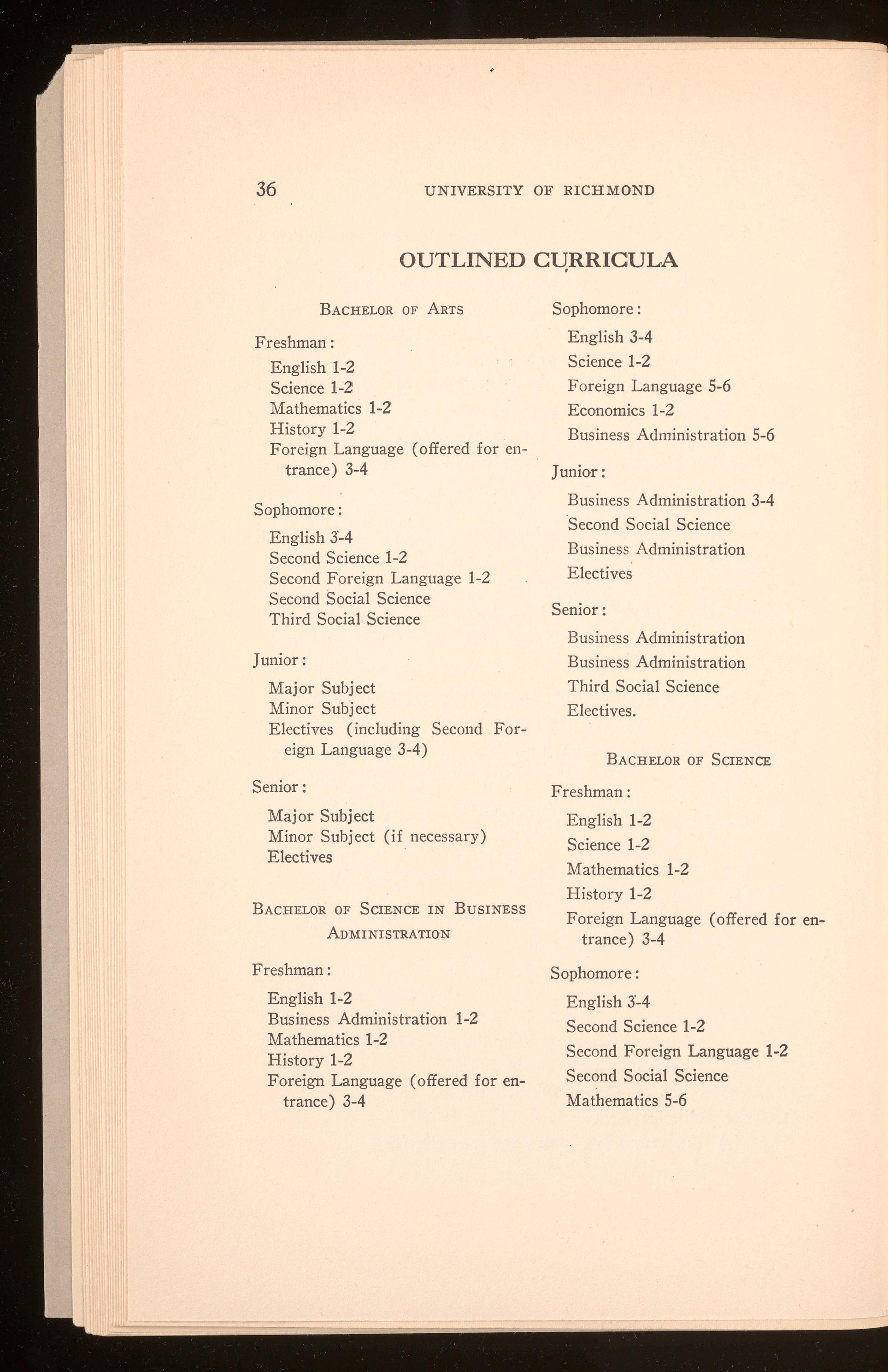
BACHELOR OF ARTS
Freshman:
English 1-2
Science 1-2
Mathematics 1-2
History 1-2
Foreign Language (offered for entrance) 3-4
Sophomore:
English 3'-4
Second Science 1-2
Second Foreign Language 1-2
Second Social Science
Third Social Science
Junior:
Major Subject Minor Subject Electives (including Second Foreign Language 3-4)
Senior:
Major Subject Minor Subject (if necessary) Electives
BACHELOR OF SCIENCE IN BUSINESS ADMINISTRATION
Freshman:
English 1-2
Business Administration 1-2
Mathematics 1-2
History 1-2
Foreign Language ( offered for entrance) 3-4
Sophomore:
English 3-4
Science 1-2
Foreign Language 5-6
Economics 1-2
Business Administration 5-6
Junior:
Business Administration 3-4
Second Social Science
Business Administration
Electives
Senior:
Business Administration
Business Administration
Third Social Science Electives.
BACHELOR OF SCIENCE
Freshman:
English 1-2
Science 1-2
Mathematics 1-2
History 1-2
Foreign Language ( offered for entrance) 3-4
Sophomore:
English 3·_4
Second Science 1-2
Second Foreign Language 1-2
Second Social Science
Mathematics 5-6
PRE-LAW (Two Years)
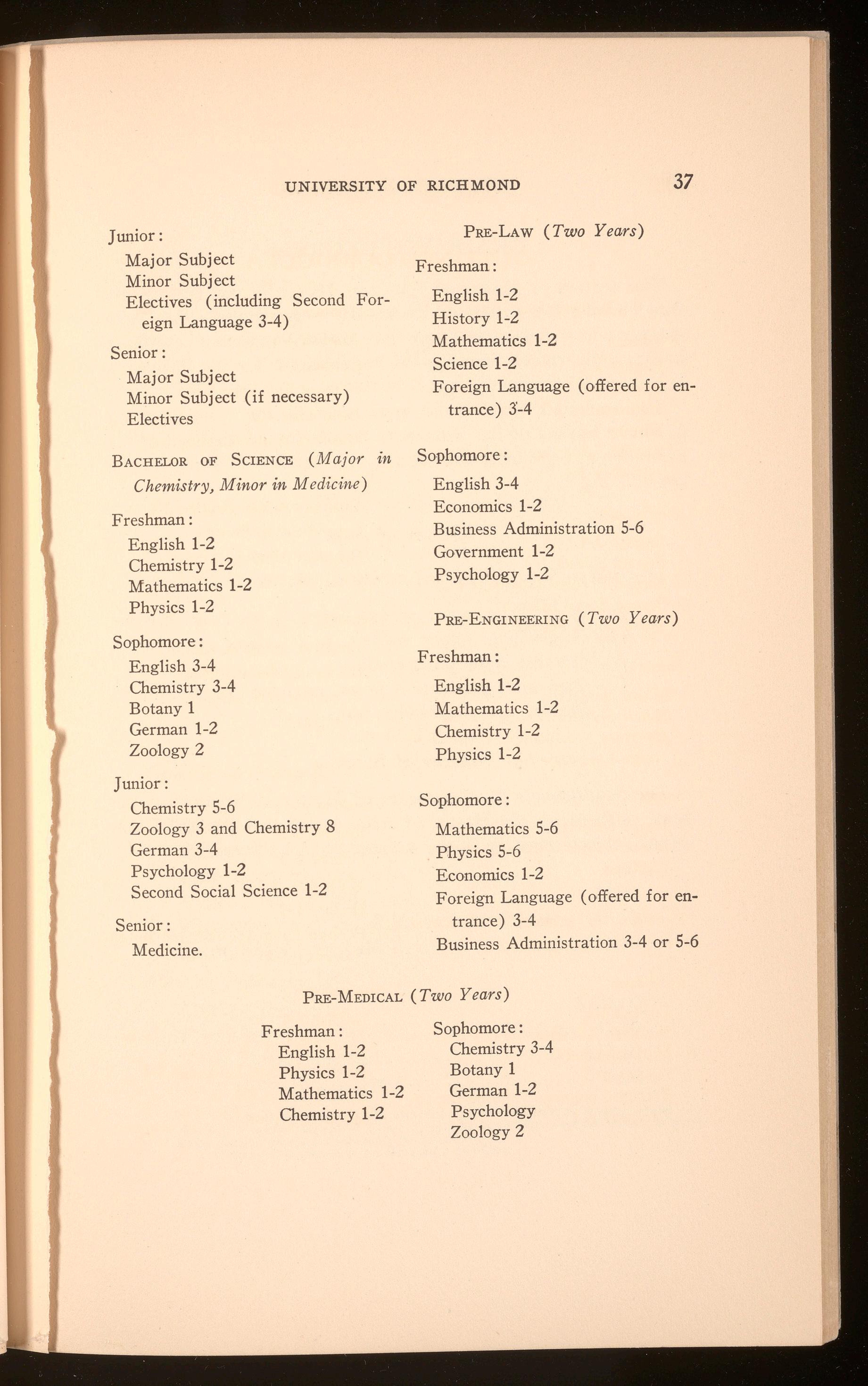
Junior:
Major Subject
Minor Subject
Electives (including Second Foreign Language 3-4)
Senior:
Major Subject
Minor Subject (if necessary)
Electives
BACHELOR OF SCIENCE (Major in Chemistry, Minor in Medicine)
Freshman: English 1-2
Chemistry 1-2
Mathematics 1-2
Physics 1-2
Sophomore:
English 3-4
Chemistry 3-4
Botany 1
German 1-2
Zoology 2
Junior:
Chemistry 5-6
Zoology 3 and Chemistry 8
German 3-4
Psychology 1-2
Second Social Science 1-2
Senior: Medicine.
Freshman:
English 1-2
History 1-2
Mathematics 1-2
Science 1-2
Foreign Language (offered for entrance) 3'-4
Sophomore:
English 3-4
Economics 1-2
Business Administration 5-6
Government 1-2
Psychology 1-2
PRE-ENGINEERING ( Two Years)
Freshman:
English 1-2
Mathematics 1-2
Chemistry 1-2
Physics 1-2
Sophomore: Mathematics 5-6
Physics 5-6
Economics 1-2
Foreign Language ( offered for entrance) 3-4
Business Administration 3-4 or 5-6
PRE-MEDICAL ( Two Years)
Freshman:
English 1-2
Physics 1-2
Mathematics 1-2
Chemistry 1-2
Sophomore: Chemistry 3-4
Botany 1
German 1-2
Psychology
Zoology 2
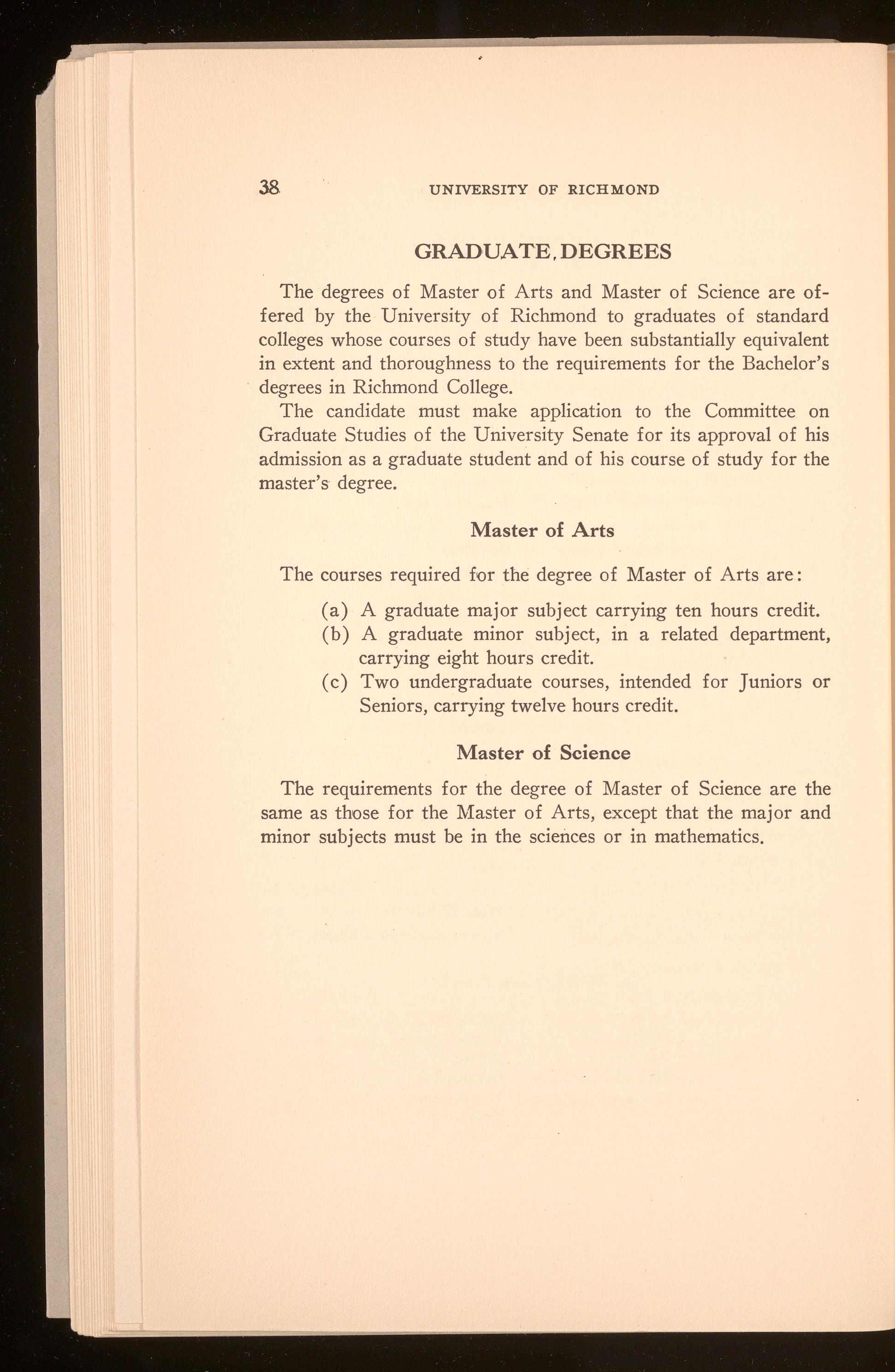
The degrees of Master of Arts and Master of Science are offered by the University of Richmond to graduates of standard colleges whose courses of study have been substantially equivalent in extent and thoroughness to the requirements for the Bachelor's degrees in Richmond College.
The candidate must make application to the Committee on Graduate Studies of the University Senate for its approval of his admission as a graduate student and of his course of study for the master's degree.
The courses required for the degree of Master of Arts are:
(a) A graduate major subject carrying ten hours credit.
(b) A graduate minor subject, in a related department, carrying eight hours credit.
( c) Two undergraduate courses, intended for Juniors or Seniors, carrying twelve hours credit.
The requirements for the degree of Master of Science are the same as those for the Master of Arts, except that the major and minor subjects must be in the sciences or in mathematics.
The expenses of students residing in College dormitories, payable at the Treasurer's office, which also include room and board, vary from *$500 to $535 for the college session, September to June, and are divided as follows:
College fee ............ . ................ $ 35.00
Contingent fee.......................... 5.00
*Tuition
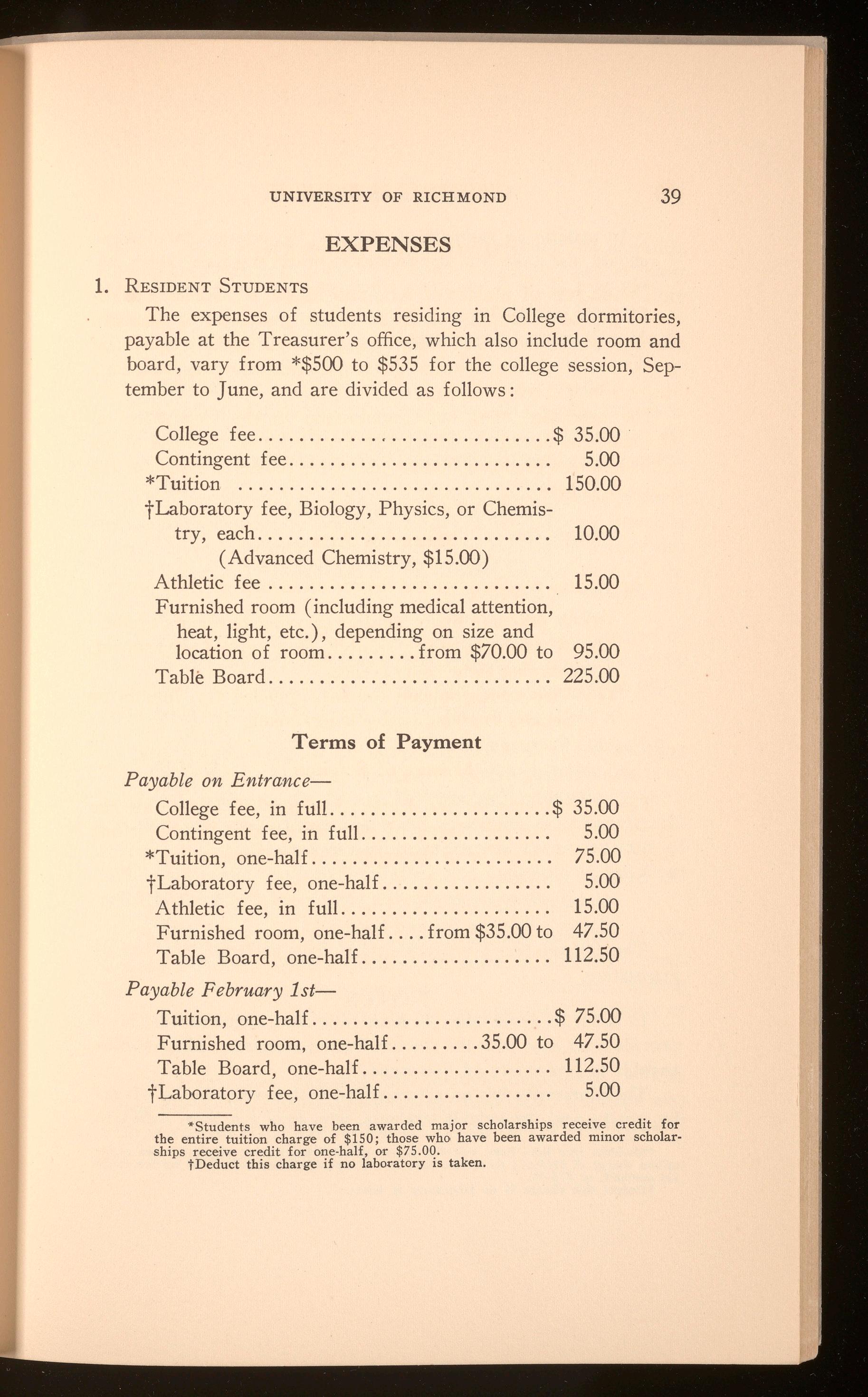
150.00
tLaboratory fee, Biology, Physics, or Chemistry, each............................. 10.00
(Advanced Chemistry, $15.00)
Athletic fee .
15.00
Furnished room ( including medical attention, heat, light, etc.), depending on size and location of room ......... from $70.00 to 95.00
Table Board.
Payable on Entrance-
225.00
College fee, in full ...................... $ 35.00
Contingent fee, in full. .
*Tuition, one-half. .
tLaboratory fee, one-half.
. 5.00
75.00
5.00
Athletic fee, in full..................... 15.00
Furnished room, one-half .... from $35.00 to 47.50
Table Board, one-half. .
Payable February lst-
112.50
Tuition, one-half ........................ $ 75.00
Furnished room, one-half ......... 35.00 to 47.50
Table Board, one-half. .
. 112.50
tLaboratory fee, one-half................. 5.00
*Students who have been awarded major scholarships receive credit for the entire tuition charge of $150; those who have been awarded minor scholar• ships receive credit for one-half, or $75.00. tDeduct this charge if no Jabo,atory is taken.
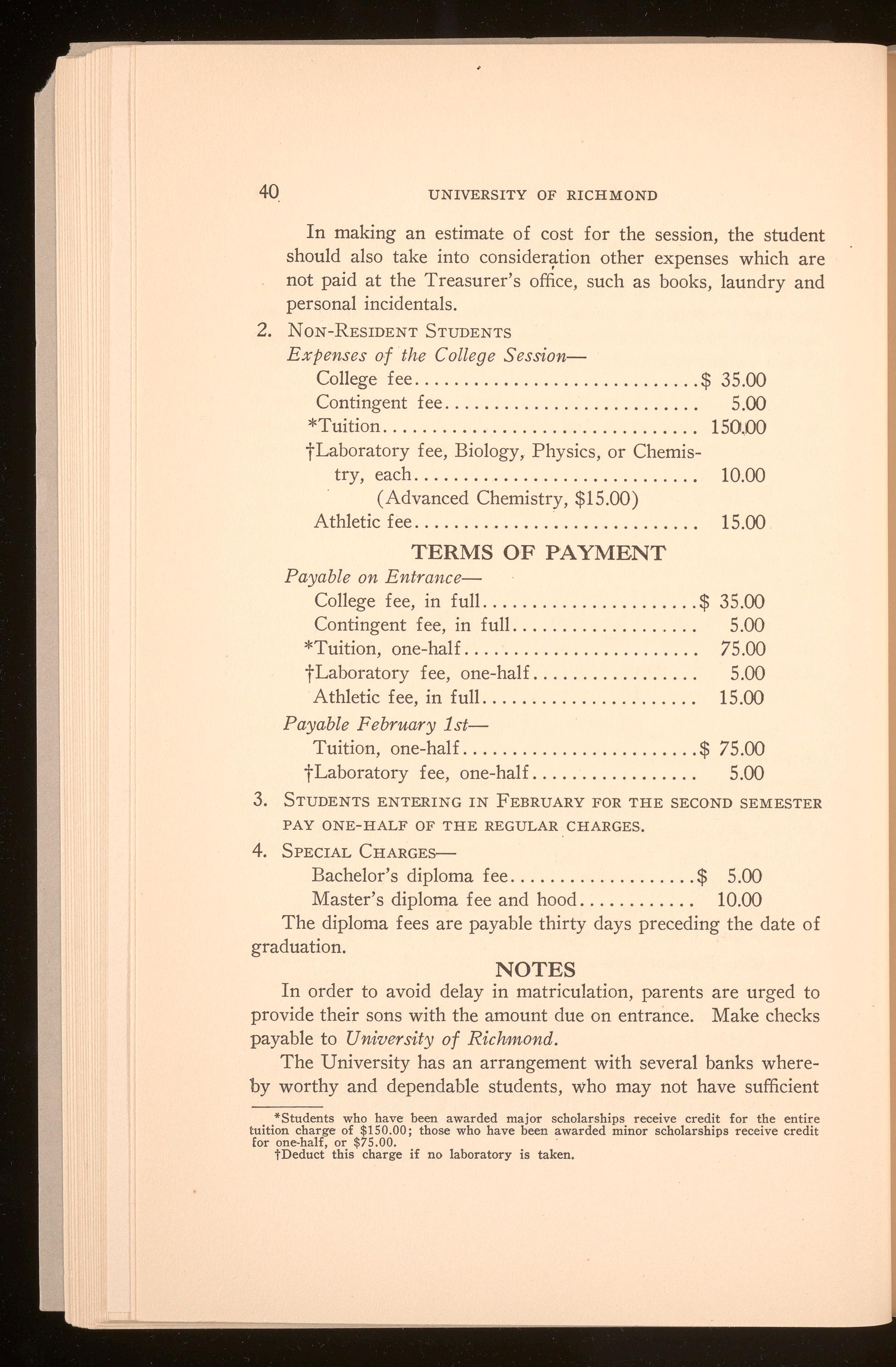
UNIVERSITY OF RICHMOND
In making an estimate of cost for the session, the student should also take into consider~tion other expenses which are not paid at the Treasurer's office, such as books, laundry and personal incidentals.
2. NON-RESIDENT STUDENTS
Expenses of the College SessionCollege fee . . ............... . $ 35.00
Contingent fee............... . .......... 5.00
*Tuition ................................ 150.00
tLaboratory fee, Biology, Physics, or Chemistry, each.................
(Advanced Chemistry, $15.00) Athletic fee.
Payable on EntranceCollege fee, in full ............ . .. . ...... $ 35.00
Contingent fee, in full................... 5.00
*Tuition, one-half.
Payable February lstTuition, one-half ........................ $
tLaboratory fee, one-half.................
3. STUDENTS ENTERING IN FEBRUARY FOR THE SECOND SEMESTER PAY ONE-HALF OF THE REGULAR CHARGES.
4. SPECIAL CHARGES-
Bachelor's diploma fee .................. $ 5.00 Master's diploma fee and hood.
10.00
The diploma fees are payable thirty days preceding the date of graduation.
In order to avoid delay in matriculation, parents are urged to provide their sons with the amount due on entrance. Make checks payable to University of Riclvmond.
The University has an arrangement with several banks whereby worthy and dependable students, who may not have sufficient
*Students who have been awarded major scholarships receive credit for the entire tuition charge of $150.00; those who have been awarded minor scholarships receive credit for one-half, or $75.00. · tDeduct this charge if no laboratory is taken.

funds at hand to pay all that is due the Treasurer on entrance, may obtain short-term loans. The student himself, however, must be in a position to pay a substantial part of the amount due before the loan is approved. In addition to this, the President of the University has at his disposal several small loan funds with which to assist needy students.
The College fee is an entrance charge paid by all students to cover the privileges of the campus and buildings, including the use of library, and is not subject to deduction or in any case refunded.
The Contingent Fee of $5.00 is charged each student to cover unnecessary damage to college property, loss of books from the library, use of medicine from the infirmary, etc. Such part of this fee as is unused is returned to the student at the close of the sess10n.
The Athletic Fee of $15.00 was established upon petit10n of students and alumni. The fee covers membership in the Athletic Association and admits to all games played by the College teams on home grounds. The fee is not refundable.
Students are assigned to rooms and to places in the boarding department by the semester. Ordinarily no adjustment is made on account of withdrawal. In case of sickness, however, or when a student can show good and sufficient reason for withdrawal from college, proper adjustment will be made for board. Notice of withdrawal must be given in advance and approved by the Dean and the Treasurer before any adjustment is made.
The charge for room rent includes medical attention by the College Physician, general services of nurse in dormitory, heat, light, etc. This charge does not cover cost of medicines, expense of a city hospital, or the services of any additional physician or nurse.
The dormitories, including the boarding department, will be closed during the Christmas and spring vacations. Students who wish to remain at College during the spring holiday are requested to confer with the Dean.
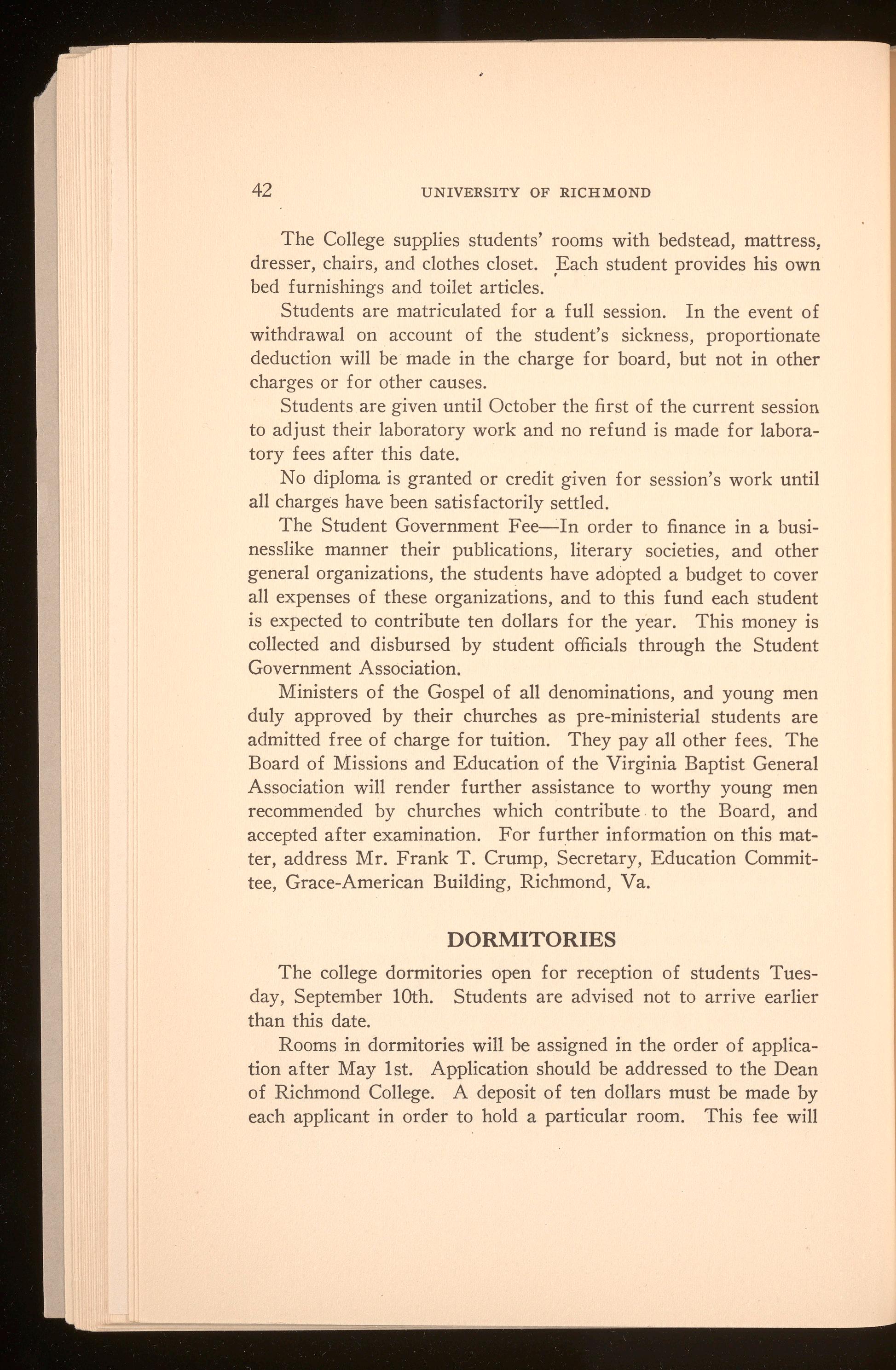
The College supplies students' rooms with bedstead, mattress, dresser, chairs, and clothes closet. ,Each student provides his own bed furnishings and toilet articles.
Students are matriculated for a full session. In the event of withdrawal on account of the student's sickness, proportionate deduction will be made in the charge for board, but not in other charges or for other causes.
Students are given until October the first of the current session to adjust their laboratory work and no refund is made for laboratory fees after this date.
No diploma is granted or credit given for session's work until all charges have been satisfactorily settled.
The Student Government Fee~In order to finance in a businesslike manner their publications, literary societies, and other general organizations, the students have adopted a budget to cover all expenses of these organizations, and to this fund each student is expected to contribute ten dollars for the year. This money is collected and disbursed by student officials through the Student Government Association.
Ministers of the Gospel of all denominations, and young men duly approved by their churches as pre-ministerial students are admitted free of charge for tuition. They pay all other fees. The Board of Missions and Education of the Virginia Baptist General Association will render further assistance to worthy young men recommended by churches which contribute to the Board, and accepted after examination. For further information on this matter, address Mr. Frank T. Crump, Secretary, Education Committee, Grace-American Building, Richmond, Va.
The college dormitories open for reception of students Tuesday, September 10th. Students are advised not to arrive earlier than this date.
Rooms in dormitories will be assigned in the order of application after May 1st. Application should be addressed to the Dean of Richmond College. A deposit of ten dollars must be made by each applicant in order to hold a particular room. This fee will
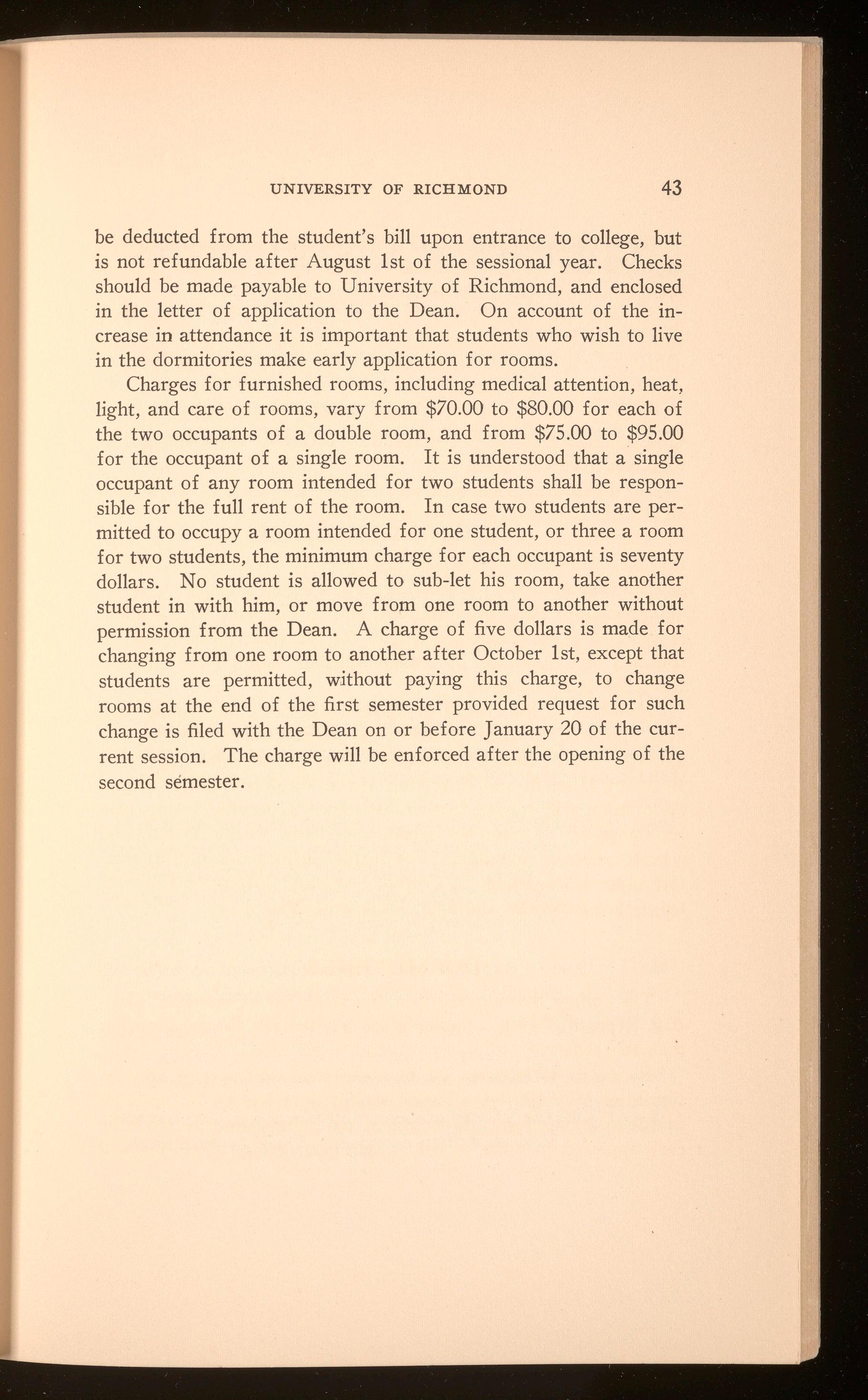
be deducted from the student's bill upon entrance to college, but is not refundable after August 1st of the sessional year. Checks should be made payable to University of Richmond, and enclosed in the letter of application to the Dean. On account of the increase in attendance it is important that students who wish to live in the dormitories make early application for rooms.
Charges for furnished rooms, including medical attention, heat, light, and care of rooms, vary from $70.00 to $80.00 for each of the two occupants of a double room, and from $75.00 to $95.00 for the occupant of a single room. It is understood that a single occupant of any room intended for two students shall be responsible for the full rent of the room. In case two students are permitted to occupy a room intended for one student, or three a room for two students, the minimum charge for each occupant is seventy dollars. No student is allowed to sub-let his room, take another student in with him, or move from one room to another without permission from the Dean. A charge of five dollars is made for changing from one room to another after October 1st, except that students are permitted, without paying this charge, to change rooms at the end of the first semester provided request for such change is filed with the Dean on or before January 20 of the current session. The charge will be enforced after the opening of the second semester.
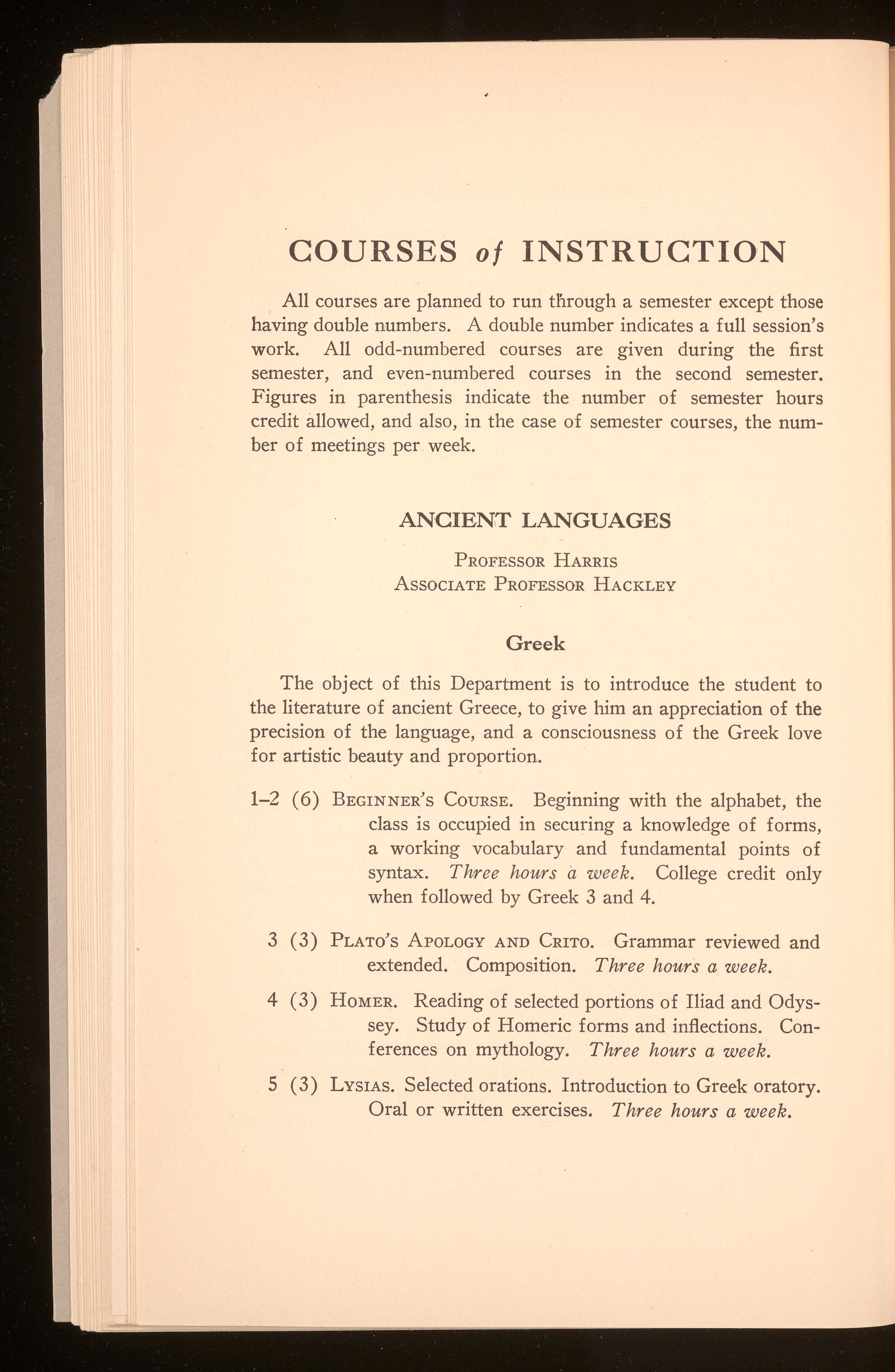
All courses are planned to run tli.rough a semester except those having double numbers. A double number indicates a full session's work. All odd-numbered courses are given during the first semester, and even-numbered courses in the second semester. Figures in parenthesis indicate the number of semester hours credit allowed, and also, in the case of semester courses, the number of meetings per week.
PROFESSORHARRIS ASSOCIATEPROFESSORHACKLEY
Greek
The object of this Department is to introduce the student to the literature of ancient Greece, to give him an appreciation of the precision of the language, and a consciousness of the Greek love for artistic beauty and proportion.
1-2 ( 6) BEGINNER'SCouRSE. Beginning with the alphabet, the class is occupied in securing a knowledge of forms, a working vocabulary and fundamental points of syntax. Three hours a week. College credit only when followed by Greek 3 and 4.
3 (3) PLATo's APOLOGYAND CRITO. Grammar reviewed and extended. Composition. Three hours a week.
4 ( 3) Ho MER. Reading of selected portions of Iliad and Odyssey. Study of Homeric forms and inflections. Conferences on mythology. Three hours a week.
5 (3) LYSIAS.Selected orations. Introduction to Greek oratory. Oral or written exercises. Three hours a week.

6 (3) HISTORY. One book of Thucydides read and selected portions of others. Conferences on and readings from Herodotus and other historical writers. Three hours a week.
7 (3) ORATORY. Demosthenes' De Corona. Conferences on Greek oratory or orators. Lectures on grammar. Three hours a week .
8 ( 3) DRAMA. A play of Sophocles or Euripides read. Study of the development of the drama. Parallel reading. Lectures on Greek literature. Three hours a week.
1-2 (6) CICEROAND VIRGIL. Cicero' orations, with prose composition the first semester. Virgil's Aeneid, with Greek mythology the second semester. Three hours a week. College credit only when folowed by Latin 3-4.
3-4 (6) RoMAN HISTORYANDPOETRY. Livy, prose composition, and Roman private life the first semester. Selections from Horace, Catullus, and the elegiac poets, with Roman private life the second semester. Prerequisite Latin 1-2 or equivalent. Three hours a week.
S (3) ROMAN SATIRE AND PHILOSOPHY. Authors read: Horace, Juvenal, and Cicero. Prerequisite Latin 3-4 or equivalent. Studies in the history of Roman Literature. Three hours a week.
6 (3) ROMAN PHILOSOPHY AND CoMEDY. Authors read: Seneca, Plautus, and Terence. Studies in the history of Roman Literature. Prerequisite Latin 3-4 or equivalent. Three hours a week.
7 (3) EARLY ROMAN PHILOSOPHY. Lucretius, with a study of the Greek background. Advanced prose compos1t10n. Prerequisite Latin 3-4 or equivalent. Three hours a week.
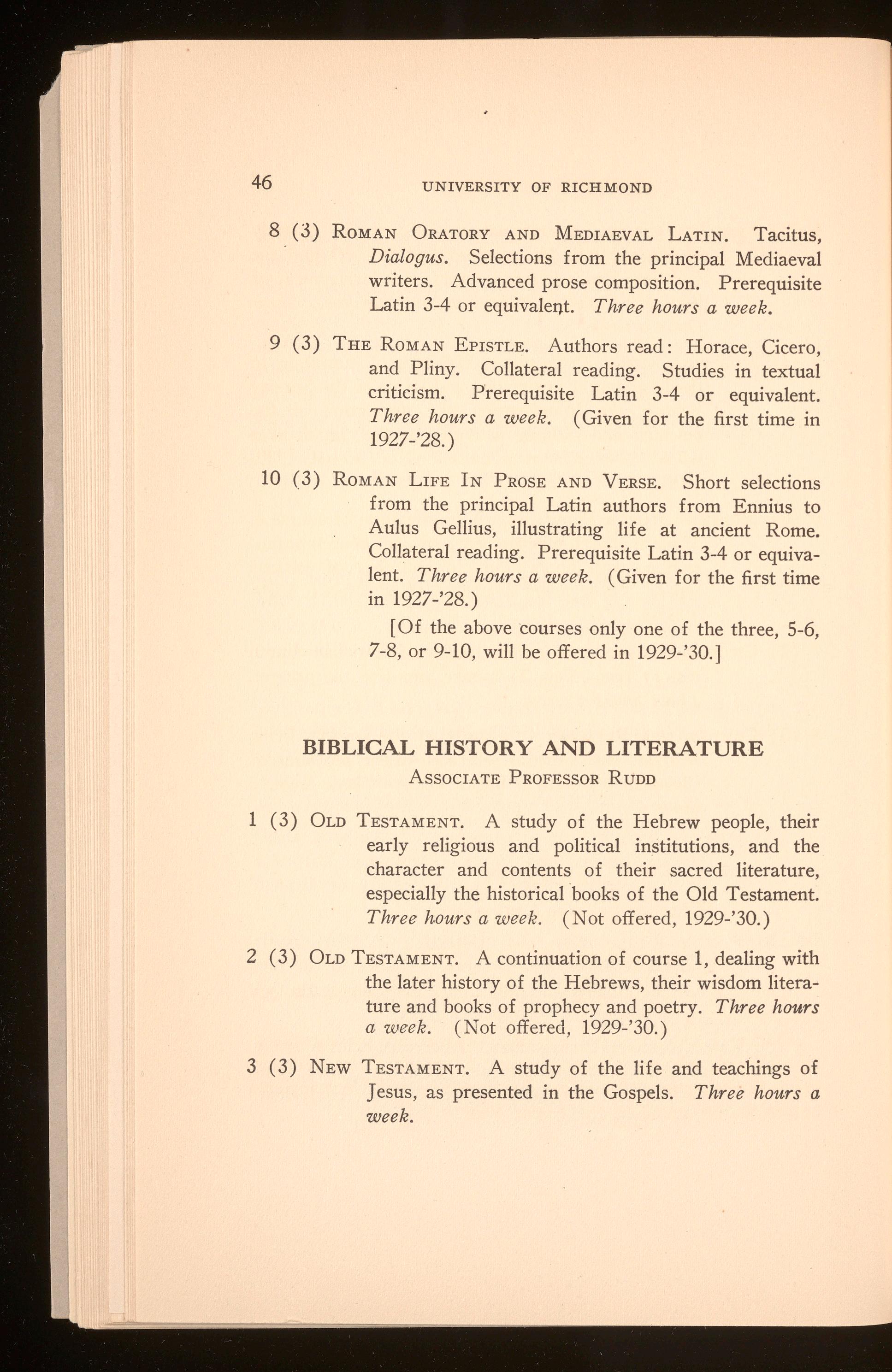
8 (3) RoMAN ORATORYAND MEDIAEVALLATIN. Tacitus, Dialogus. Selections from the principal Mediaeval writers. Advanced prose composition. Prerequisite Latin 3-4 or equivalent. Three hours a week.
9 ( 3) THE Ro MAN EPISTLE. Authors read : Horace, Cicero, and Pliny. Collateral reading. Studies in textual criticism. Prerequisite Latin 3-4 or equivalent. Three hours a week. (Given for the first time in 1927-'28.)
10 (3) ROMAN LIFE IN PROSE AND VERSE. Short selections from the principal Latin authors from Ennius to Aulus Gellius, illustrating life at ancient Rome. Collateral reading. Prerequisite Latin 3-4 or equivalent. Three hours a week. (Given for the first time in 1927-'28.)
[ Of the above courses only one of the three, 5-6, 7-8 , or 9-10 , will be offered in 1929-'30.]
AssoCIATE PROFESSOR R uoo
1 (3) OLD TESTAMENT. A study of the Hebrew people, their early religious and political institutions, and the character and contents of their sacred literature, especially the historical books of the Old Testament. Three hours a we ek. (Not offered, 1929-'30.)
2 (3) OLD TESTAMENT. A continuation of course 1, dealing with the later history of the Hebrews, their wisdom literature and books of prophecy and poetry. Three hours a wee k. (Not offered , 1929-'30.)
3 (3) NEW TESTAMENT. A study of the life and teachings of Jesus, as presented in the Gospels. Three hours a week.
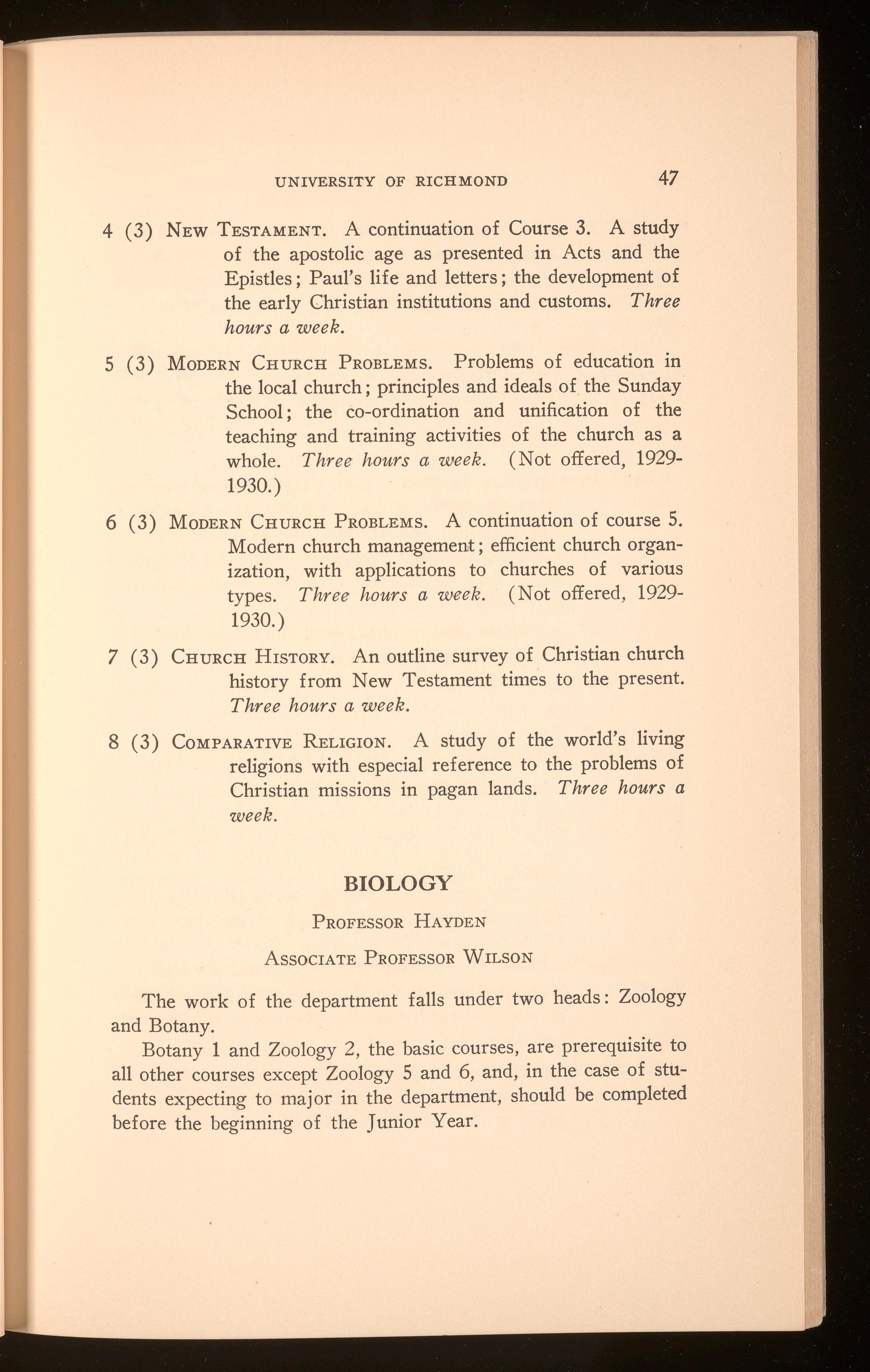
4 (3) NEW TESTAMENT. A continuation of Course 3. A study of the apostolic age as presented in Acts and the Epistles; Paul's life and letters; the development of the early Christian institutions and customs. Three hours a week.
5 ( 3) MODERNCHURCH PROBLEMS. Problems of education in the local church; principles and ideals of the Sunday School; the co-ordination and unification of the teaching and training activities of the church as a whole. Three hours a week. (Not offered, 19291930.)
6 ( 3) MODERNCHURCH PROBLEMS. A continuation of course 5. Modern church management; efficient church organization, with applications to churches of various types. Three hours a week. (Not offered, 19291930.)
7 (3) CHURCH HISTORY. An outline survey of Christian church history from New Testament times to the present. Three hours a week.
8 (3) COMPARATIVERELIGION. A study of the world's living religions with especial reference to the problems of Christian missions in pagan lands. Three hours a week.
BIOLOGY
PROFESSORHAYDEN
ASSOCIATEPROFESSORWILSON
The work of the department falls under two heads: Zoology and Botany.
Botany 1 and Zoology 2, the basic courses, are prerequisite to all other courses except Zoology 5 and 6, and, in the case of students expecting to major in the department, should be completed before the beginning of the Junior Year.
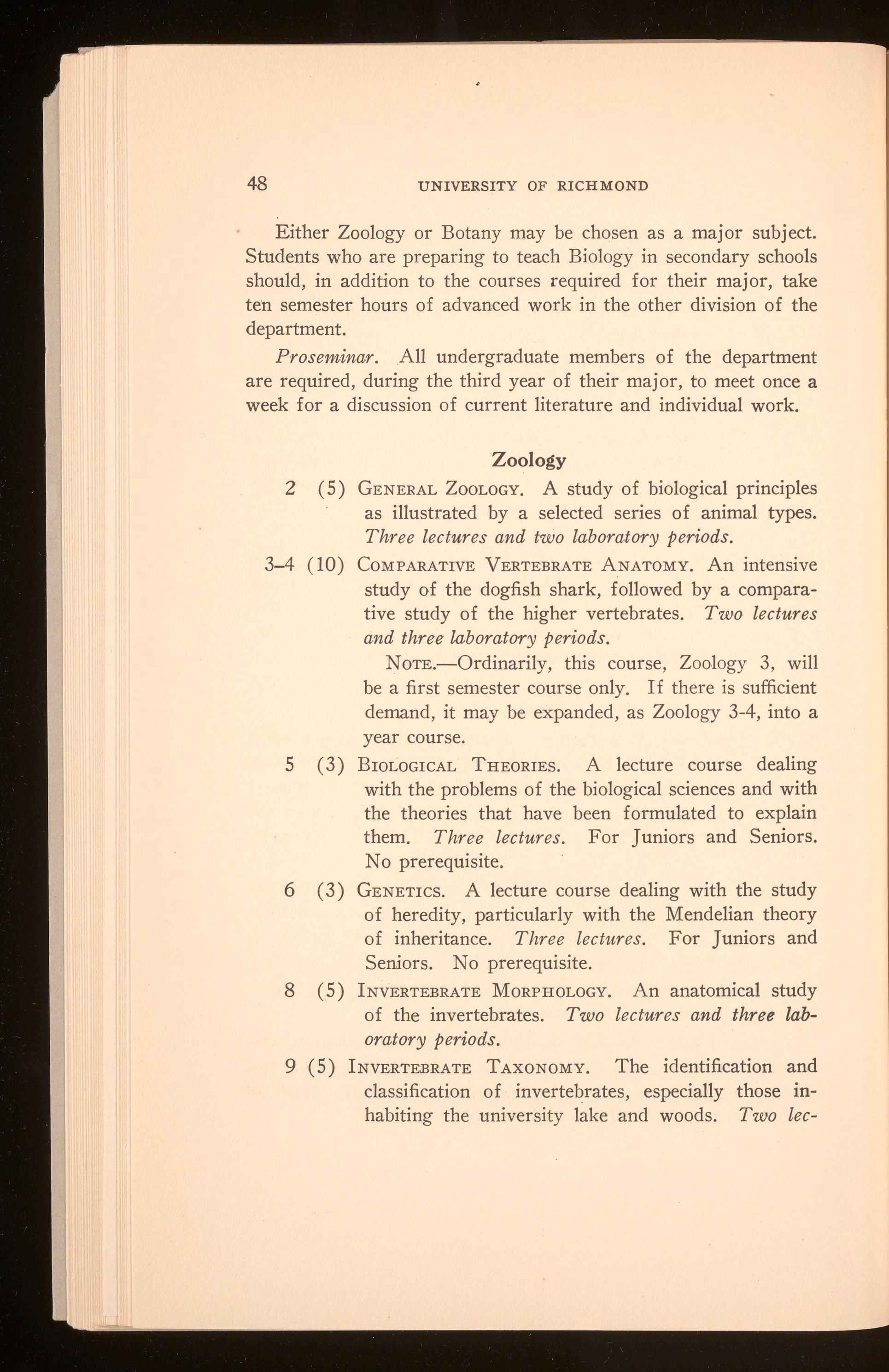
Either Zoology or Botany may be chosen as a major subject. Students who are preparing to teach Biology in secondary schools should, in addition to the courses required for their major, take ten semester hours of advanced work in the other division of the department.
Proseminar. All undergraduate members of the department are required, during the third year of their major, to meet once a week for a discussion of current literature and individual work.
2 ( 5) GENERALZooLOGY. A study of biological principles as illustrated by a selected series of animal types. Three lectures and two laboratory periods.
3-4 (10) COMPARATIVEVERTEBRATEANATOMY. An intensive study of the dogfish shark, followed by a comparative study of the higher vertebrates. Two lectures and three laboratory periods.
NoTE.-Ordinarily, this course, Zoology 3, will be a first semester course only. If there is sufficient demand, it may be expanded, as Zoology 3-4, into a year course.
5 ( 3) BIOLOGICALTHEORIES. A lecture course dealing with the problems of the biological sciences and with the theories that have been formulated to explain them. Three lectures. For Juniors and Seniors. No prerequisite.
6 ( 3) GENETICS. A lecture course dealing with the study of heredity, particularly with the Mendelian theory of inheritance. Three lectures. For Juniors and Seniors. No prerequisite.
8 ( 5) INVERTEBRATEMORPHOLOGY.An anatomical study of the invertebrates. Two lectures and three laboratory periods.
9 (5) INVERTEBRATETAXONOMY. The identification and classification of invertebrates, especially those inhabiting the university lake and woods. Two lee-
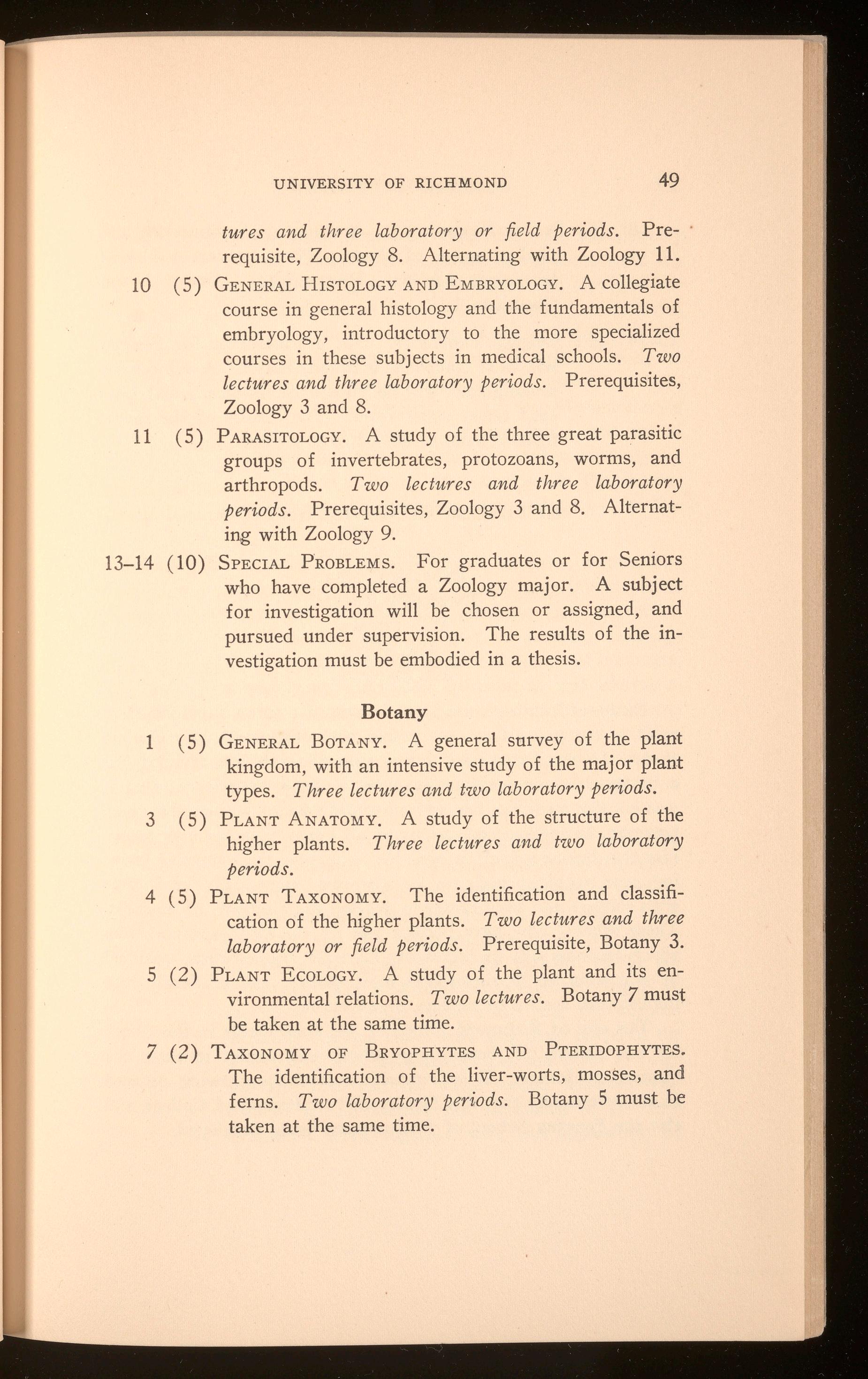
tures and three laboratory or field periods. Prerequisite, Zoology 8. Alternating with Zoology 11.
10 (5) GENERALHISTOLOGYANDEMBRYOLOGY.A collegiate course in general histology and the fundamentals of embryology, introductory to the more specialized courses in these subjects in medical schools. Two lectures and three laboratory periods. Prerequisites, Zoology 3 and 8.
11 ( 5) PARASITOLOGY.A study of the three great parasitic groups of invertebrates, protozoans, worms, and arthropods. Two lectures and three laboratory periods. Prerequisites, Zoology 3 and 8. Alternating with Zoology 9.
13-14 (10) SPECIAL PROBLEMS. For graduates or for Seniors who have completed a Zoology major. A subject for investigation will be chosen or assigned, and pursued under supervision. The results of the investigation must be embodied in a thesis.
1 (S) GENERAL BOTANY. A general survey of the plant kingdom, with an intensive study of the major plant types. Three lectures and two laboratory periods.
3 (S) PLANT ANATOMY. A study of the structure of the higher plants. Three lectures and two laboratory periods.
4 ( 5) PLANT TAXONOMY. The identification and classification of the higher plants. Two lectures and three laboratory or field periods. Prerequisite, Botany 3.
5 (2) PLANT EcoLOGY. A study of the plant and its environmental relations. Two lectures. Botany 7 must be taken at the same time.
7 (2) TAXONOMY OF BRYOPHYTES AND PTERIDOPHYTES. The identification of the liver-worts, mosses, and ferns. Two laboratory periods. Botany 5 must be taken at the same time.
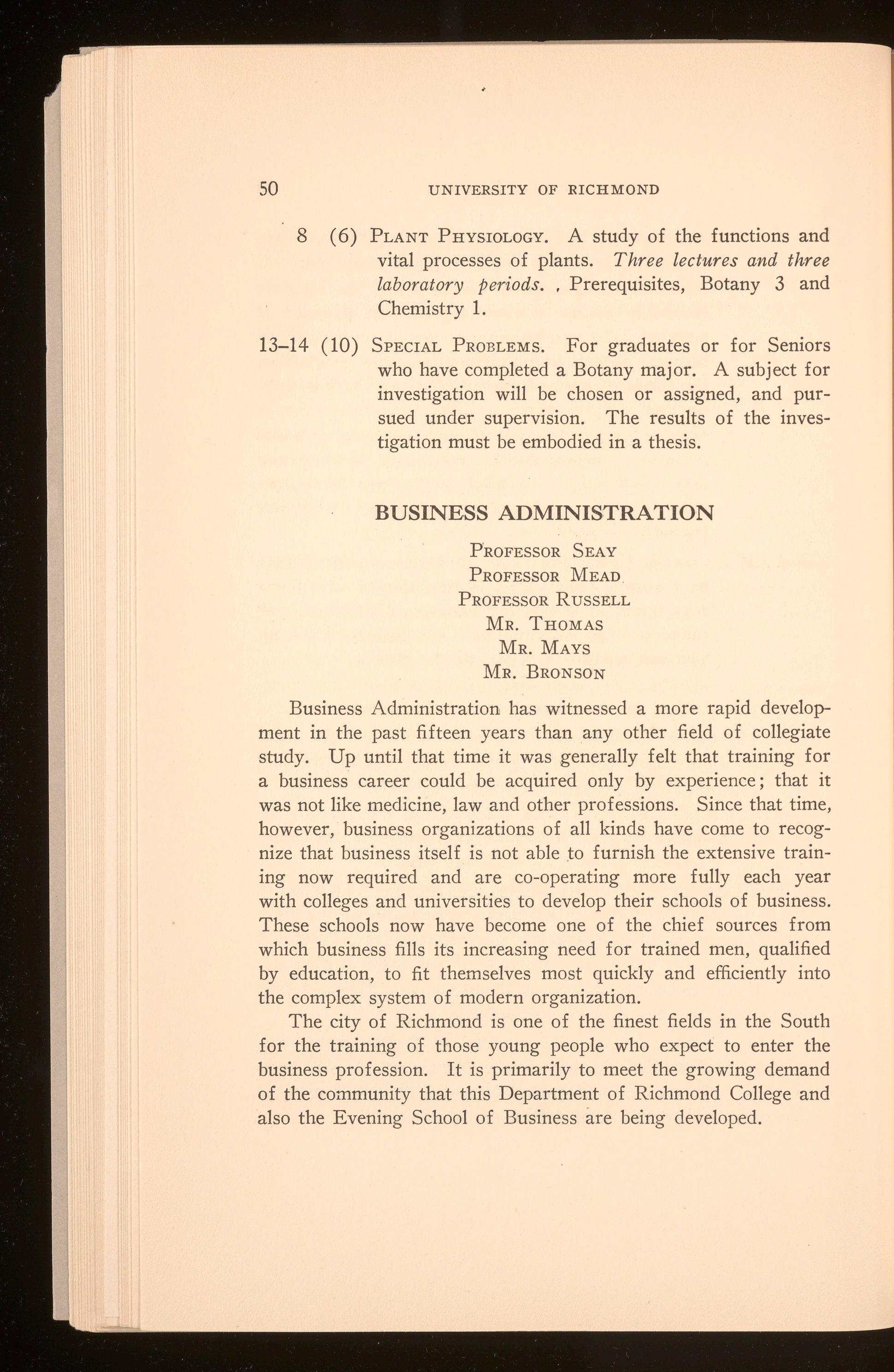
8 (6) PLANT PHYSIOLOGY. A study of the functions and vital processes of plants. Three lectures and three laboratory periods. , Prerequisites, Botany 3 and Chemistry 1.
13-14 (10) SPECIAL PROBLEMS. For graduates or for Seniors who have completed a Botany major. A subject for investigation will be chosen or assigned, and pursued under supervision. The results of the investigation must be embodied in a thesis.
PROFESSORSEAY
PROFESSORMEAD .
PROFESSORRUSSELL
MR. THOMAS
MR. MAYS
MR. BRONSON
Business Administration has witnessed a more rapid development in the past fifteen years than any other field of collegiate study. Up until that time it was generally felt that training for a business career could be acquired only by experience; that it was not like medicine, law and other professions. Since that time, however, business organizations of all kinds have come to recognize that business itself is not able to furnish the extensive training now required and are co-operating more fully each year with colleges and universities to develop their schools of business. These schools now have become one of the chief sources from which business fills its increasing need for trained men, qualified by education, to fit themselves most quickly and efficiently into the complex system of modern organization.
The city of Richmond is one of the finest fields in the South for the training of those young people who expect to enter the business profession. It is primarily to meet the growing demand of the community that this Department of Richmond College and also the Evening School of Business are being developed.
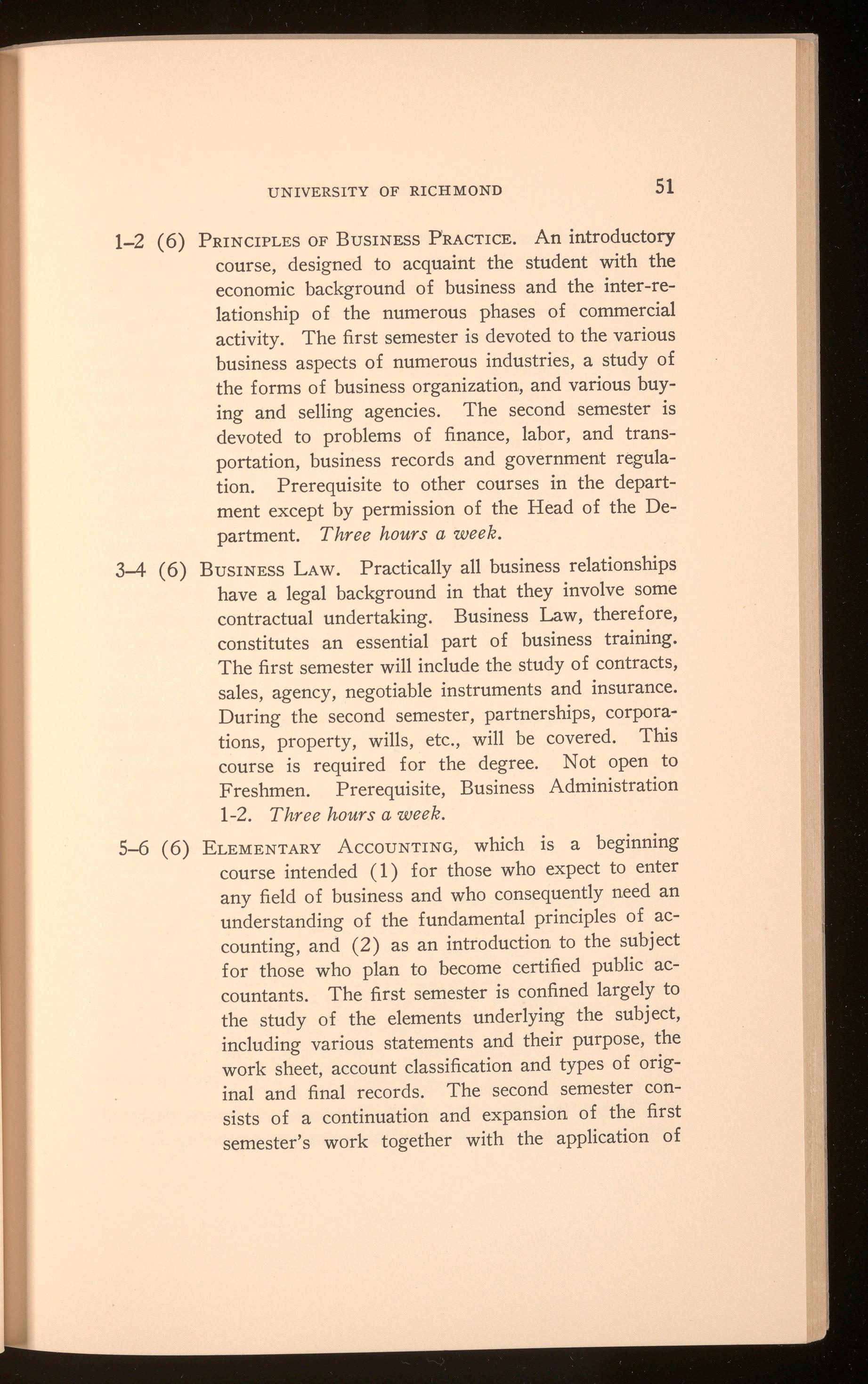
1-2 (6) PRINCIPLESOF BusINESS PRACTICE. An introductory course, designed to acquaint the student with the economic background of business and the inter-relationship of the numerous phases of commercial activity. The first semester is devoted to the various business aspects of numerous industries, a study of the forms of business organization, and various buying and selling agencies. The second semester is devoted to problems of finance, labor, and transportation, business records and government regulation. Prerequisite to other courses in the department except by permission of the Head of the Department. Three hours a week.
3-4 (6) BUSINESSLAw. Practically all business relationships have a legal background in that they involve some contractual undertaking. Business Law, therefore, constitutes an essential part of business training. The first semester will include the study of contracts, sales, agency, negotiable instruments and insurance. During the second semester, partnerships, corporations, property, wills, etc., will be covered. This course is required for the degree. Not open to Freshmen. Prerequisite, Business Administration 1-2. Three hours a week.
5-6 (6) ELEMENTARYAccouNTING, which is a beginning course intended ( 1) for those who expect to enter any field of business and who consequently need an understanding of the fundamental principles of accounting, and (2) as an introduction to the subject for those who plan to become certified public accountants. The first semester is confined largely to the study of the elements underlying the subject, including various statements and their purpose, the work sheet, account classification and types of original and final records. The second semester consists of a continuation and expansion of the first semester's work together with the application of
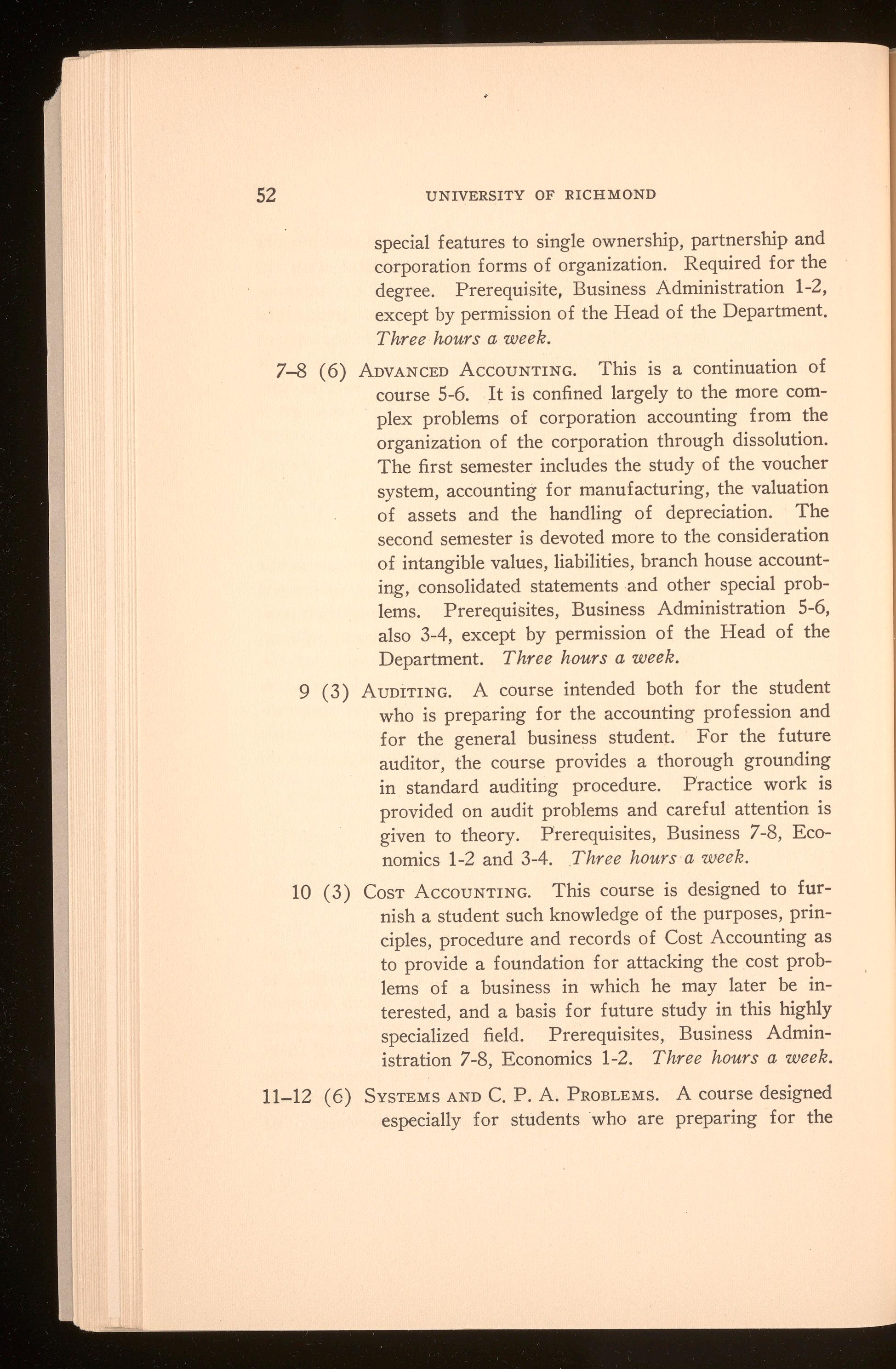
special features to single ownership, partnership and corporation forms of organization. Required for the degree. Prerequisite, Business Administration 1-2, except by permission of the Head of the Department. Three hours a week.
7-8 (6) ADVANCEDACCOUNTING. This is a continuation of course 5-6. It is confined largely to the more complex problems of corporation accounting from the organization of the corporation through dissolution. The first semester includes the study of the voucher system, accounting for manufacturing, the valuation of assets and the handling of depreciation. The second semester is devoted more to the consideration of intangible values, liabilities, branch house accounting, consolidated statements and other special problems. Prerequisites, Business Administration 5-6, also 3-4, except by permission of the Head of the Department. Three hours a week.
9 ( 3) AUDITING. A course intended both for the student who is preparing for the accounting profession and for the general business student. For the future auditor, the course provides a thorough grounding in standard auditing procedure. Practice work is provided on audit problems and careful attention is given to theory. Prerequisites, Business 7-8, Economics 1-2 and 3-4. .Three hours a w eek.
10 ( 3) CosT AccouNTING. This course is designed to furnish a student such knowledge of the purposes, principles, procedure and records of Cost Accounting as to provide a foundation for attacking the cost problems of a business in which he may later be interested, and a basis for future study in this highly specialized field. Prerequisites, Business Administration 7-8, Economics 1-2. Three hours a week.
11-12 (6) SYSTEMSANDC. P.A. PROBLEMS.A course designed especially for students ·who are preparing for the
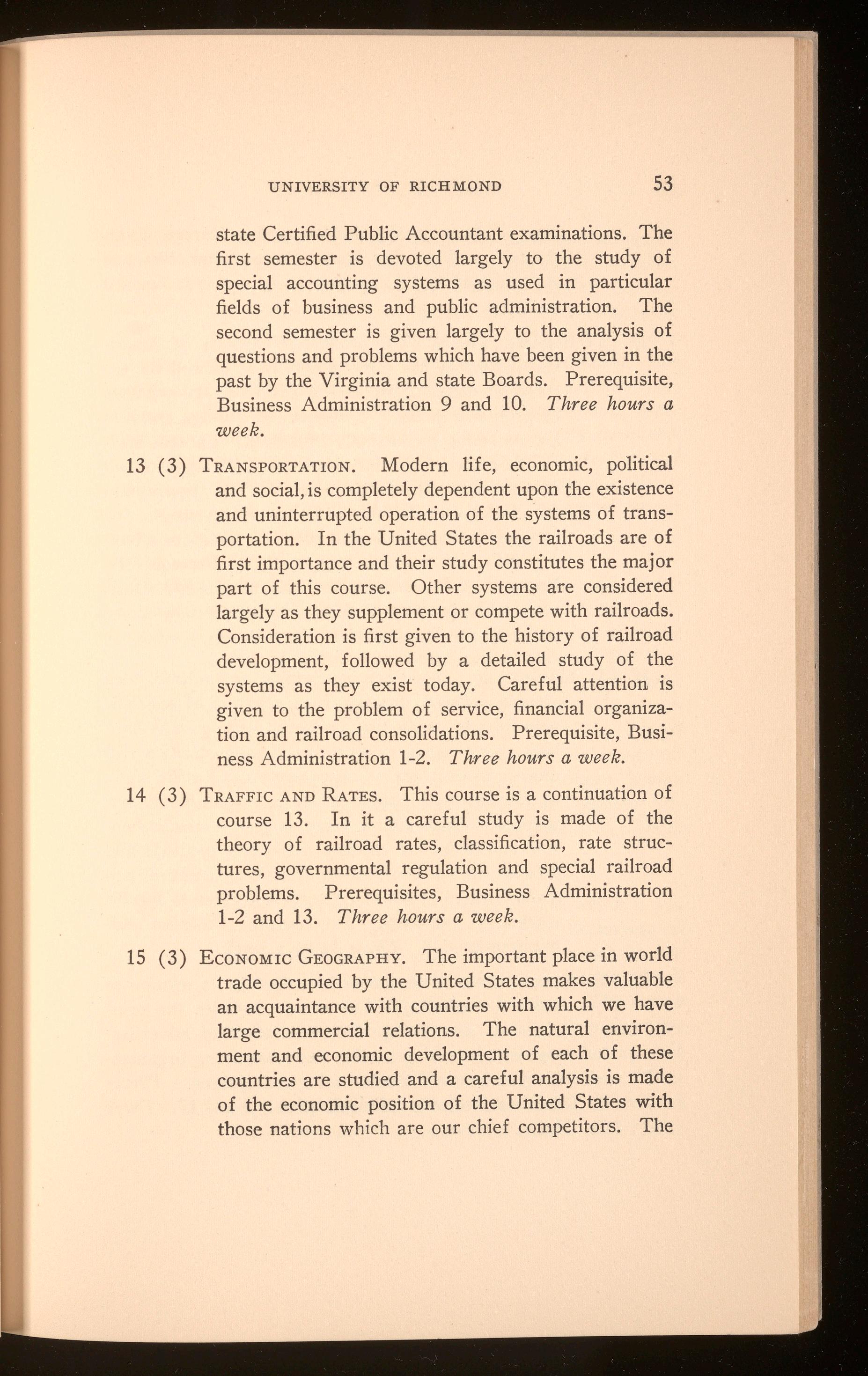
state Certified Public Accountant examinations. The first semester is devoted largely to the study of special accounting systems as used in particular fields of business and public administration. The second semester is given largely to the analysis of questions and problems which have been given in the past by the Virginia and state Boards. Prerequisite, Business Administration 9 and 10. Three hours a week.
13 ( 3) TRANSPORTATION.Modern life, economic, political and social, is completely dependent upon the existence and uninterrupted operation of the systems of transportation. In the United States the railroads are of first importance and their study constitutes the major part of this course. Other systems are considered largely as they supplement or compete with railroads. Consideration is first given to the history of railroad development, followed by a detailed study of the systems as they exist today. Careful attention is given to the problem of service, financial organization and railroad consolidations. Prerequisite, Business Administration 1-2. Three hours a week.
14 ( 3) TRAFFICANDRATES. This course is a continuation of course 13. In it a careful study is made of the theory of railroad rates, classification, rate structures, governmental regulation and special railroad problems. Prerequisites, Business Administration 1-2 and 13. Three hours a week.
15 (3) EcoNOMIC GEOGRAPHY.The important place in world trade occupied by the United States makes valuable an acquaintance with countries with which we have large commercial relations. The natural environment and economic development of each of these countries are studied and a careful analysis is made of the economic position of the United States with those nations which are our chief competitors. The
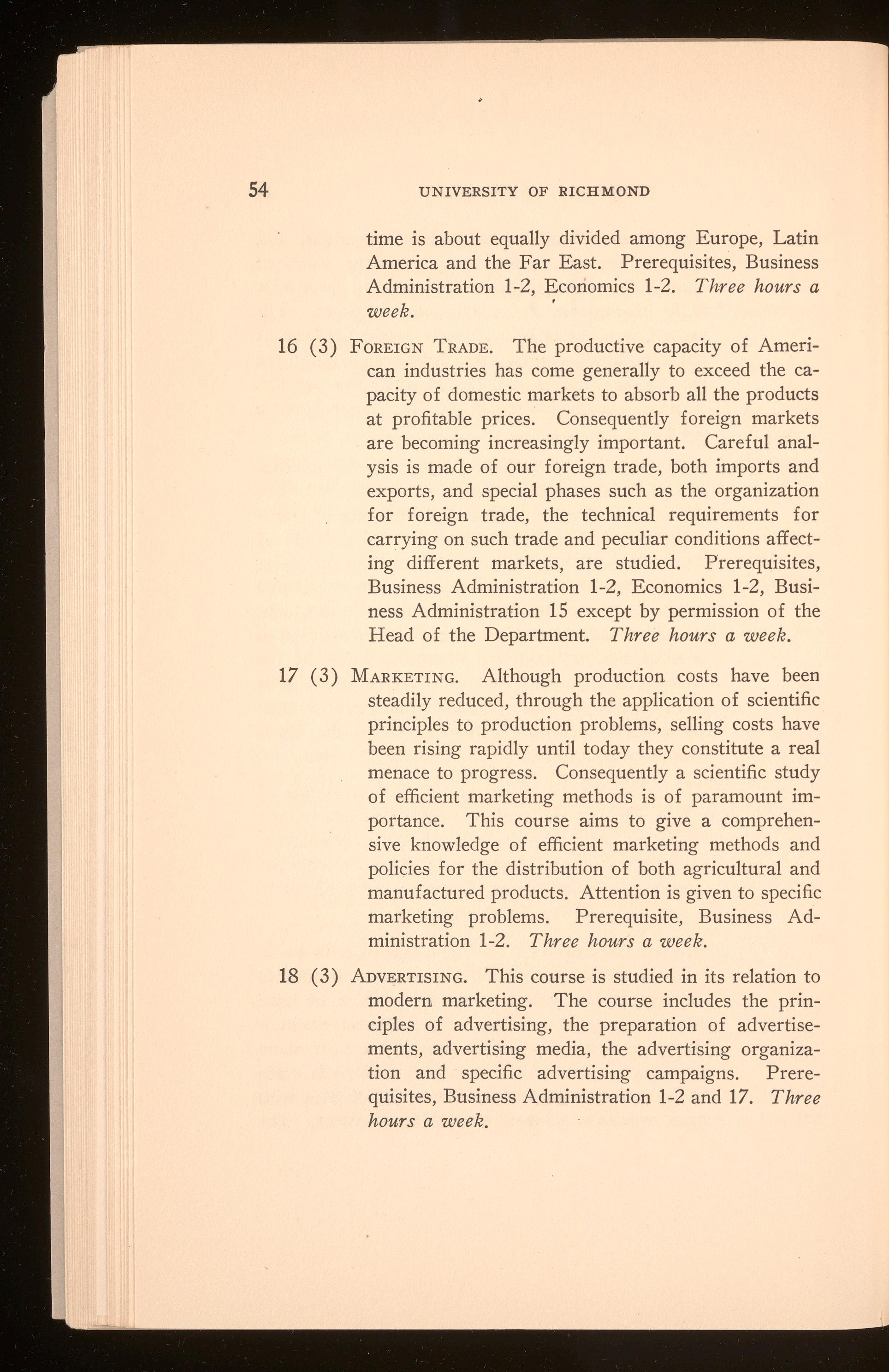
time is about equally divided among Europe, Latin America and the Far East. Prerequisites, Business Administration 1-2, Economics 1-2. Three hours a week.
16 (3) FOREIGNTRADE. The productive capacity of American industries has come generally to exceed the capacity of domestic markets to absorb all the products at profitable prices. Consequently foreign markets are becoming increasingly important. Careful analysis is made of our foreign trade, both imports and exports, and special phases such as the organization for foreign trade, the technical requirements for carrying on such trade and peculiar conditions affecting different markets, are studied. Prerequisites, Business Administration 1-2, Economics 1-2, Business Administration 15 except by permission of the Head of the Department. Three hours a week.
17 ( 3) MARKETING. Although production costs have been steadily reduced, through the application of scientific principles to production problems, selling costs have been rising rapidly until today they constitute a real menace to progress. Consequently a scientific study of efficient marketing methods is of paramount importance. This course aims to give a comprehensive knowledge of efficient marketing methods and policies for the distribution of both agricultural and manufactured products. Attention is given to specific marketing problems. Prerequisite, Business Administration 1-2. Three hours a week.
18 ( 3) AnvERTISING. This course is studied in its relation to modern marketing. The course includes the principles of advertising, the preparation of advertisements, advertising media, the advertising organization and specific advertising campaigns. Prerequisites, Business Administration 1-2 and 17. Three hours a week.

21-22 (6) INSURANCE. The subject of insurance, as a safeguard against contingencies, is being applied to a wider range of risks each year. A knowledge of the subject, therefore, is of specific value both to business men and the public in general. The course, therefore, is open to all students except Freshmen. The first semester is devoted to a study of life and compensation insurance including their functions, types of companies, analysis of policy contracts, premiums and reserves. The second semester covers property insurance including fire, marine, automobile, theft, etc. Considerable attention is given to special clauses in common use. Three hours a week.
23-24 (6) CORPORATIONFINANCE. This is an advanced course dealing with the financial problems confronting business men as a result of the tremendous growth in the size of modern industrial organizations. The first semester comprises a study of underlying problems: conditions to be met, capitalization, types of securities, legal aspects encountered, etc. The second semester is devoted more to security marketing and the functions of underwrit ing, brokerage houses and stock exchanges. Prerequisites, Business Administration 1-2, 3-4, 5-6, Economics 1-2. Three hours a week.
27 (3) LABORPROBLEMS. This subject is one which is approached from several points of view, depending on the general field of which it is a part, such as Sociology, Psychology and Business. In this course it is treated in its relationship to business. The course includes a general study of the labor movement, its causes and economic consequences, a history and analysis of unionism and the wage problem. Prerequisites, Business Administration 1-2, Economics 1-2. Three hours a week. (Not offered 1929-1930.)
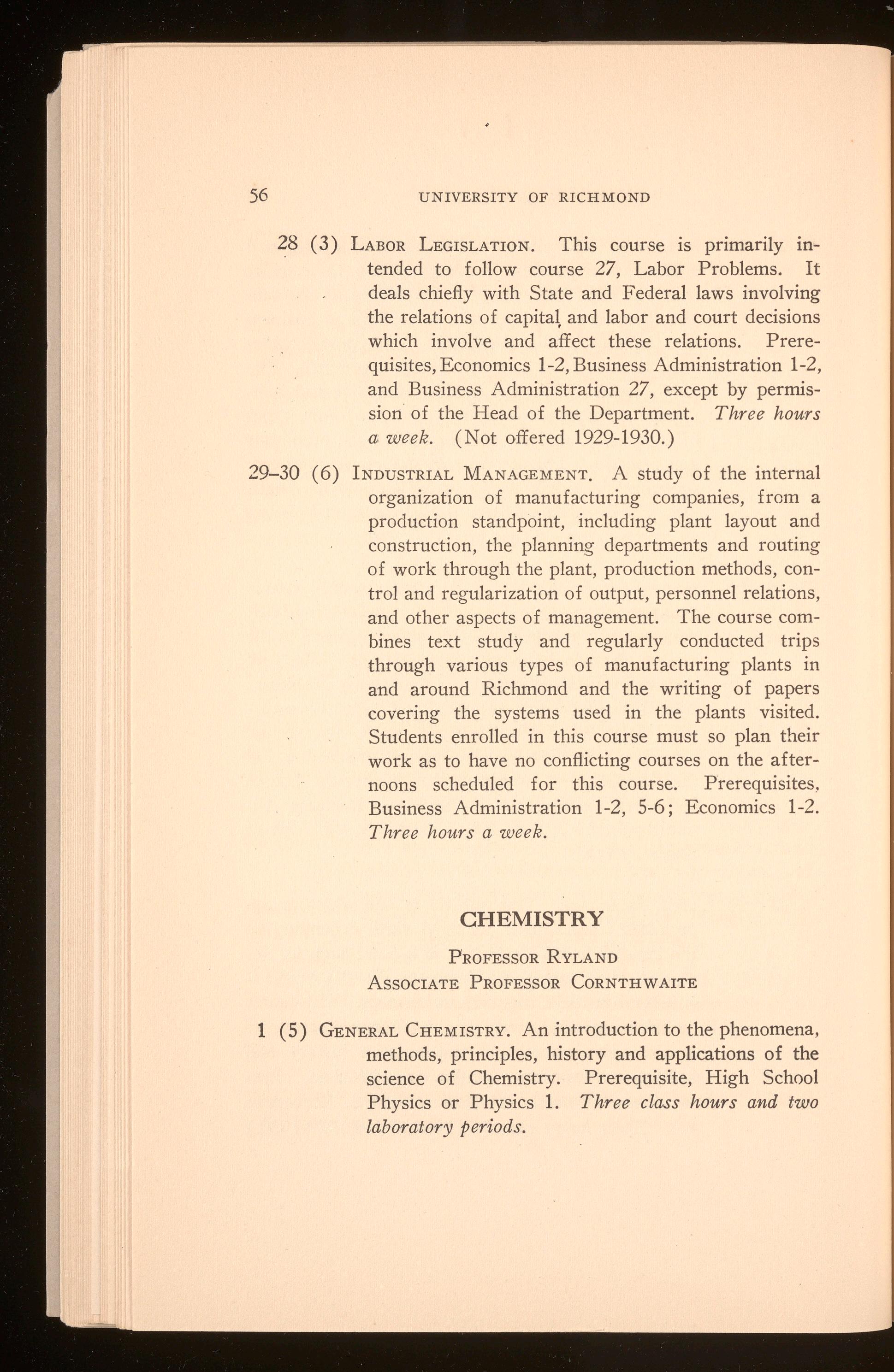
28 (3) LABOR LEGISLATION. This course is primarily intended to follow course 27, Labor Problems. It deals chiefly with State and Federal laws involving the relations of capita\ and labor and court decisions which involve and affect these relations. Prerequisites, Economics 1-2, Business Administration 1-2, and Business Administration 27, except by perrnission of the Head of the Department. Three hours a week. (Not offered 1929-1930.)
29-30 (6) INDUSTRIALMANAGEMENT. A study of the internal organization of manufacturing companies, from a production standpoint, including plant layout and construction, the planning departments and routing of work through the plant, production methods, control and regularization of output, personnel relations, and other aspects of management. The course combines text study and regularly conducted trips through various types of manufacturing plants in and around Richmond and the writing of papers covering the systems used in the plants visited. Students enrolled in this course must so plan their work as to have no conflicting courses on the afternoons scheduled for this course. Prerequisites, Business Administration 1-2, 5-6; Economics 1-2. Three hours a week.
PROFESSORRYLAND
AssocIATE PROFESSORCoRNTHWAITE
1 (5) GENERALCHEMISTRY.An introduction to the phenomena, methods, principles, history and applications of the science of Chemistry. Prerequisite, High School Physics or Physics 1. Three class hours and two laboratory periods.
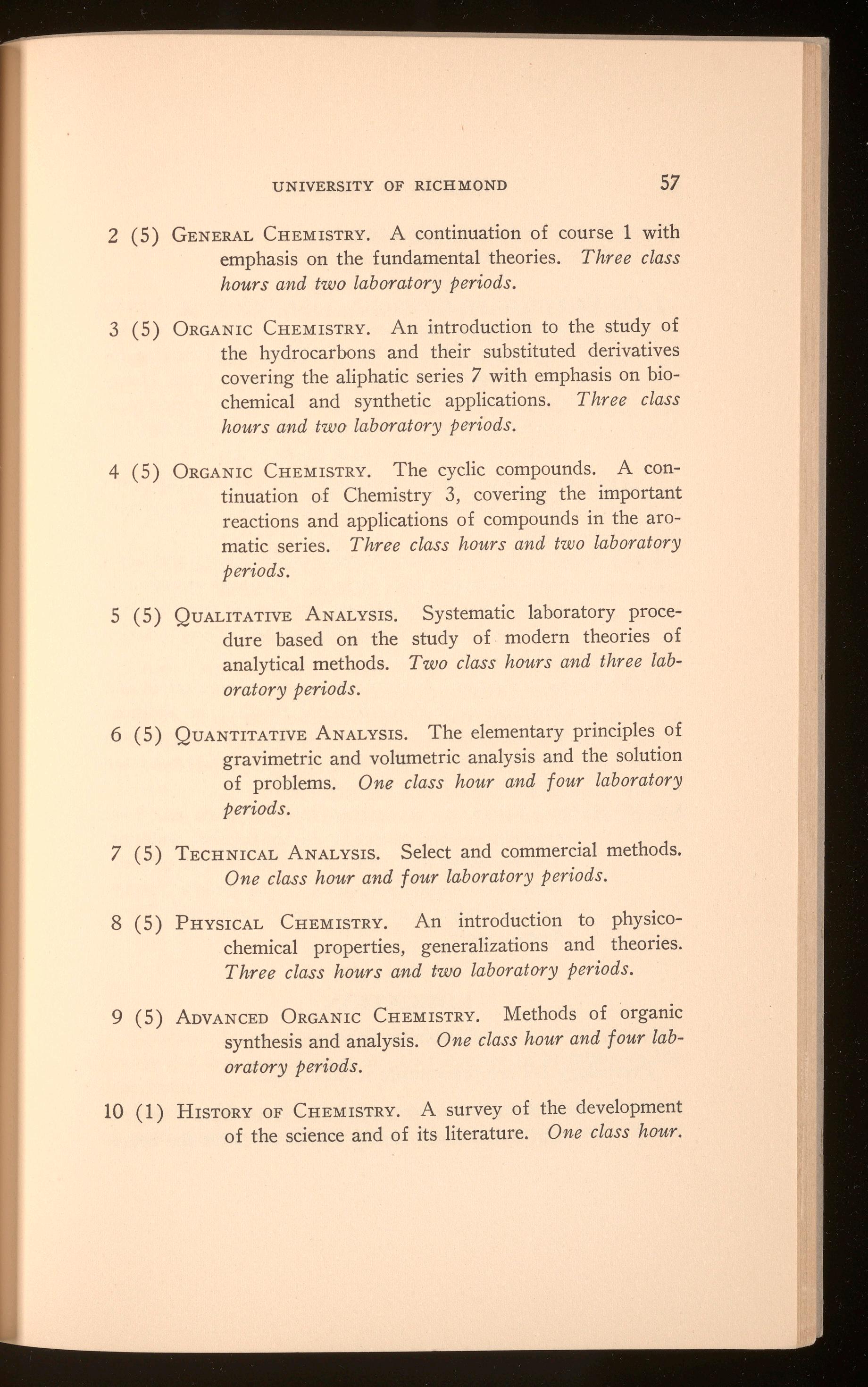
2 (5) GENERAL CHEMISTRY. A continuation of course 1 with emphasis on the fundamental theories. Three class hours and two laboratory periods.
3 (S) ORGANIC CHEMISTRY. An introduction to the study of the hydrocarbons and their substituted derivatives covering the aliphatic series 7 with emphasis on biochemical and synthetic applications. Three class hours and two laboratory periods.
4 ( S) ORGANIC CHEMISTRY. The cyclic compounds. A continuation of Chemistry 3, covering the important reactions and applications of compounds in the aromatic series. Three class hours and two laboratory periods.
S (S) QUALITATIVEANALYSIS. Systematic laboratory procedure based on the study of modern theories of analytical methods. Two class hours and three laboratory periods.
6 (5) QUANTITATIVEANALYSIS. The elementary principles of gravimetric and volumetric analysis and the solution of problems. One class hour and four laboratory periods.
7 (5) TECHNICAL ANALYSIS. Select and commercial methods. One class hour and four laboratory periods.
8 ( S) PHYSICAL CHEMISTRY. An introduction to physicochemical properties, generalizations and theories. Three class hours and two laboratory periods.
9 (S) ADVANCEDORGANIC CHEMISTRY. Methods of organic synthesis and analysis. One class hour and four laboratory periods.
10 ( 1) HISTORY OF CHEMISTRY. A survey of the development of the science and of its literature. One class hour.

PROFESSORSEAy
1 ( 3) PRINCIPLES OF EcoNOMICS. The underlying theories of Economics are dev~loped by reference to specific conditions. Partial list of topics for discussion include Production, Consumption, Value, Price, Monopoly, Money and Banking. Not open to first year students except upon permission of Head of this Department. Three hours a week.
2 ( 3) CURRENTEcoNOMIC PROBLEMS.Distribution, Transportation, Insurance, Labor, Tariff, etc. Three hours a week.
3 ( 3) Mo NEYANDBANKING. A study of the history and problems of money and banking. Especial attention is given to the philosophy of bank credit and the principles underlying foreign exchange. Three hours a week.
4 (3) FEDERALRESERVEBANKING SYSTEM. Organization and Function of Federal Reserve Banks. In addition, the main features of the Canadian banking system and the banks of England, France and Germany are considered. Three hours a week.
5-6 (6) PUBLIC FINANCE. A detailed study of state and local expenditures and revenues, during the first semester. The financing and policies of the Federal government, with especial attention to the Federal income tax and budget, during the second semester. Three hours a week.
PROFESSORPRINCE
Psychology 1-2 are prerequisite to all courses.
1 (3) AN INTRODUCTIONTO THE STUDYOF EDUCATION. A general introductory survey course to orient the begin-
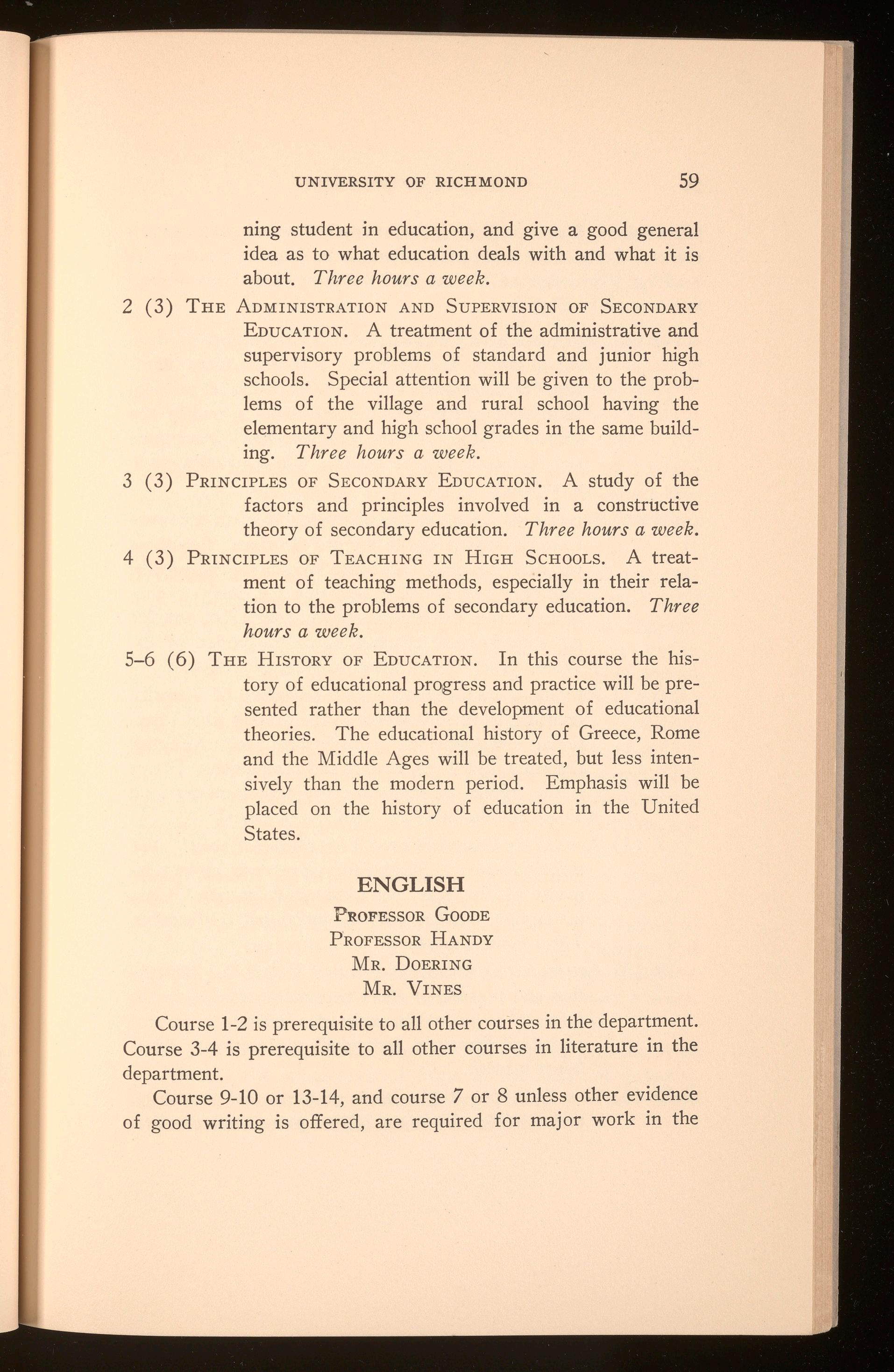
ning student in education, and give a good general idea as to what education deals with and what it is about. Three hours a week.
2 (3) THE ADMINISTRATIONAND SUPERVISIONOF SECONDARY EDUCATION. A treatment of the administrative and supervisory problems of standard and junior high schools. Special attention will be given to the problems of the village and rural school having the elementary and high school grades in the same building. Three hours a week.
3 (3) PRINCIPLES OF SECONDARYEDUCATION. A study of the factors and principles involved in a constructive theory of secondary education. Three hours a week.
4 ( 3) PRINCIPLES OF TEACHING IN HIGH SCHOOLS. A treatment of teaching methods, especially in their relation to the problems of secondary education. Three hours a week.
5-6 (6) THE HISTORY OF EDUCATION. In this course the history of educational progress and practice will be presented rather than the development of educational theories The educational history of Greece, Rome and the Middle Ages will be treated, but less intensively than the modern period. Emphasis will be placed on the history of education in the United States.
PROFESSORGOODE
PROFESSORHANDY
MR. DOERING
MR. VINES
Course 1-2 is prerequisite to all other courses in the department. Course 3-4 is prerequisite to all other courses in literature in the department.
Course 9-10 or 13-14, and course 7 or 8 unless other evidence of good writing is offered, are required for major work in the
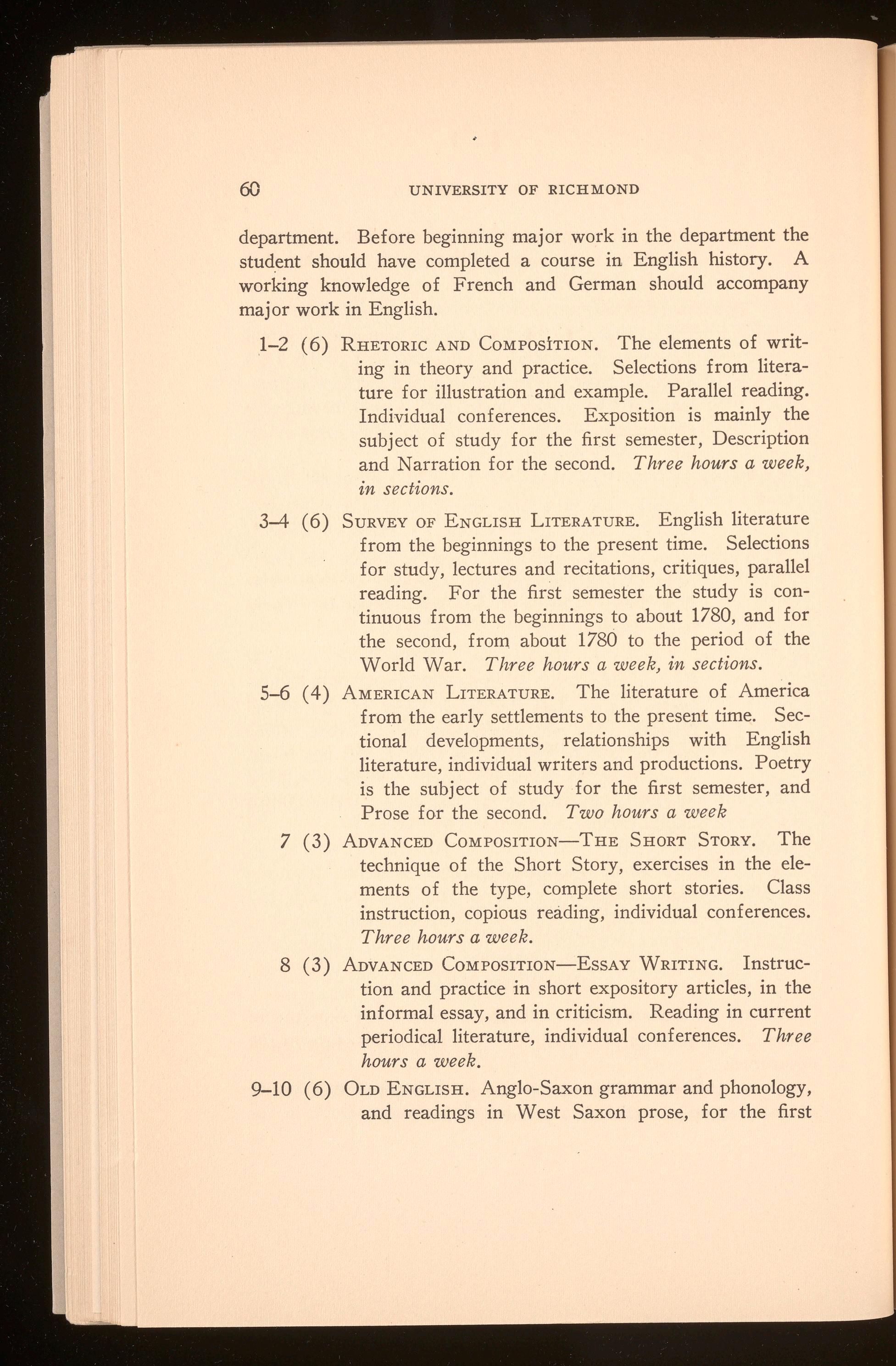
UNIVERSITYOF RICHMOND
department. Before beginning major work in the department the stud.ent should have completed a course in English history. A working knowledge of French and German should accompany major work in English.
1-2 (6) RHETORICAND CoMPOSITION. The elements of writing in theory and practice. Selections from literature for illustration and example. Parallel reading. Individual conferences. Exposition is mainly the subject of study for the first semester, Description and Narration for the second. Three hours a week, in sections.
3-4 (6) SURVEYOF ENGLISH LITERATURE. English literature from the beginnings to the present time. Selections for study, lectures and recitations, critiques, parallel reading. For the first semester the study is continuous from the beginnings to about 1780, and for the second, from about 1786 to the period of the World War. Three hours a week, in sections.
5-6 ( 4) AMERICANLITERATURE. The literature of America from the early settlements to the present time. Sectional developments, relationships with English literature, individual writers and productions. Poetry is the subject of study for the first semester, and Prose for the second. Two hours a week
7 (3) ADVANCEDCOMPOSITION-THE SHORT STORY. The technique of the Short Story, exercises in the elements of the type, complete short stories. Class instruction, copious reading, individual conferences. Three hours a week.
8 (3) ADVANCEDCoMPOSITION-EssAY WRITING. Instruction and practice in short expository articles, in the informal essay, and in criticism. Reading in current periodical literature, individual conferences. Three hours a week.
9-10 (6) OLD ENGLISH. Anglo-Saxon grammar and phonology, and readings in West Saxon prose, for the first

semester; systematic reading and study of Beowulf, for the second semester. Three hours a week. Rec01nmended for Seniors and Graduates. (Not offered in 1929-'30.)
11 ( 3) ENGLISH DRAMA. The development of English drama from the beginnings, through the early types, to Shakespeare and his contemporaries, and the decline to the closing of the theaters in 1642. Lectures, wide reading, reports. Three hours a week.
12 ( 3) ENGLISH DRAMA. English drama from 1660 to the present time, with emphasis on the Restoration, Victorian, and Modern periods. Lectures, wide reading, reports. Three hours a week.
13-14 (6) CHAUCER. Introductory study in the pronunciation, language, and meter of Chaucer. Close reading of some of the Canterbury Tales , from the linguistic standpoint primarily, for the first semester; appreciative reading of other works of Chaucer and of the period, for the second semester. Three hours a · week. Recommended for Seniors and Graduates.
15-16 (6) SHAKESPEARE. Intensive study of a few plays, for the first semester; comprehensive reading and study of others, for the second semester. Emphasis mainly upon linguistic and literary elements. Lectures and recitations. Three hours a week.
17 ( 3) THE CLASSICALREGIME. English literature from the Restoration to the Tattler and Spectator papersdrama, satire, journalistic prose, etc., with individual studies in Milton, Bunyan, Dryden, Evelyn and Pepys, Defoe, and Steele and Addison. Lectures, extensive reading, critiques. Three hours a week. (Not offered in 1929-'30.)
18 (3) THE CLASSICALREGIME. The classical tradition from the appearance of Pope to the death of Johnson. Lectures, extensive reading, critiques. Three hours a week. (Not offered in 1929-'30.)
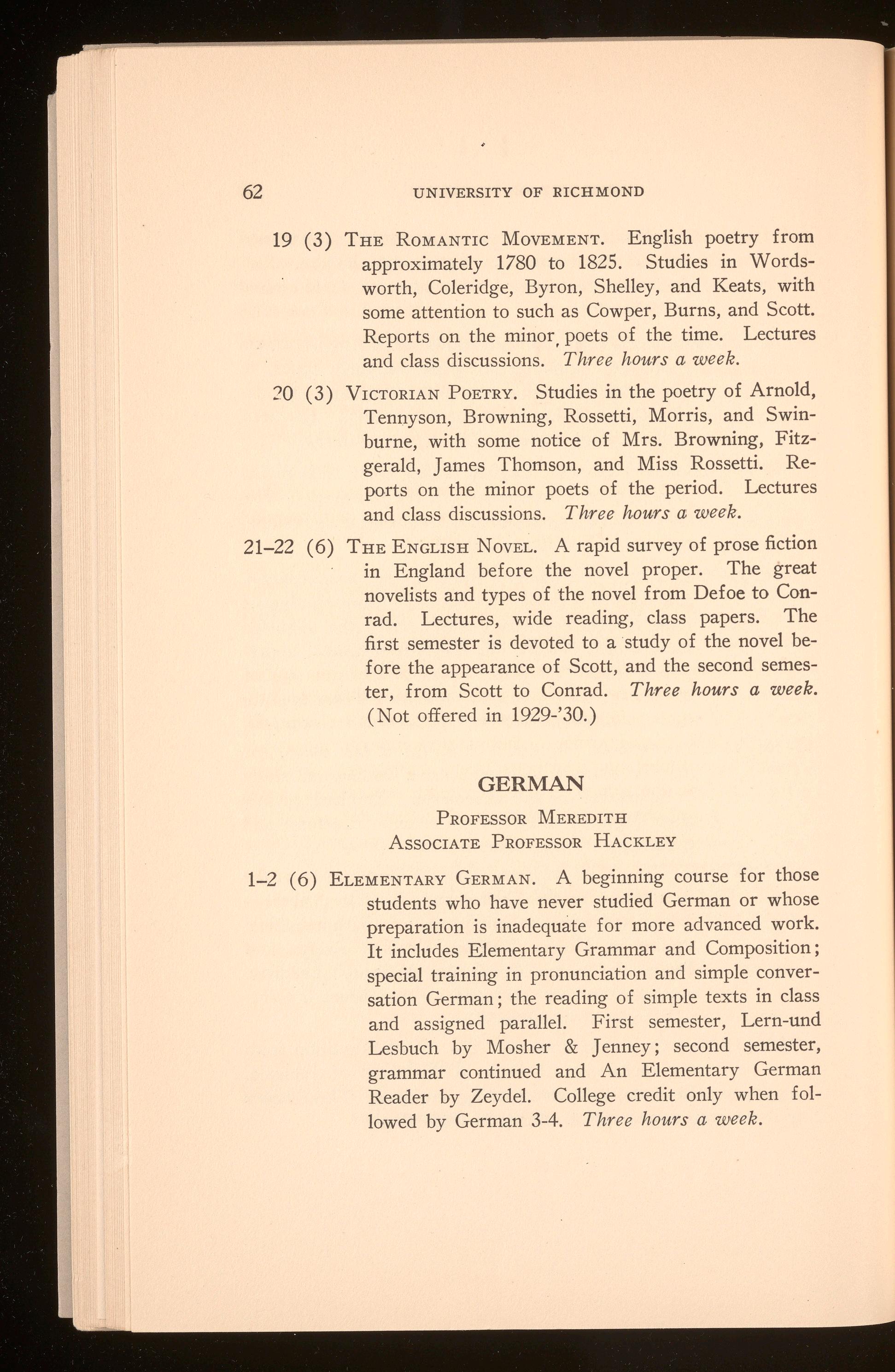
19 (3) THE ROMANTICMovEMENT. English poetry from approximately 1780 to 1825. Studies in Wordsworth, Coleridge, Byron, Shelley, and Keats, with some attention to such as Cowper, Burns, and Scott. Reports on the minor, poets of the time. Lectures and class discussions. Three hours a week.
:>O(3) VICTORIANPOETRY. Studies in the poetry of Arnold, Tennyson, Browning, Rossetti, Morris, and Swinburne, with some notice of Mrs. Browning, Fitzgerald, James Thomson, and Miss Rossetti. Reports on the minor poets of the period. Lectures and class discussions. Three hours a week.
21-22 (6) THE ENGLISHNovEL. A rapid survey of prose fiction in England before the novel proper. The great novelists and types of the novel from Defoe to Conrad. Lectures, wide reading, class papers. The first semester is devoted to a study of the novel before the appearance of Scott, and the second semester, from Scott to Conrad. Three hours a week. (Not offered in 1929-'30.)
GERMAN
PROFESSORMEREDITH ASSOCIATEPROFESSORHACKLEY
1-2 (6) ELEMENTARYGERMAN. A beginning course for those students who have never studied German or whose preparation is inadequate for more advanced work. It includes Elementary Grammar and Composition; special training in pronunciation and simple conversation German; the reading of simple texts in class and assigned parallel. First semester, Lern-und Lesbuch by Mosher & Jenney; second semester, grammar continued and An Elementary German Reader by Zeydel. College credit only when followed by German 3-4. Three hours a week.
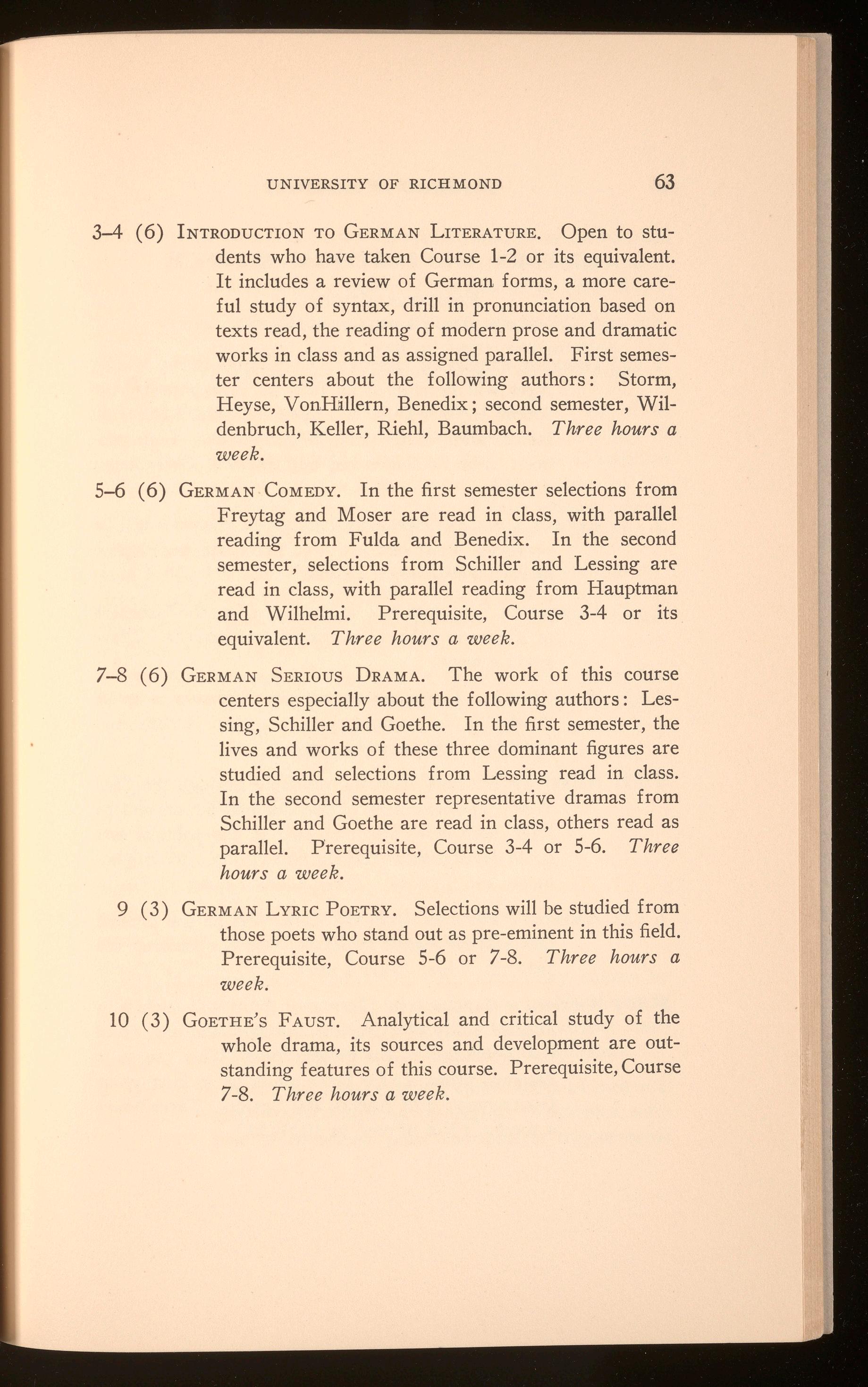
3-4 (6) INTRODUCTIONTO GERMANLITERATURE. Open to students who have taken Course 1-2 or its equivalent. It includes a review of German forms, a more careful study of syntax, drill in pronunciation based on texts read, the reading of modern prose and dramatic works in class and as assigned parallel. First semester centers about the following authors : Storm, Heyse, Vonllillern, Benedix; second semester, Wildenbruch, Keller, Riehl, Baumbach. Three hours a week.
5-6 (6) GERMANCOMEDY. In the first semester selections from Freytag and Moser are read in class, with parallel reading from Fulda and Benedix. In the second semester, selections from Schiller and Lessing are read in class, with parallel reading from Hauptman and Wilhelmi. Prerequisite, Course 3-4 or its equivalent. Three hours a week.
7-8 (6) GERMAN SERIOUSDRAMA. The work of this course centers especially about the following authors: Lessing, Schiller and Goethe. In the first semester, the lives and works of these three dominant figures are studied and selections from Lessing read in class. In the second semester representative dramas from Schiller and Goethe are read in class, others read as parallel. Prerequisite, Course 3-4 or 5-6. Three hours a week.
9 (3) GERMANLYRICPOETRY. Selections will be studied from those poets who stand out as pre-eminent in this field. Prerequisite, Course 5-6 or 7-8. Three hours a week.
10 (3) GoETHE's FAUST. Analytical and critical study of the whole drama, its sources and development are outstanding features of this course. Prerequisite, Course 7-8. Three hours a week.

UNIVERSITYOF RICHMOND
HISTORY AND POLITICAL SCIENCE
PROFESSORMITCHELL
AssocIATE PROFESSORMcDANEL
1 (3) GENERALEUROPEANHISTORY. Civilization in the Middle Ages will be studied as fully as time permits, but special stress will be laid upon the period from the Reformation to the French Revolution. Four sections. For Freshmen and Sophomores. Three hours a week.
2 ( 3) RECENT AND CoNTEMPORARYEUROPEANHISTORYwill be surveyed. Four sections. For Freshmen and Sophomores. Three hours a week.
3 ( 3) HISTORYOF ENGLANDwill be studied, up to the Congress of Vienna in 1815. For Juniors and Seniors. Three hours a week.
4 (3) THE BRITISH COMMONWEALTHOF NATIONS will be viewed in its various aspects. For Juniors and Seniors. Three hours a week.
5 ( 3) AMERICANHISTORYfrom its beginning through the Civil War. The treatment of the Colonial period will be brief, with more attention paid to the political and social development after the Revolution. For Sophomores and Juniors. Three hours a week.
6 ( 3) AMERICAN HISTORY from the Civil War to the present time will be studied in detail. For Sophomores and Juniors. Three hours a week.
7 (3) AMERICAN DIPLOMATIC HISTORY. This will include a detailed study of American foreign relations, from the Revolution to the present time. This course is designed primarily for those majoring in History or Government. For Juniors and Seniors. Three hours a week. (Not offered in 1929-'30.)

8 (3) INTERNATIONALLAW. The public laws of nations studied through text and cases. For Juniors and Seniors. Three hours a week. (Not offered in 1929-'30.)
9 (3) AMERICAN GovERNMENT will be discussed, National, State and Local, both in theory and practice. For Sophomores and Juniors. Three hours a week.
10 (3) INTERNATIONALRELATIONS will be studied. An effort will be made to articulate important happenings of the day with the course of study. Special attention will be given to such agencies as the League of Nations and Permanent Court of International Justice. For Sophomores and Juniors. Three hours a week.
11 ( 3) EUROPE SINCE 1870. The diplomatic and political history will be stressed. Causes and events of the World War and the problems of post-war Europe. For Juniors and Seniors. Three hours a week.
12 ( 3) GOVERNMENTOF VIRGINIA. A brief summary of the history of Virginia government with particular attention to the present day problems. This course is intended primarily for those majoring in History or Government. For Juniors and Seniors. Three hours a week.
PROFESSORGAINES
ASSOCIATEPROFESSORLAWRENCE
AssocIATE PROFESSORWHEELER
1 (3) MATHEMATICALANALYSIS. An elementary course including functions and graphs, rate problems, simple differentiation and integration, trigonometric functions and logarithms. Given in both semesters.
2 (3) MATHEMATIICALANALYSIS. A continuation of course 1. Exponential functions, rectangular coordinates, solution of equations, polar coordinates, trigonometric
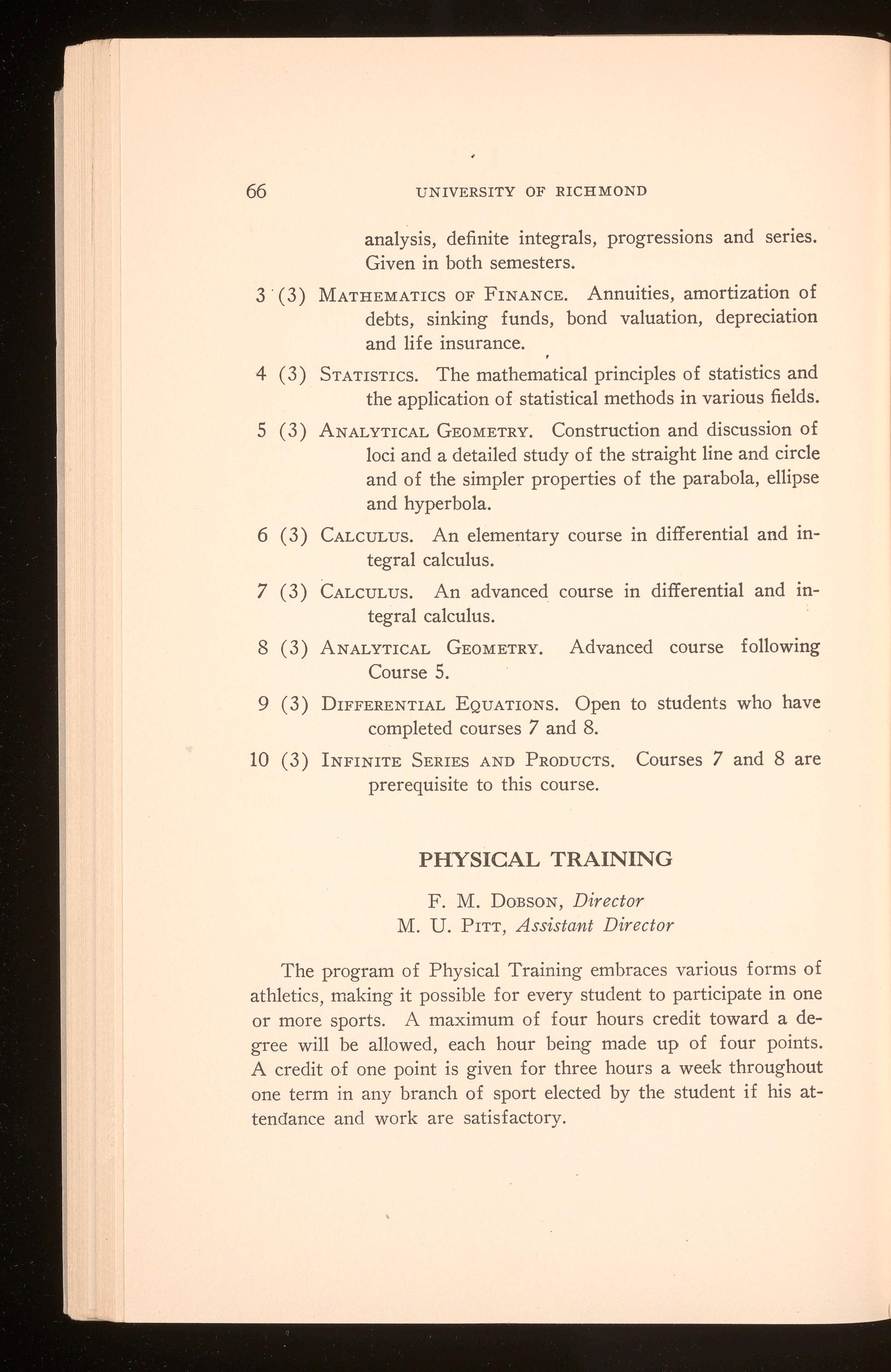
analysis, definite integrals, progressions and series. Given in both semesters.
3 ·(3) MATHEMATICSOF FINANCE. Annuities, amortization of debts, sinking funds, bond valuation, depreciation and life insurance.
4 ( 3) STATISTICS. The mathematical principles of statistics and the application of statistical methods in various fields.
5 (3) ANALYTICALGEOMETRY. Construction and discussion of loci and a detailed study of the straight line and circle and of the simpler properties of the parabola, ellipse and hyperbola.
6 ( 3) CALCULUS. An elementary course in differential and integral calculus.
7 (3) CALCULUS. An advanced course in differential and integral calculus.
8 (3) ANALYTICAL GEOMETRY. Advanced course following Course 5.
9 (3) DIFFERENTIALEQUATIONS. Open to students who have completed courses 7 and 8.
10 ( 3) INFINITE SERIES AND PRODUCTS. Courses 7 and 8 are prerequisite to this course.
F. M. DOBSON,Director
M. U. PITT, Assistant Director
The program of Physical Training embraces various forms of athletics, making it possible for every student to participate in one or more sports. A maximum of four hours credit toward a degree will be allowed, each hour being made up of four points. A credit of one point is given for three hours a week throughout one term in any branch of sport elected by the student if his attendance and work are satisfactory.
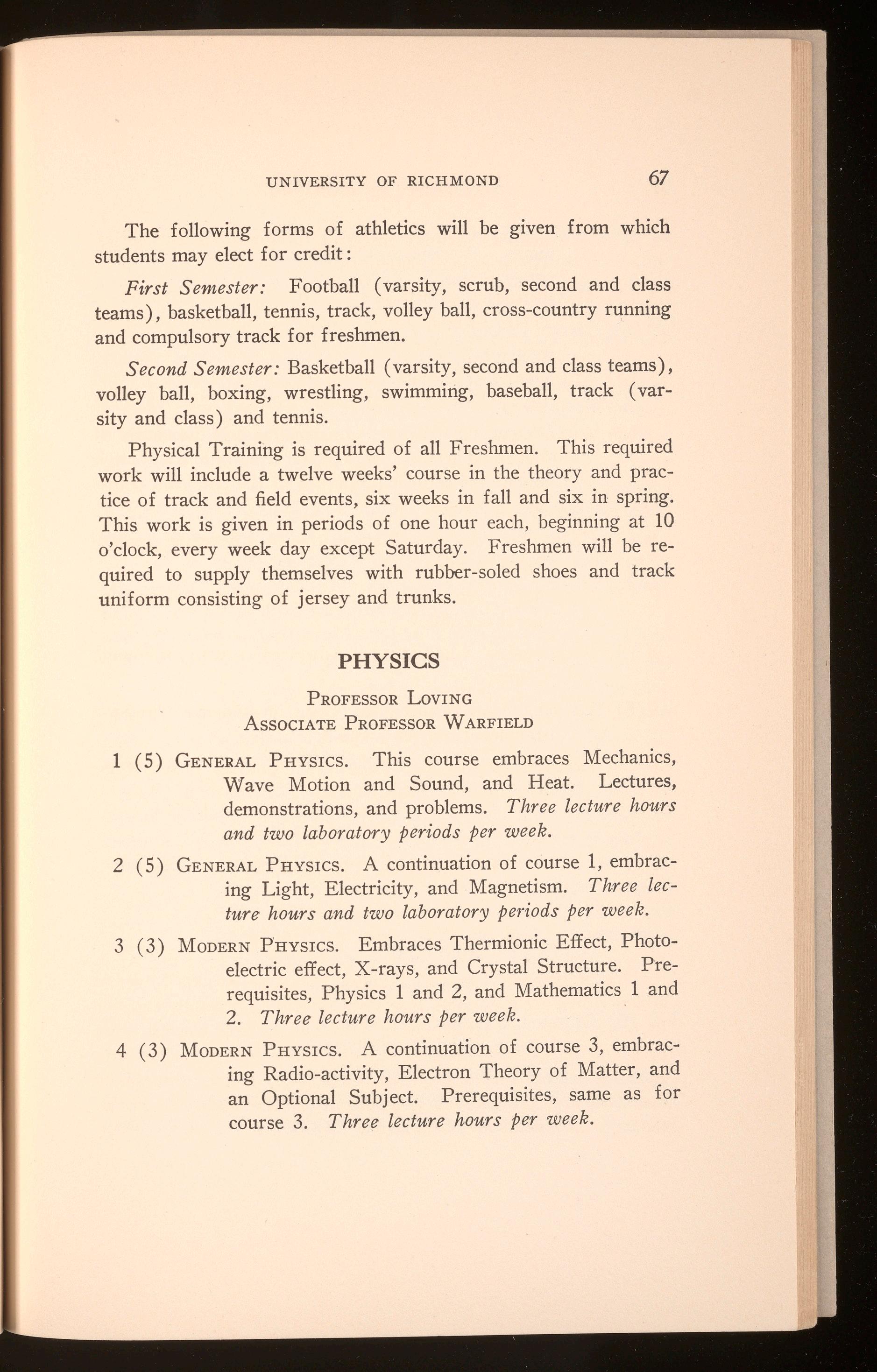
The following forms of athletics will be given from which students may elect for credit:
First Semester: Football ( varsity, scrub, second and class teams), basketball, tennis, track, volley ball, cross-country running and compulsory track for freshmen.
Second Semester: Basketball (varsity, second and class teams), volley ball, boxing, wrestling, swimming, baseball, track ( varsity and class) and tennis.
Physical Training is required of all Freshmen. This required work will include a twelve weeks' course in the theory and practice of track and field events, six weeks in fall and six in spring. This work is given in periods of one hour each, beginning at 10 o'clock, every week day except Saturday. Freshmen will be required to supply themselves with rubber-soled shoes and track uniform consisting of jersey and trunks.
PROFESSORLOVING ASSOCIATEPROFESSORWARFIELD
1 ( 5) GENERALPHYSICS. This course embraces Mechanics, Wave Motion and Sound, and Heat. Lectures, demonstrations, and problems. Three lecture hours and two laboratory periods per week.
2 (5) GENERALPHYSICS. A continuation of course 1, embracing Light, Electricity, and Magnetism. Three lecture hours and two laboratory periods per week.
3 ( 3) MODERNPHYSICS. Embraces Thermionic Effect, Photoelectric effect, X-rays, and Crystal Structure. Prerequisites, Physics 1 and 2, and Mathematics 1 and 2. Three lecture hours per week.
4 ( 3) MODERNPHYSICS. A continuation of course 3, embracing Radio-activity, Electron Theory of Matter, and an Optional Subject. Prerequisites, same as for course 3. Three lecture hours per week.
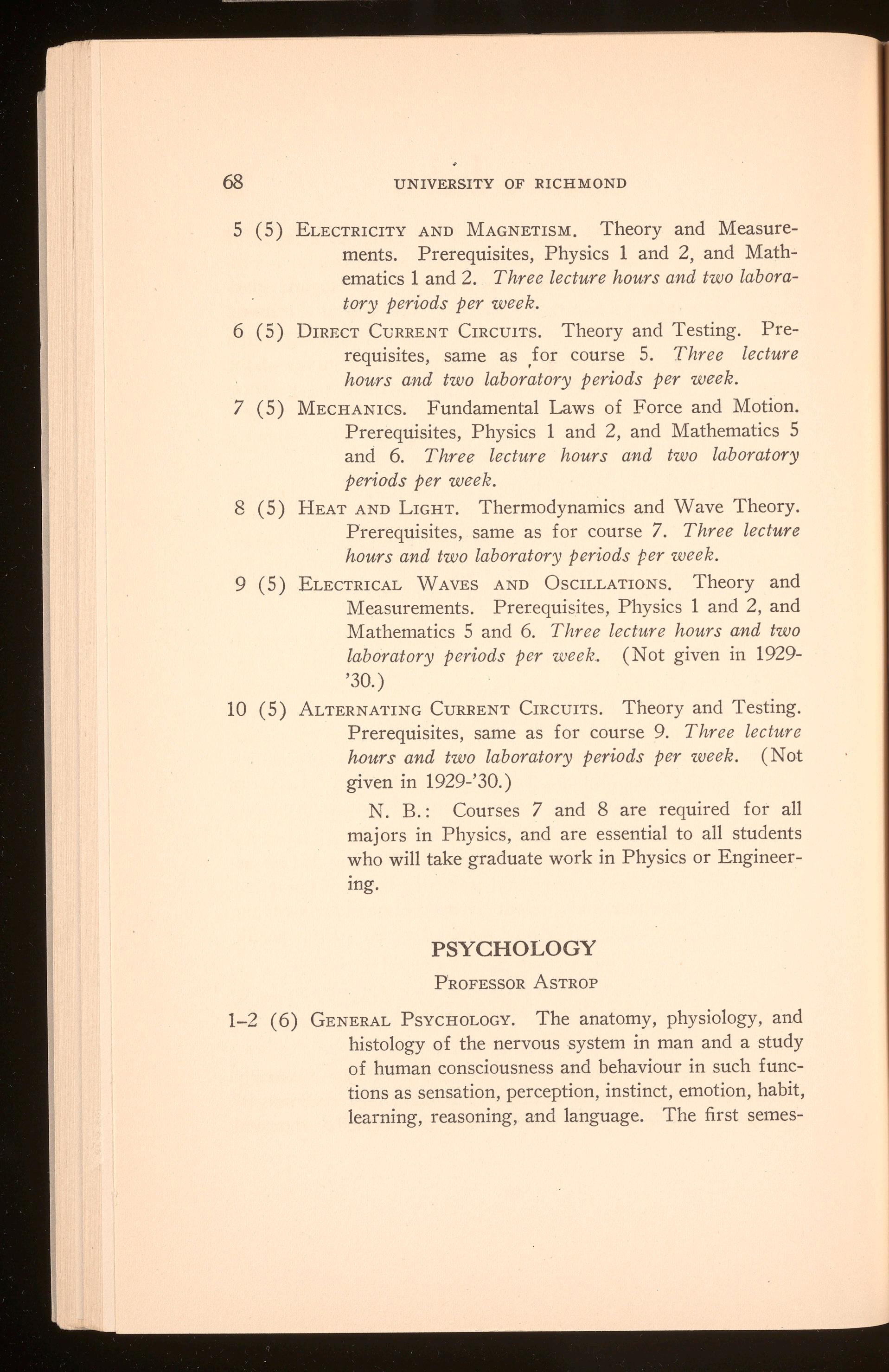
5 ( 5) ELECTRICITYAND MAGNETISM. Theory and Measurements. Prerequisites, Physics 1 and 2, and Mathematics 1 and 2. Three lecture hours and two laboratory periods per week.
6 ( 5) DIRECT CURRENTCIRCUITS. Theory and Testing. Prerequisites, same as .for course 5. Three lecture hours and two laboratory periods per week.
7 (5) MECHANICS . Fundamental Laws of Force and Motion. Prerequisites, Physics 1 and 2, and Mathematics 5 and 6. Three lecture hours and two laboratory periods per week.
8 (5) HEAT AND LIGHT. Thermodynamics and Wave Theory. Prerequisites, same as for course 7. Three lecture hours and two laboratory periods per week.
9 (5) ELECTRICALWAVES AND OscILLATIONS. Theory and Measurements. Prerequisites, Physics 1 and 2, and Mathematics S and 6. Thr ee lecture hours and two laboratory periods p er w eek. (Not given in 1929' 30.)
10 (5) ALTERNATINGCURRENTCIRCUITS. Theory and Testing. Prerequisites, same as for course 9. Thre e lectur e hours and two laboratory periods per week. (Not given in 1929-'30.)
N. B.: Courses 7 and 8 are required for all majors in Physics, and are essential to all students who will take graduate work in Physics or Engineermg.
PROFESSORAsTROP
1-2 (6) GENERALPSYCHOLOGY.The anatomy, physiology, and histology of the nervous system in man and a study of human consciousness and behaviour in such functions as sensation, perception, instinct, emotion, habit, learning, reasoning, and language. The first semes-
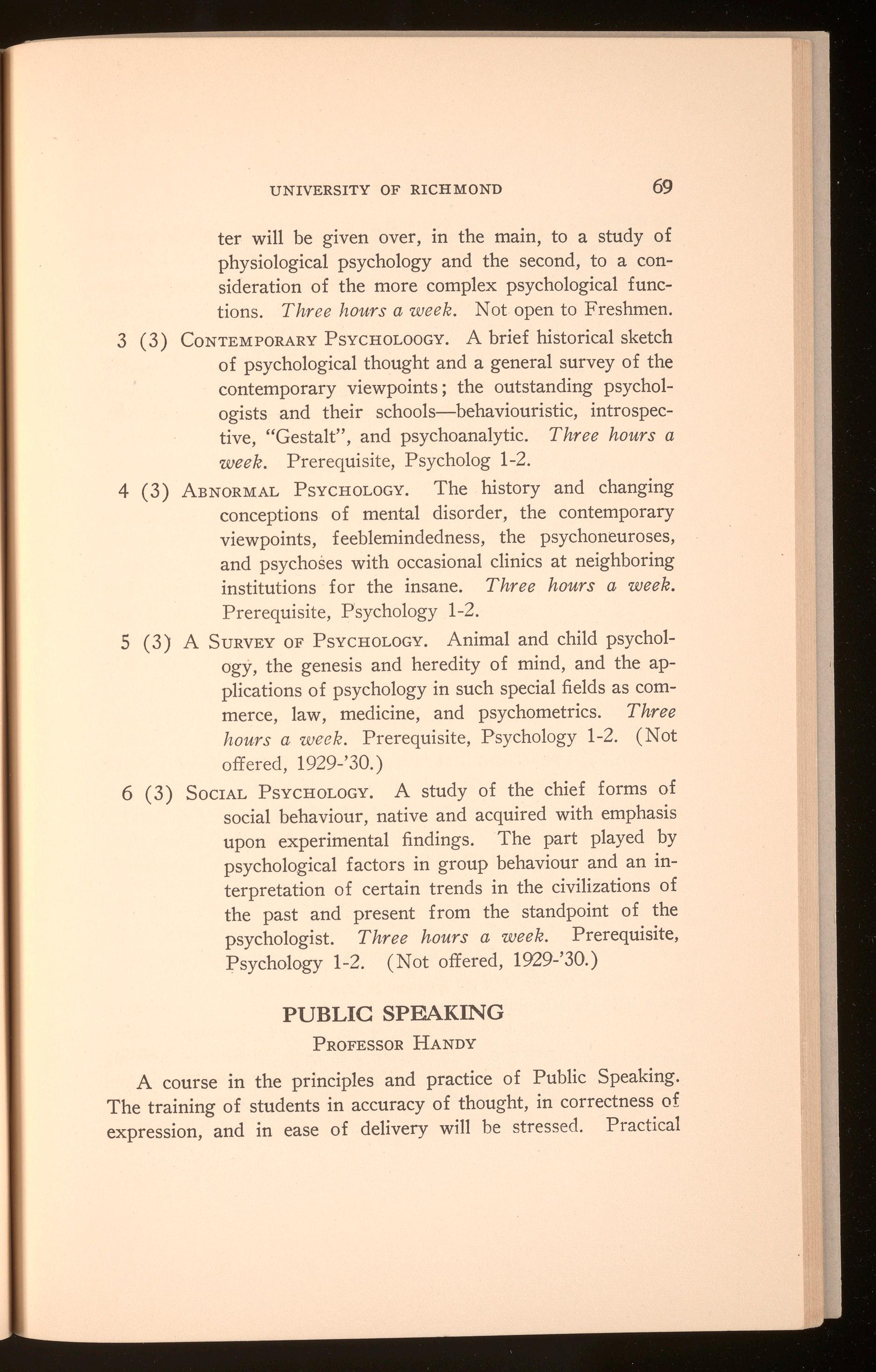
ter will be given over, in the main, to a study of physiological psychology and the second, to a consideration of the more complex psychological functions. Thr ee hours a w eek. Not open to Freshmen.
3 ( 3) CONTEMPORARYPsYCHOLOOGY.A brief historical sketch of psychological thought and a general survey of the contemporary viewpoints ; the outstanding psychologists and their schools-behaviouristic, introspective, "Gestalt", and psychoanalytic. Three hours a week. Prerequisite, Psycholog 1-2.
4 (3) ABNORMALPSYCHOLOGY.The history and changing conceptions of mental disorder, the contemporary viewpoints, feeblemindedness, the psychoneuroses, and psychoses with occasional clinics at neighboring institutions for the insane. Three hours a week. Prerequisite, Psychology 1-2.
5 (3) A SURVEYOF PSYCHOLOGY.Animal and child psychology, the genesis and heredity of mind, and the applications of psychology in such special fields as commerce, law, medicine, and psychometrics. Three hours a wee k. Prerequisite, Psychology 1-2. (Not offered, 1929-'30 . )
6 (3) SocIAL PSYCHOLOGY.A study of the chief forms of social behaviour, native and acquired with emphasis upon experimental findings. The part played by psychological factors in group behaviour and an interpretation of certain trends in the civilizations of the past and present from the standpoint of the psychologist. Three hours a week. Prerequisite, Psychology 1-2. (Not offered, 1929-'30.)
A course in the principles and practice of Public Speaking. The training of students in accuracy of thought, in correctness of expression, and in ease of delivery will be stressed. Practical
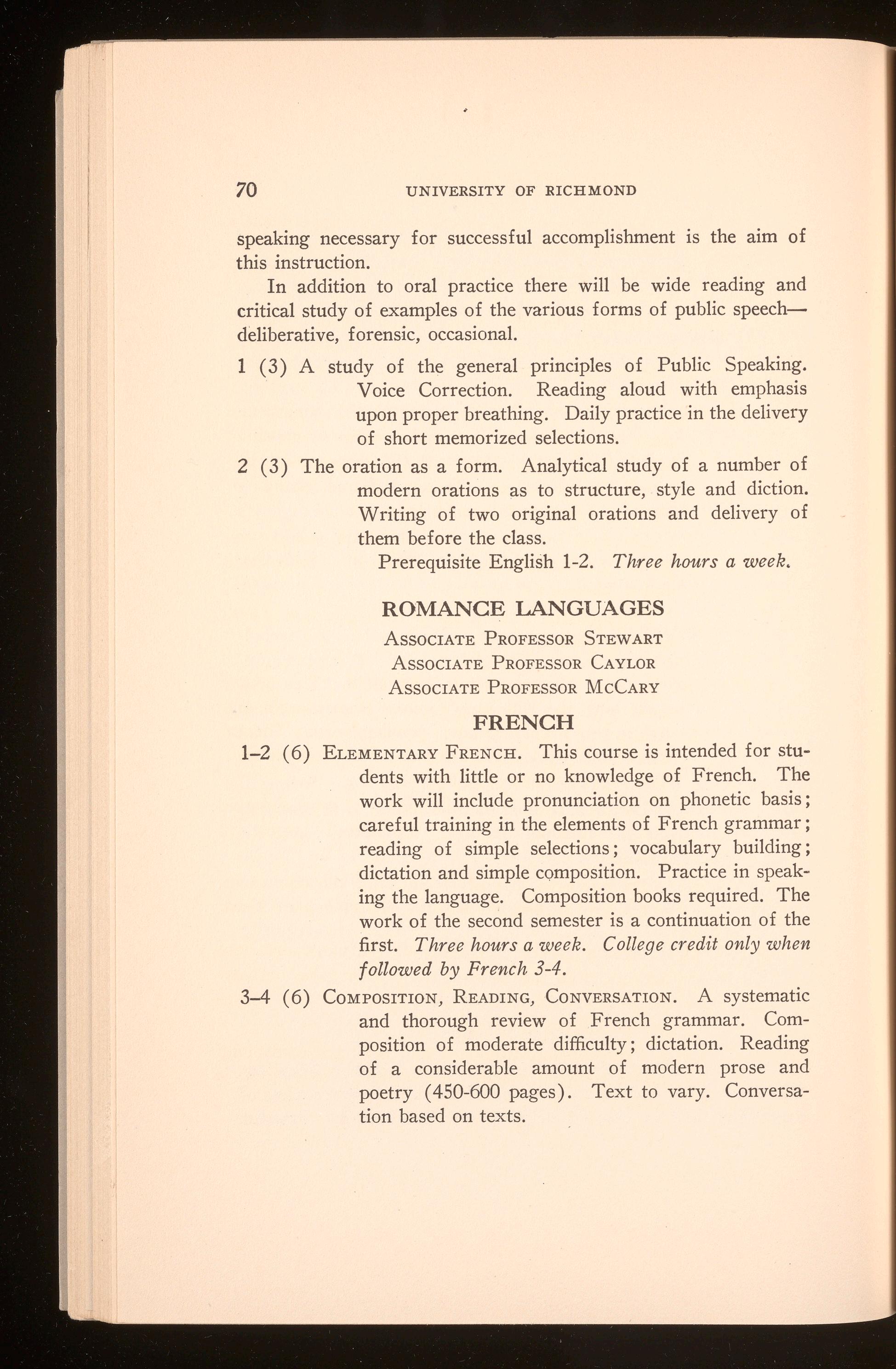
speaking necessary for successful accomplishment is the aim of this instruction.
In addition to oral practice there will be wide reading and critical study of examples of the various forms of public speechdeliberative, forensic, occasional.
1 (3) A study of the general principles of Public Speaking. Voice Correction. Reading aloud with emphasis upon proper breathing. Daily practice in the delivery of short memorized selections.
2 (3) The oration as a form. Analytical study of a number of modern orations as to structure, style and diction. Writing of two original orations and delivery of them before the class.
Prerequisite English 1-2. Three hours a week.
ASSOCIATEPROFESSORSTEWART
ASSOCIATEPROFESSORCAYLOR
AssocIATE PROFESSORMcCARY FRENCH
1-2 (6) ELEMENTARYFRENCH. This course is intended for students with little or no knowledge of French. The work will include pronunciation on phonetic basis; careful training in the elements of French grammar; reading of simple selections; vocabulary building; dictation and simple composition. Practice in speaking the language. Composition books required. The work of the second semester is a continuation of the first. Three hours a week. College credit only when followed by French 3-4.
3-4 (6) COMPOSITION,READING, CONVERSATION.A systematic and thorough review of French grammar. Composition of moderate difficulty; dictation. Reading of a considerable amount of modern prose and poetry ( 450-600 pages). Text to vary. Conversation based on texts.
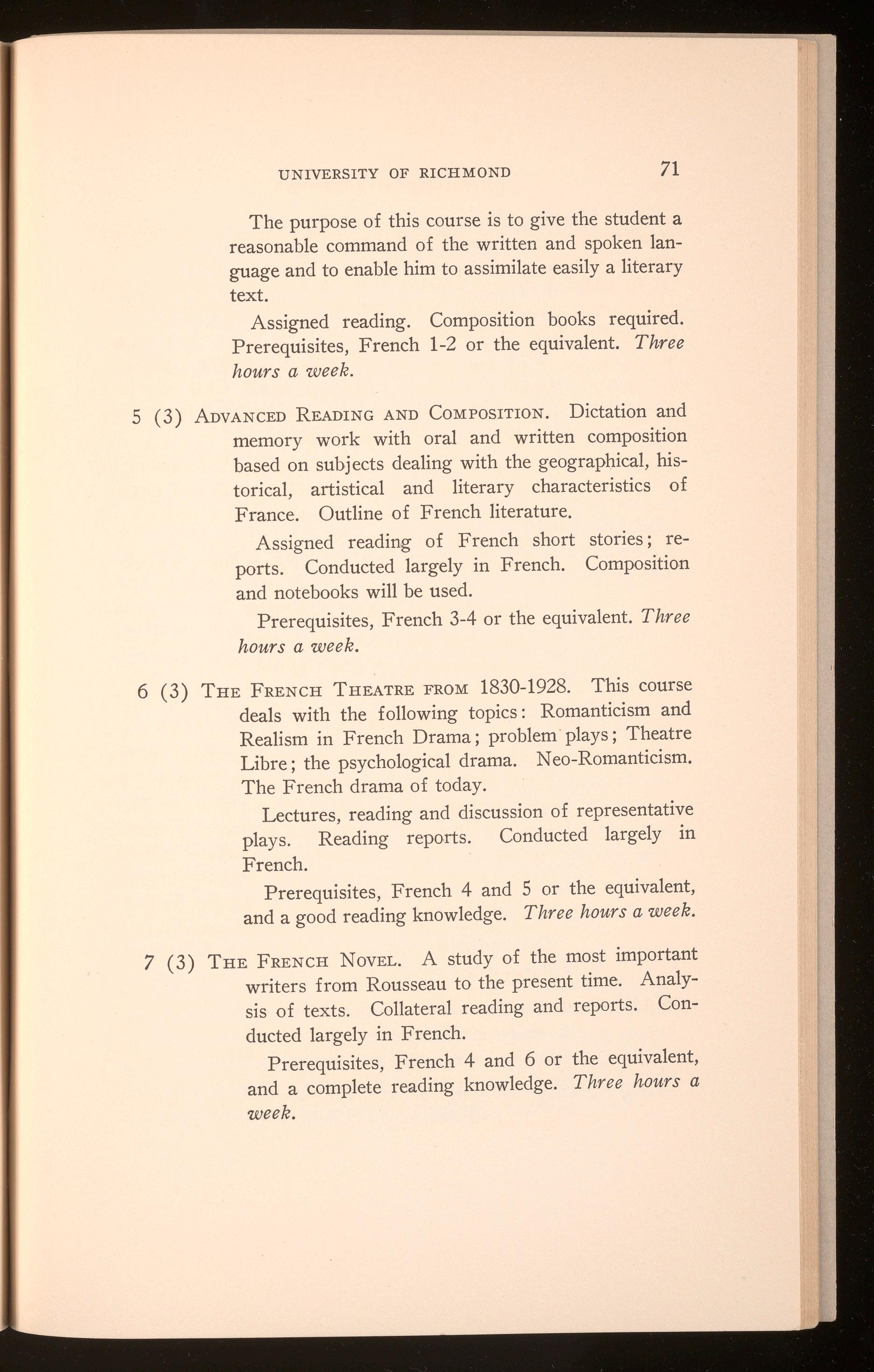
The purpose of this course is to give the student a reasonable command of the written and spoken language and to enable him to assimilate easily a literary text.
Assigned reading. Composition books required. Prerequisites, French 1-2 or the equivalent. Three hours a week.
5 (3) ADVANCEDREADINGAND COMPOSITION.Dictation and memory work with oral and written composition based on subjects dealing with the geographical, historical, artistical and literary characteristics of France. Outline of French literature.
Assigned reading of French short stories; reports. Conducted largely in French. Composition and notebooks will be used.
Prerequisites, French 3-4 or the equivalent. Three hours a week.
6 (3) THE FRENCH THEATREFROM 1830-1928. This course deals with the following topics: Romanticism and Realism in French Drama; problem plays; Theatre Libre; the psychological drama. Neo-Romanticism. The French drama of today.
Lectures, reading and discussion of representative plays. Reading reports. Conducted largely in French.
Prerequisites, French 4 and 5 or the equivalent, and a good reading knowledge. Three hours a week.
7 (3) THE FRENCH NovEL. A study of the most important writers from Rousseau to the present time. Analysis of texts. Collateral reading and reports. Conducted largely in French.
Prerequisites, French 4 and 6 or the equivalent, and a complete reading knowledge. Three hours a week.
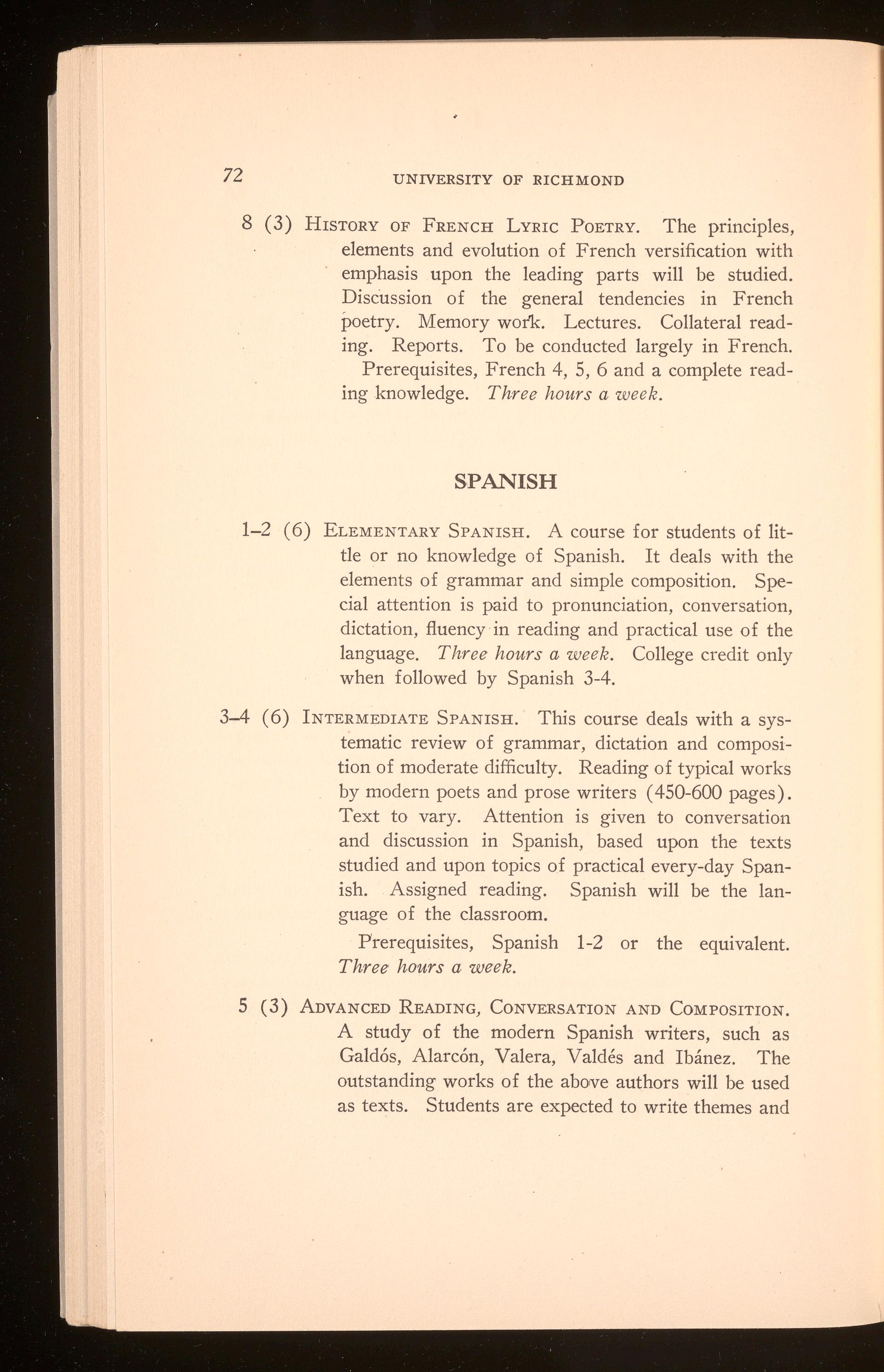
8 (3) HISTORY OF FRENCH LYRIC POETRY. The principles, elements and evolution of French versification with emphasis upon the leading parts will be studied. Discussion of the general tendencies in French poetry. Memory work Lectures. Collateral reading. Reports. To be conducted largely in French. Prerequisites, French 4, 5, 6 and a complete reading knowledge. Three hours a week.
1-2 (6) ELEMENTARYSPANISH. A course for students of little or no knowledge of Spanish. It deals with the elements of grammar and simple composition. Special attention is paid to pronunciation, conversation, dictation, fluency in reading and practical use of the language. Three hours a week. College credit only when followed by Spanish 3-4.
3-4 (6) INTERMEDIATESPANISH. This course deals with a systematic review of grammar, dictation and composition of moderate difficulty. Reading of typical works by modern poets and prose writers ( 450-600 pages). Text to vary. Attention is given to conversation and discussion in Spanish, based upon the texts studied and upon topics of practical every-day Spanish. Assigned reading. Spanish will be the language of the classroom.
Prerequisites, Spanish 1-2 or the equivalent. Three hours a week.
5 (3) ADVANCEDREADING, CONVERSATIONAND COMPOSITION. A study of the modern Spanish writers, such as Gald6s, Alarcon, Valera, Valdes and Ibanez. The outstanding works of the above authors will be used as texts. Students are expected to write themes and

reading reports in Spanish. Collateral Reading. To be conducted largely in Spanish.
Prerequisites, Spanish 3-4 or the equivalent. Three hours a week.
6 (3) MODERNSPANISH DRAMA AND POETRY. A study of the drama and poetry in the XVIII, XIX, and XX century. Assigned collateral reading, reading reports, lectures. The the mes must be written in Spanish.
7-8 (3) EL SIGLO DE ORo. A study of the most prominent writers and their works. Special attention is placed on the works of Cervantes, Calderon and Lope de Vega. Lectures, collateral reading, reading reports, themes in Spanish.
Prerequisites, Spanish 5-6 or the equivalent. Three hours a week. (Not offered in 1929-'30.)
(9) (3) COMMERCIALSPANISH. A study of the Spanish of commerce. This course is designed to give the student indispensable information on commercial subjects and to give him practical knowledge, instead of theory. As the student progresses he will become acquainted with the technical terms and styles that characterize the language used in the Spanish business world of today.
Prerequisite, Spanish 3-4 or the equivalent. Three hours a week. First semester.
(10) (3) SPANISH CORRESPONDENCE.A study of all types of letters. In this course the student will become familiar with the commercial expressions and everyday idioms used in Spanish correspondence.
Prerequisites, Spanish 3-4 or the equivalent. Three hours a week. Second semester.
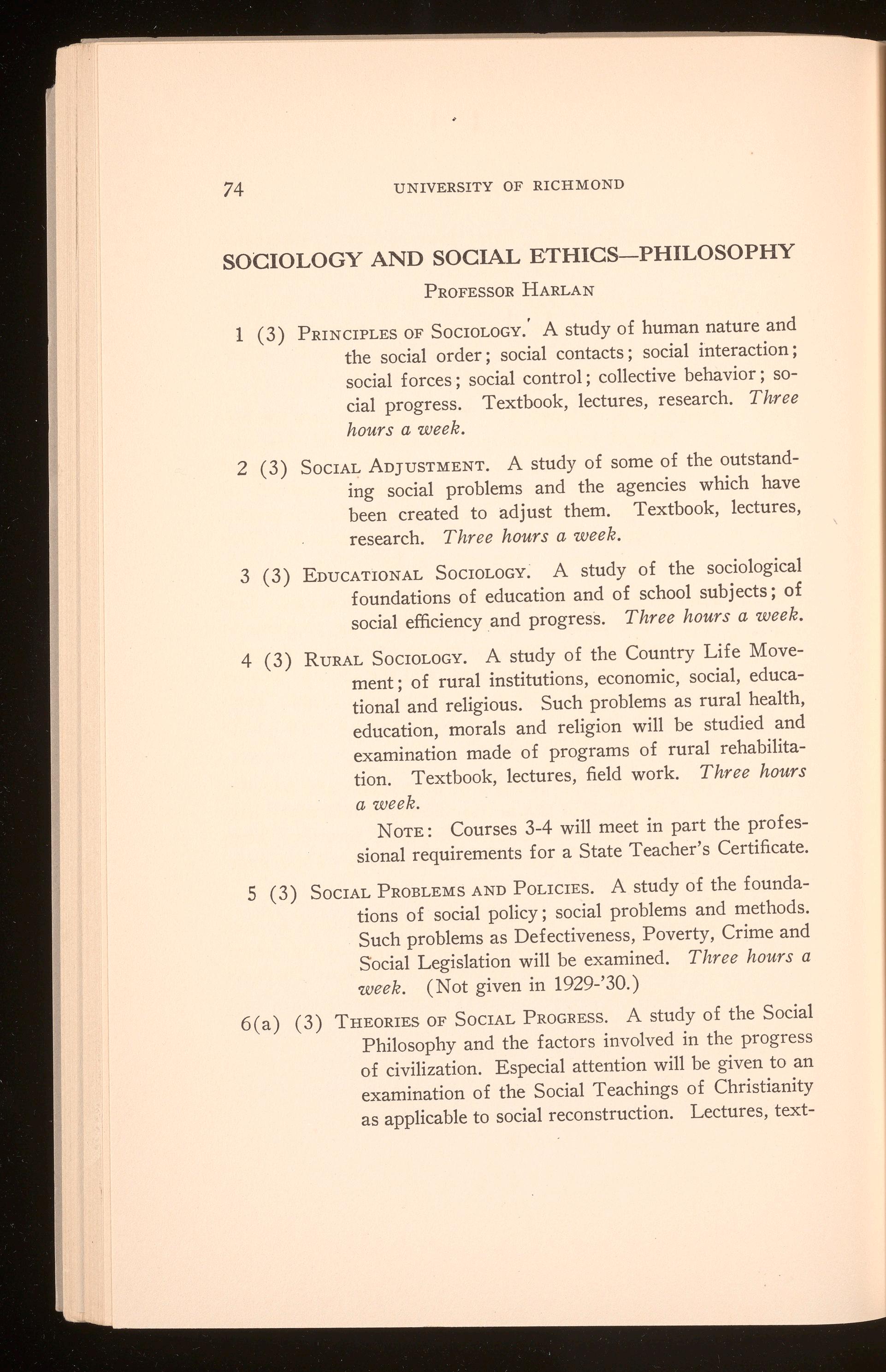
UNIVERSITYOF RICHMOND
SOCIOLOGY AND SOCIAL ETHICS-PHILOSOPHY
PROFESSORHARLAN
1 ( 3) PRINCIPLESOF SocIOLOGY.'A study of human nature and the social order ; social contacts ; social interaction ; social forces ; social control; collective behavior; social progress. Textbook, lectures, research. Three hours a week.
2 (3) SocIAL ADJUSTMENT. A study of some of the outstanding social problems and the agencies which have been created to adjust them. Textbook, lectures, research. Three hours a week.
3 (3) EDUCATIONALSOCIOLOGY;A study of the sociological foundations of education and of school subjects; of social efficiency and progress. Three hours a week.
4 (3) RuRAL SocIOLOGY. A study of the Country Life Movement; of rural institutions, economic, social, educational and religious. Such problems as rural health, education, morals and religion will be studied and examination made of programs of rural rehabilitation. Textbook, lectures, field work. Three hours a week.
NOTE: Courses 3-4 will meet in part the professional requirements for a State Teacher's Certificate.
S (3) SocIAL PROBLEMSANDPoucrns. A study of the foundations of social policy; social problems and methods. Such problems as Defectiveness, Poverty, Crime and Social Legislation will be examined. Three hours a week. (Not given in 1929-'30.)
6 (a) ( 3) THEORIESOF SocIAL PROGRESS.A study of the Social Philosophy and the factors involved in the progress of civilization. Especial attention will be given to an examination of the Social Teachings of Christianity as applicable to social reconstruction. Lectures, text-
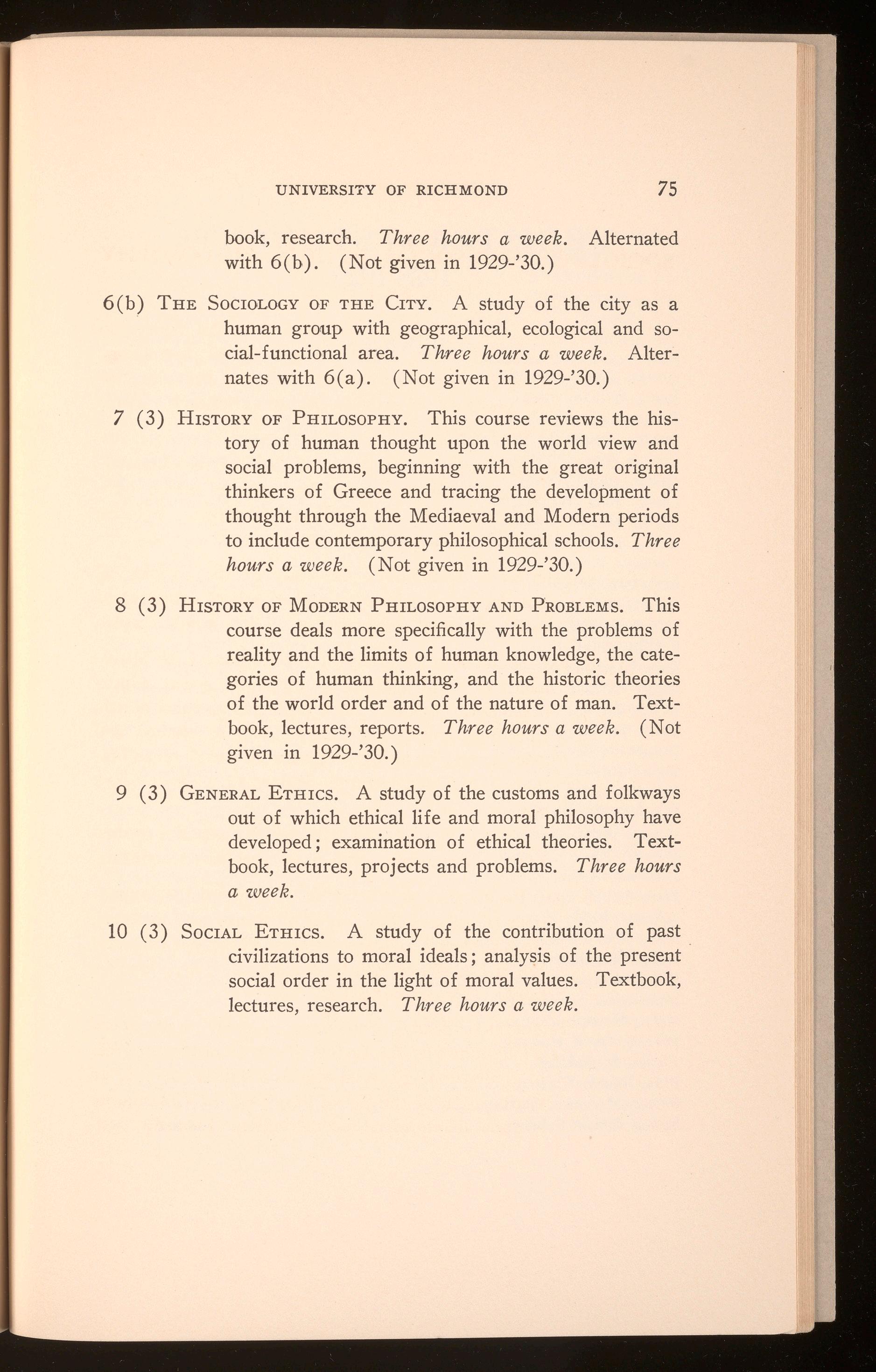
book, research. Three hours a week. Alternated with 6(b). (Not given in 1929-'30.)
6(b) THE SocIOLOGYOF THE CITY. A study of the city as a human group with geographical, ecological and social-functional area. Three hours a week. Alternates with 6(a). (Not given in 1929-'30 )
7 (3) HISTORYOF PHILOSOPHY. This course reviews the history of human thought upon the world view and social problems, beginning with the great original thinkers of Greece and tracing the development of thought through the Mediaeval and Modern periods to include contemporary philosophical schools. Three hours a week. (Not given in 1929-'30.)
8 ( 3) HISTORYOF MODERNPHILOSOPHYANDPROBLEMS.This course deals more specifically with the problems of reality and the limits of human knowledge, the categories of human thinking, and the historic theories of the world order and of the nature of man. Textbook, lectures, reports. Three hours a week. (Not given in 1929-'30.)
9 ( 3) GENERALETHICS. A study of the customs and folkways out of which ethical life and moral philosophy have developed; examination of ethical theories. Textbook, lectures, projects and problems. Three hours a week.
10 ( 3) SocIAL ETHICS. A study of the contribution of past civilizations to moral ideals; analysis of the present · social order in the light of moral values. Textbook, lectures, research. Three hours a week.
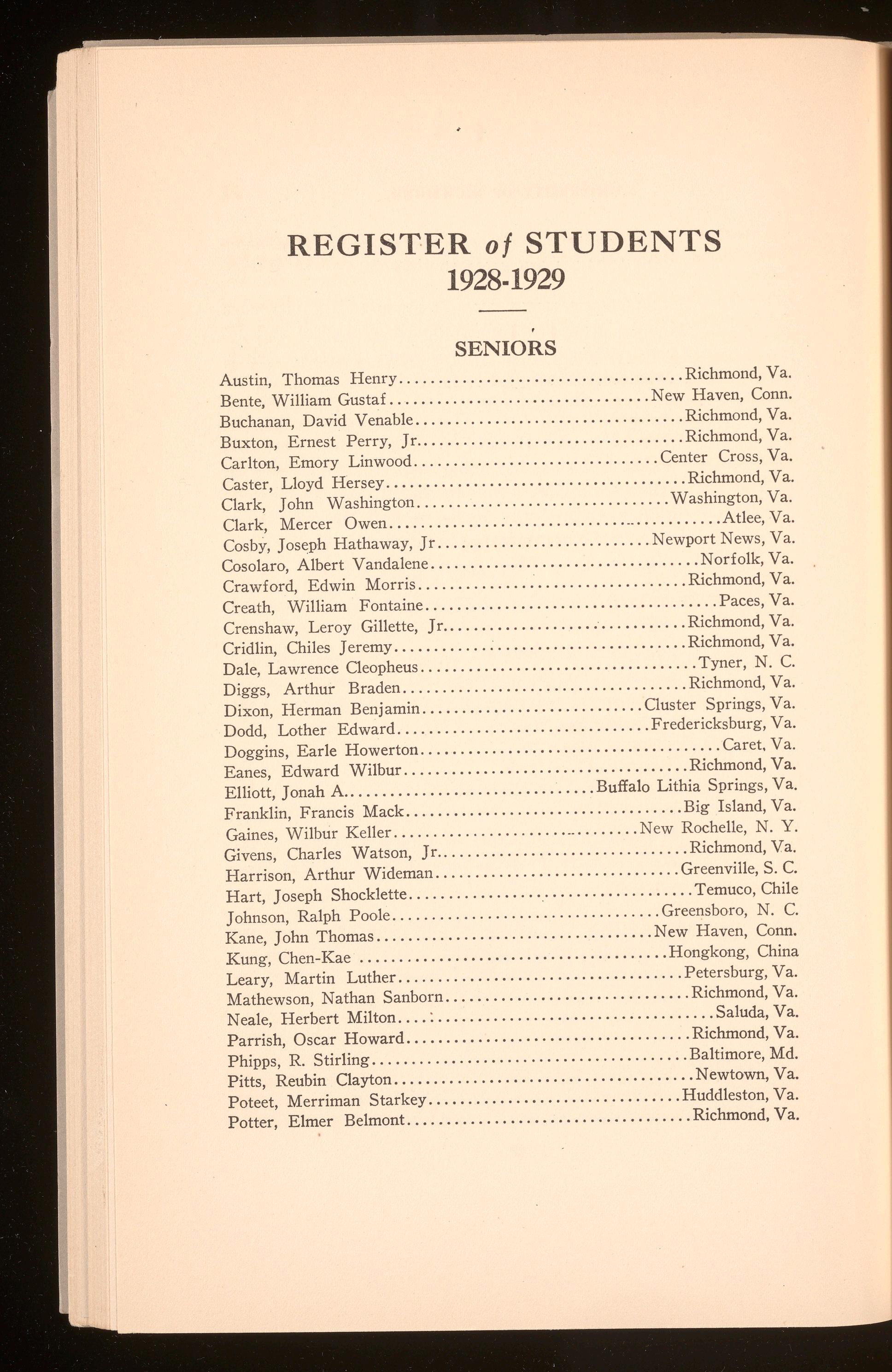
Austin, Thomas Henry .................................... Richmond, Va.
Bente, William Gustaf ................................. New Haven, Conn.
Buchanan, David Venable .................................. Richmond, Va.
Buxton, Ernest Perry, Jr .................................. Richmond, Va.
Carlton, Emory Linwood ............................... Center Cross, Va.
Caster, Lloyd Hersey ...................................... Richmond, Va.
Clark, John Washington ................................ Washington, Va.
Clark, Mercer Owen ........................................... Atlee, Va.
Cosby, Joseph Hathaway, Jr ........................... NewportNews, Va.
Cosolaro, Albert Vandalene .................................. Norfolk, Va.
Crawford, Edwin Morris .................................. Richmond, Va.
Creath, William Fontaine ..................................... Paces, Va.
Crenshaw, Leroy Gillette, Jr ............................... Richmond, Va.
Cridlin, Chiles Jeremy ..................................... Richmond, Va.
Dale, Lawrence Cleopheus ................................... Tyner, N. C.
Diggs, Arthur Braden .................................... Richmond, Va.
Dixon, Herman Benjamin ............................ Cluster Springs, Va.
Dodd, Lother Edward ................................ Fredericksburg, Va.
Doggins, Earle Howerton ...................................... Caret, Va.
Eanes, Edward Wilbur .................................... Richmond, Va.
Elliott, Jonah A ................................ Buffalo Lithia Springs, Va.
Franklin, Francis Mack ................................... Big Island, Va.
Gaines, Wilbur Keller. ............................... New Rochelle, N. Y.
Givens, Charles Watson, Jr ................................ Richmond, Va.
Harrison, Arthur Wideman ............................... Greenville, S. C.
Hart, Joseph Shocklette ................. _ ................... Temuco, Chile
Johnson, Ralph Poole .................................. Greensboro, N. C.
Kane, John Thomas ................................... New Haven, Conn.
Kung, Chen-Kae ....................................... Hongkong, China
Leary, Martin Luther .................................... Petersburg, Va.
Mathewson, Nathan Sanborn ............................... Richmond, Va.
Neale, Herbert Milton .... : ................................... Saluda, Va.
Parrish, Oscar Howard .................................... Richmond, Va.
Phipps, R. Stirling ........................................ Baltimore, Md.
Pitts, Reubin Clayton ...................................... Newtown, Va.
Poteet, Merriman Starkey ................................ Huddleston, Va.
Potter, Elmer Belmont .................................... Richmond, Va.

Robertson, Clifton Hyde .................................. Richmond, Va.
Ross, Charles Justice ................................... Criglersville, Va.
Sanford, Robert Nevitt. .............................. Fredericksburg, Va.
Sanford, Taylor Howe .... ............................ Fredericksburg, Va.
Scarborough, Paul ......................................... Franklin, Va.
Sheppard, Lee Calvin ......................................... Edison, Ga.
Sowell, Benjamin Luther .......................... Buenos Aires, Argentina
Taylor, George Wellford .................................. Richmond, Va.
Trammell, Charles Spurgeon .................................... Salem, Va.
Walton, Loftus Linwood ................................... Richmond, Va.
Walton, Robert Edward ................................... Richmond, Va.
Watson, Wilkes Bowen ................................ Hilton Village, Va.
Wood, Randolph Lowry ..................................... Parksley, Va.
Acree, William Ambrose ..................................... Sharps, Va.
Allen, John Hampton ....................................... Blanton, Va.
Allen, William Robert. ................................... Baltimore, Md.
Anderson, Emory Hamlin .................................. Richmond, Va.
Atkins, Benjamin Harold ............................. Charlotte C. H., Va.
Bailey, Cecil Carden ...................................... Scottsburg, Va.
Bartlett, Harold Overton ................................... Newland, Va.
Bates, Robley Dunglison ................................... Newtown, Va.
Batkins, John Phillips ..................................... Richmond, Va.
Bennett, Walter Hartwell, Jr. ............................... Danville, Va.
Berkeley, Archie Campbell. ................................ Richmond, Va.
Bloomberg, Lawrence Nelson .............................. Richmond, Va.
Booker, James Judson, Jr .................................... Farnham, Va.
Booth, Louis Strother ............. ..................... Danville, Va.
Bowden, John Powell .................................... Pocahontas, Va.
Browne, Winston Melville ................................... Bloxom, Va.
Cairnes, Ruel Wade ....................................... McHenry, Ky.
Carter, William Fields .................................. Martinsville, Va.
Chauncey, Emmet Fulton .............................. Newport News, Va.
Corbitt, Rufus Herbert. ........................................ Zuni, Va.
Corbitt, William Henry ..................................... Zuni, Va.
Cox, Samuel Clements .................................... Richmond, Va.
Crawford, Ralph DeLand .............. .. ................. Richmond, Va.
Dailey, James Berry .................................... Indiantown, N. C.
Dance, Arthur Edward ............... . ................... Petersburg, Va.
Deatelhauser, Joseph Theodore ............................ Cumberland, Md.
Ely, Clarence Patrick ..................................... Richmond, Va.
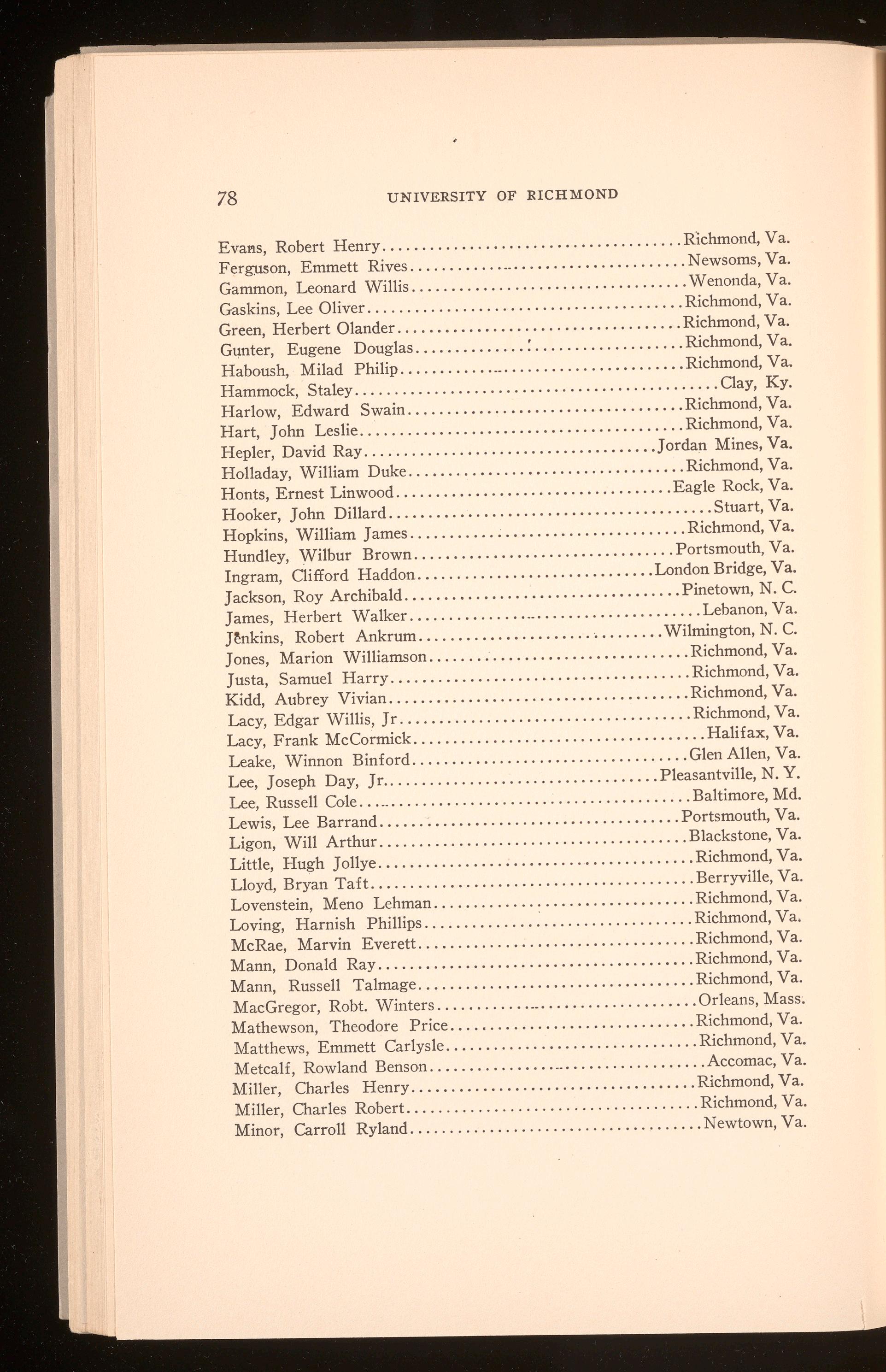
EvaPJs, Robert Henry ...................................... Richmond, Va.
Ferguson, Emmett Rives .................................... Newsoms, Va.
Gammon, Leonard Willis ................................... W enonda, Va.
Gaskins, Lee Oliver ........................................ Richmond, Va.
Green, Herbert Olander .................................... Richmond, Va.
G~nter, Eugene Douglas .............. : ................... Richmond, Va.
Haboush, Milad Philip ..................................... Richmond, Va.
Hammock, Staley .............................................. Clay, Ky.
Harlow, Edward Swain ................................... Richmond, Va.
Hart, John Leslie ......................................... Richmond, Va.
Hepler, David Ray ..................................... Jordan Mines, Va.
Holladay, William Duke ................................... Richmond, Va.
Honts, Ernest Linwood ................................... Eagle Rock, Va.
Hooker, John Dillard ......................................... Stuart, Va.
Hopkins, William James ................................... Richmond, Va.
Hundley, Wilbur Brown ................................. Portsmouth, Va.
Ingram, Oifford Haddon .............................. London Bridge, Va.
Jackson, Roy Archibald ................................... Pinetown, N. C.
James, Herbert Walker ...................................... Lebanon, Va.
Jfokins, Robert Ankrum ............................... Wilmington, N. C.
Jones, Marion Williamson ................................. Richmond, Va.
Justa, Samuel Harry ...................................... Richmond, Va.
Kidd, Aubrey Vivian ...................................... Richmond, Va.
Lacy, Edgar Willis, Jr ..................................... Richmond, Va.
Lacy, Frank McCormick ..................................... Halifax, Va.
Leake, Winnon Binford ................................... Glen Allen, Va.
Lee, Joseph Day, Jr ................................... Pleasantville, N. Y.
Lee, Russell Cole ........................................... Baltimore, Md.
Lewis, Lee Barrand ...................................... Portsmouth, Va.
Ligon, Will Arthur ....................................... Blackstone, Va.
Little, Hugh J ollye ........................................ Richmond, Va.
Lloyd, Bryan Taft ......................................... Berryville, Va.
Lovenstein, Meno Lehman ................................. Richmond, Va.
Loving, Harnish Phillips .............. ; ................... Richmond, Va.
McRae, Marvin Everett. .................................. Richmond, Va.
Mann, Donald Ray ........................................ Richmond, Va.
Mann, Russell Talmage ................................... Richmond, Va.
MacGregor, Robt. Winters ............ __.................... Orleans, Mass; Mathewson, Theodore Price ............................... Richmond, Va.
Matthews, Emmett Carlysle ................................ Richmond, Va.
Metcalf, Rowland Benson .................................... Accomac, Va.
Miller, Charles Henry .................................... Richmond, Va.
Miller, Charles Robert. .................................... Richmond, Va.
Minor, Carroll Ryland ..................................... Newtown, Va.
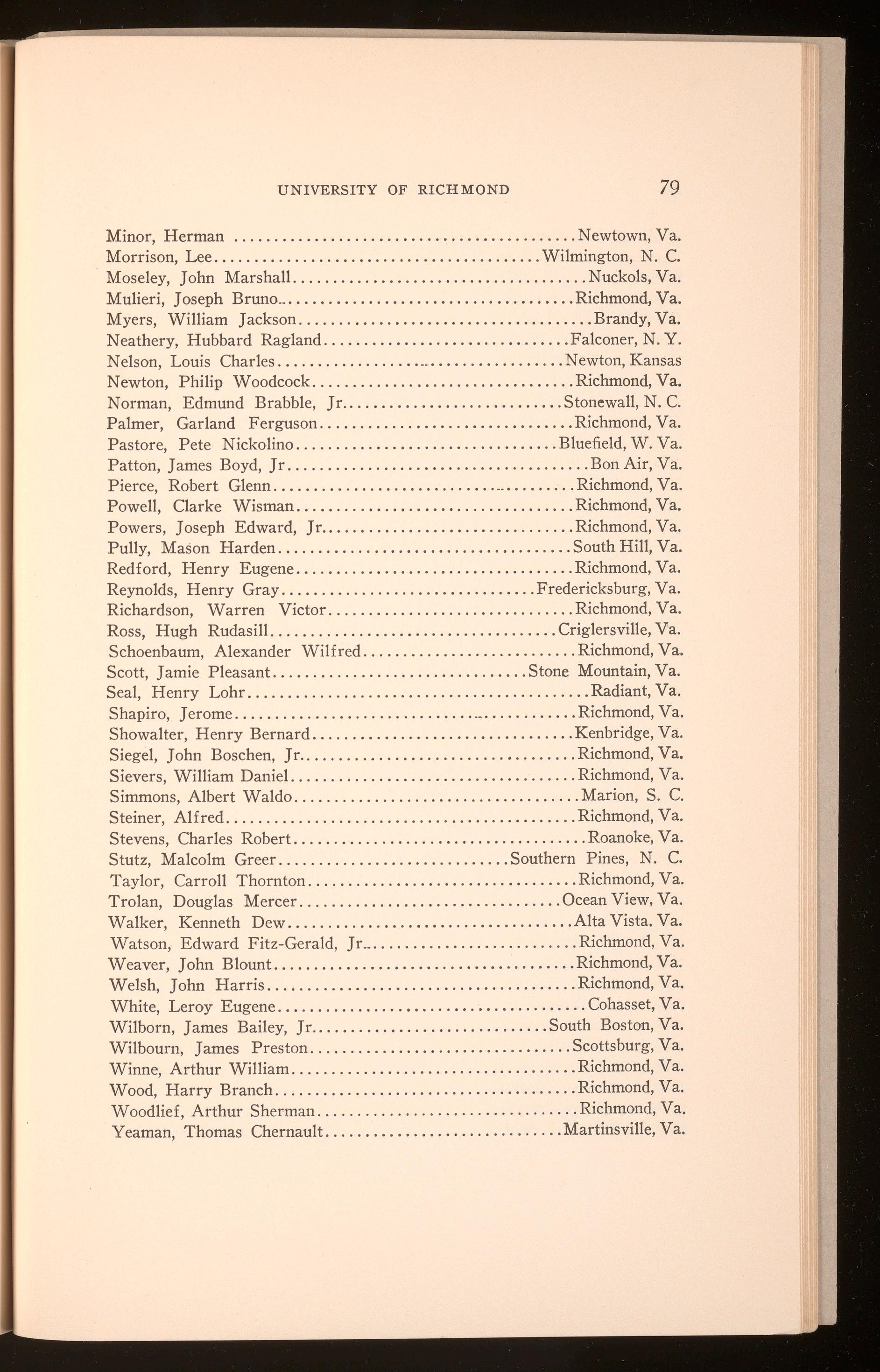
Minor, Herman ........................................... Newtown, Va.
Morrison, Lee ......................................... Wilmington, N. C.
Moseley, John Marshall ..................................... Nuckols, Va.
Mulieri, Joseph Bruno ...................................... Richmond, Va.
Myers, William Jackson ..................................... Brandy, Va.
Neathery, Hubbard Ragland ............................... Falconer, N. Y.
Nels on, Louis Charles Newton, Kansas
Newton, Philip Woodcock ................................. Richmond, Va.
Norman, Edmund Brabble, Jr ............................ Stonewall, N. C.
Palmer, Garland Ferguson ................................ Richmond, Va.
Pastore, Pete Nickolino ................................. Bluefield, W. Va.
Patton, James Boyd, Jr ...................................... Bon Air, Va.
Pierce, Robert Glenn ....................................... Richmond, Va.
Powell, Clarke Wisman ................................... Richmond, Va.
Powers, Joseph Edward, Jr ................................ Richmond, Va.
Pully, Mason Harden South Hill, Va.
Redford, Henry Eugene ................................... Richmond, Va.
Reynolds, Henry Gray ................................ Fredericksburg, Va.
Richardson, Warren Victor ............................... Richmond, Va.
Ross, Hugh Rudasill .................................... Criglersville, Va.
Schoenbaum, Alexander Wilfred ........................... Richmond, Va.
Scott, Jamie Pleasant ................................ Stone Mountain, Va.
Seal, Henry Lohr ........................................... Radiant, Va.
Shapiro, Jerome ............................................ Richmond, Va.
Showalter, Henry Bernard ................................. Kenbridge, Va.
Siegel, John Boschen, Jr ................................... Richmond, Va.
Sievers, William Daniel .................................... Richmond, Va.
Simmons, Albert Waldo .................................... Marion, S. C.
Steiner, Alfred ............................................ Richmond, Va.
Stevens, Charles Robert Roanoke, Va.
Stutz, Malcolm Greer ............................. Southern Pines, N. C.
Taylor, Carroll Thornton .................................. Richmond, Va.
Trolan, Douglas Mercer ................................. Ocean View, Va.
Walker, Kenneth Dew .................................... Alta Vista, Va.
Watson, Edward Fitz-Gerald, Jr .......... , ................. Richmond, Va.
Weaver, John Blount. ............. , ................. , ..... Richmond, Va.
Welsh, John Harris ............. , ......................... Richmond, Va.
White, Leroy Eugene ....................................... Cohasset, Va.
Wilborn, James Bailey, Jr ............ , ................. South Boston, Va.
Wilbourn, James Preston ................................. Scottsburg, Va.
Winne, Arthur William ..................... , ............ , . Richmond, Va.
Wood, Harry Branch .................... , ................. Richmond, Va.
Woodlief, Arthur Sherman Richmond, Va.
Yeaman, Thomas Chernault. ..... , ....................... Martinsville, Va.
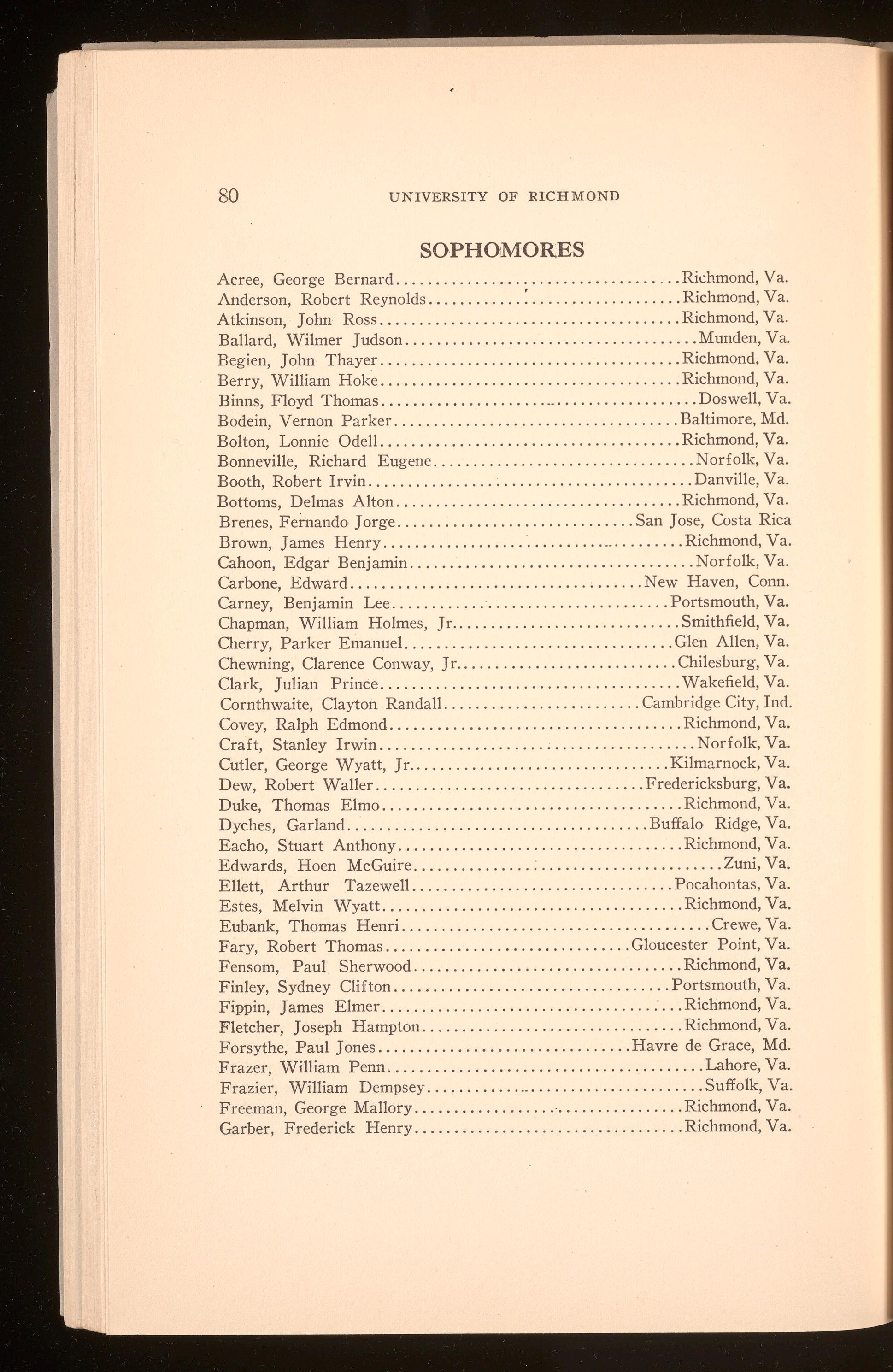
Acree, George Bernard .................................... Richmond, Va.
Anderson, Robert Reynolds ............ : ................... Richmond, Va.
Atkinson, John Ross ...................................... Richmond, Va.
Ballard, Wilmer Judson ..................................... Munden, Va.
Begien, John Thayer ...................................... Richmond, Va.
Berry, William Hoke ...................................... Richmond, Va.
Binns, Floyd Thomas ......................................... Doswell, Va.
Bodein, Vernon Parker .................................... Baltimore, Md.
Bolton, Lonnie Odell. ..................................... Richmond, Va.
Bonneville, Richard Eugene ................................. Norfolk, Va.
Booth, Robert Irvin ......................................... Danville, Va.
Bottoms, Delmas Alton .................................... Richmond, Va.
Brenes, Fernando Jorge .............................. San Jose, Costa Rica
Brown, James Henry ....................................... Richmond, Va.
Cahoon, Edgar Benjamin .................................... Norfolk, Va.
Carbone, Edward .............................. , ...... New Haven, Conn.
Carney, Benjamin Lee ................................... Portsmouth, Va.
Chapman, William Holmes, Jr. ............................ Smithfield, Va.
Cherry, Parker Emanuel. ................................. Glen Allen, Va.
Chewning, Clarence Conway, Jr. Chiles burg, Va.
Clark, Julian Prince ...................................... Wakefield, Va.
Cornthwaite, Oayton Randall ......................... Cambridge City, Ind.
Covey, Ralph Edmond ..................................... Richmond, Va.
Craft, Stanley Irwin ........................................ Norfolk, Va.
Cutler, George Wyatt, Jr ................................. Kilmarnock, Va.
Dew, Robert Waller. ................................. Fredericksburg, Va.
Duke, Thomas Elmo ...................................... Richmond, Va.
Dyches, Garland ...................................... Buffalo Ridge, Va.
Eacho, Stuart Anthony .................................... Richmond, Va.
Edwards, Hoen McGuire ....................................... Zuni, Va.
Ellett, Arthur Tazewell ................................. Pocahontas, Va.
Estes, Melvin Wyatt. ..................................... Richmond, Va.
Eubank, Thomas Henri ....................................... Crewe, Va.
Fary, Robert Thomas ............................... Gloucester Point, Va.
Fensom, Paul Sherwood .................................. Richmond, Va.
Finley, Sydney Oifton ................................... Portsmouth, Va.
Fippin, James Elmer ...................................... Richmond, Va.
Fletcher, Joseph Hampton ................................. Richmond, Va.
Forsythe, Paul Jones ................................ Havre de Grace, Md.
Frazer, William Penn ........................................ Lahore, Va.
Frazier, William Dempsey .................................... Suffolk, Va.
Freeman, George Mallory .................. ·................ Richmond, Va.
Garber, Frederick Henry .................................. Richmond, Va.
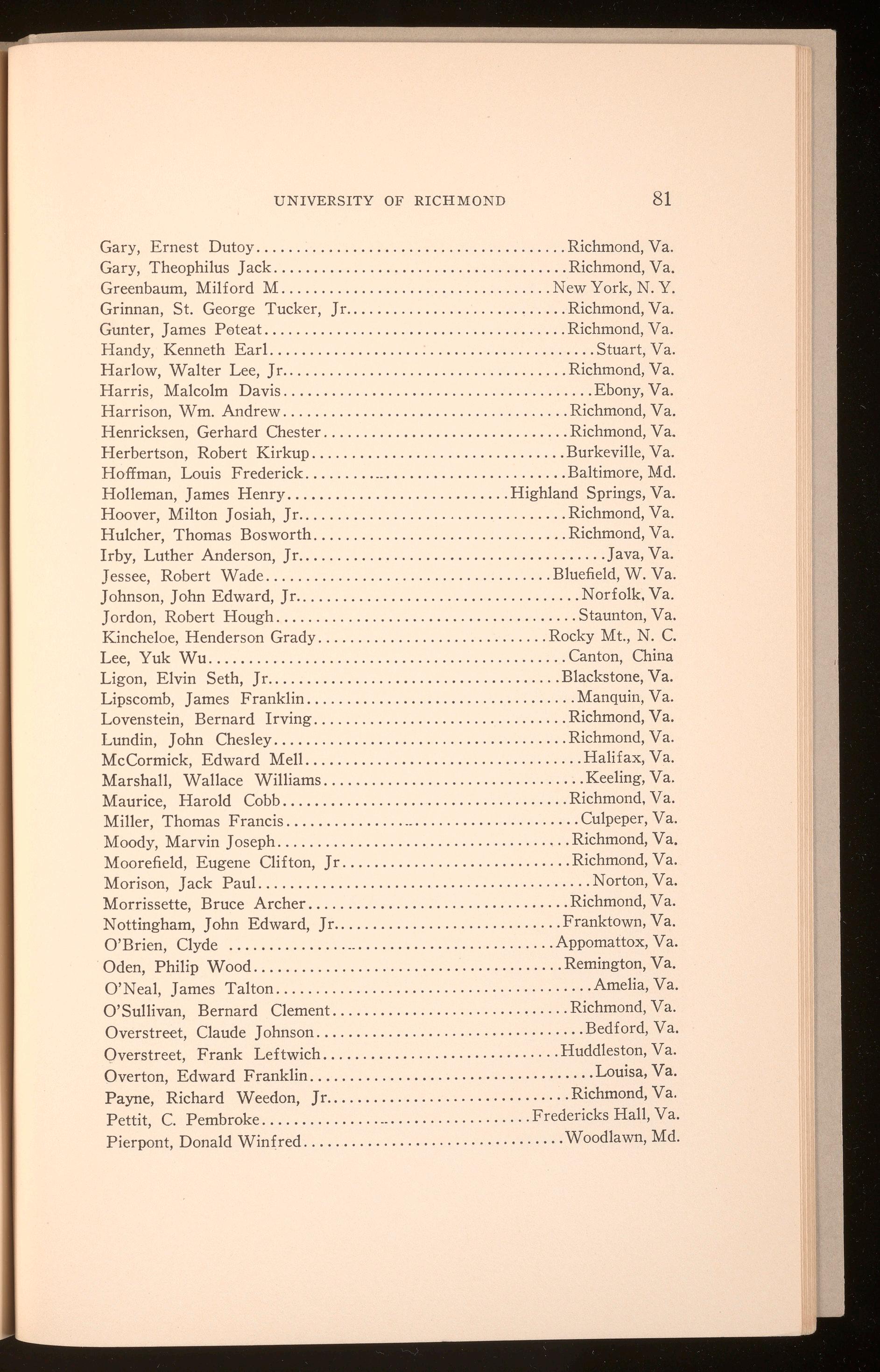
Gary, Ernest Dutoy ....................................... Richmond, Va.
Gary, Theophilus Jack ..................................... Richmond, Va.
Greenbaum, Milford M New York, N. Y.
Grinnan, St. George Tucker, Jr. Richmond, Va.
Gunter, James Poteat. ..................................... Richmond, Va.
Handy, Kenneth Earl. ........................................ Stuart, Va.
Harlow, Walter Lee, Jr .................................... Richmond, Va.
Harris, Malcolm Davis ....................................... Ebony, Va.
Harrison, Wm. Andrew .................................... Richmond, Va.
Henricksen, Gerhard Chester ............................... Richmond, Va.
Herbertson, Robert Kirkup ................................ Burkeville, Va.
Hoffman, Louis Frederick .................................. Baltimore, Md.
Holleman, James Henry ............................ Highland Springs, Va.
Hoover, Milton Josiah, Jr .................................. Richmond, Va.
H ulcher, Thomas Bosworth ................................ Richmond, Va.
Irby, Luther Anderson, Jr ....................................... Java, Va.
Jessee, Robert Wade .................................... Bluefield, W. Va.
Johnson, John Edward, Jr .................................... Norfolk, Va.
Jordon, Robert Hough Staunton, Va.
Kincheloe, Henderson Grady ............................. Rocky Mt., N. C.
Lee, Yuk Wu ............................................. Canton, China
Ligon, Elvin Seth, Jr Blackstone, Va.
Lipscomb, James Franklin Manquin, Va.
Lovenstein, Bernard Irving ................................ Richmond, Va.
Lundin, John Chesley ..................................... Richmond, Va.
McCormick, Edward Mell ................................... Halifax, Va.
Marshall, Wallace Williams Keeling, Va.
Maurice, Harold Cobb .................................... Richmond, Va.
Miller, Thomas Francis ...................................... Culpeper, Va.
Moody, Marvin Joseph ..................................... Richmond, Va.
Moorefield, Eugene Clifton, Jr Richmond, Va.
Morison, Jack Paul. Norton, Va.
Morrissette, Bruce Archer Richmond, Va.
Nottingham, John Edward, Jr Franktown, Va.
O'Brien, Clyde .......................................... Appomattox, Va.
Oden, Philip Wood Remington, Va.
O'Neal, James Talton ........................................ Amelia, Va.
O'Sullivan, Bernard Clement. ............................. Richmond, Va.
Overstreet, Claude Johnson .................................. Bedford, Va.
Overstreet, Frank Leftwich .............................. Huddleston, Va.
Overton, Edward Franklin .................................... Louisa, Va.
Payne, Richard Weedon, Jr ............................... Richmond, Va.
Pettit, C. Pembroke ................................... Fredericks Hall, Va.
Pierpont, Donald Winfred ................................. Woodlawn, Md.
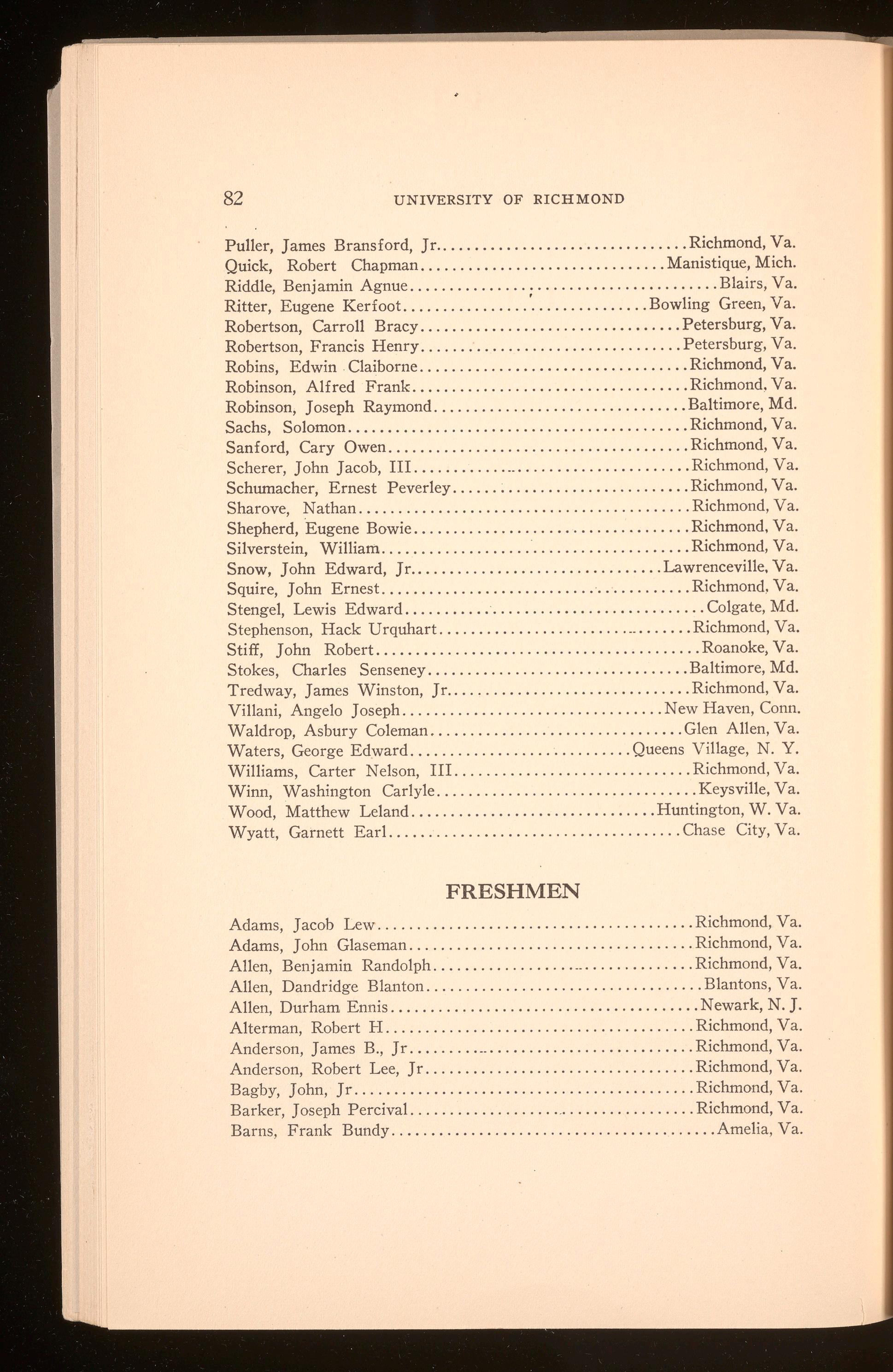
Puller, James Bransford, Jr ................................ Richmond, Va.
Quick, Robert Chapman ............................... Manistique, Mich.
Riddle, Benjamin Agnue ....................................... Blairs, Va.
Ritter, Eugene Kerfoot ............... .' ............... Bowling Green, Va.
Robertson, Carroll Bracy ................................. Petersburg, Va.
Robertson, Francis Henry ................................. Petersburg, Va.
Robins, Edwin Claiborne .................................. Richmond, Va.
Robinson, Alfred Frank ................................... Richmond, Va.
Robinson, Joseph Raymond ................................ Baltimore, Md.
Sachs, Solomon ........................................... Richmond, Va.
Sanford, Cary Owen ...................................... Richmond, Va.
Scherer, John Jacob, III .................................... Richmond, Va.
Schumacher, Ernest Peverley .............................. Richmond, Va.
Sharove, Nathan .......................................... Richmond, Va.
Shepherd, Eugene Bowie ................................... Richmond, Va.
Silverstein, William ....................................... Richmond, Va.
Snow, John Edward, Jr ................................ Lawrenceville, Va.
Squire, John Ernest. .......................... ·............ Richmond, Va.
Stengel, Lewis Edward ...................................... Colgate, Md.
Stephenson, Hack Urquhart ................................. Richmond, Va.
Stiff, John Robert. ........................................ Roanoke, Va.
Stokes, Charles Senseney ................................. Baltimore, Md.
Tredway, James Winston, Jr ............................... Richmond, Va.
Villani, Angelo Joseph ............. ................... New Haven, Conn.
Waldrop, Asbury Coleman ................................ Glen Allen, Va.
Waters, George Edward ............................ Queens Village, N. Y.
Williams, Carter Nelson, III .............................. Richmond, Va.
Winn, Washington Carlyle ................................. Keysville, Va.
Wood, Matthew Leland ............................... Huntington, W. Va.
Wyatt, Garnett Earl. ...... ............................ Chase City, Va.
Adams, Jacob Lew ........................................ Richmond, Va.
Adams, John Glaseman .................................... Richmond, Va.
Allen, Benjamin Randolph Richmond, Va.
Allen, Dandridge Blanton ................................... Blantons, Va.
Allen, Durham Ennis ....................................... Newark, N. J.
Alterman, Robert H ....................................... Richmond, Va.
Anderson, James B., Jr ..................................... Richmond, Va.
Anderson, Robert Lee, Jr .................................. Richmond, Va.
Bagby, John, Jr ........................................... Richmond, Va.
Barker, Joseph Percival. .................................... Richmond, Va.
Barns, Frank Bundy ......................................... Amelia, Va.
Battiato, Joe New York, N. Y.
Bayliss, Wm. Benton, Jr ............................•...... Richmond, Va.
Beale, Kenneth Woodson Scottsville, Va.
Belcher, Joseph Powell Chester, Va.
Berliant, Bennie Bernard ................................... Richmond, Va.
Billingsley, Addison Gordon ........................... Fredericksburg, Va.
Bloxom, Winfrey Carlton .................................. Richmond, Va.
Boschen, Louis Amel, Jr ................................... Richmond, Va.
Boswell, Thomas Nelson ................................... Baltimore, Md.
Boxley, Roy Coleman Bumpass, Va.
Boyer, Julian Flint. Orange, Va.
Bremner, Robert Gunn ..................... New Port Richey, Fla
Britton, James Holmes, Jr Richmond, Va.
Broaddus, Charles Coleman, Jr ............................. Richmond, Va.
Brooks, Aubrey Garland ............ ..... .................. Powhatan, Va.
Broaddus, Malcolm Rudolph Hopewell, Va
Br oaddus, Wm. Ellwood, Jr ........... .... Glen Allen, Va.
Browder, John Barrs ...................................... Richmond, Va.
Browning, Clarence ....................................... Logan, W. Va.
Bryce, William Feilding, Jr ...................... Richmond, Va.
Butler, Henry Lee, Jr. ................ Richmond, Va.
Calbreath, James Elmer Cowart, Va.
Cales, James Arthur Louisa, Va.
Campbell, Robert Bailey ................................... Richmond, Va.
Canada, Randolph Patrick .................................. Richmond, Va.
Carr, John Lee, Jr ........... ........ ... . .... ..... ......... Richmond, Va.
Carr, Thomas Peyton .........
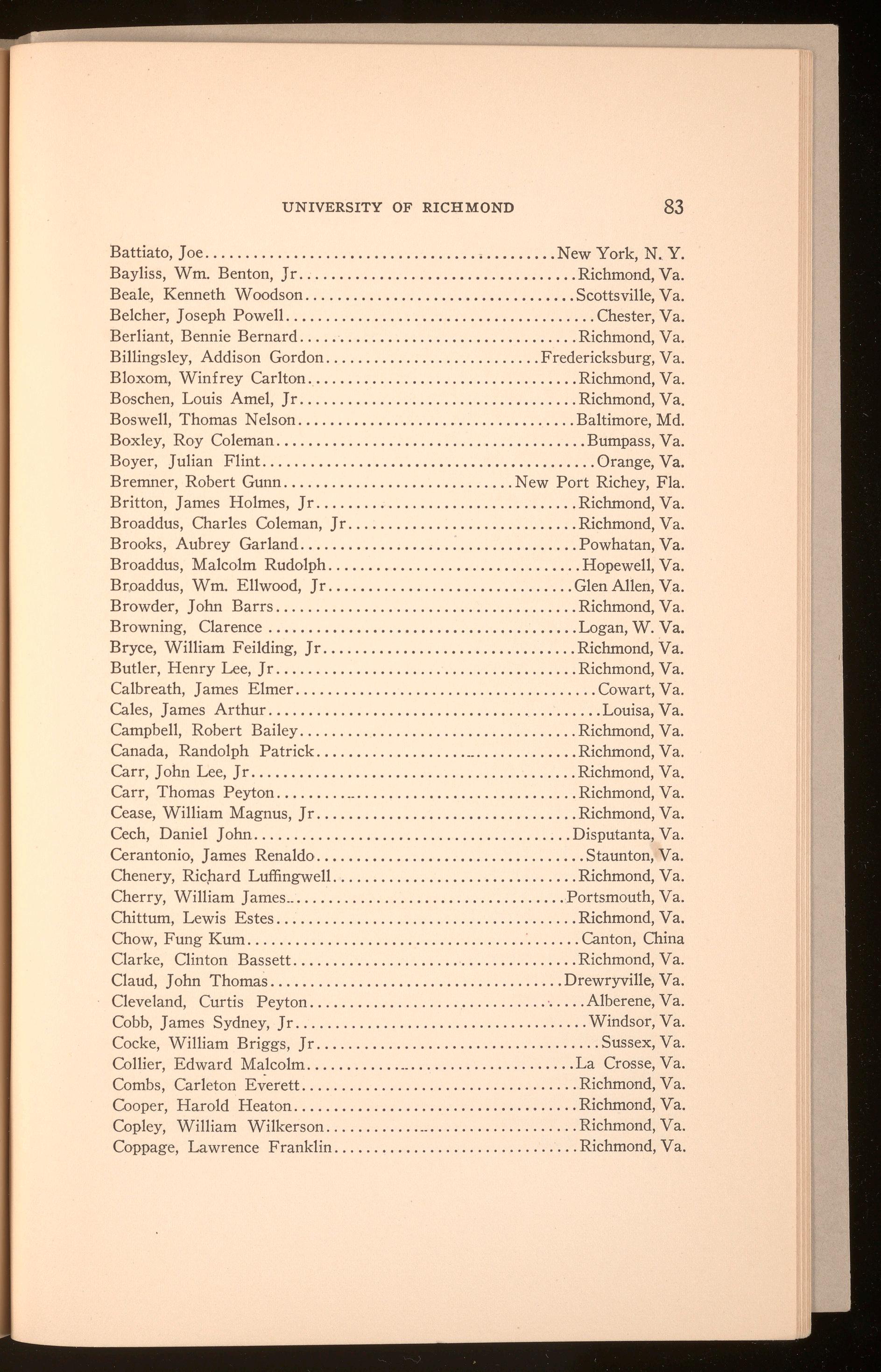
. ................ Richmond, Va.
Cease, William Magnus, Jr ...... . Richmond, Va.
Cech, Daniel John Disputanta, Va.
Cerantonio, James Renaldo .................................. Staunton, Va.
Chenery, Ric .hard Luffingwell ............................... Richmond, Va.
Cherry, William James Portsmouth, Va.
Chittum, Lewis Estes Richmond, Va.
Chow, Fung Kum ·....... Canton, China
Clarke, Clinton Bassett. ............................. .. Richmond, Va.
Claud, John Thomas ..... ...... .. .. .............. ........ Drewryville, Va.
Cleveland, Curtis Peyton .............. ................ ·..... Alberene, Va.
Cobb, James Sydney, Jr Windsor, Va.
Cocke, William Briggs, Jr Sussex, Va.
Collier, Edward Malcolm La Crosse, Va.
Combs, Carleton E;erett. Richmond, Va.
Cooper, Harold Heaton ................... ..... ....... ... .. Richmond, Va.
Copley, William Wilkerson ................................. Richmond, Va.
Coppage , Lawrence Franklin Richmond, Va.
84
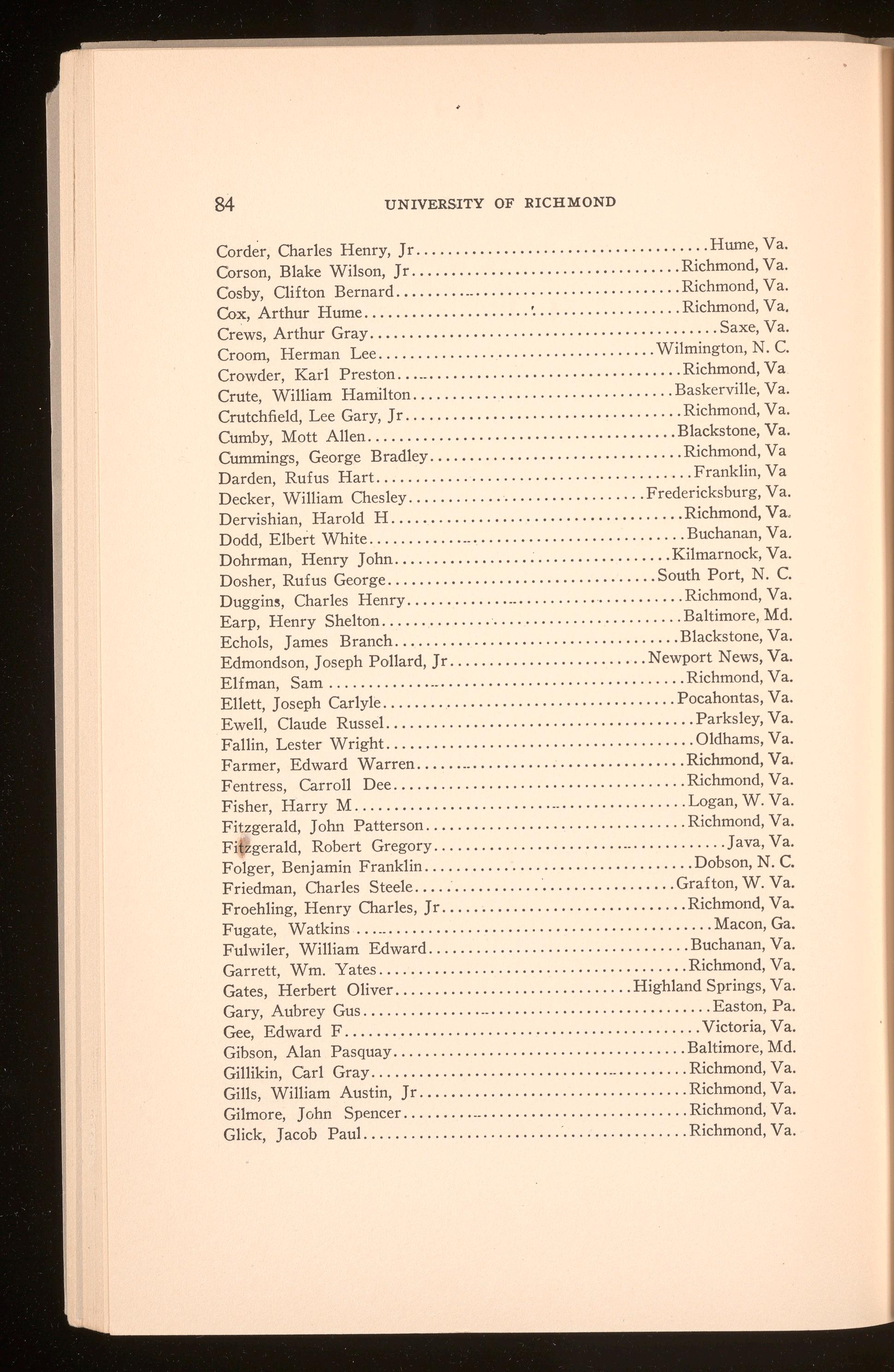
Corder, Charles Henry, Jr ..................................... Hume, Va.
Corson, Blake Wilson, Jr .................................. Richmond, Va.
Cosby, Clifton Bernard ..................................... Richmond, Va.
Cox, Arthur Hume ..................... •................... Richmond, Va.
Crews, Arthur Gray ............................................ Saxe, Va.
Croom, Herman Lee ................................... Wilmington, N. C.
Crowder, Karl Preston ..................................... Richmond, Va
Crute, William Hamilton ................................. Baskerville, Va.
Crutchfield, Lee Gary, Jr ................................... Richmond, Va.
Cumby, Mott Allen ....................................... Blackstone, Va.
Cummings, George Bradley ................................ Richmond, Va
Darden, Rufus Hart. ....................................... Franklin, Va
Decker, William Chesley .............................. Fredericksburg, Va.
Dervishian, Harold H ..................................... Richmond, Va.
Dodd, Elbert White ......................................... Buchanan, Va.
Dohrman, Henry John ................. ; ................. Kilmarnock, Va.
Dosher, Rufus George .................................. South Port, N. C.
Duggin~, Charles Henry .................................... Richmond, Va.
Earp, Henry Shelton ...................................... Baltimore, Md.
Echols, James Branch .................................... Blackstone, Va.
Edmondson, Joseph Pollard, Jr ......................... Newport News, Va.
Elfman, Sam .............................................. Richmond, Va.
Ellett, Joseph Carlyle ..................................... Pocahontas, Va.
Ewell, Claude Russel. ...................................... Parksley, Va.
Fallin, Lester Wright ....................................... Oldhams, Va.
Farmer, Edward Warren ................................... Richmond, Va.
Fentress, Carroll Dee ..................................... Richmond, Va.
Fisher, Harry M ........................................... Logan, W. Va.
Fitzgerald, John Patterson ................................. Richmond, Va.
Fit~gerald, Robert Gregory ...................................... Java, Va.
Folger, Benjamin Franklin .................................. Dobson, N. C.
Friedman, Charles Steele ................ ·................. Grafton, W. Va.
Froehling, Henry Charles, Jr ............................... Richmond, Va.
Fugate, Watkins .............................................. Macon, Ga.
Fulwiler, William Edward ................................. Buchanan, Va.
Garrett, Wm. Yates ....................................... Richmond, Va.
Gates, Herbert Oliver .............................. Highland Springs, Va.
Gary, Aubrey Gus ............................................. Easton, Pa.
Gee, Edward F ............................................. Victoria, Va.
Gibson, Alan Pasquay ..................................... Baltimore, Md.
Gillikin, Carl Gray ......................................... Richmond, Va.
Gills, William Austin, Jr .................................. Richmond, Va.
Gilmore, John Spencer ..................................... Richmond, Va.
Glick, Jacob Paul ......................... ·................ Richmond, Va.
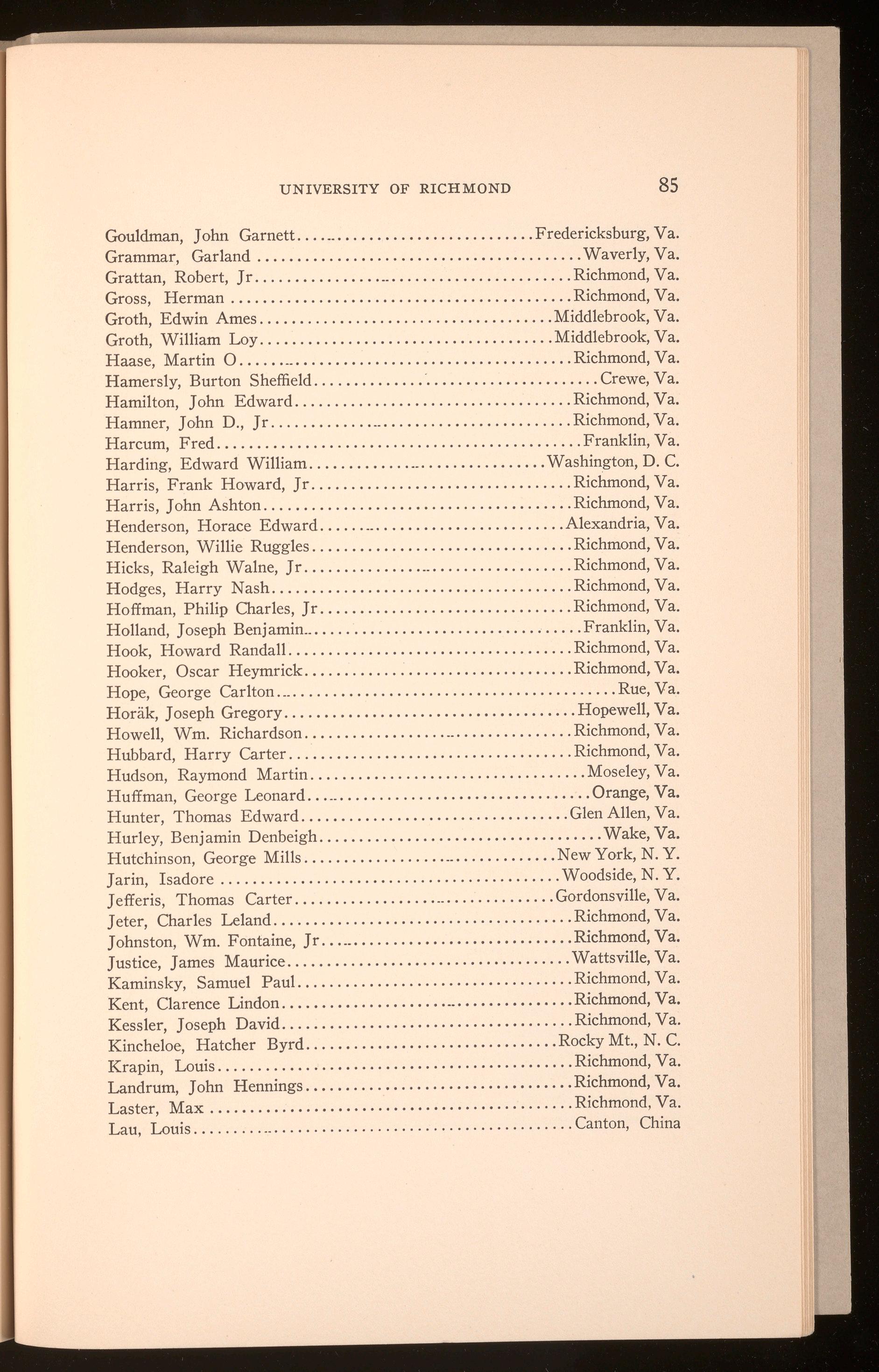
Gouldman, John Garnett .... __......................... Fredericksburg, Va.
Grammar, Garland ......................................... Waverly, Va.
Grattan, Robert, Jr ................ __ ...... .... Richmond, Va.
Gross, Herman .. .. ....... .... .... Richmond, Va.
Groth, Edwin Ames ..................................... Middlebrook, Va.
Groth, William Loy ..................................... Middlebrook, Va.
Haase, Martin O . ... .......................... Richmond, Va.
Hamersly, Burton Sheffield .. .... · . . Crewe, Va.
Hamilton, John Edward ................................... Richmond, Va.
Hamner, John D., Jr ............. __.................... Richmond, Va.
Harcum, Fred ................ ............ ... Franklin, Va.
Harding, Edward William ............................... Washington, D. C.
Harris, Frank Howard, Jr ................................. Richmond, Va.
Harris, John Ashton ...................... ..... Richmond, Va.
Henderson, Horace Edward ...... __........................ Alexandria, Va.
Henderson, Willie Ruggles ................................. Richmond, Va.
Hicks, Ral eigh Walne, Jr ................................... Richmond, Va.
Hodges, Harry Nash .............. .. .... ............... Richmond, Va.
Hoffman, Philip Charles, Jr. ............ ........... Richmond, Va.
Holland, Joseph Benjamin .................................... Franklin, Va.
Hook, Howard Randall .................................... Richmond, Va.
Hooker, Oscar Heymrick .................................. Richmond, Va.
Hope, George Carlton ............................................ Rue, Va.
Horak, Joseph Gregory ..................................... Hopewell, Va.
Howell, Wm. Richardson ................................... Richmond, Va.
Hubbard, Harry Carter . ................................. Richmond, Va.
Hudson, Raymond Martin .. ........ ..... Moseley, Va.
Huffman, George Leonard ..................................... Orange, Va.
Hunter, Thomas Edward .. .. ..... ................. Glen Allen, Va.
Hurley, Benjamin Denbeigh .................................... Wake, Va.
Hutchinson, George Mills ................................. New York, N. Y.
Jarin, Isadore ........................................... Woodside, N. Y.
Jefferis, Thomas Carter .................................. Gordonsville, Va.
Jeter, Char Jes Leland ......... ...... Richmond, Va.
Johnston, Wm. Fontaine, Jr ....... .. ...................... .. Richmond, Va.
Justice, James Maurice .................................... Wattsville, Va.
Kaminsky, Samuel Paul ................................... Richmond, Va
Kent, Clarence Lindon .......... .................. Richmond, Va.
Kessler, Joseph David ..................................... Richmond, Va.
Kincheloe, Hatcher Byrd ................................ Rocky Mt., N. C.
Krapin, Louis ............................................. Richmond, Va.
Landrum, John Hennings .................................. Richmond, Va.
Laster, Max .. ................................ ........ . Richmond , Va.
Lau , Louis ... .. ...... . ...... ...... Canton, China
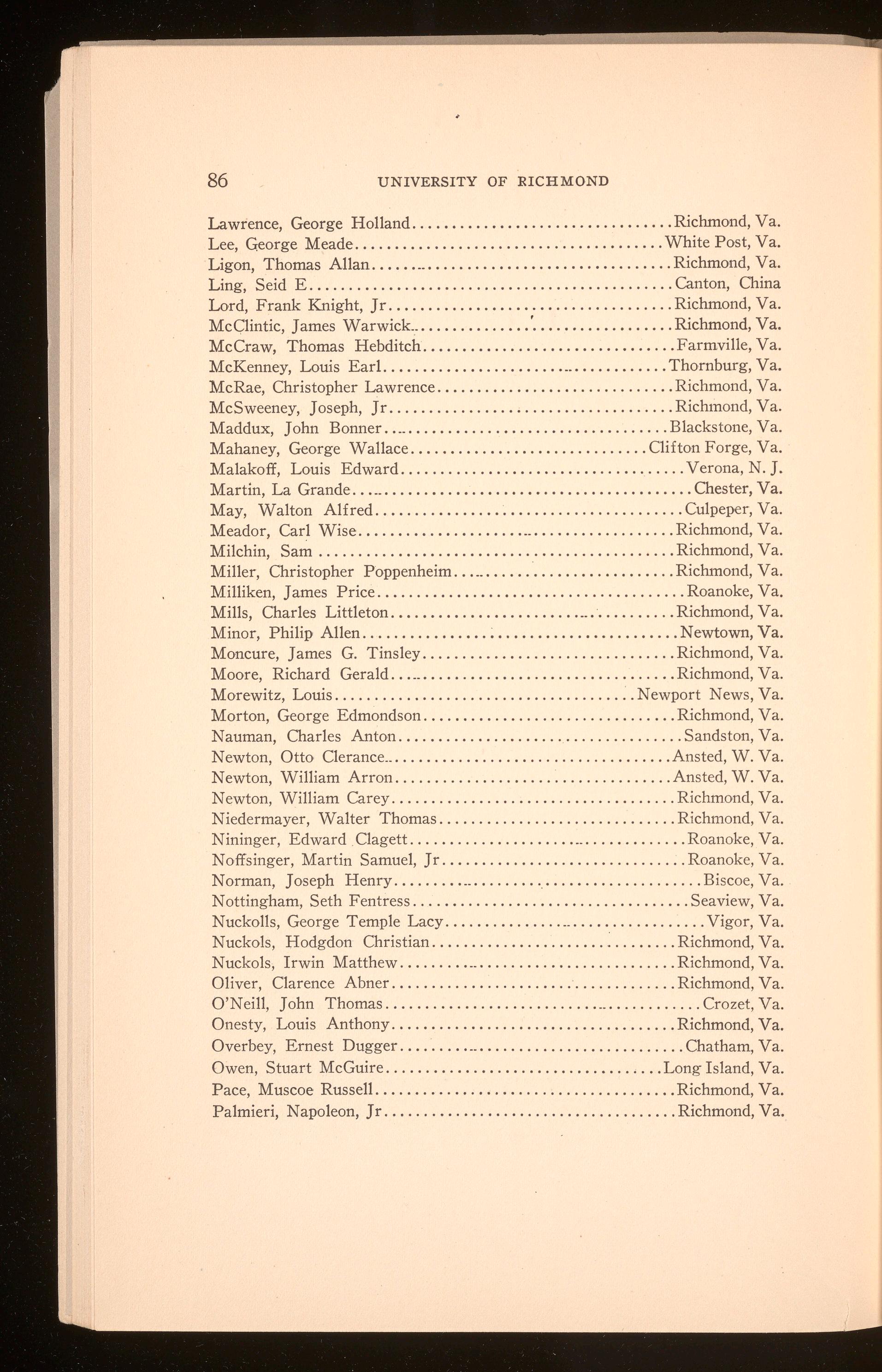
Lawrence, George Holland ................................. Richmond, Va.
Lee, George Meade White Post, Va.
Ligon, Thomas Allan ............................ .. Richmond, Va.
Ling, Seid E Canton, China
Lord, Frank Knight, Jr ...................... .......... . ... Richmond, Va.
Mc(lintic, James Warwick .' Richmond, Va.
McCraw, Thomas Hebditch ................................ Farmville, Va.
McKenney, Louis Earl. .................................... Thornburg, Va.
McRae, Christopher Lawrence .............................. Richmond, Va.
Mc Sweeney, Joseph, Jr .. . .................. Richmond, Va.
Maddux, John Bonner. .................................... Blackstone, Va.
Mahaney, George Wallace .............................. Clifton Forge, Va.
Malakoff, Louis Edward ................... Verona, N. J.
Martin, La Grande . .. ....... ............ .. ... . ......... Chester, Va.
May, Walton Alfred ....... ..... Culpeper, Va.
Meador, Car . I Wise ......................................... Richmond, Va.
Milchin, Sam ... ..... Richmond, Va.
Miller, Christopher Poppenheim ............................. Richmond, Va.
Milliken, James Price Roanoke, Va.
Mills, Charles Littleton ................................. . Richmond, Va.
Minor, Philip Allen Newtown, Va.
Moncure, James G. Tinsley . .. . .......... ... Richmond, Va.
Moore, Richard Gerald ..................................... Richmond, Va.
Morewitz, Louis .. Newport News, Va.
Morton, George Edmondson ................................ Richmond, Va.
Nauman, Charles Anton .................................... Sandston, Va.
Newton, Otto Clerance ..................................... Ansted, W. Va.
Newton, William Arron ................................... Ansted, W. Va.
Newton, William Carey .................................... Richmond, Va.
Niedermayer, Walter Thomas .............................. Richmond, Va.
Nininger, Edward Clagett. ..... .... .. . ............... Roanoke, Va.
Noffsinger, Martin Samuel, Jr ............................... Roanoke, Va.
Norman, Joseph Henry .................... .................... Biscoe, Va.
Nottingham, Seth Fentress .......................... Sea view, Va.
Nuckolls, George Temple Lacy .................................. Vigor, Va.
Nuckols, Hodgdon Christian ...................... : Richmond, Va.
Nuckols, Irwin Matthew . ................ . ............. .... Richmond, Va.
Oliver, Clarence Abner .................................... Richmond, Va.
O'Neill, John Thomas ......................................... Crozet, Va.
Onesty, Louis Anthony .................................... Richmond, Va.
Overbey, Ernest Dugger ..................................... Chatham, Va.
Owen, Stuart McGuire ................................... Long Island, Va.
Pace, Muscoe Russell Richmond, Va.
Palmieri, Napoleon, Jr ................. . ................... Richmond, Va.
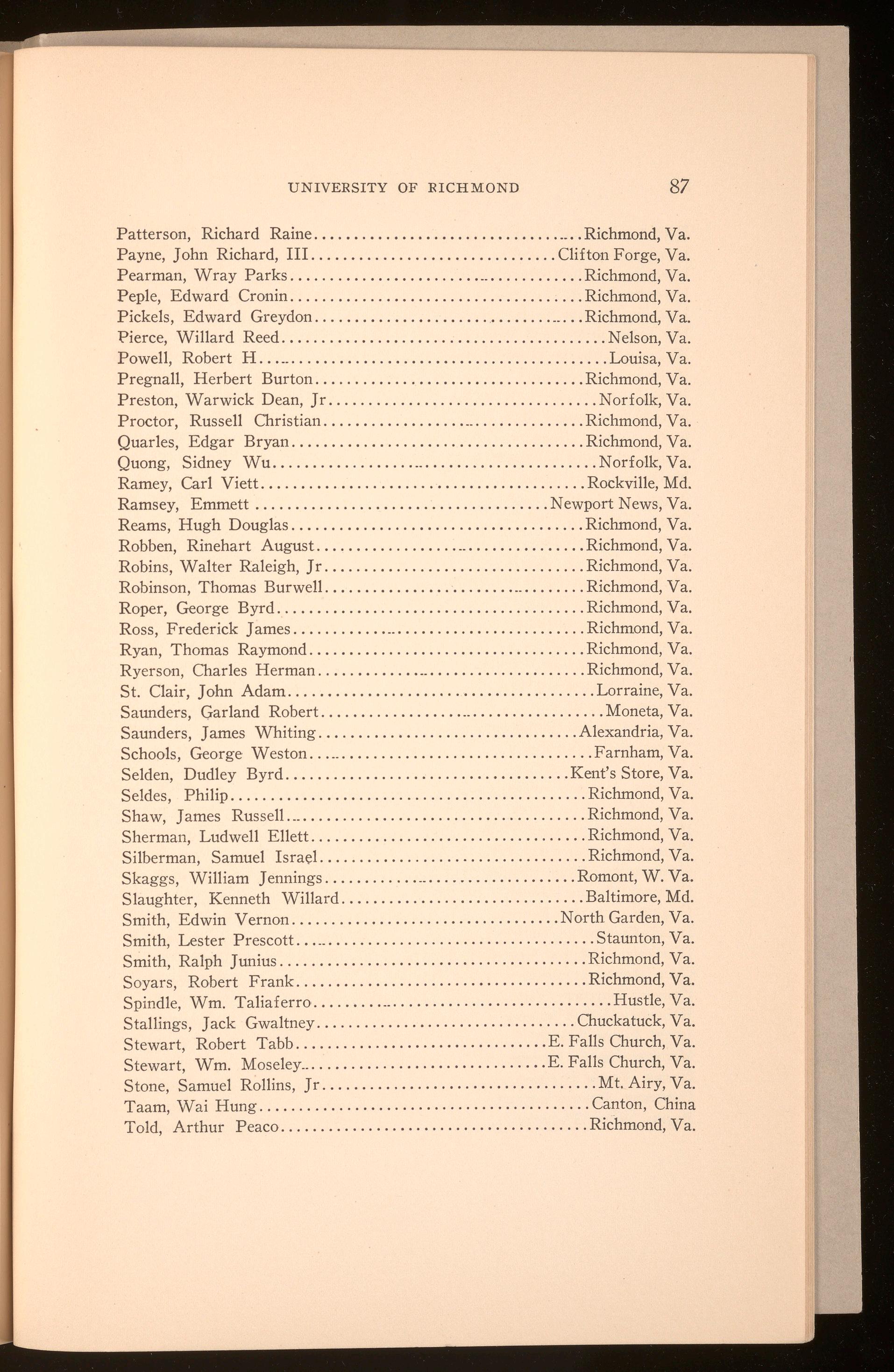
Patterson, Richard Raine ................................... Richmond, Va.
Payne, John Richard, III. .............................. Clifton Forge, Va.
Pearman, Wray Parks ...................................... Richmond, Va.
Peple, Edward Cronin Richmond, Va.
Pickels, Edward Greydon Richmond, Va.
"Pierce, Willard Reed ......................................... Nels on, Va.
Powell, Robert H ............................................. Louisa, Va.
Pregnall, Herbert Burton .................................. Richmond, Va.
Preston, Warwick Dean, Jr .................................. Norfolk, Va.
Proctor, Russell Christian .................................. Richmond, Va.
Quarles, Edgar Bryan ..................................... Richmond, Va.
Quong, Sidney Wu .......................................... Norfolk, Va.
Ramey, Carl Viett. ........................................ Rockville, Md.
Ramsey, Emmett ..................................... Newport News, Va.
Reams, Hugh Douglas ..................................... Richmond, Va.
Robben, Rinehart August ................................... Richmond, Va.
Robins, Walter Raleigh, Jr ................................. Richmond, Va.
Robinson, Thomas Burwell ........................ __........ Richmond, Va.
Roper, George Byrd ....................................... Richmond, Va.
Ross, Frederick James ...................................... Richmond, Va.
Ryan, Thomas Raymond ................................... Richmond, Va.
Ryerson, Charles Herman ................................... Richmond, Va.
St. Clair, John Adam ....................................... Lorraine, Va.
Saunders, Garland Robert. .................................... Moneta, Va.
Saunders, James Whiting ................................. Alexandria, Va.
Schools, George Weston Farnham, Va.
Selden, Dudley Byrd .................................... Kent's Store, Va.
Seldes, Philip ............................................. Richmond, Va.
Shaw, James Russell ....................................... Richmond, Va.
Sherman, Ludwell Ellett ................................... Richmond, Va.
Silberman, Samuel Israel. ................................. Richmond, Va.
Skaggs, William Jennings ................................. Romont, W. Va.
Slaughter, Kenneth Willard ............................... Baltimore, Md.
Smith, Edwin Vernon .................................. North Garden, Va.
Smith, Lester Prescott. ...................................... Staunton, Va.
Smith, Ralph Junius ....................................... Richmond, Va.
Soyars, Robert Frank ..................................... Richmond, Va.
Spindle, Wm. Taliaferro ....................................... Hustle, Va.
Stallings, Jack Gwaltney Chuckatuck, Va.
Stewart, Robert Tabb E. Falls Church, Va.
Stewart, Wm. Moseley ................................ E. Falls Church, Va.
Stone, Samuel Rollins, Jr ................................... Mt. Airy, Va.
Taam, Wai Hung .......................................... Canton, China
Told, Arthur Pea co ....................................... Richmond, Va.

Tom Sui Luen ............................................. Canton, China
Urquhart, Russell James .................................... Roanoke, Va.
V
ermillera, Albert Mountcastle ............................. Richmond, Va.
Versace, Humbert Joseph .................................... Nor folk, Va.
Vertner, Thomas Kearny, Jr ................................ Richmond, Va.
Vial, Horace Rudolph Wilber. ........... .'................. Richmond, Va.
Wakefield, Charles Talbott, Jr ............................. Richmond, Va.
Weiner, Abe Arnold ........................................ Richmond, Va.
Webb, Jack Moore ...................................... Machipango, Va.
Weeks, Hemmetter Earl. ................................... Tarboro, N .C.
Wells, Luther Coleman .................................... Richmond, Va.
Welsh, Virginius Goodwyn .................................. Richmond, Va.
Whalen, Henry Joseph, Jr ................................. Johnstown, Pa.
Whalen, Russell Mitchell Johnstown, Pa.
Whitenfish, Abe ............................................ Richmond, Va.
Williams, Earl Lindsey .................................... Richmond, Va.
Williams, Emmett Allen, Jr _. Warm Springs, Ga.
Williams, Paul Camp Franklin, Va.
Willis, Eugene Young Culpeper, Va.
Wilson, Robert Miles ; ...... New York, N. Y.
Wong, Yu Chok : Canton, China
Wright, Albert Jack Crewe, Va.
Wright, Fletcher Johnston, Jr ............................. Petersburg, Va.
Wright, Wm. Walton ....................................... Richmond, Va.
Wynkoop, Lester Hugh ................................... Brunswick, Md. Young, William Elmo ..................................... Richmond, Va.
Brent, Edmund Davis ..................................... Kilmarnock, Va. Bryan, John Stewart. ..................................... Richmond, Va. Campodonico, Frank Edward ................................ Richmond, Va. Carmack, Leonard David ................... . ............ Silver Spring, Md. Crighton, Charles Nevins .................................. Richmond, Va. Davis, Char !es Clarence, Jr ................................ Richmond, Va. Dickinson, Preston Sennie .................................. Richmond, Va. Gary, Aubrey Alexander ................................... Richmond, Va.
Hanson, Lawrence Victor ................................... Richmond, Va.
Holsinger, Elden Winter ..................... ............... Dayton, Va.
Joyce, James Edward ......................................... Stuart, Va. Madison, Bennie Verben ......................................... Palls, Va.
Moran, Frank Howard .................................... Richmond, Va.
Patterson, Robert Redman Richmond, Va. Payne, Wiley Thornton ................................ Drakes Branch, Va.
Peterson, Paul L .......................................
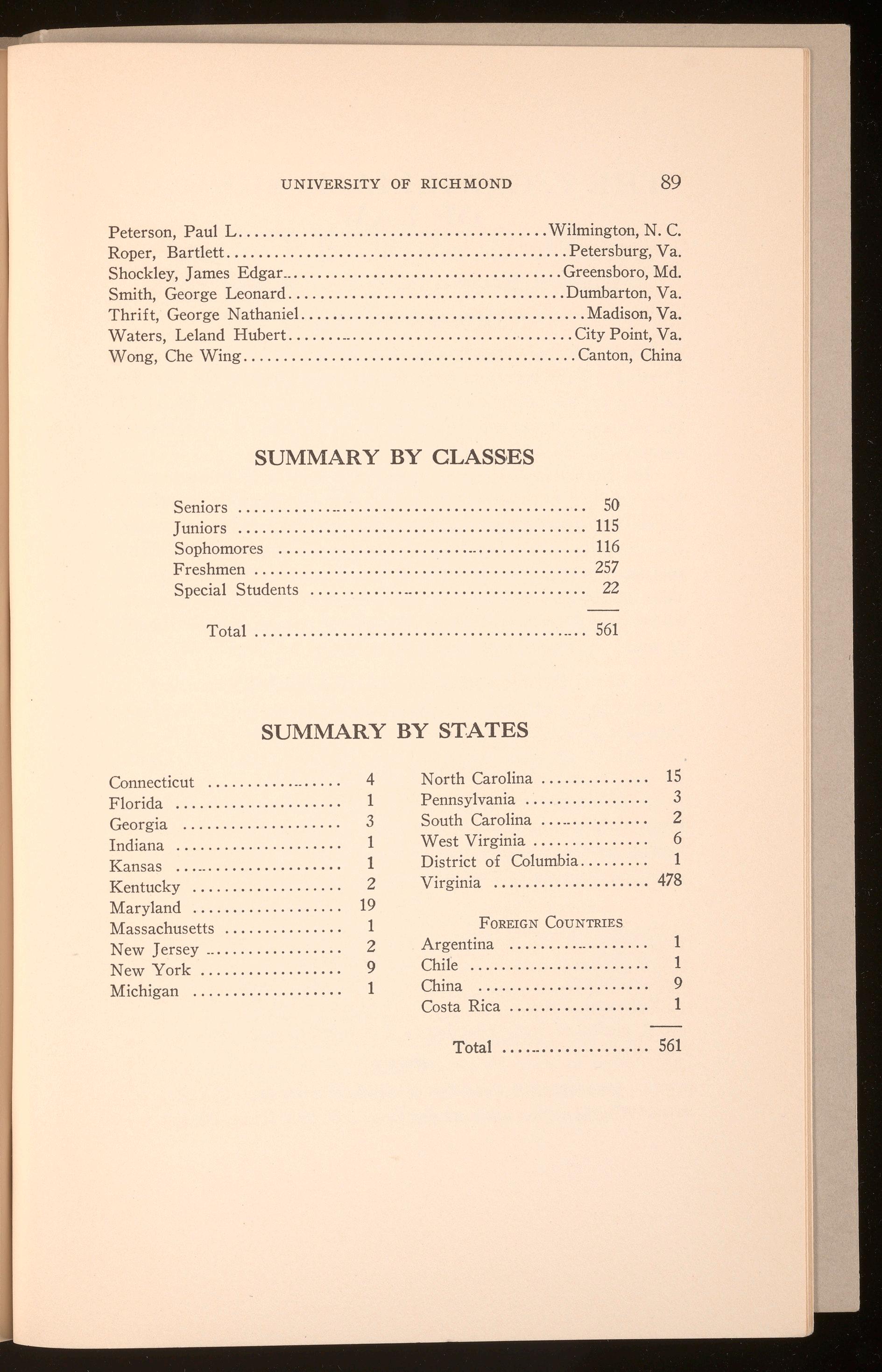
Wilmington, N. C.
Roper, Bartlett. .......................................... Petersburg, Va.
Shockley, James Edgar .................................... Greensboro, Md.
Smith, George Leonard ................................... Dumbarton, Va.
Thrift, George Nathaniel. ................................... Madison, Va.
Waters, Leland Hubert ..................................... CityPoint, Va.
Wong, Che Wing .......................................... Canton, China
FREDERIC WILLIAM BOATWRIGHT , LL. D. President
JAMES H. BARNETT, JR., B. S., LL. B. Secretary
There are two divisions of the School, viz.: Forenoon and Evening. The courses in both divisions are given in the new law building on the campus in the city of Richmond. The hours for the forenoon classes are from 9 A. M. to 1 P. M.; for the evening classes, 7 P. M. to 10 P. M.
The Forenoon division requires three, and the Evening requires four, years of work leading to the law degree. Regular attendance, satisfactory class room recitations, and approved written examinations in all of the subjects are required for graduation in either division. No degree candidate is permitted to advance from one class to another, without having successfully completed the work of the preceding class either in this school or the equivalent thereof at some other accredited law school.
Sixty semester hours of college work are required of all candidates for the law degree.
In 1929 a summer course will be offered covering a period of twelve weeks, consisting of two terms of six weeks each. Matriculates in the summer session are subject to the requirements covering the regular session 1929-'30.
FIRST TERM
Property II-first half.
Carriers
Bankruptcy
Bills and N ates

SECOND TERM
Property II-second half.
Damages.
Criminal Procedure
Sales Wills
A period of forty-four hours is devoted to each subject.
Matriculation ( one fee covers both terms) ... $10.00
Tuition (for each subject) ....... ·.... . .... 20.00
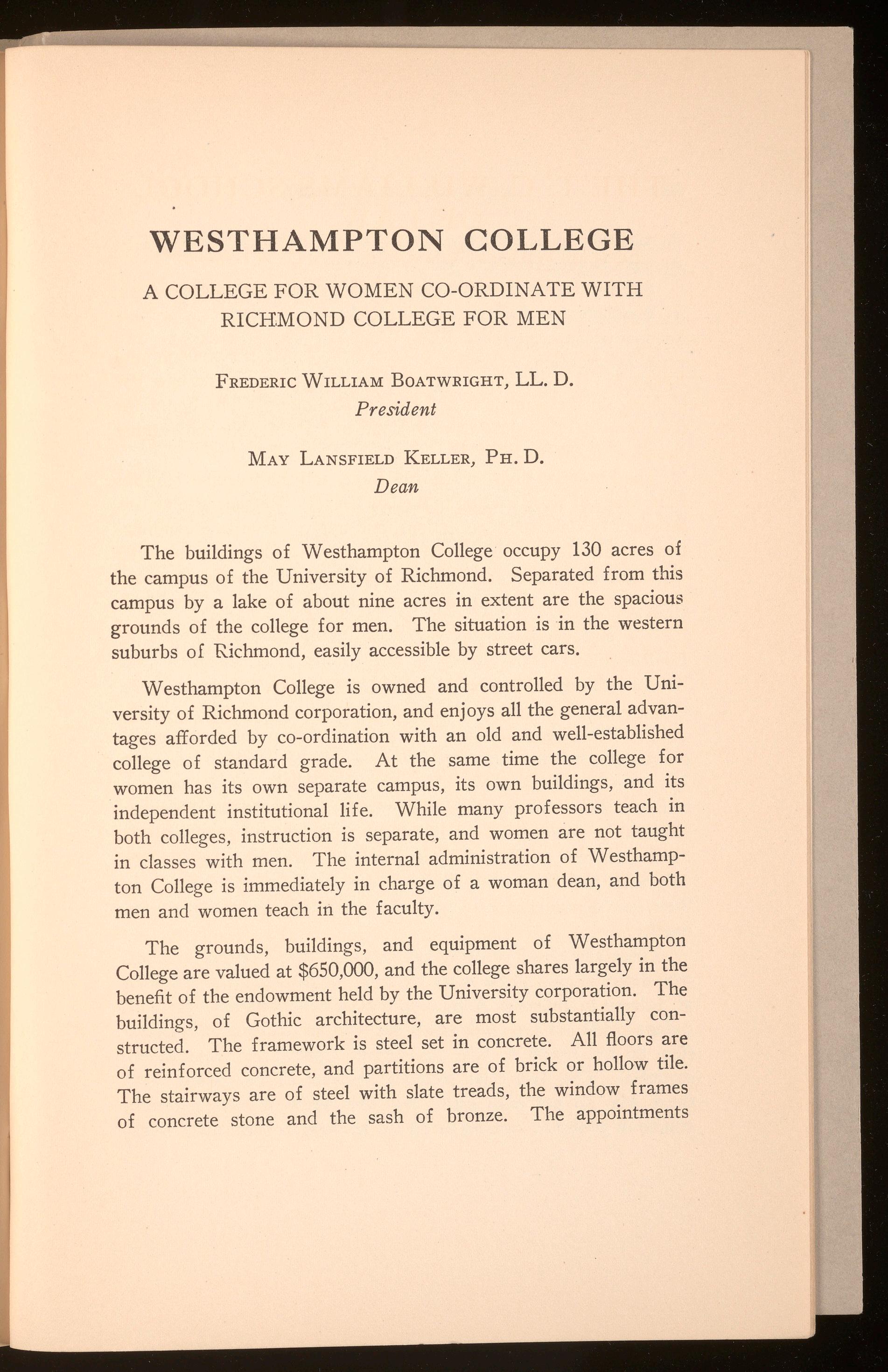
FREDERIC WILLIAM BOATWRIGHT, LL. D. President
MAY LANSFIELD KELLER, PH. D. Dean
The buildings of Westhampton College occupy 130 acres of the campus of the University of Richmond. Separated from this campus by a lake of about nine acres in extent are the spacious grounds of the college for men. The situation is in the western suburbs of Richmond, easily accessible by street cars.
Westhampton College is owned and controlled by the University of Richmond corporation, and enjoys all the general advantages afforded by co-ordination with an old and well-established college of standard grade. At the same time the college for women has its own separate campus, its own buildings, and its independent institutional life. While many professors teach in both colleges, instruction is separate, and women are not taught in classes with men. The internal administration of Westhampton College is immediately in charge of a woman dean, and both men and women teach in the faculty.
The grounds, buildings, and equipment of Westhampton College are valued at $650,000, and the college shares largely in the benefit of the endowment held by the University corporation. The buildings, of Gothic architecture, are most substantially constructed. The framework is steel set in concrete. All floors are of reinforced concrete, and partitions are of brick or hollow tile. The stairways are of steel with slate treads, the window frames of concrete stone and the sash of bronze. The appointments
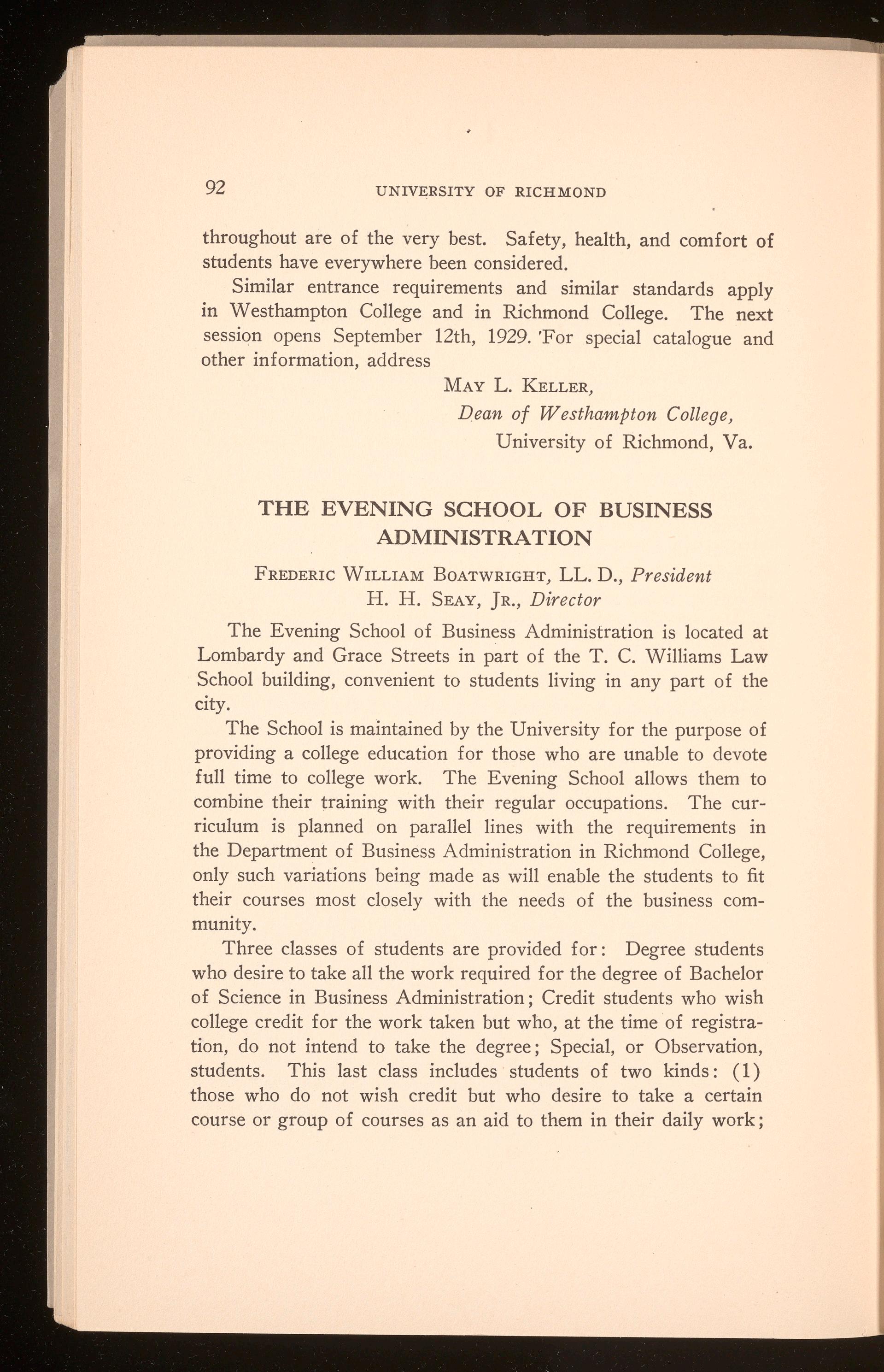
throughout are of the very best. Safety, health, and comfort of students have everywhere been considered. Similar entrance requirements and similar standards apply in Westhampton College and in Richmond College. The next session opens September 12th, 1929. 'For special catalogue and other information, address
MAY L. KELLER, Dean of Westhampton College,
University of Richmond, Va.
FREDERIC WILLIAM BOATWRIGHT, LL. D., President H. H. SEAY, JR.,Director
The Evening School of Business Administration is located at Lombardy and Grace Streets in part of the T. C. Williams Law School building, convenient to students living in any part of the city.
The School is maintained by the University for the purpose of providing a college education for those who are unable to devote full time to college work. The Evening School allows them to combine their training with their regular occupations. The curriculum is planned on parallel lines with the requirements in the Department of Business Administration in Richmond College, only such variations being made as will enable the students to fit their courses most closely with the needs of the business community.
Three classes of students are provided for: Degree students who desire to take all the work required for the degree of Bachelor of Science in Business Administration; Credit students who wish college credit for the work taken but who, at the time of registration, do not intend to take the degree; Special, or Observation, students. This last class includes students of two kinds: ( 1) those who do not wish credit but who desire to take a certain course or group of courses as an aid to them in their daily work;
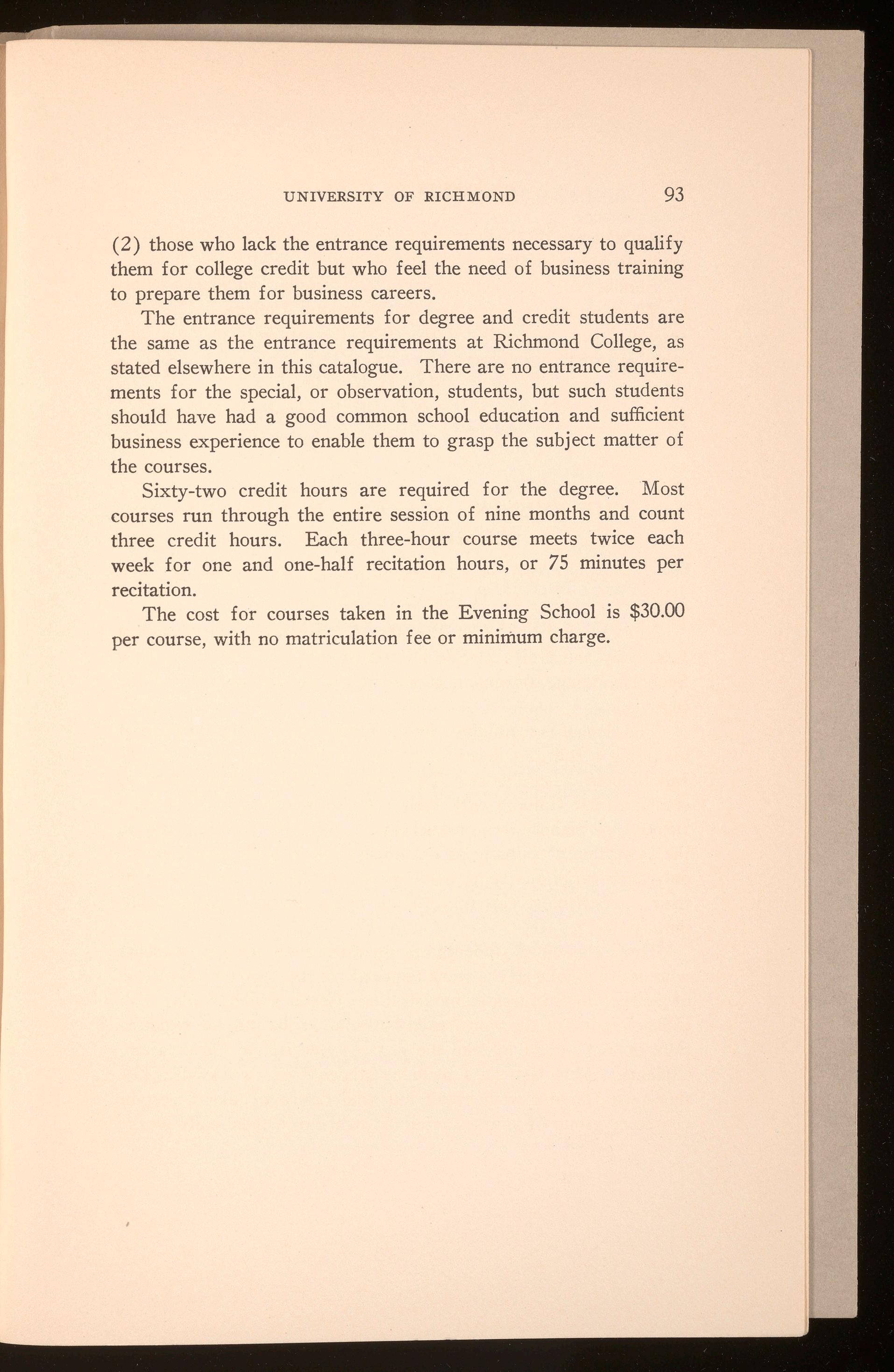
(2) those who lack the entrance requirements necessary to qualify them for college credit but who feel the need of business training to prepare them for business careers.
The entrance requirements for degree and credit students are the same as the entrance requirements at Richmond College, as stated elsewhere in this catalogue. There are no entrance requirements for the special, or observation, students, but such students should have had a good common school education and sufficient business experience to enable them to grasp the subject matter of the courses.
Sixty-two credit hours are required for the degree. Most courses run through the entire session of nine months and count three credit hours. Each three-hour course meets twice each week for one and one-half recitation hours, or 75 minutes per recitation.
The cost for courses taken in the Evening School is $30.00 per course, with no matriculation fee or minimum charge.
JUNE 17 TO AUGUST 16, 1929
Courses offered for :
1. Regular college students working for degree credit and those wishing to remove conditions.
2. Pre-medical students desiring to meet the standard medical college requirements in General and Organic Chemistry, Physics and Biology.
3. Teachers wishing to obtain credit toward the Collegiate Professional, the Collegiate or Special Certificates.
4. Teachers desiring to renew certificates by successful completion of summer school work.
5. High school Students wishing special opportunity to complete college entrance requirements.
For information, address
W. L. PRINCE, DIRECTOR OF
THE SUMMER
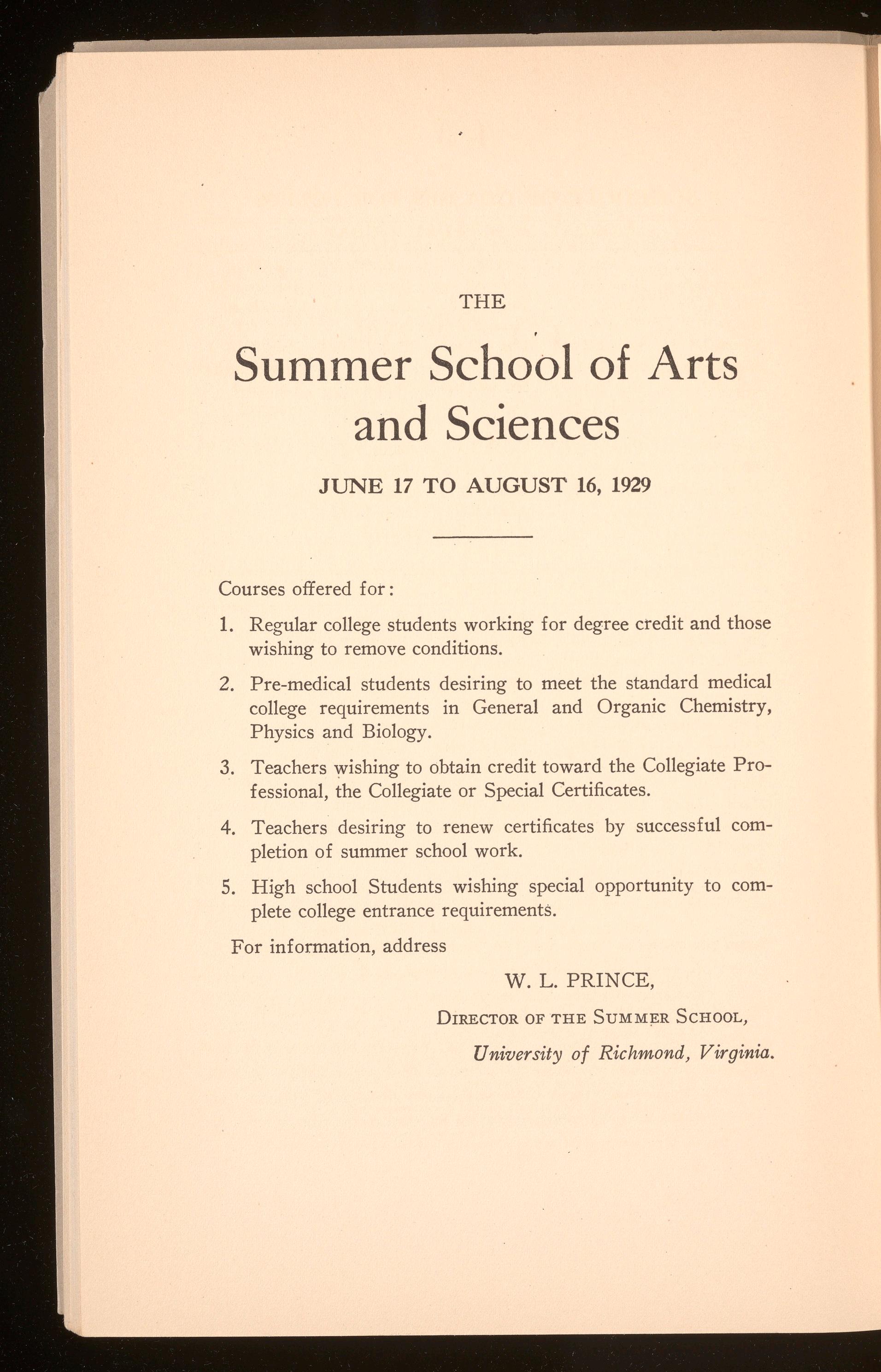
SCHOOL,
University of Richmond, Virginia.
SCHEDULE OF CLASSES FOR 1929-1930
MONDAY, WEDNESDAY, FRIDAY
9:00 10:00 11 :00 12:00 2:00
Botany 5-8
Bus. 3'-4
Bus. 9-10
Chem. 3-4

Bible 3-4
Bus. 15-16
Ed. 3-4
Eng. 1-2 (b)
Eng. 1-2(a) Eng. 15-16
Bible7-8
Bus. 5-6 (a)
Econ. 1-2 (a)
Eng. 1-2 (c)
Eng. 19-20
Botany 1 Bus. 1-2 (b)
Bus. 1-2 (a)
Bus. 7-8
Eng. 1-2 (d)
Bus. 29-30
Eng. 1-2 (e)
Eng. 3-4 (c)
Eng. 3-4 (b) Hist. 1-2 (b)
Eng. 3-4(a) Hist. 3-4 Fr. 3-4 (b) Fr. 5-6
Fr. 3-4 (a)
Math. 1-2 (b) Fr. 7-8
Greek 5-6 Math 7-8
Hist. 5-6 Phys. 1-2 (a)
Ger.5-6
Greek 3-4
Latin3-4
Ger. 1-2 (a) Soc. 1-2
Greek 7-8
Math. 1-2 (c) Latin 5-6 Span. 5-6
Math. 1-2 (a) Zoo!. 9-10
Phys. 5-6
Span. 1-2 (a)
Hist. 1-2 (a)
Latin 1-2
Math. 5-6
Psych . 1-2!(a)
Span. 1-2 (b)
Hist. 11-12
Phys. 1-2 (b) Zoo!. 2
Span. 3-4 (a) Zoo!. 5-6
TUESDAY, THURSDAY, SATURDAY
Bus. 5-6 (b) • Bot. 3-4
Bus. 1-2 (c)
Bus. 23-24 Bus. 17-18 Chem. 1-2
Bus. 21-22
Econ. 1~2 (c) Bus. 13-14 Econ. 1-2 (b) Econ. 3-4
Chem. 5-8 Econ. 5-6
Eng. 1-2 (i)
Eng.1-2 (h) Eng. 3-4 (e)
Eng 1-2 (f) Eng. 1-2 (g) Eng. 7-8
Fr.l-2(b) Eng . 3-4 (d) Eng. 5-6 Eng. 13-14
Ger. 1-2 (b) Eng. 11-12 Fr. 3-4 (c)
Ger. 3-4
Hist. 1-2 ( d) Ger. 3-4 (b) Fr. 1-2 (a) Greek 1-2
Pub. Spk. 1-2 Hist. 9-10 Ger. 1-2 (c) Math. 1-2 (£) Psych. 3-4
Math. 1-2 (d) Hist. 1-2 (c) Phys. 7-8
Span. 9-10 Math. 3-4 Math. 1-2 (e) Psych.1-2 (b)
Soc. 7-8 Phys. 3-4
Span. 3-4 (b) Soc. 3-4 Zoo!. 3-8
SCHEDULE FOR LABORATORY WORK
Botany I-Monday and Wednesday, 2:00; Tuesday and Thursday, 9:00; 11:20; 2 :00.
3-Tuesday and Thursday, 2:00.
4-Tuesday and Thursday, 2.00, and one other period
7-Monday and Wednesday, 2 :00.
8-Monday, Wednesday and Friday, 2 :00.
Chemistry I-2-Tuesday and Thursday, 2:00, or Wednesday and Fnday, 2:00.
3-4-8-Tuesday and Thursday, 2 :00.
5-6-7-9-Monday, Wednesday and Friday, 2 :00.
Physics I-2-Tuesday and Thursday, 9:00, 11 :20; "Wednesday and Friday, 9:00, 11 :20. Laboratory hours in Advanced Physics to be arranged.
Zoology 2-Monday and Wednesday, 2 :00; Tuesday and Thursday, 9 :00, 11 :20, 2 :00.
3-Monday and Wednesday, 2:00 and one other period.
8-Monday and Wednesday, 2 :00 and one other period.
9-11-Tuesday and Thursday, 2 :00 and one other period.
IO-Monday and Wednesday, 2 :00 and one other period
...Busiacss Administration 5-6 (b) meets with Business Administration 5-6(a) on Mondays.
